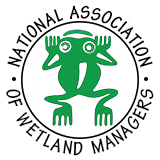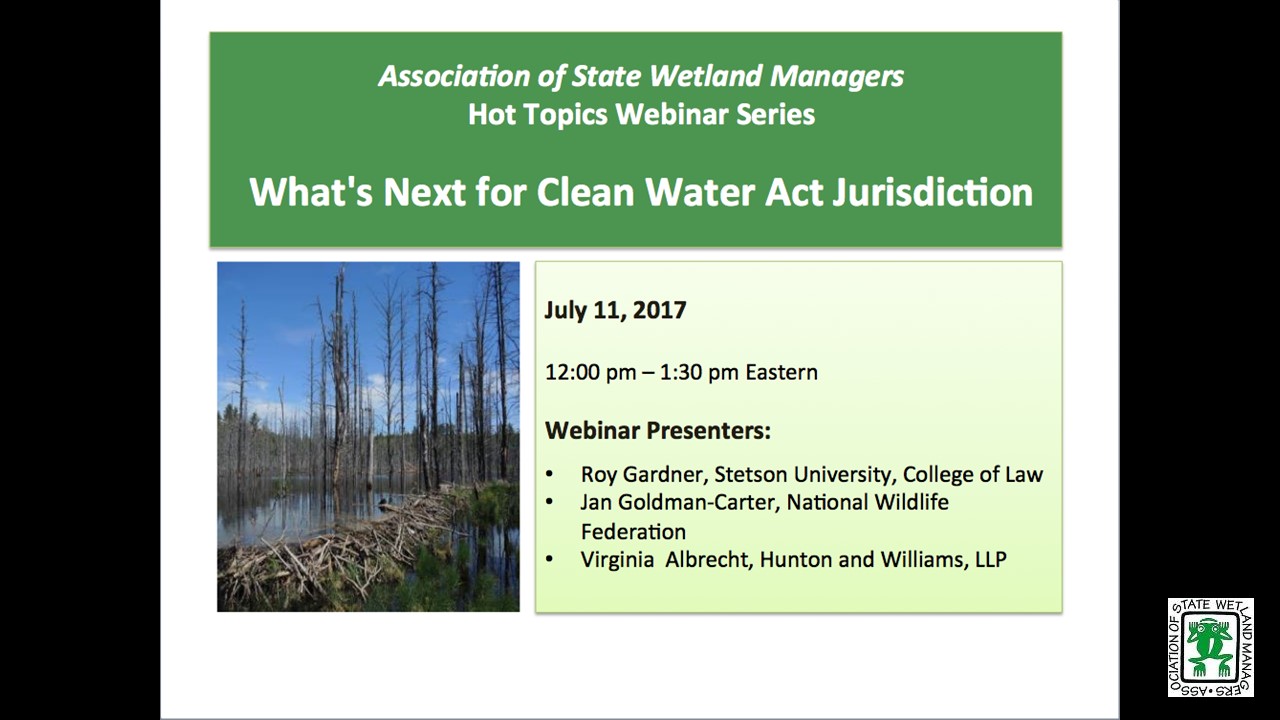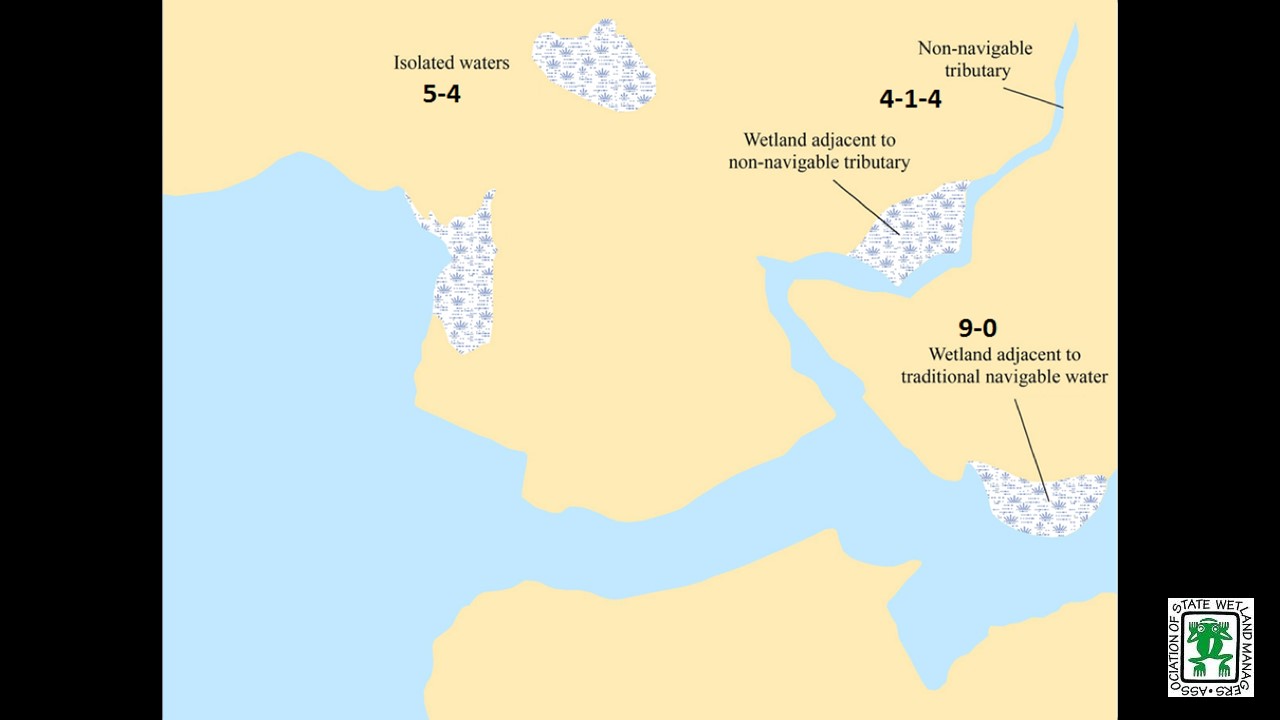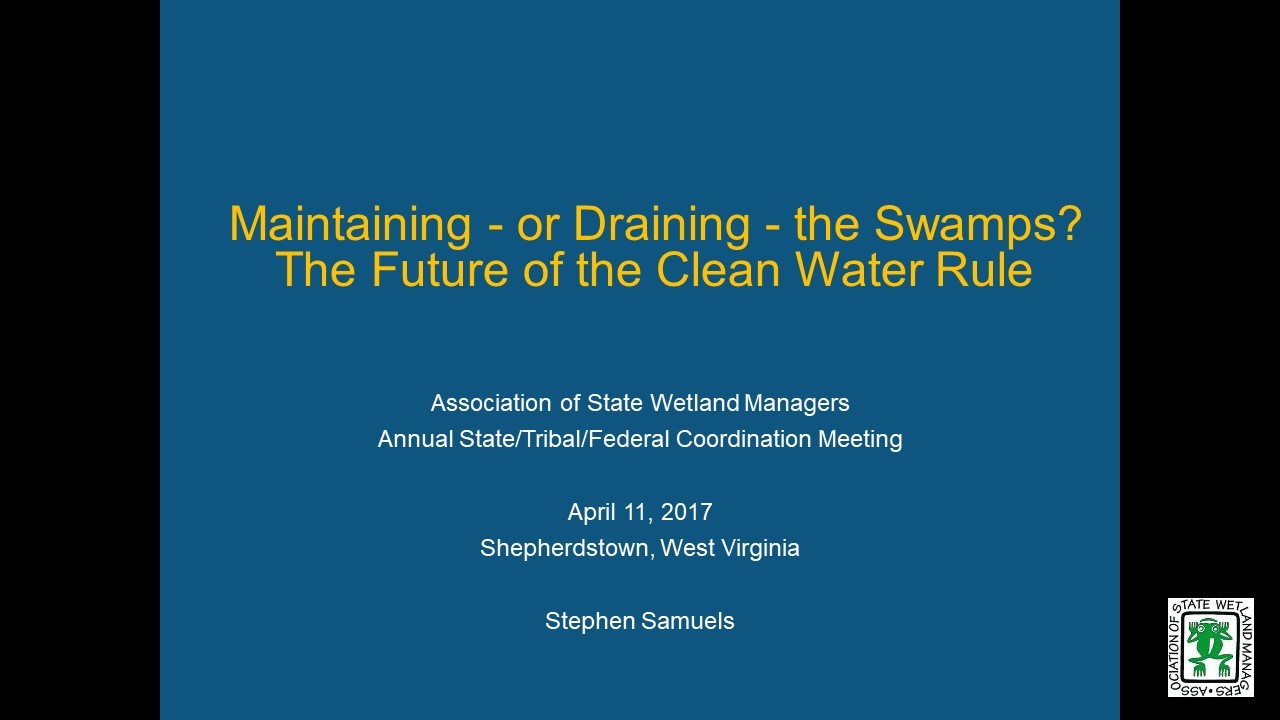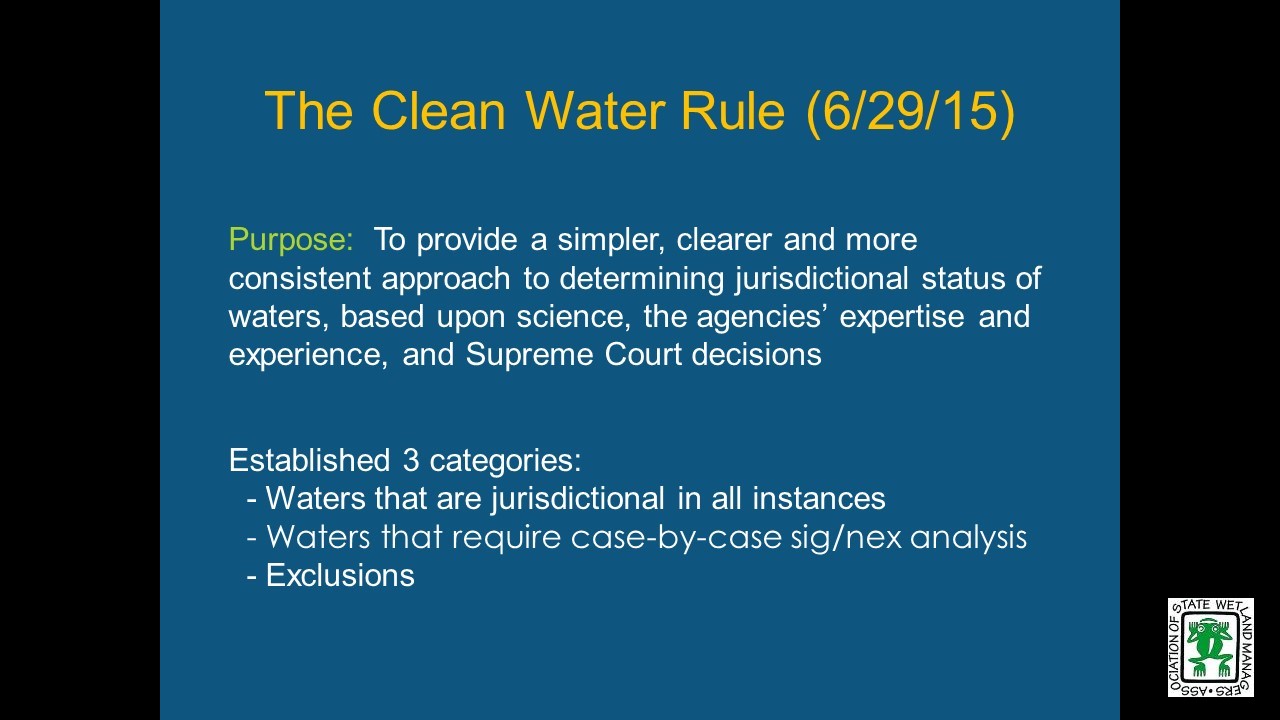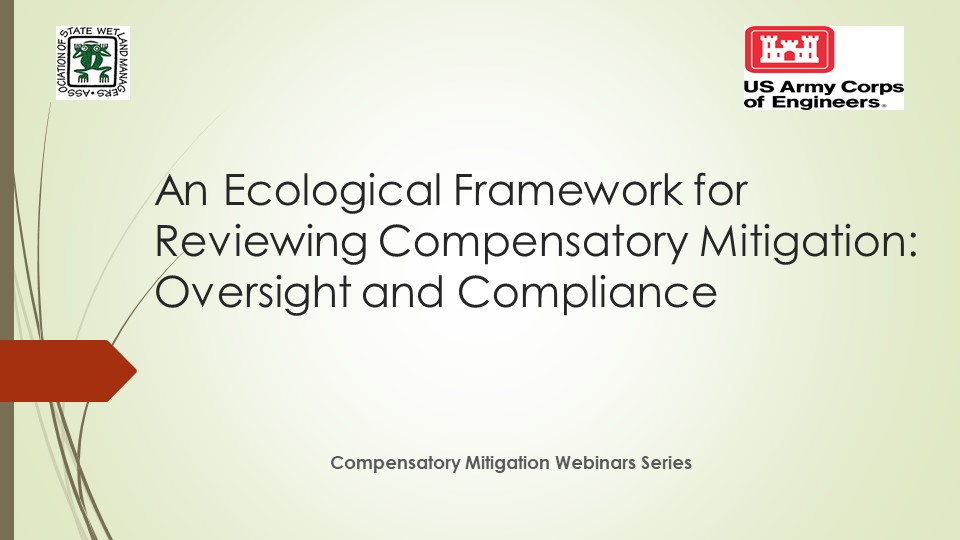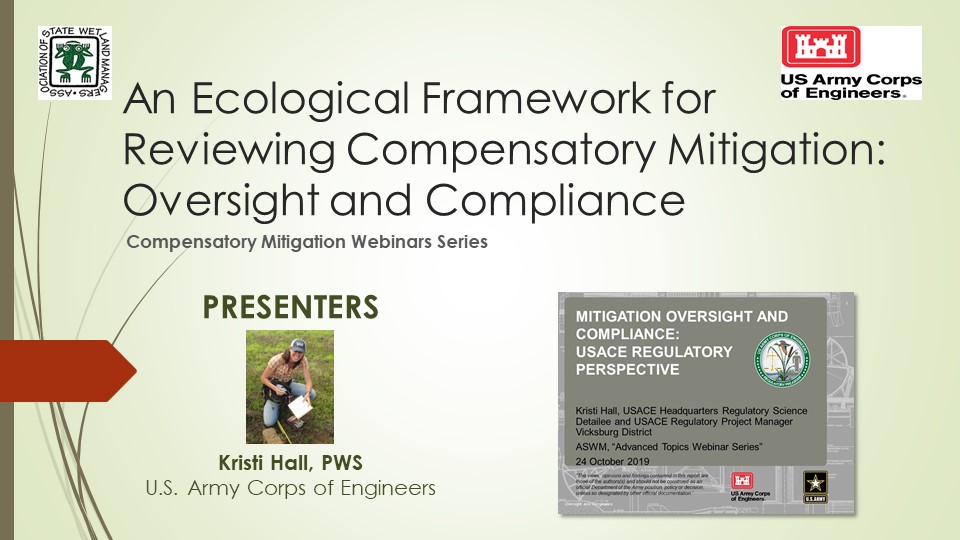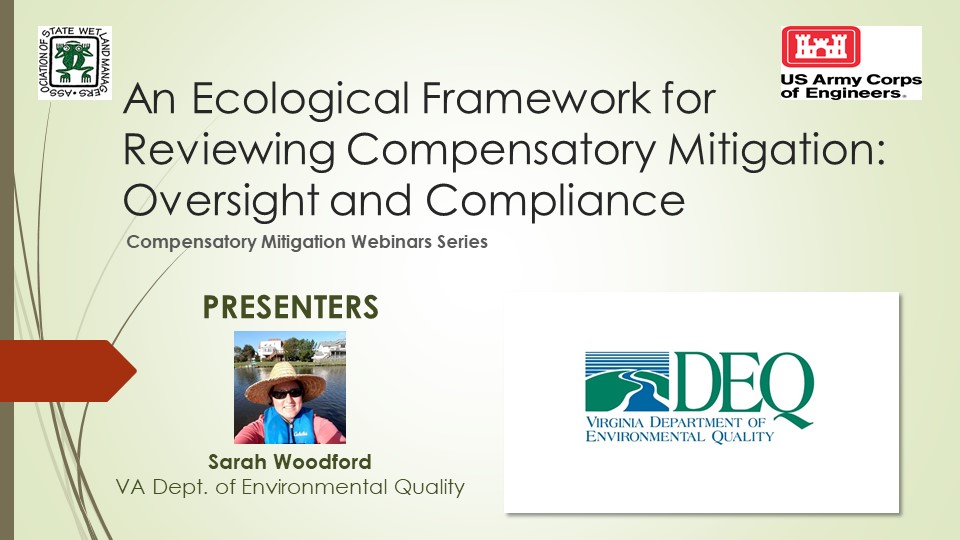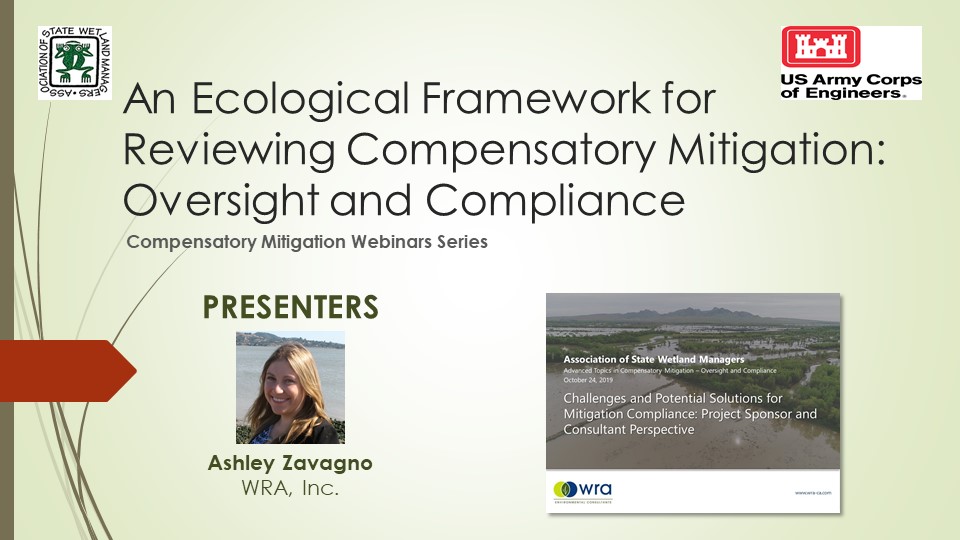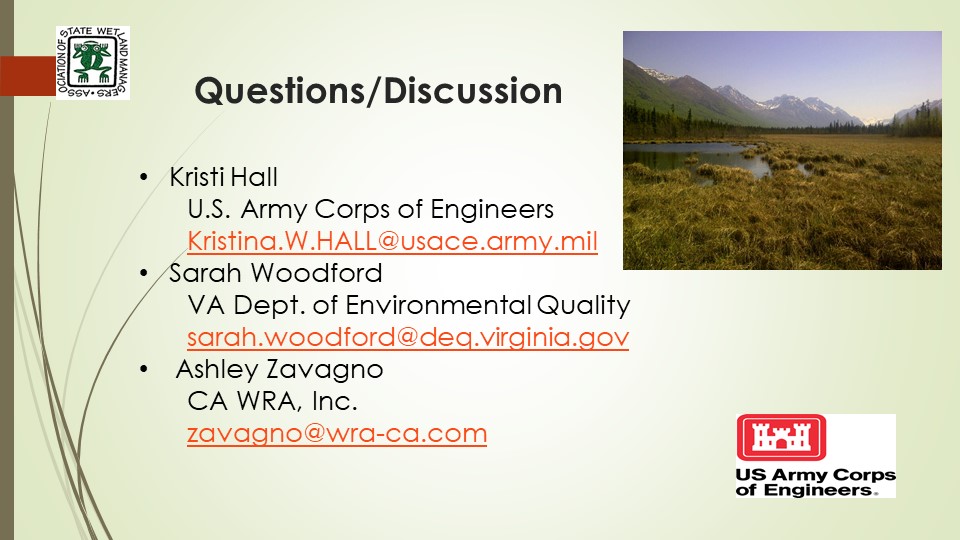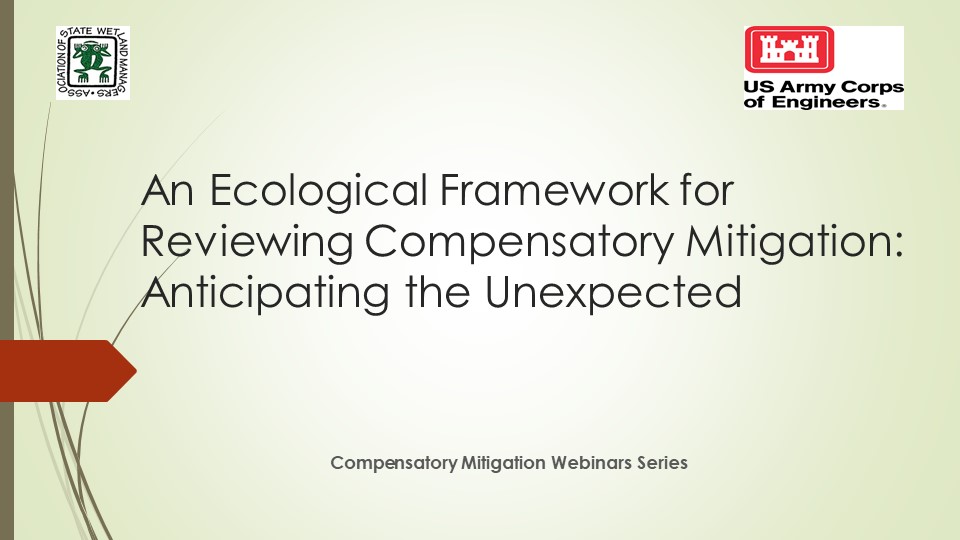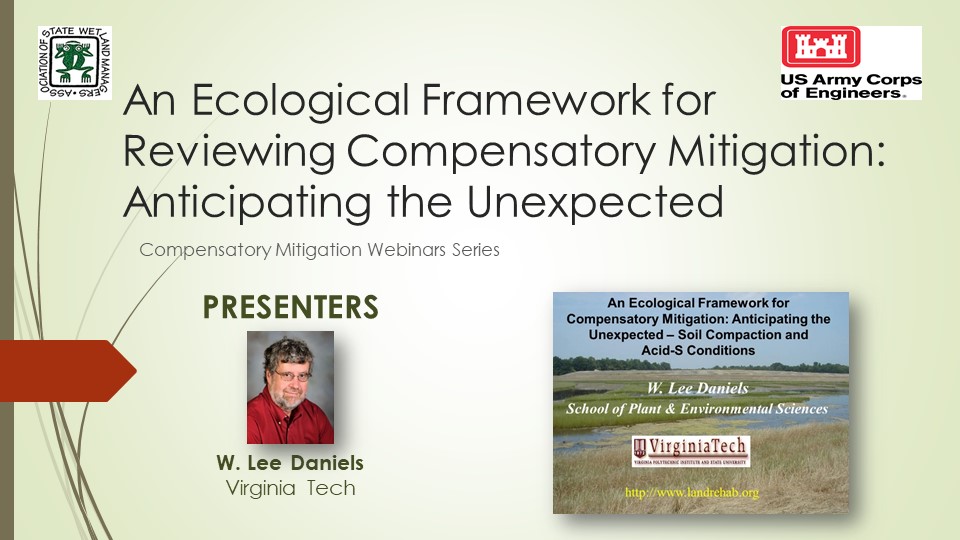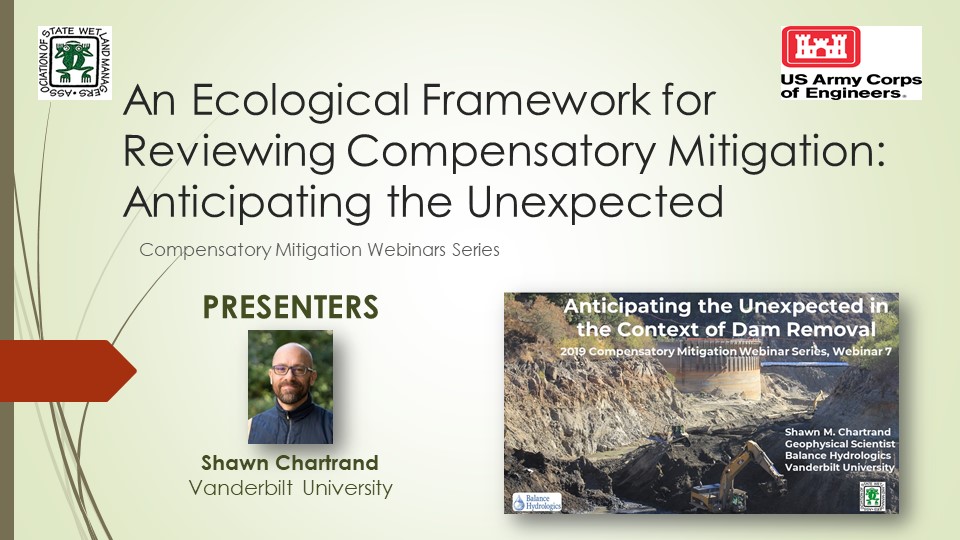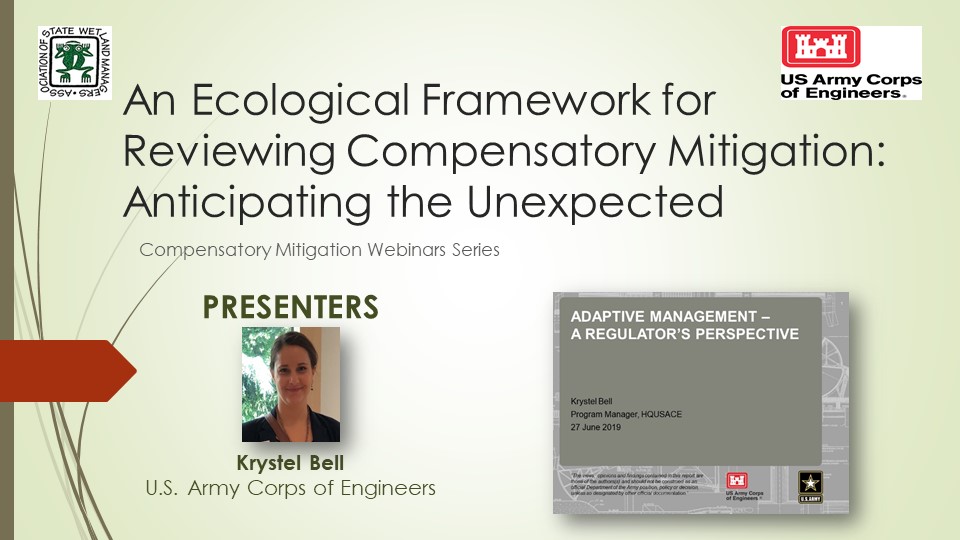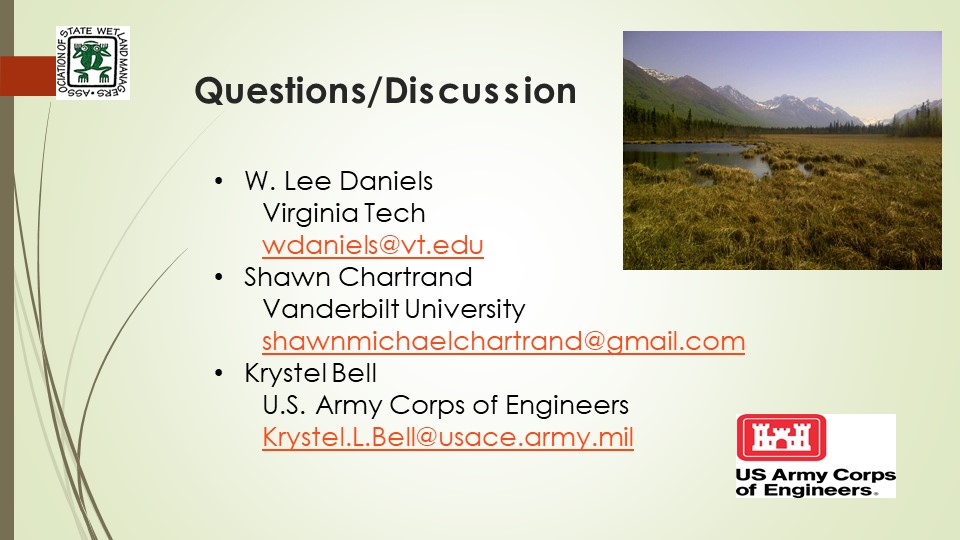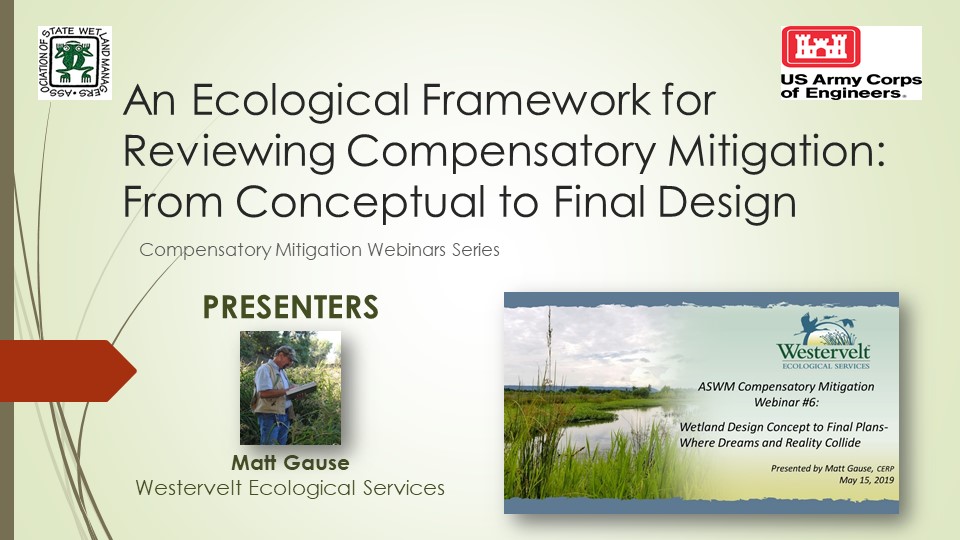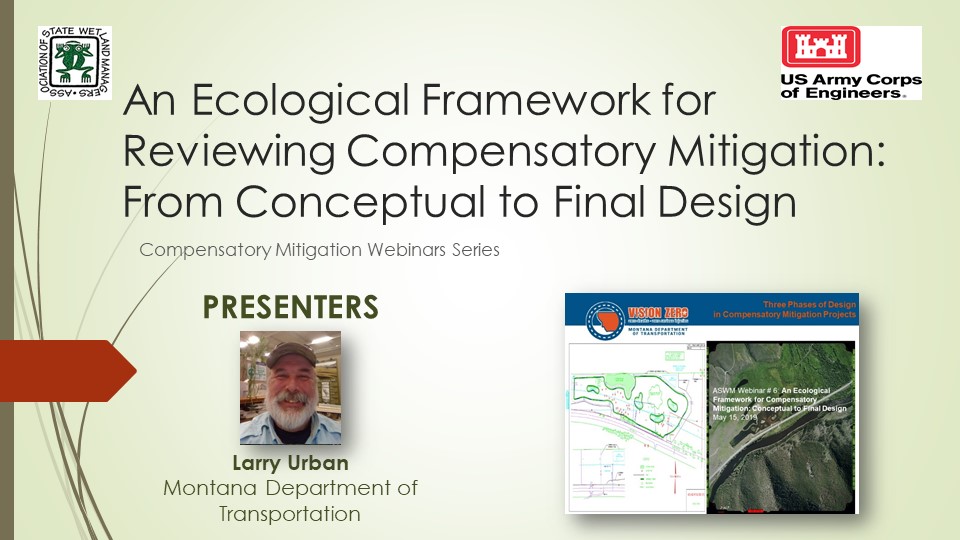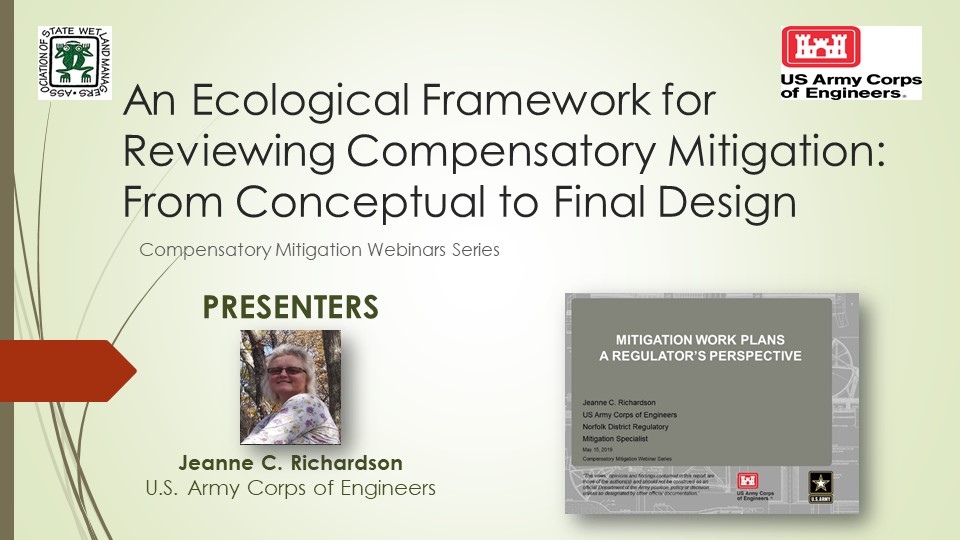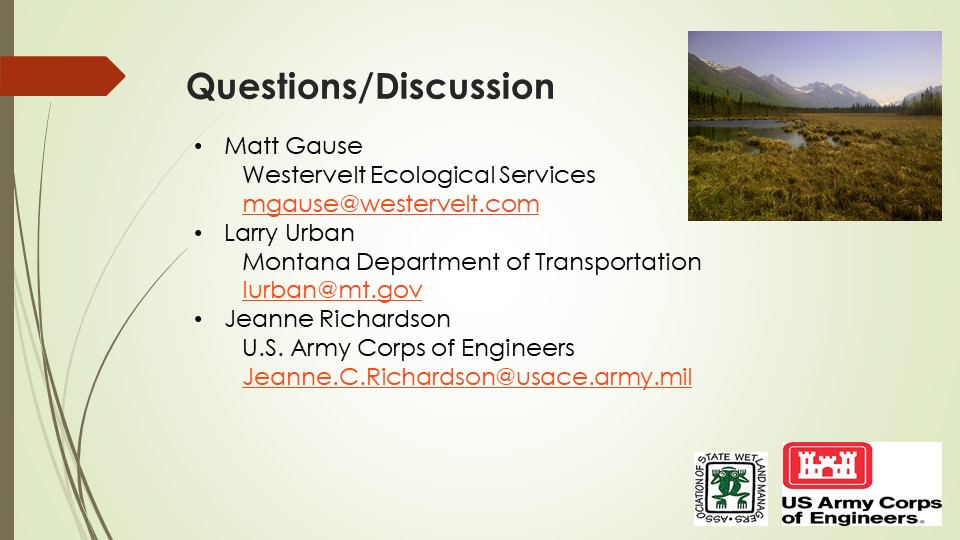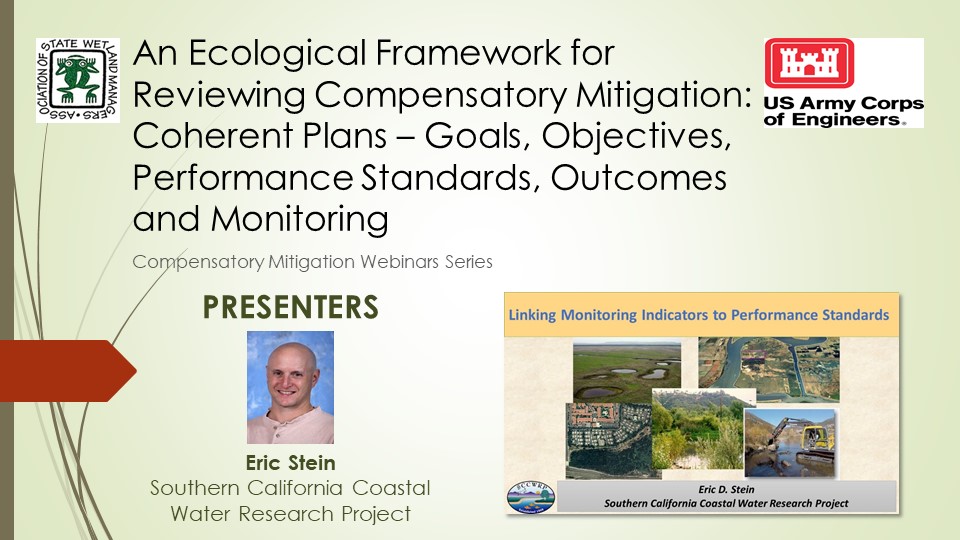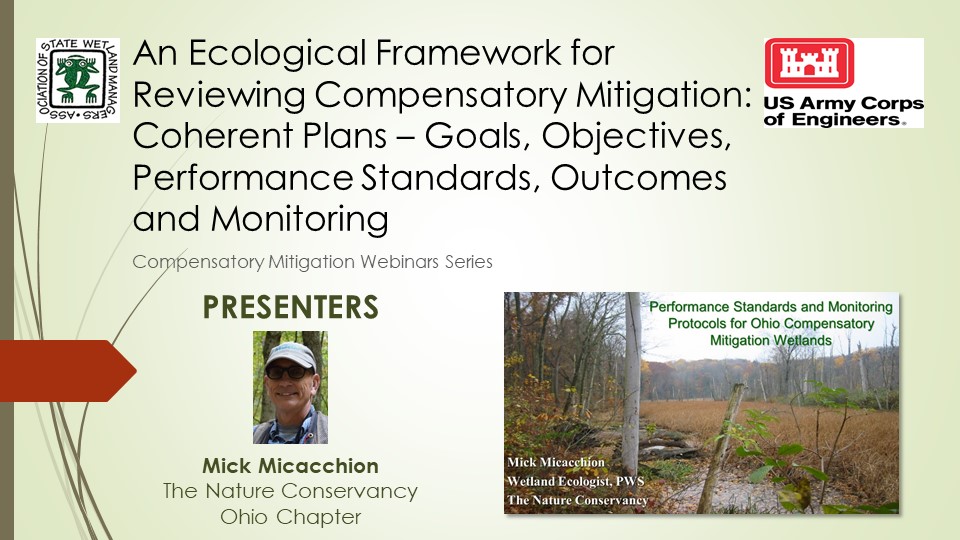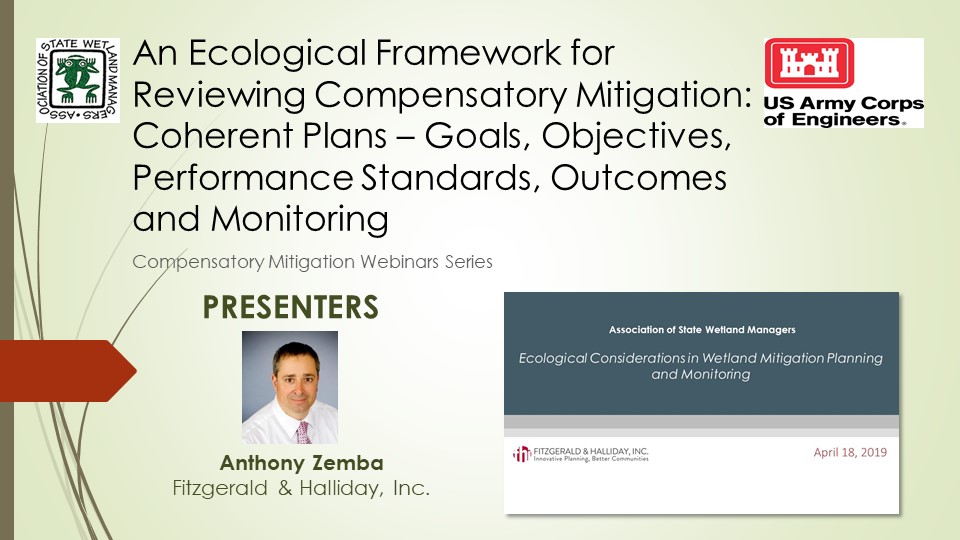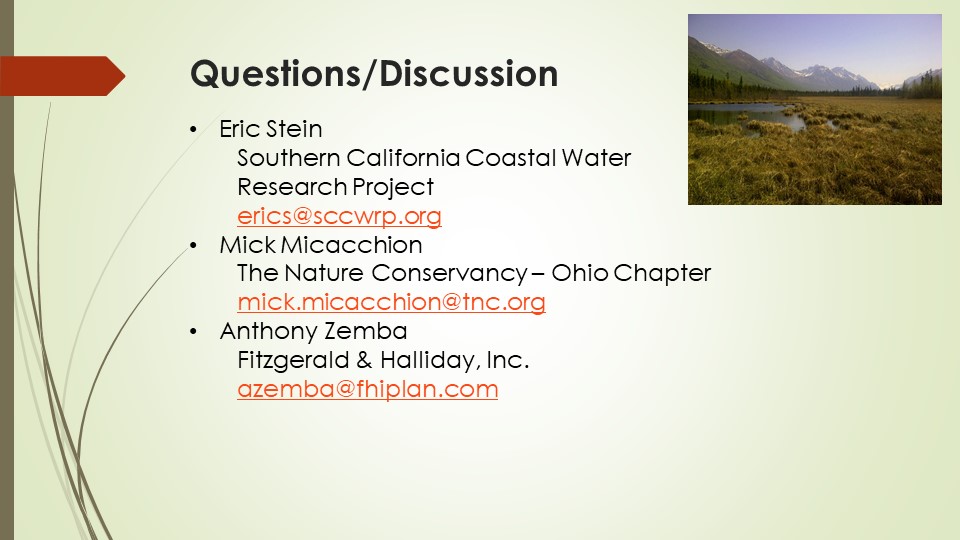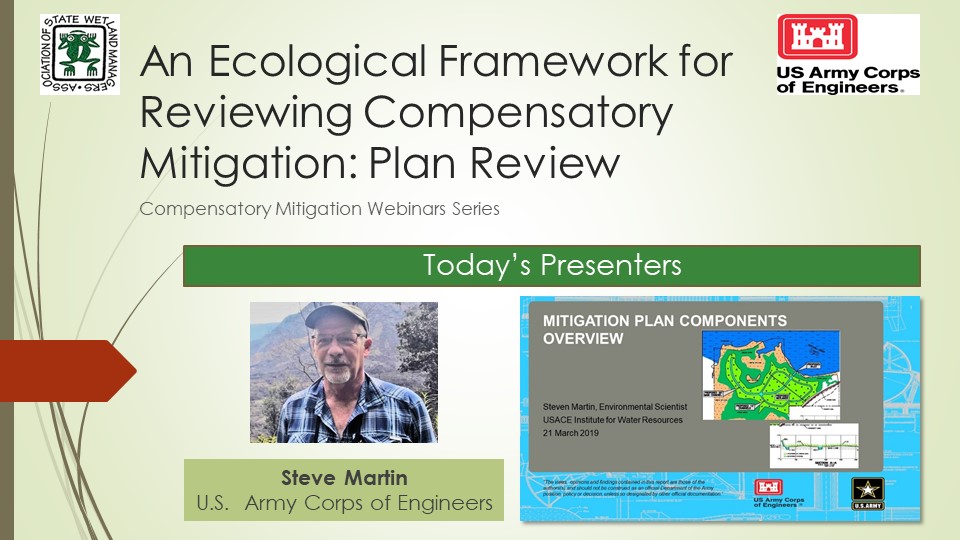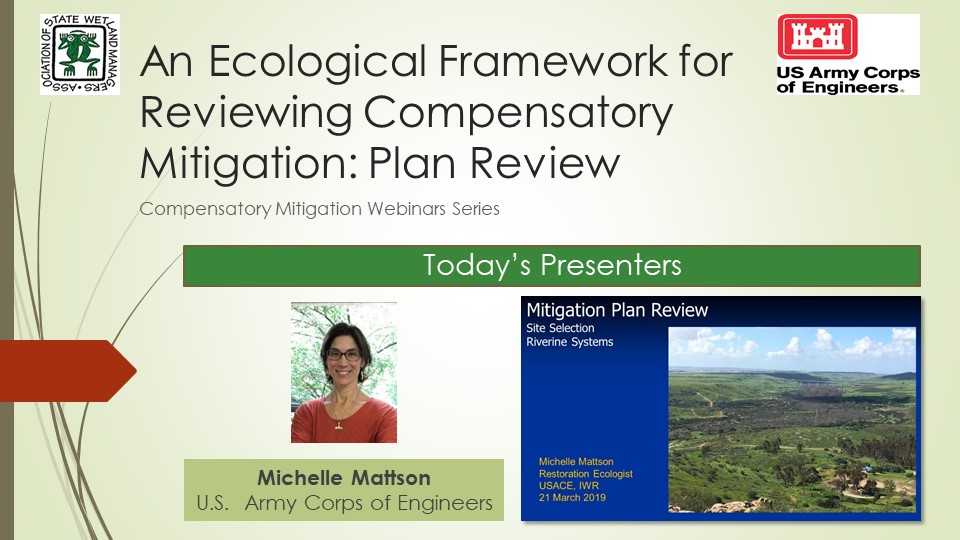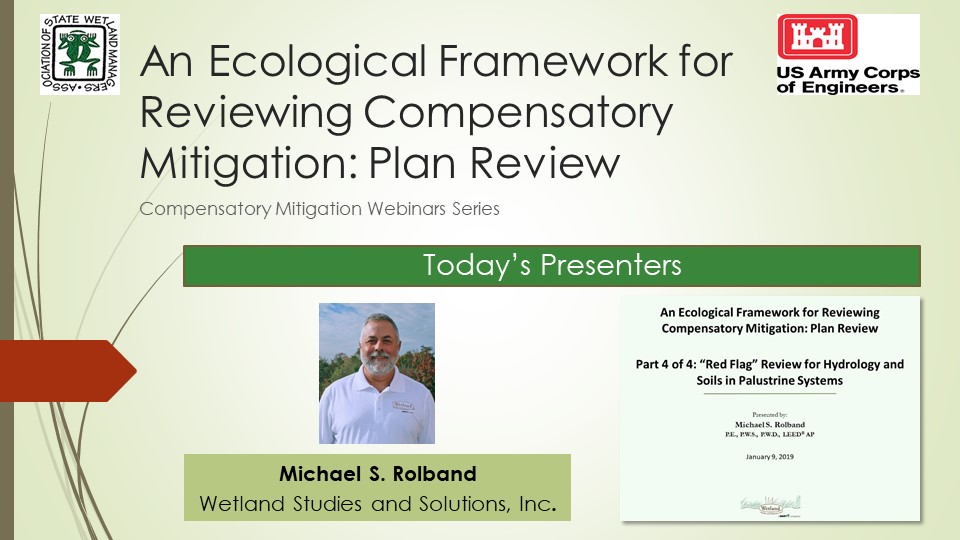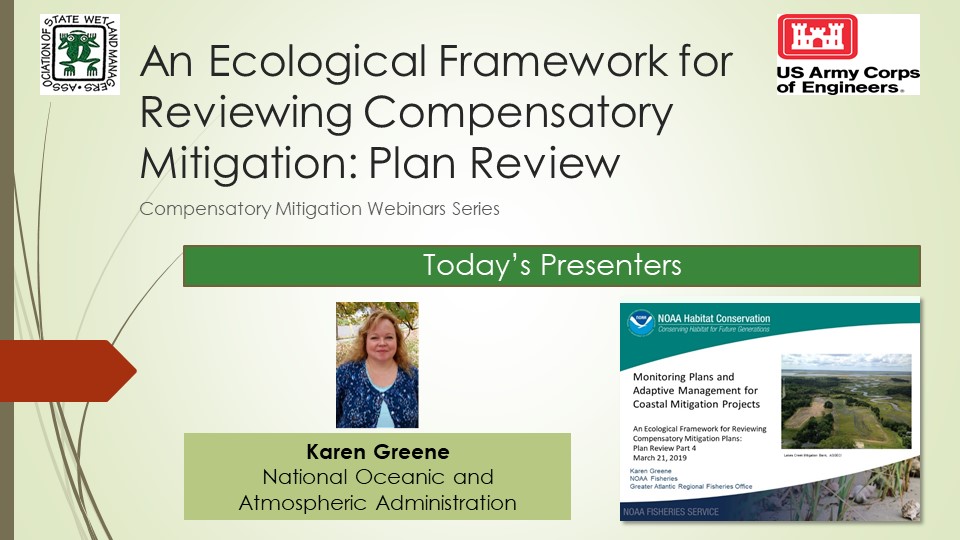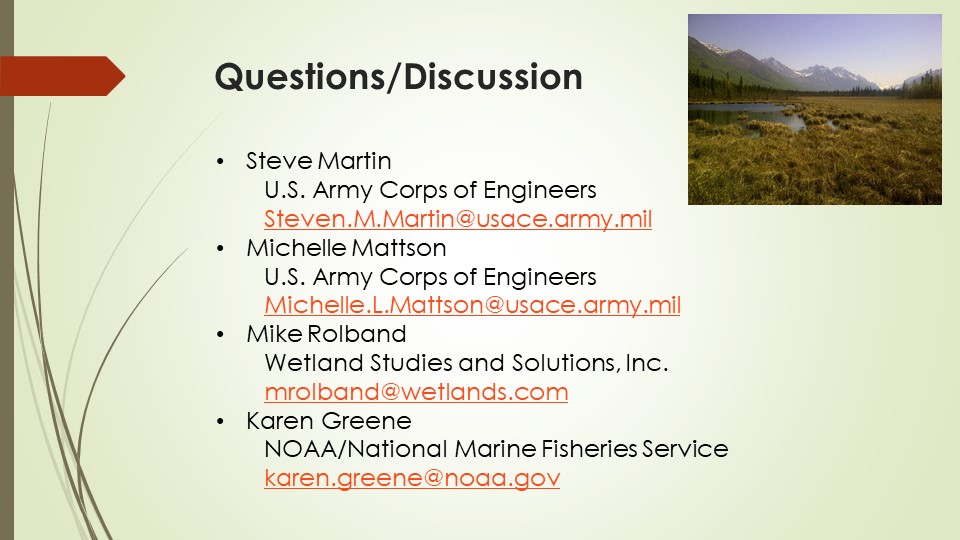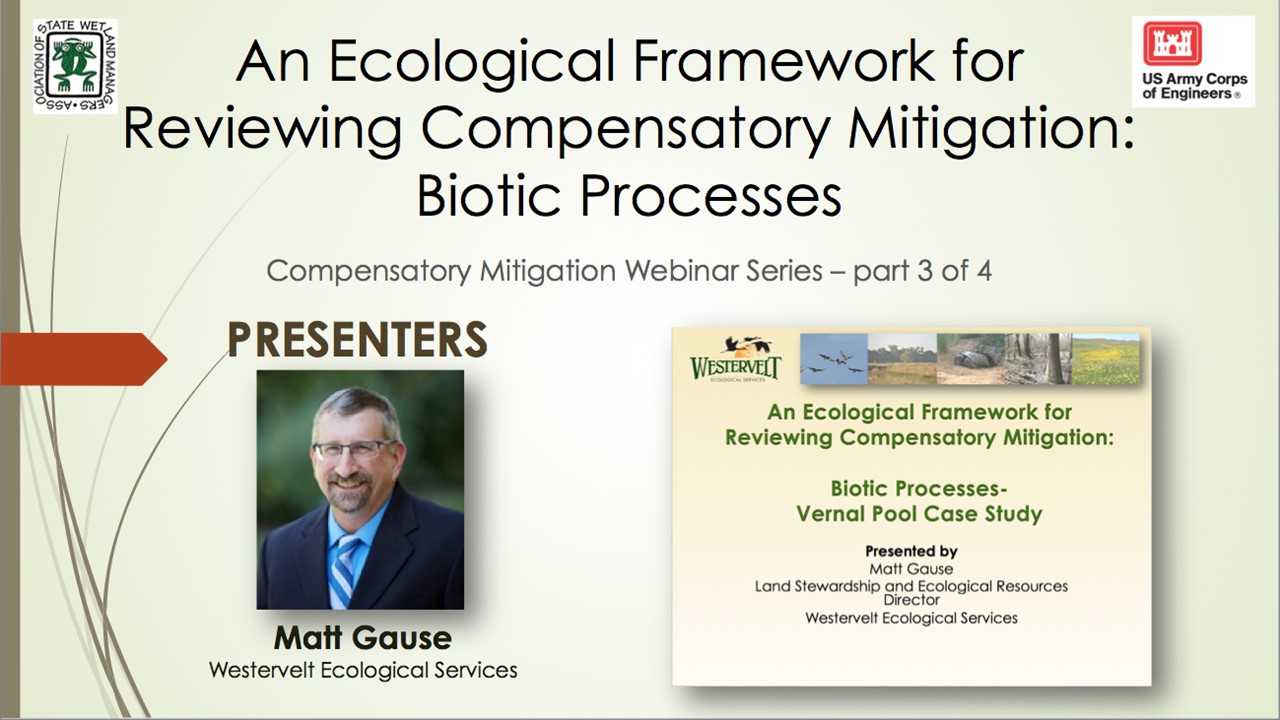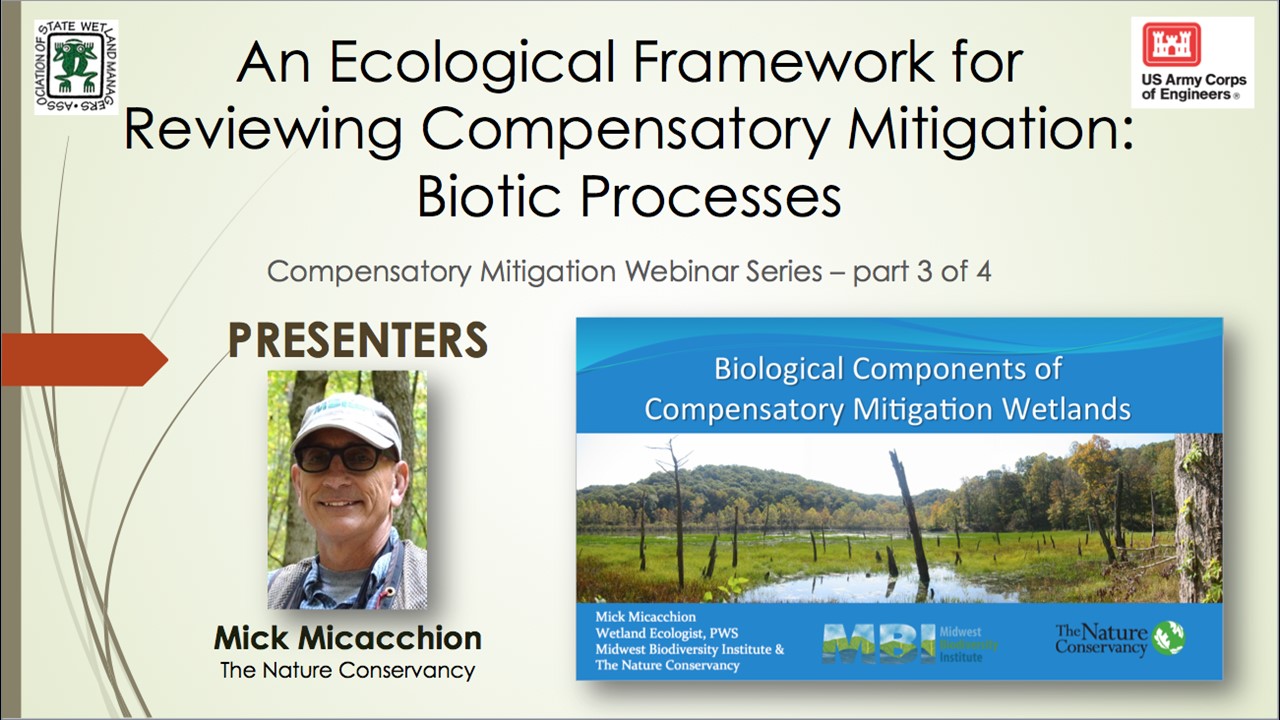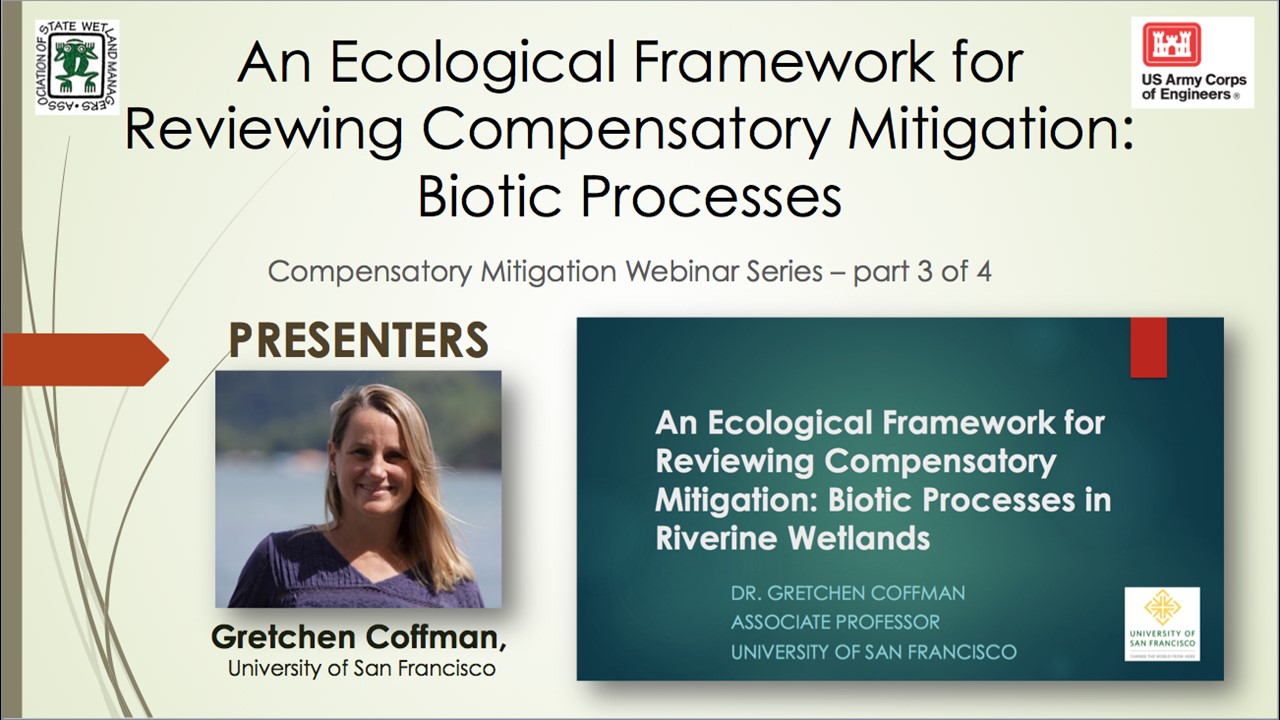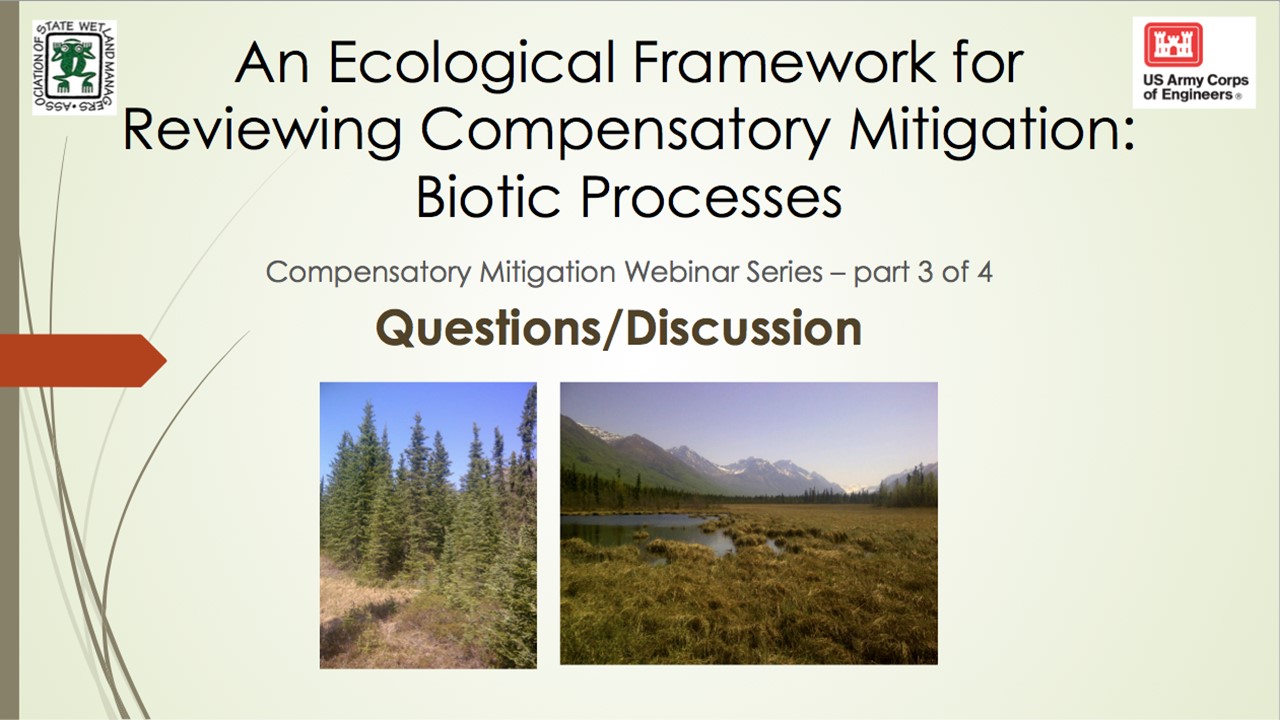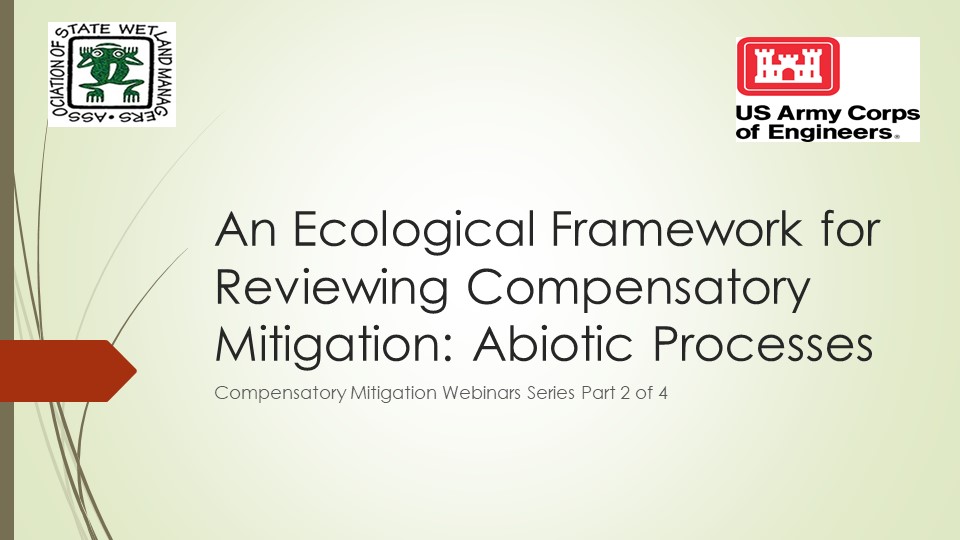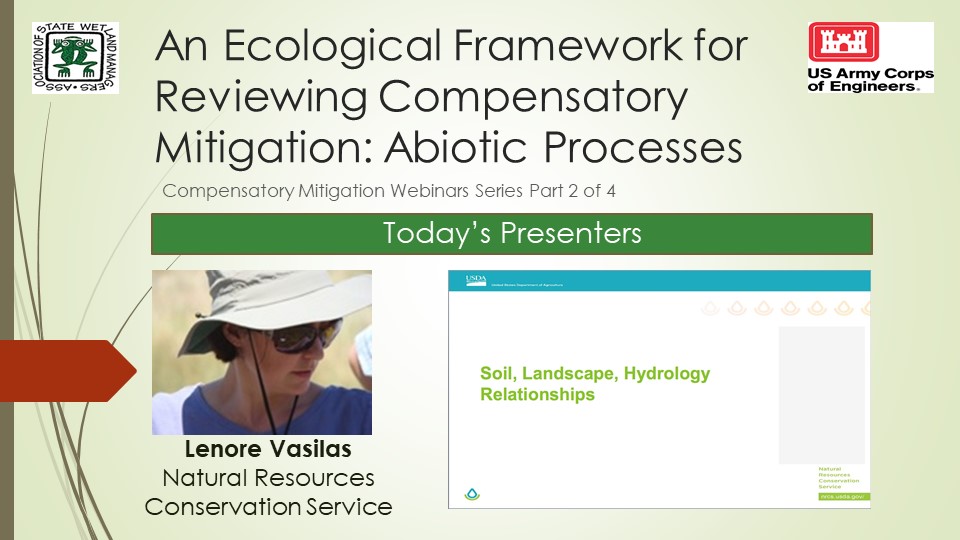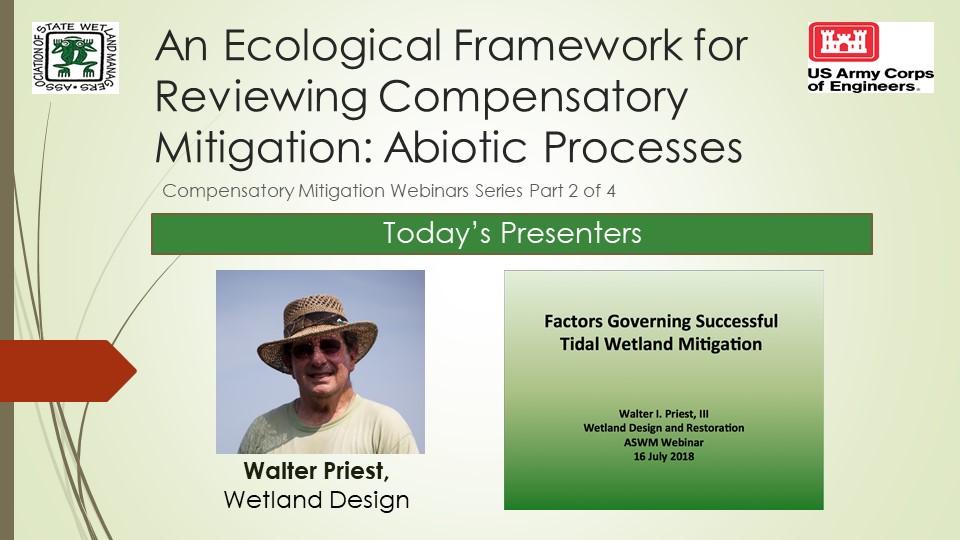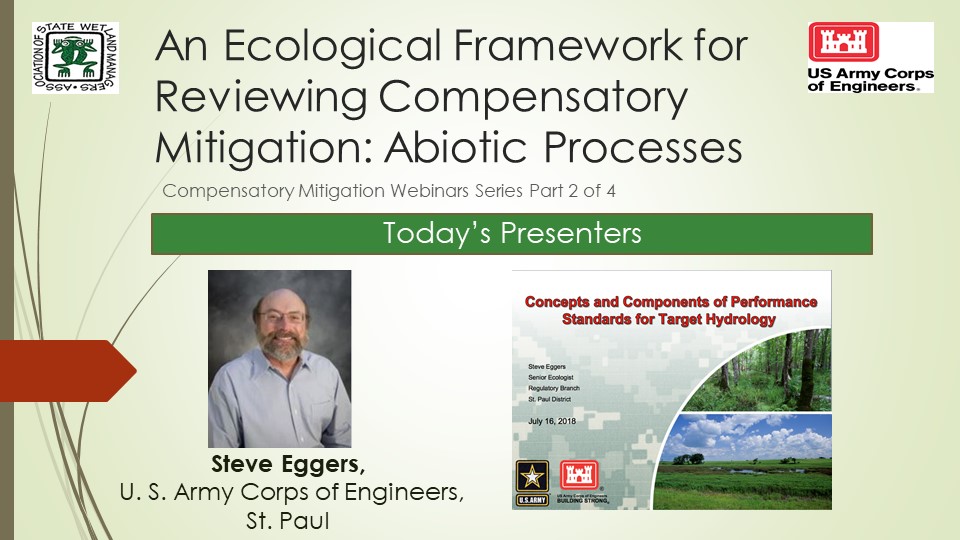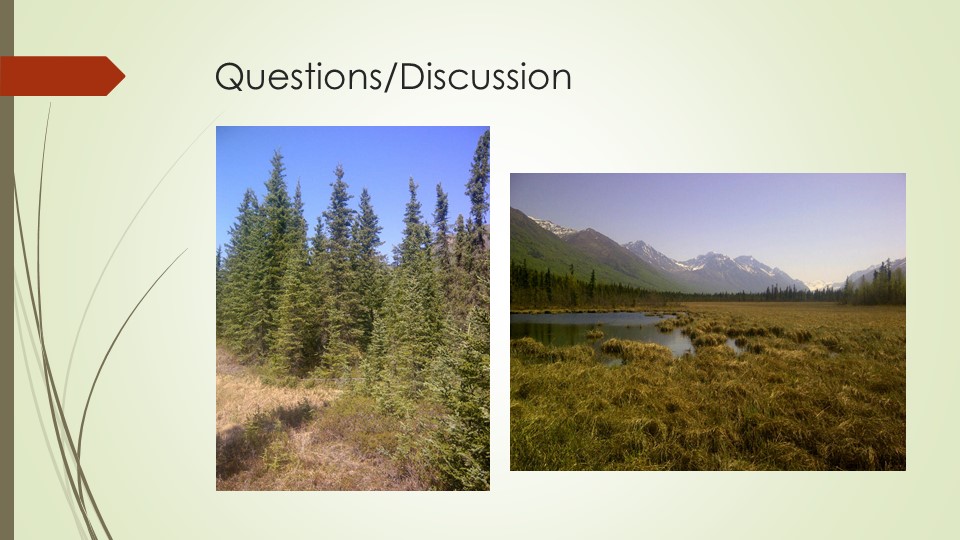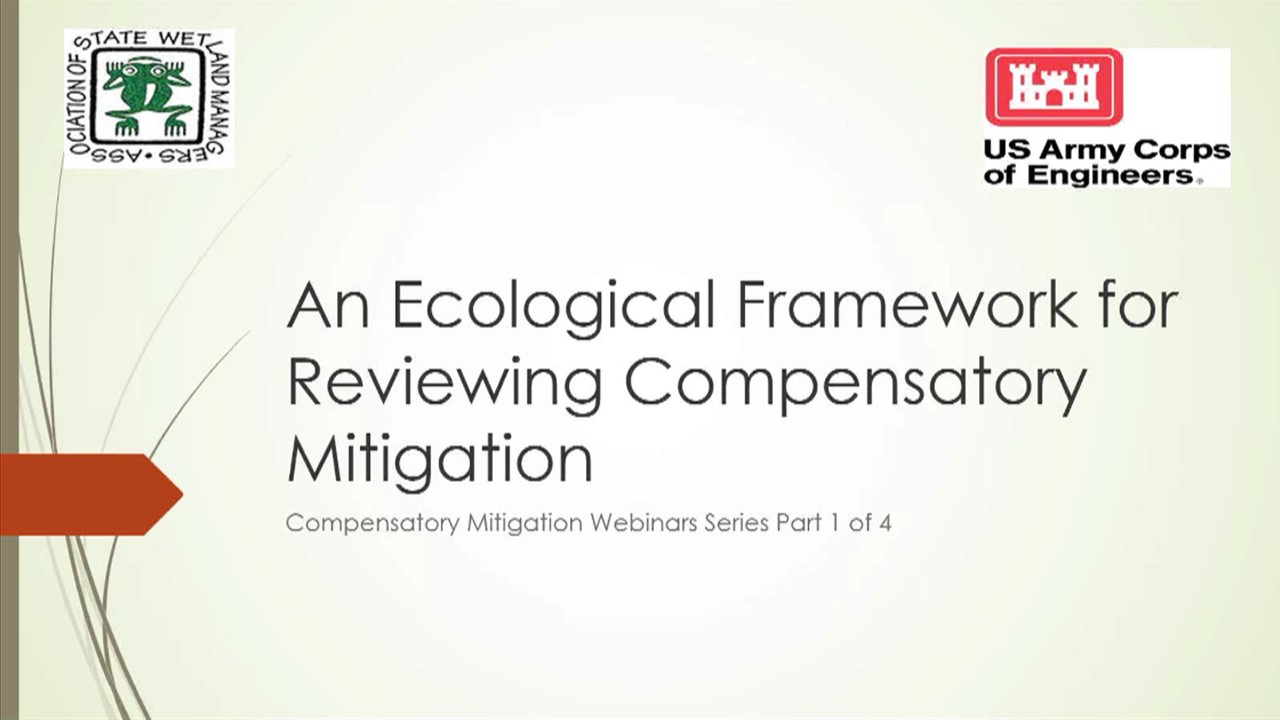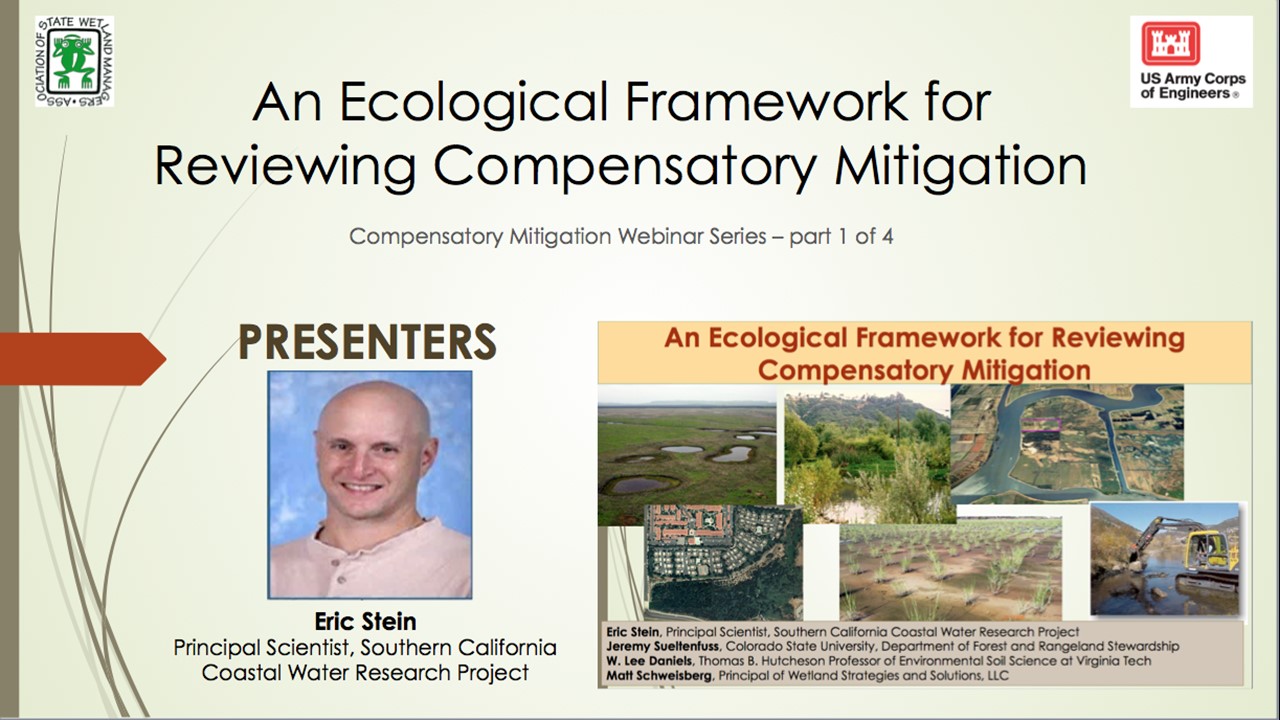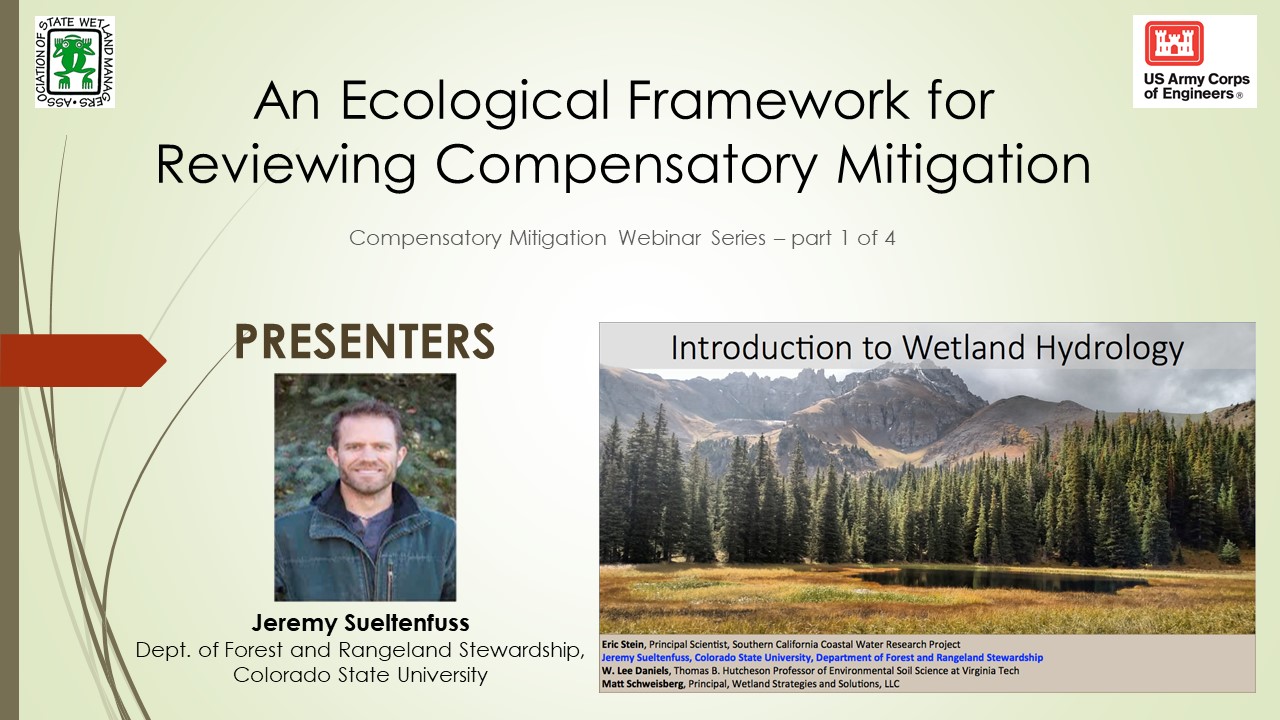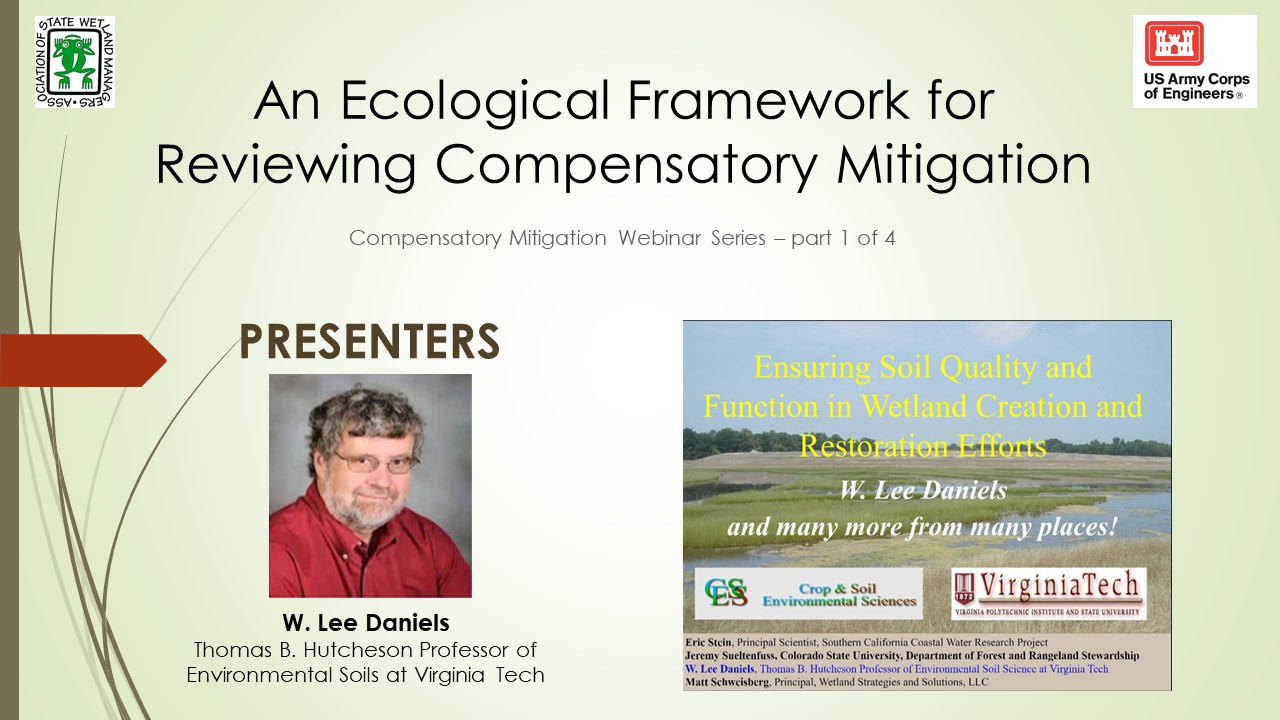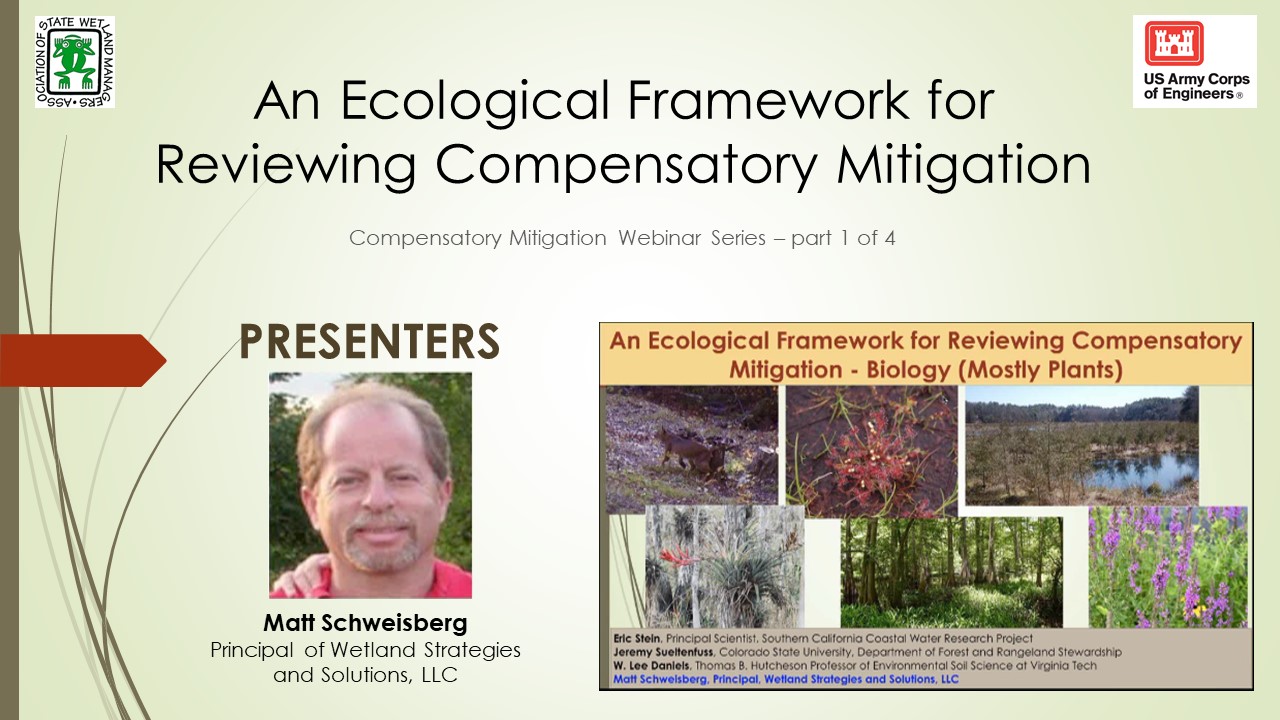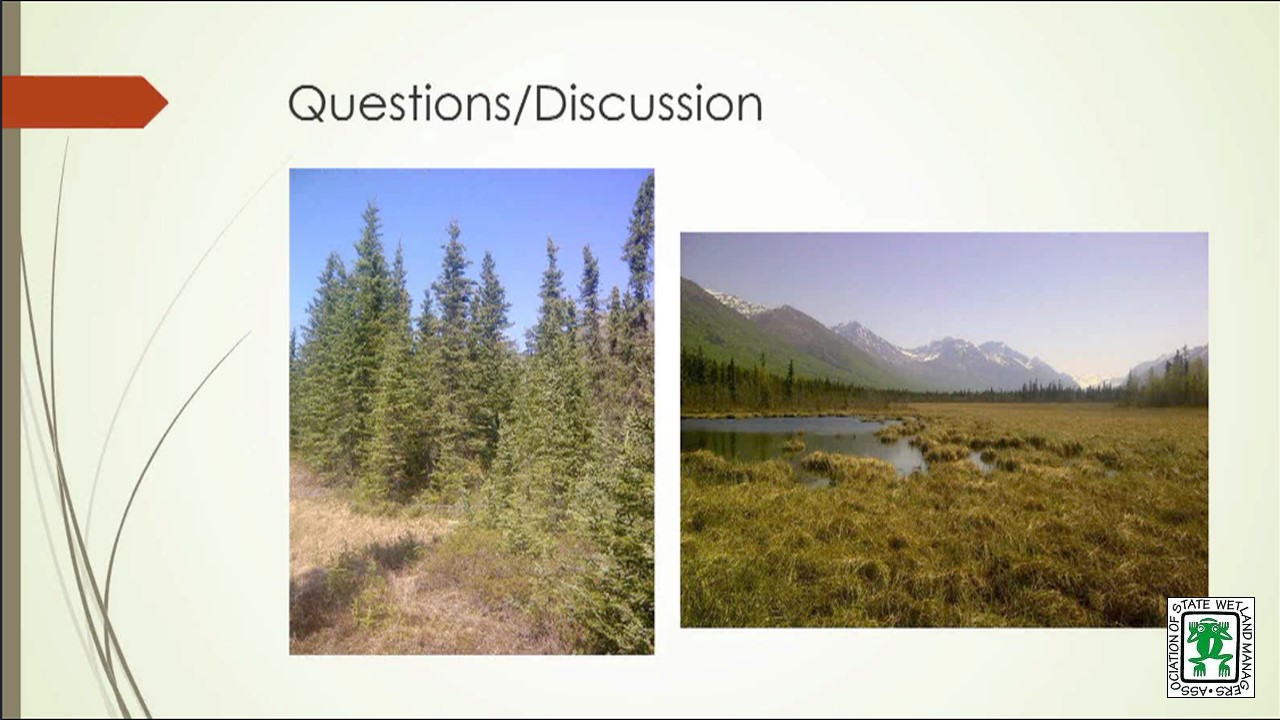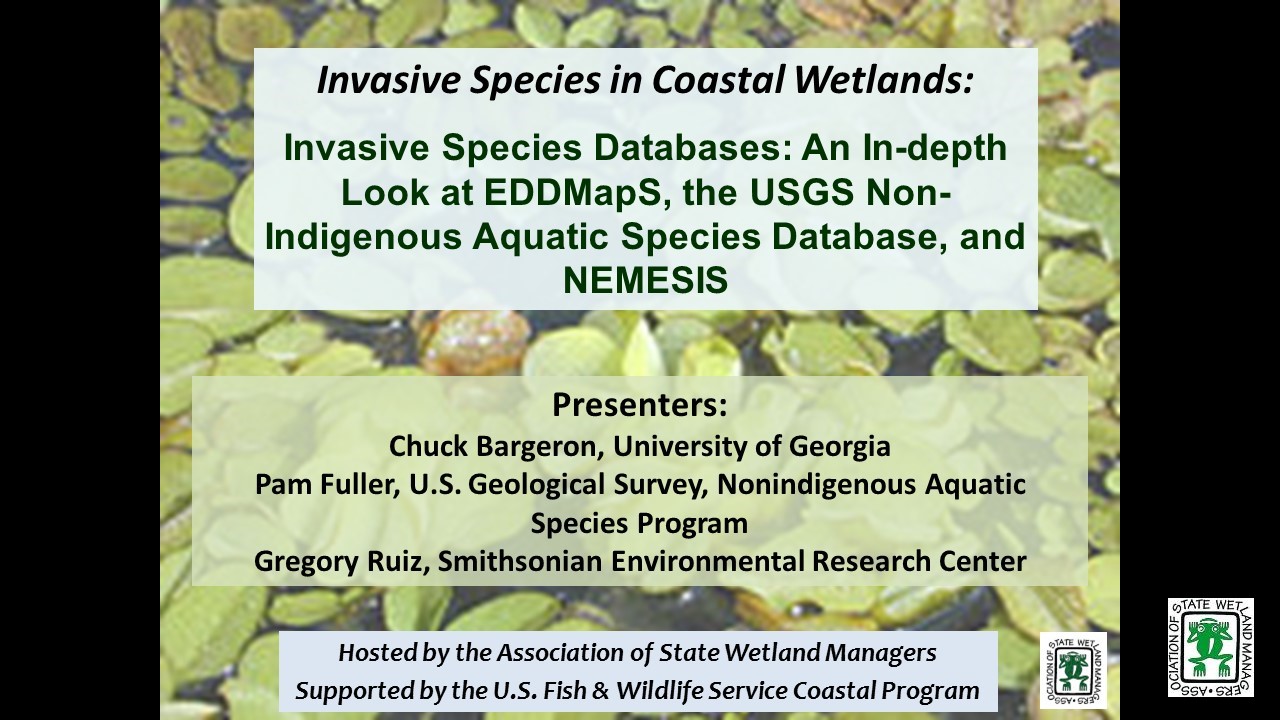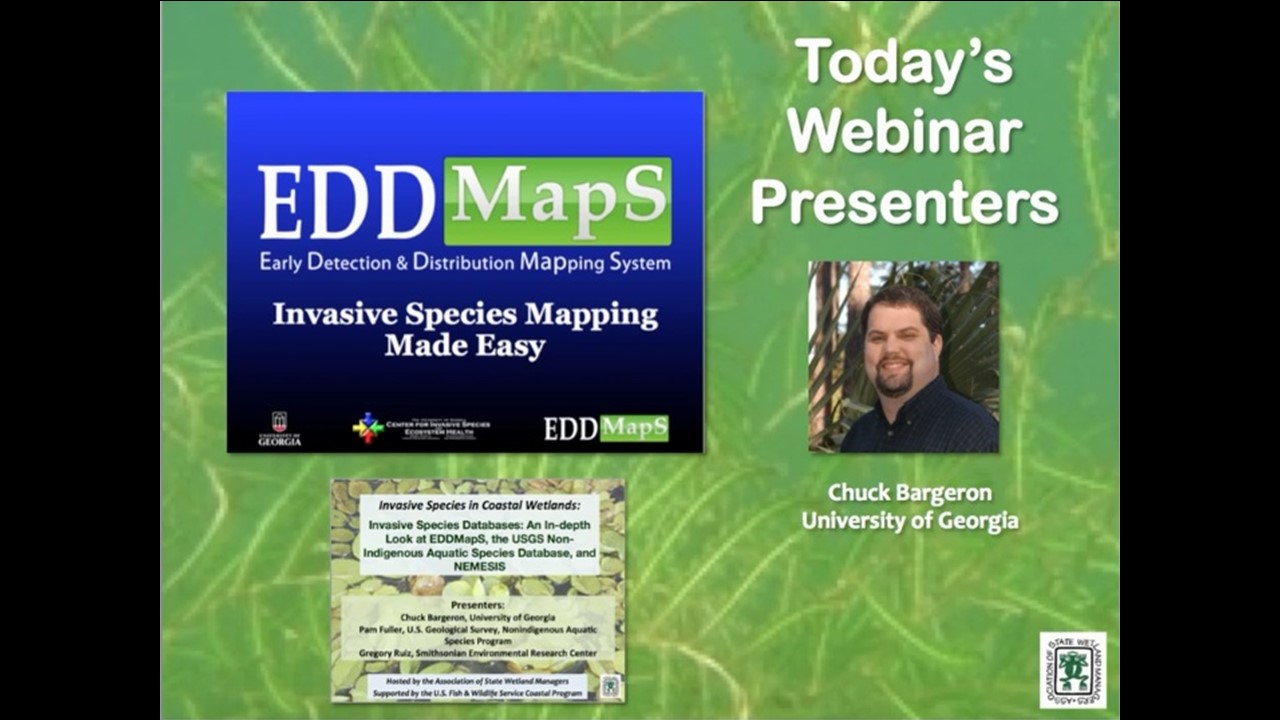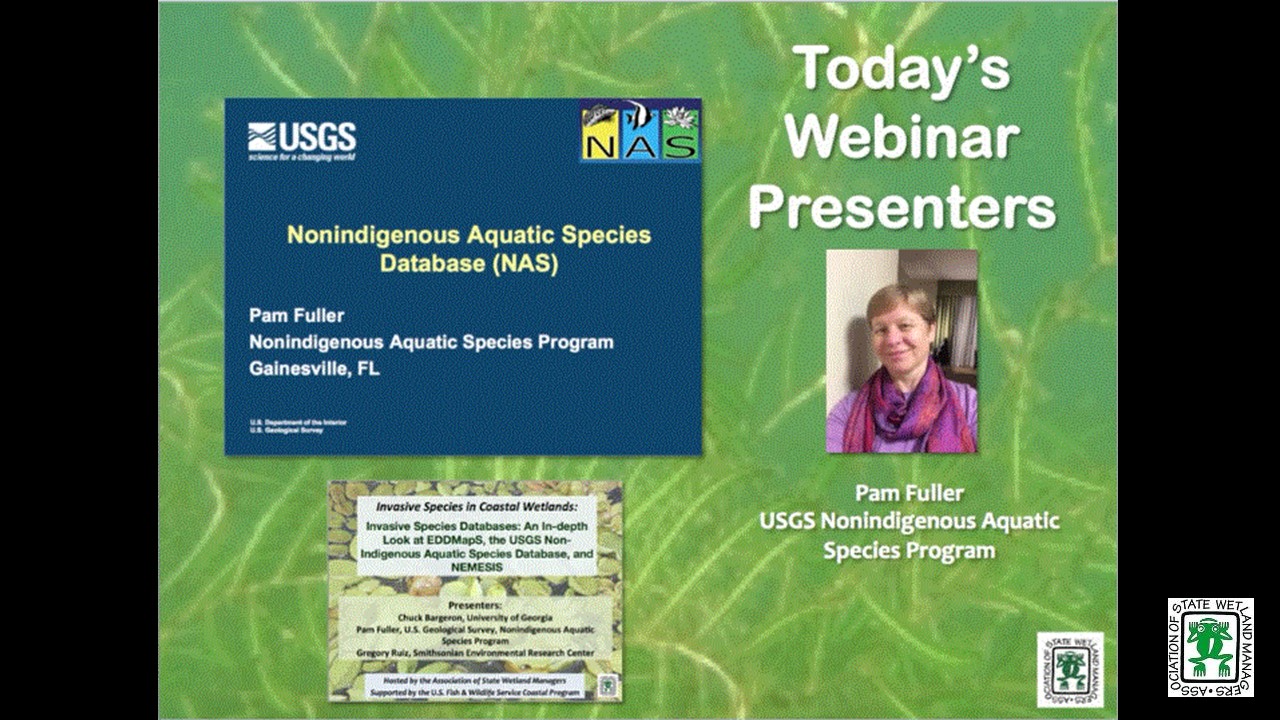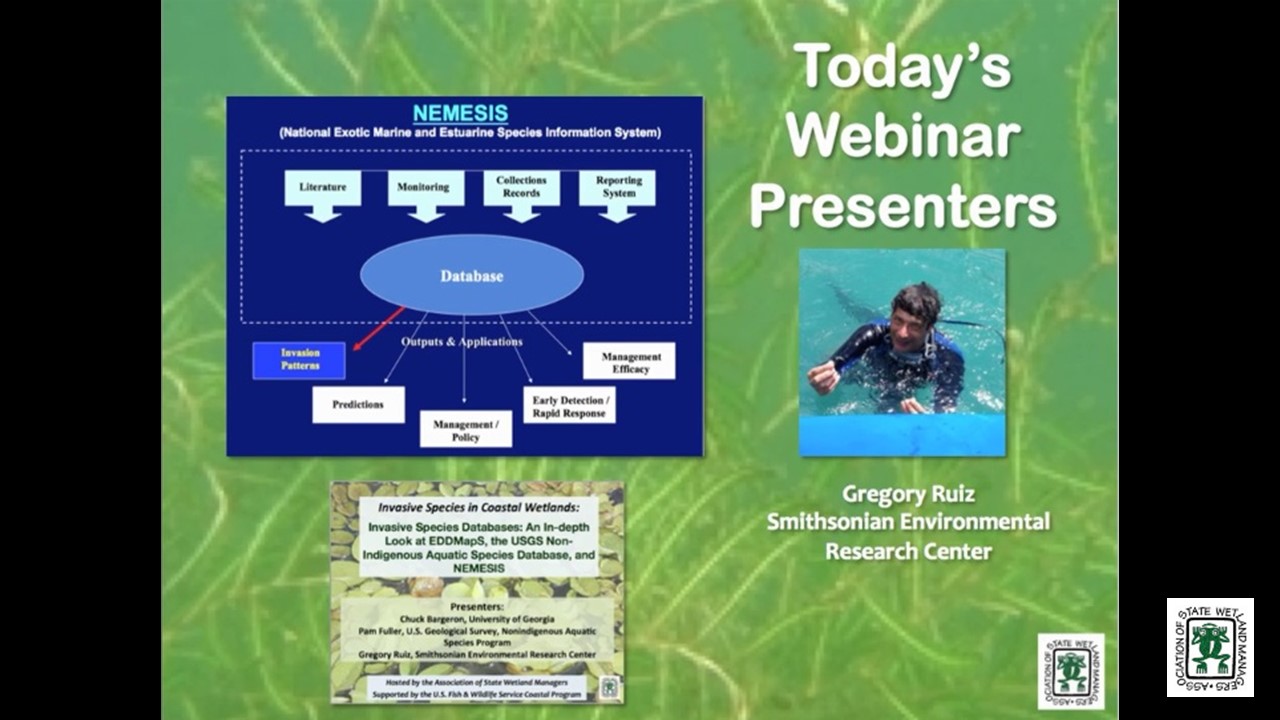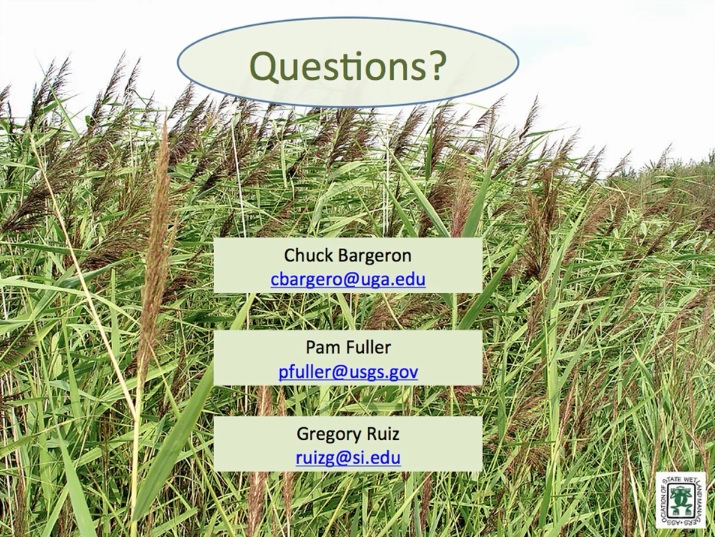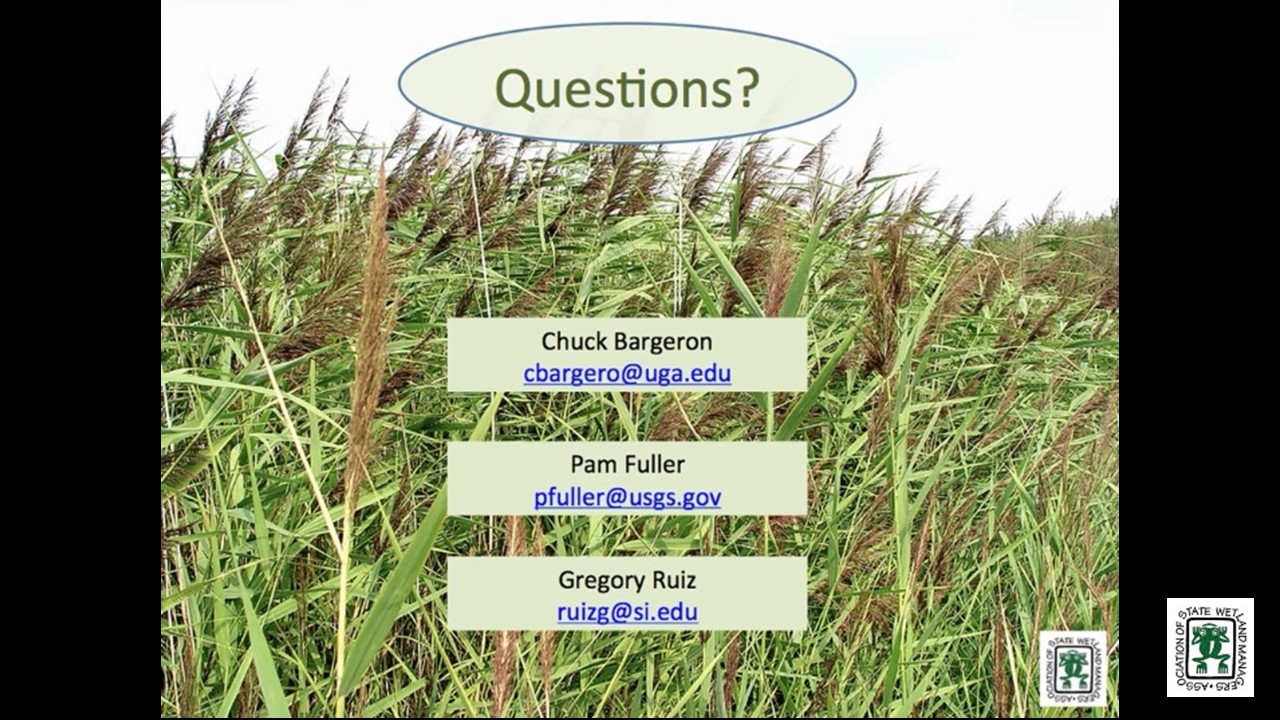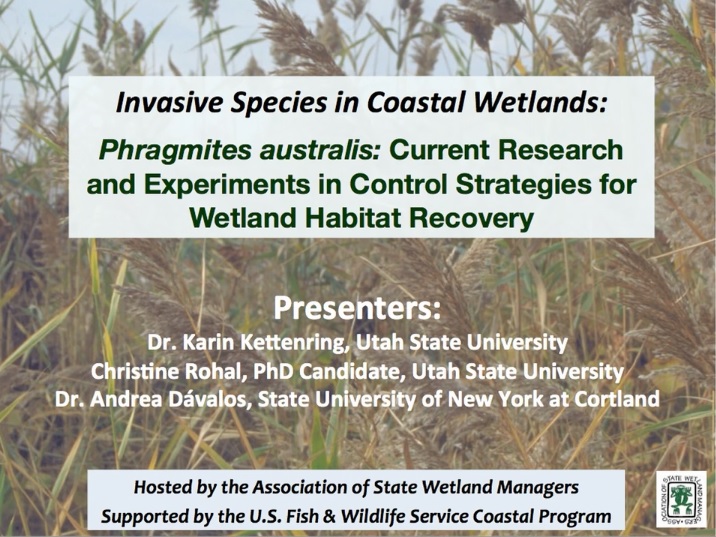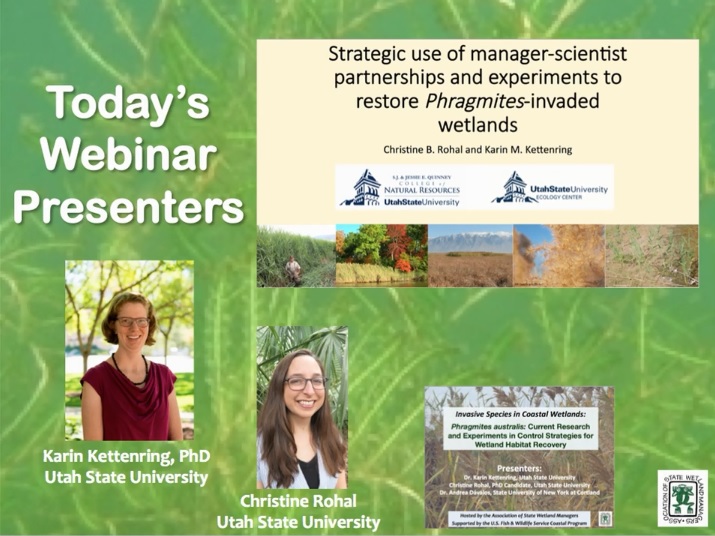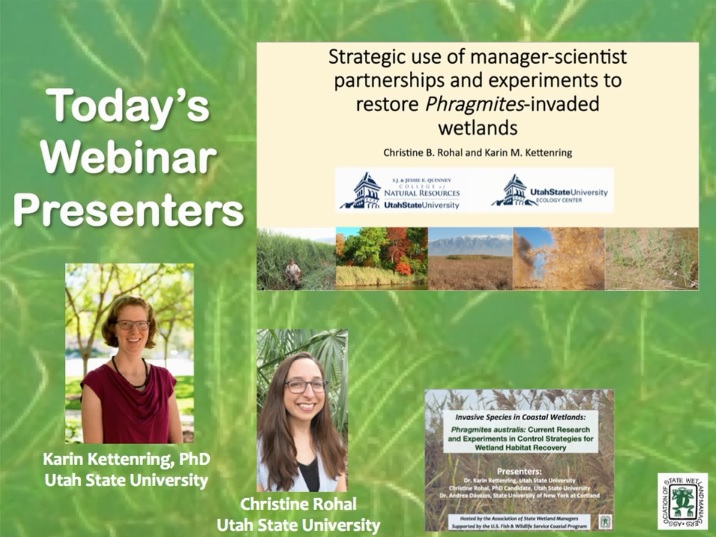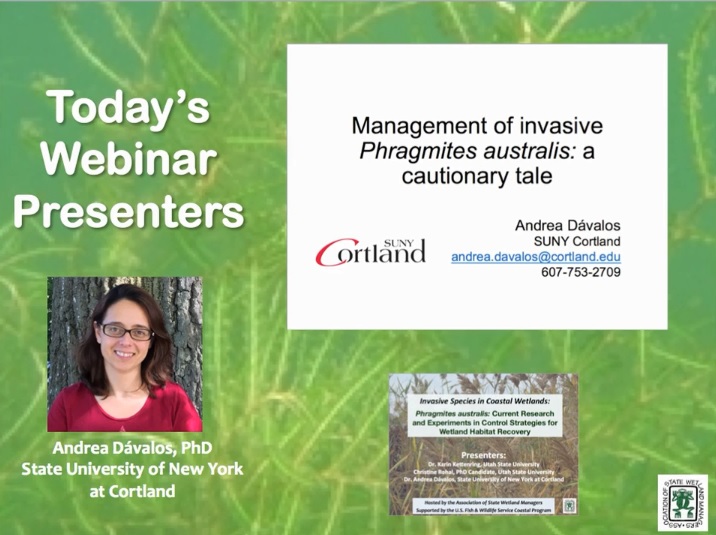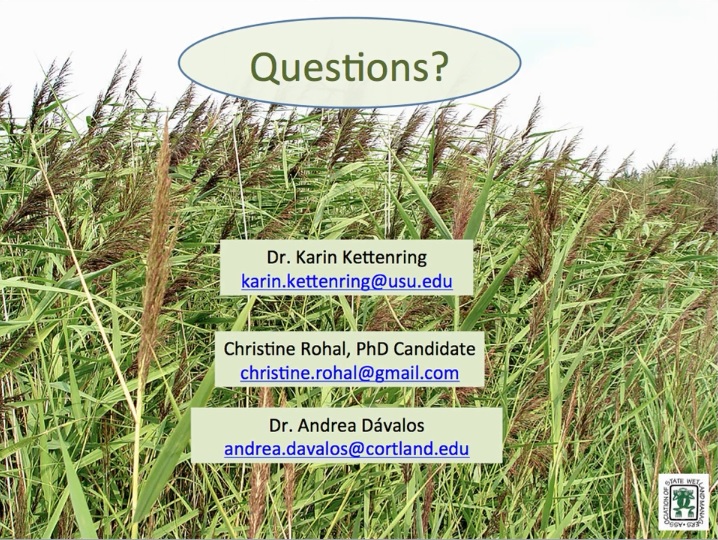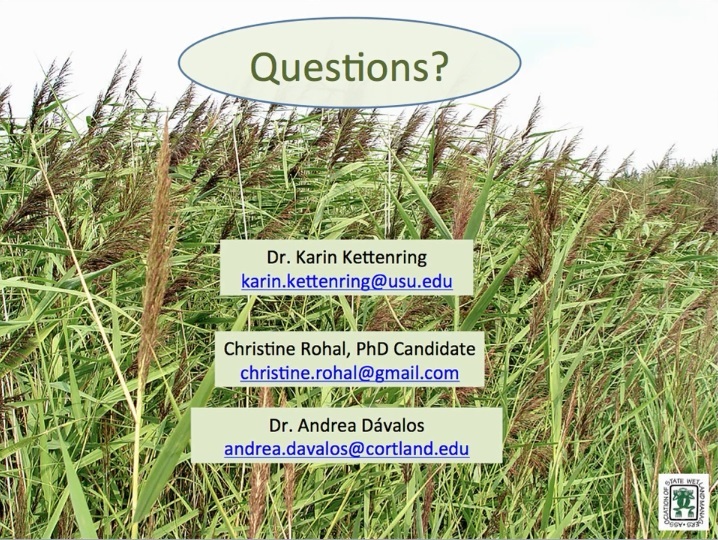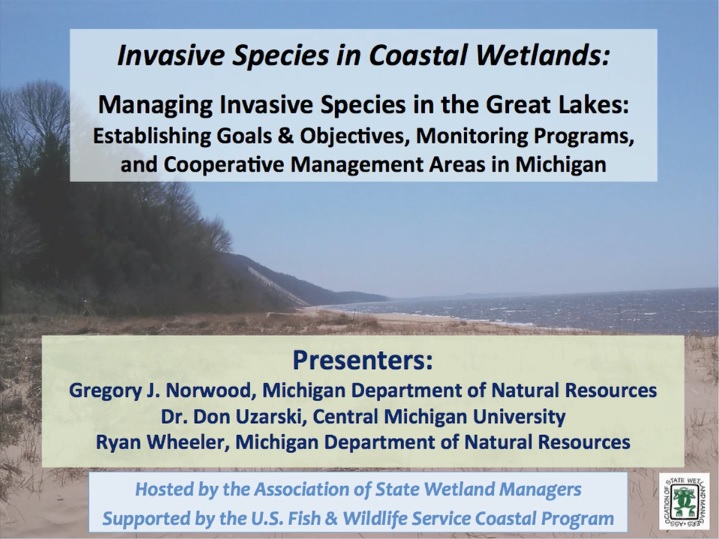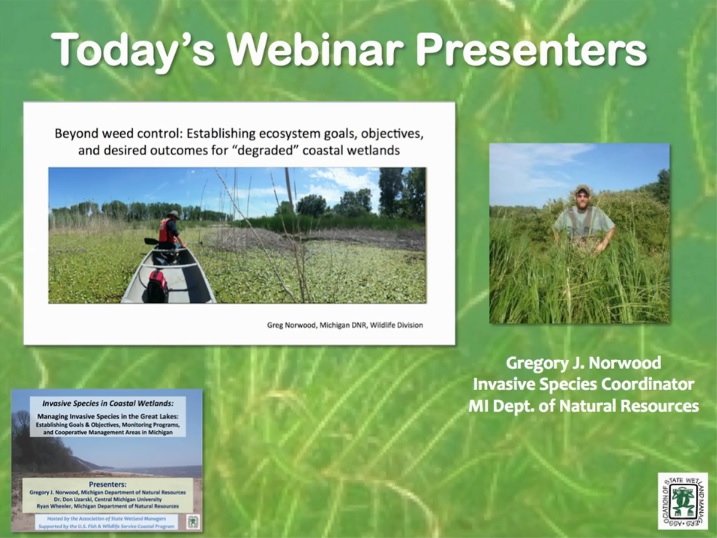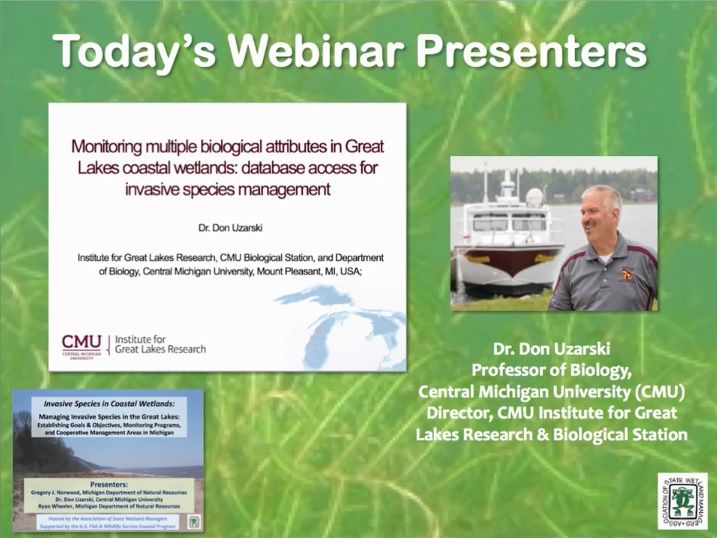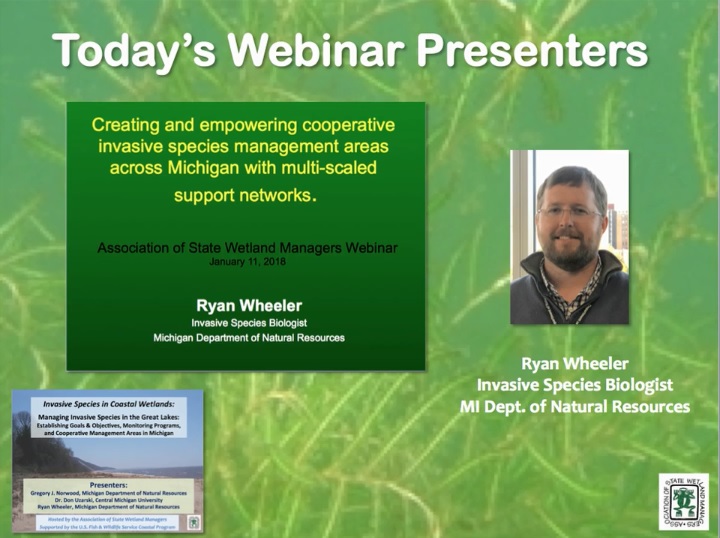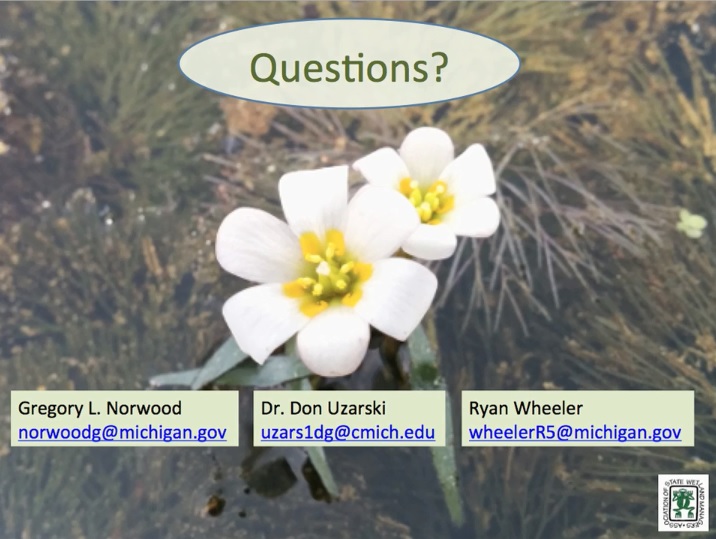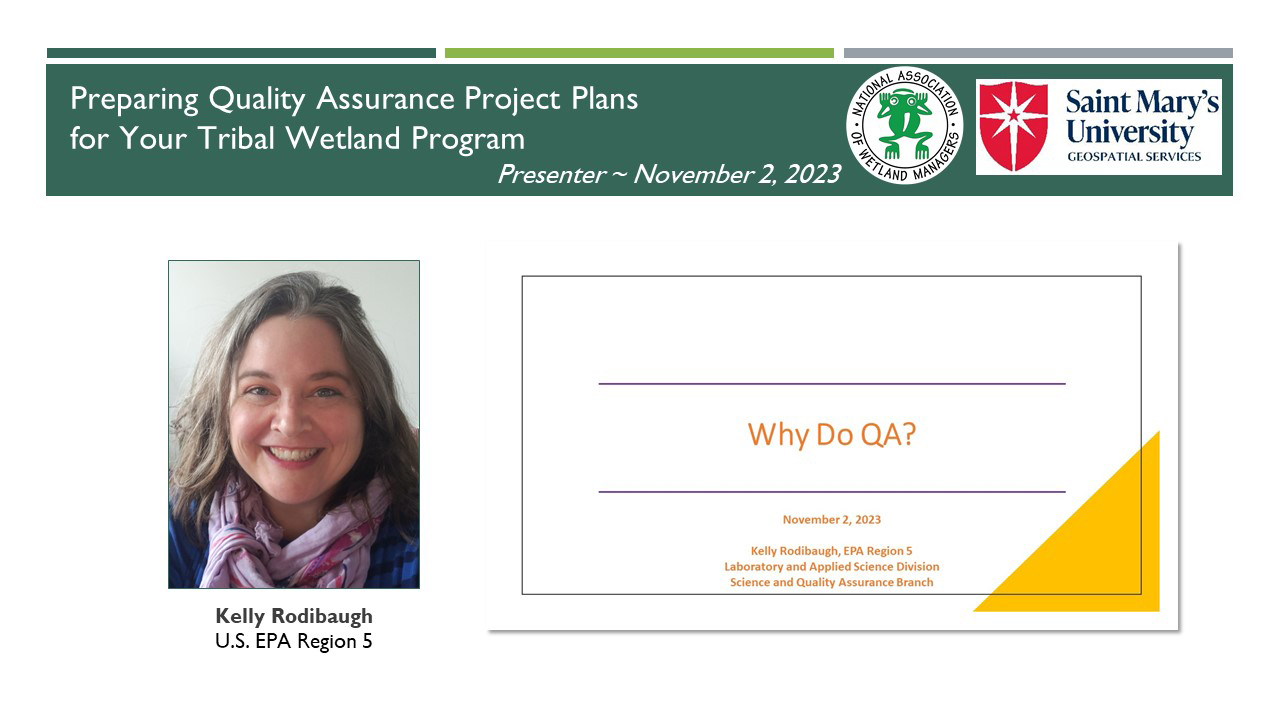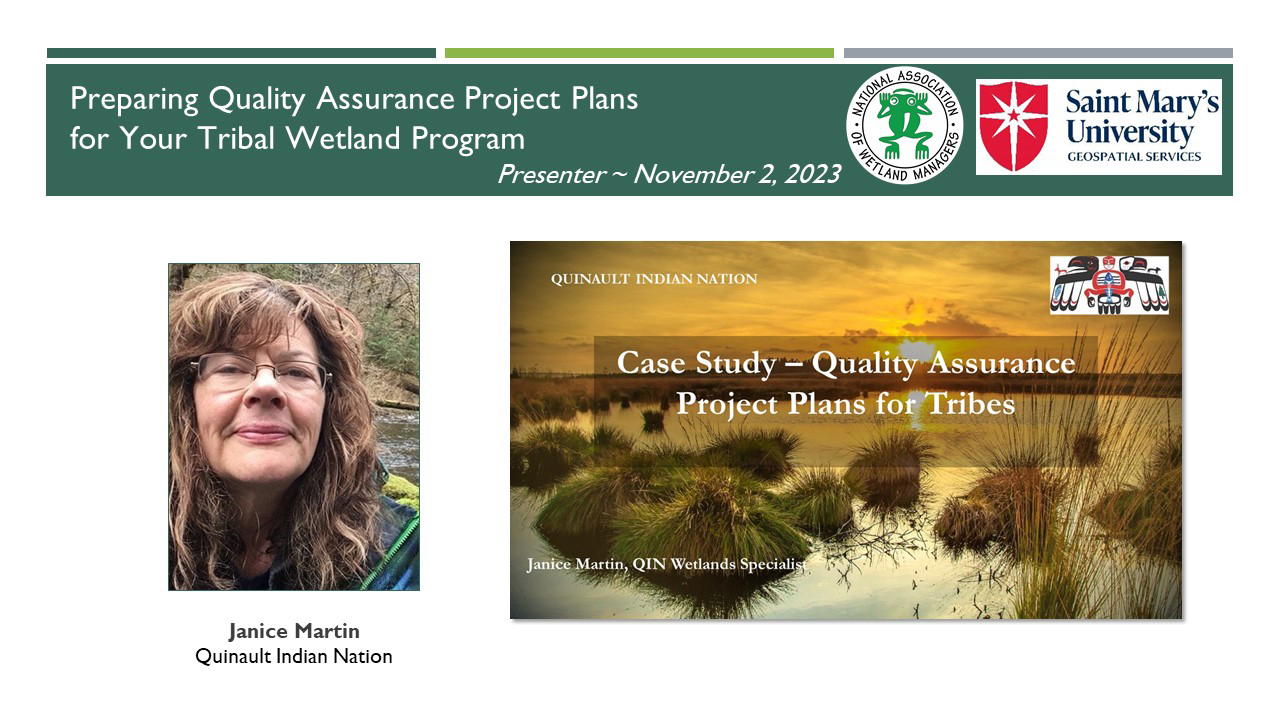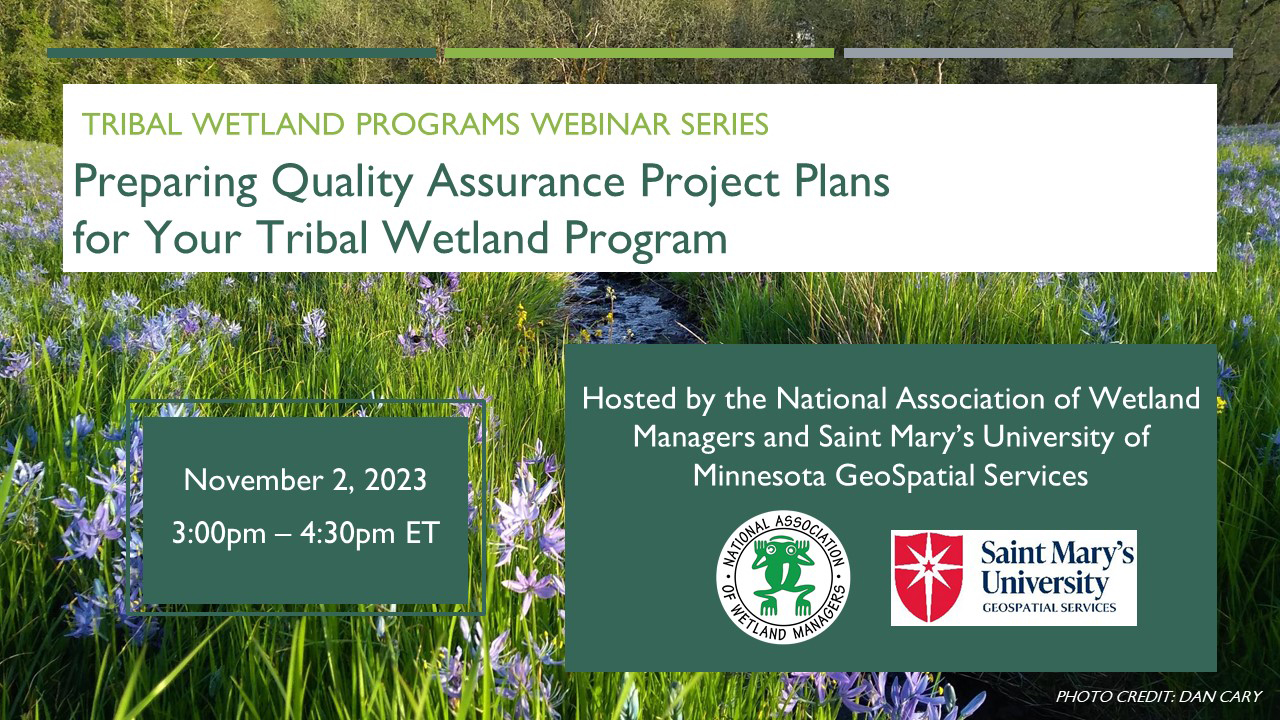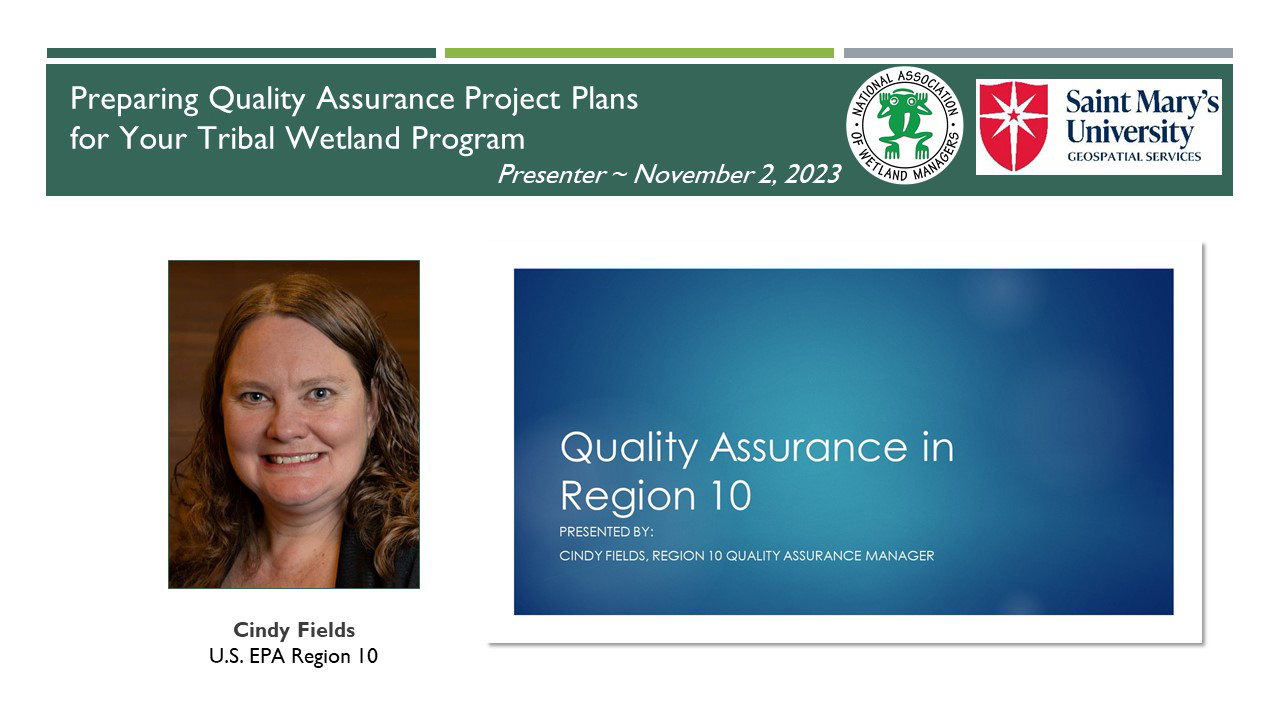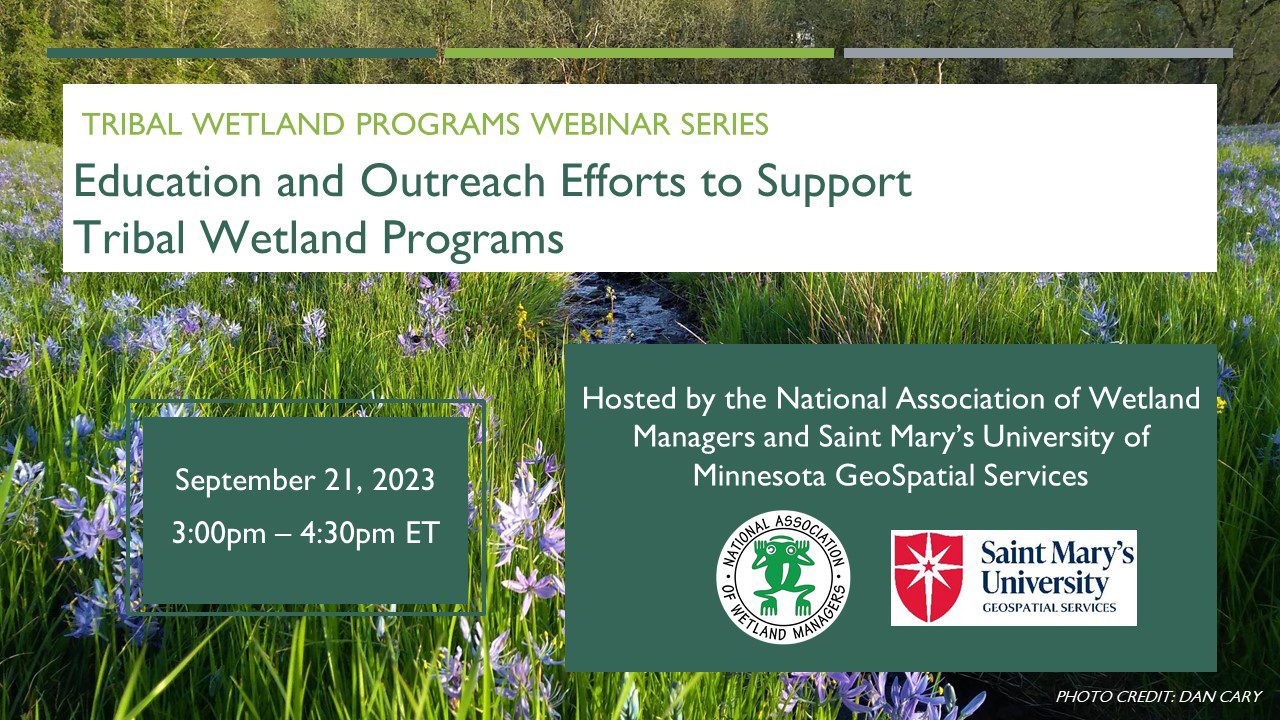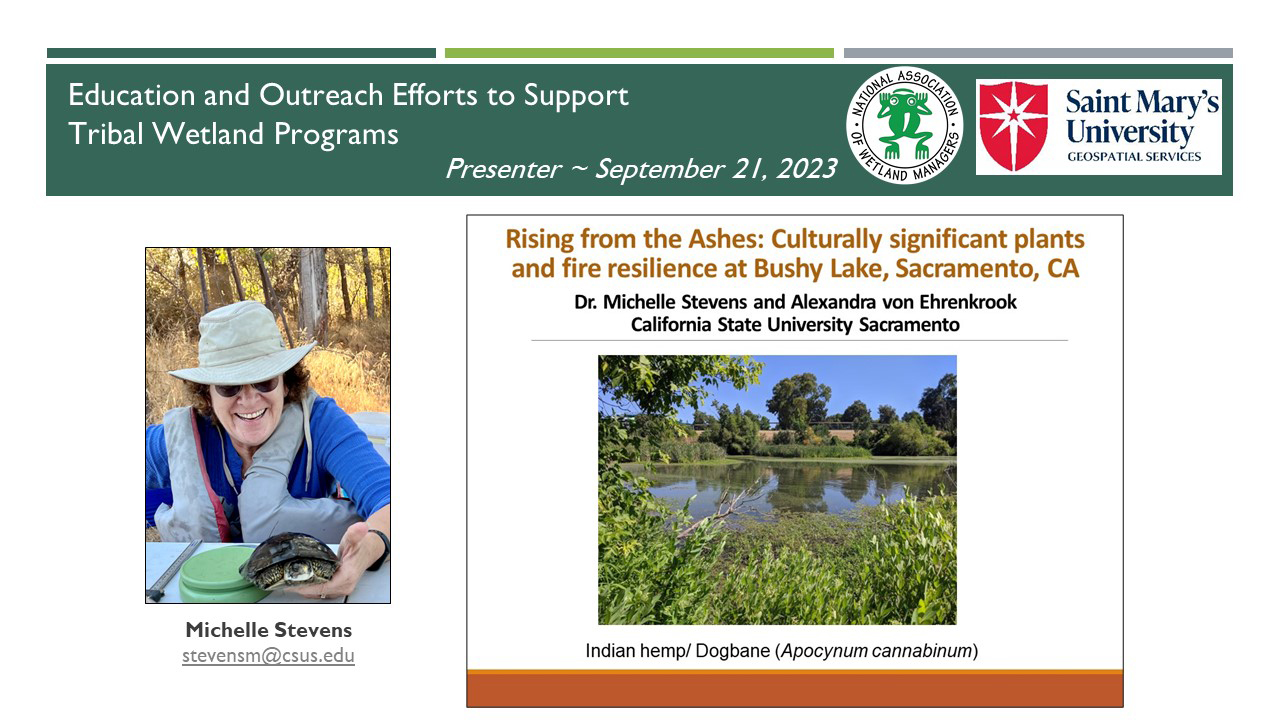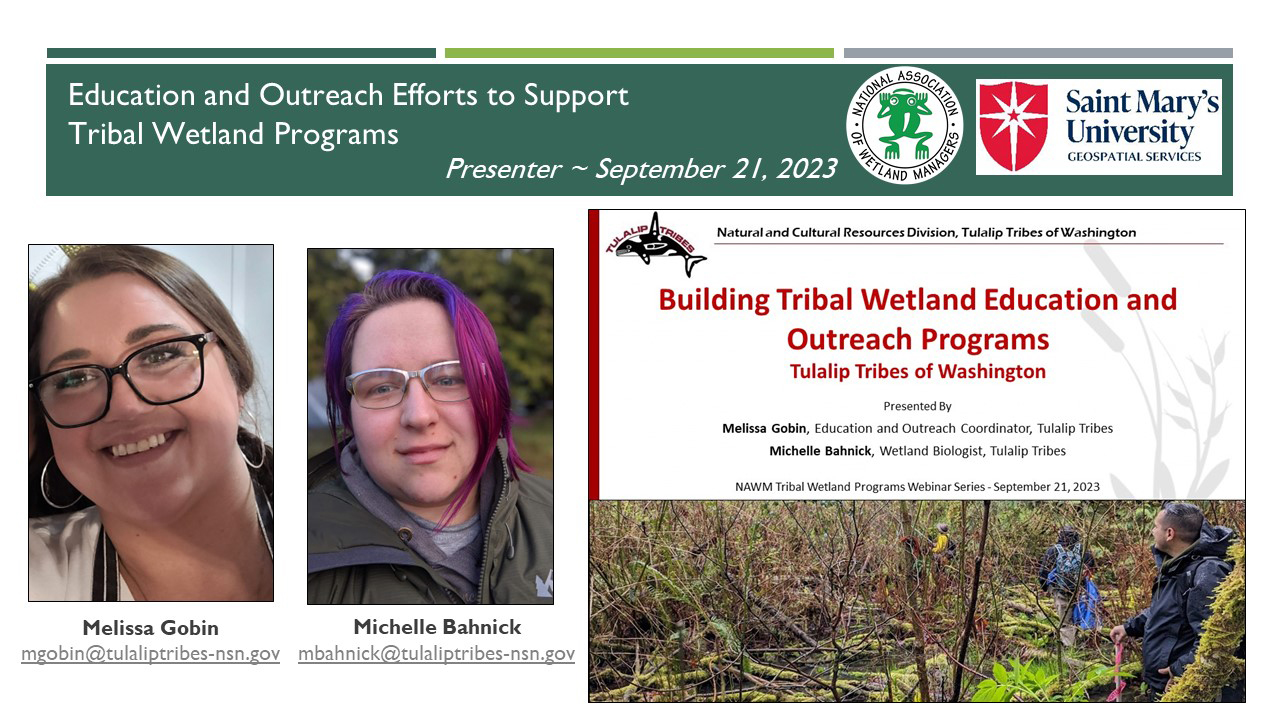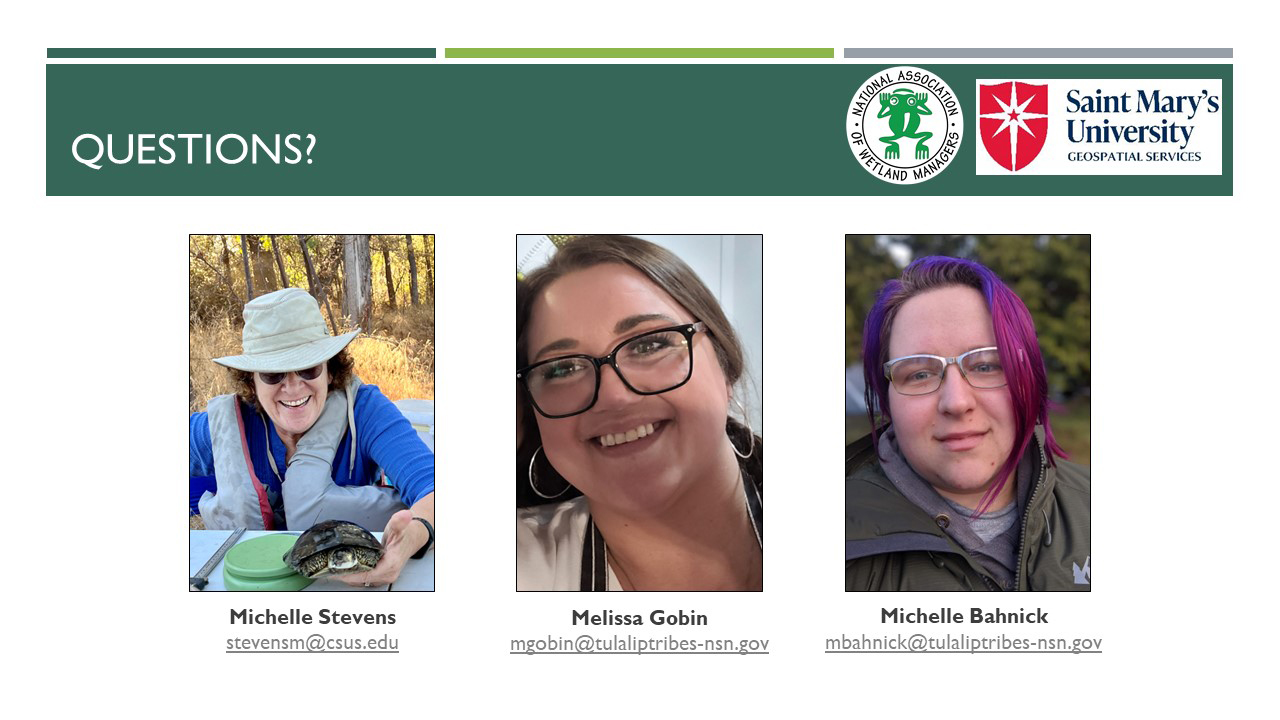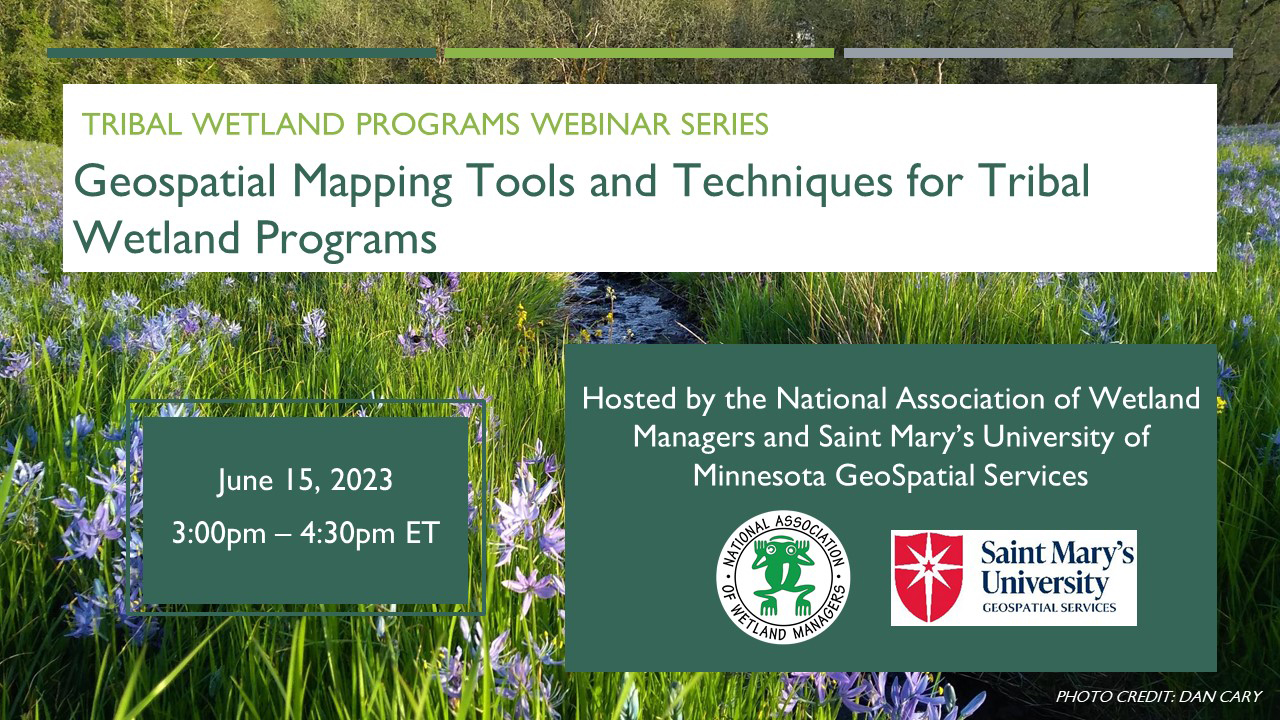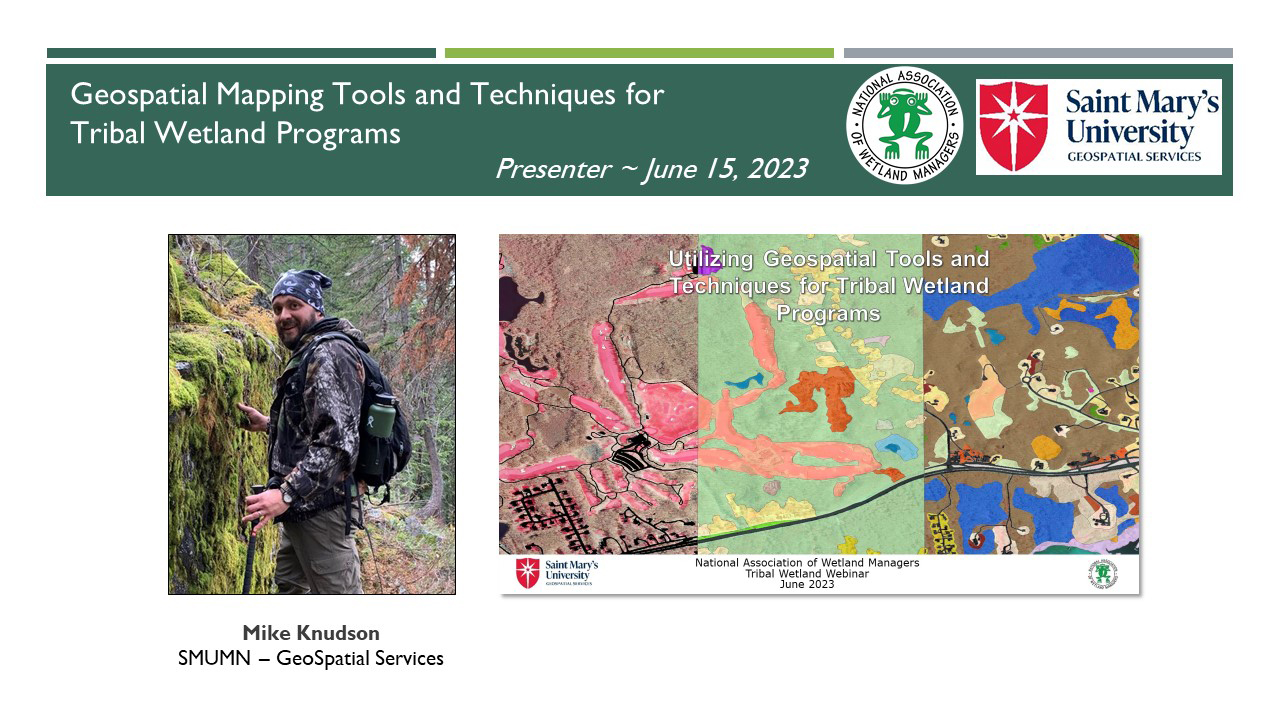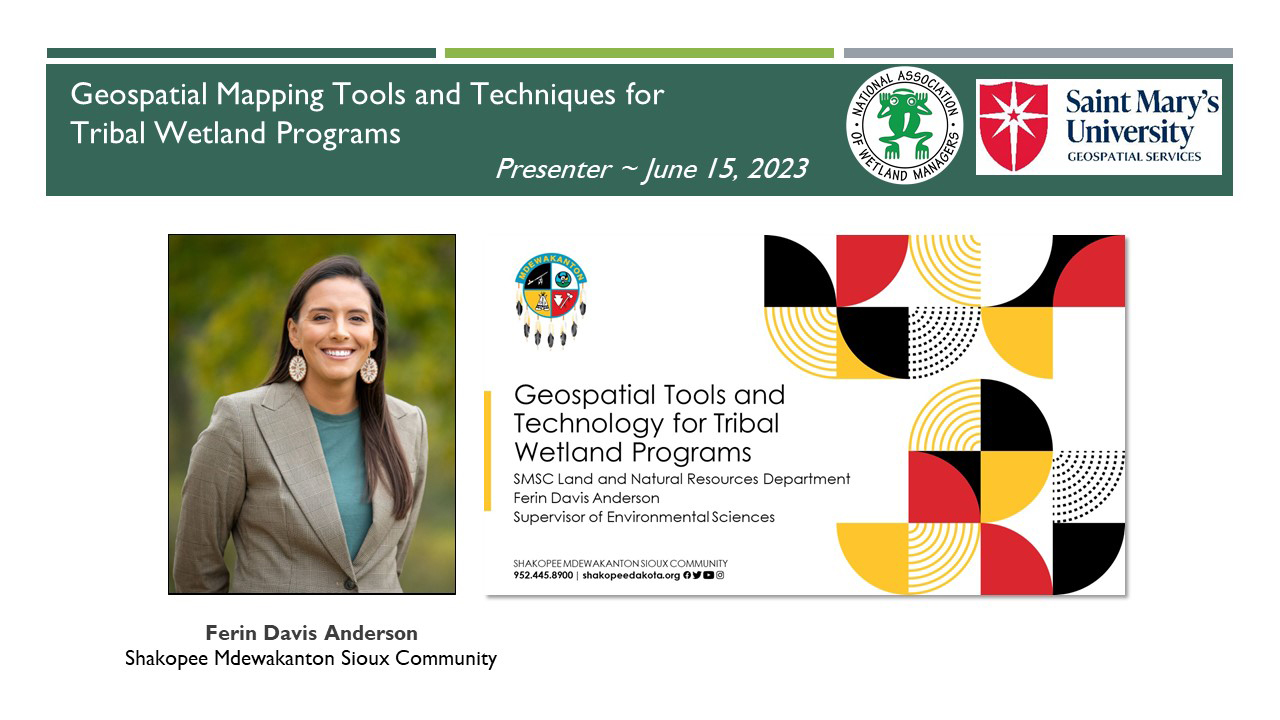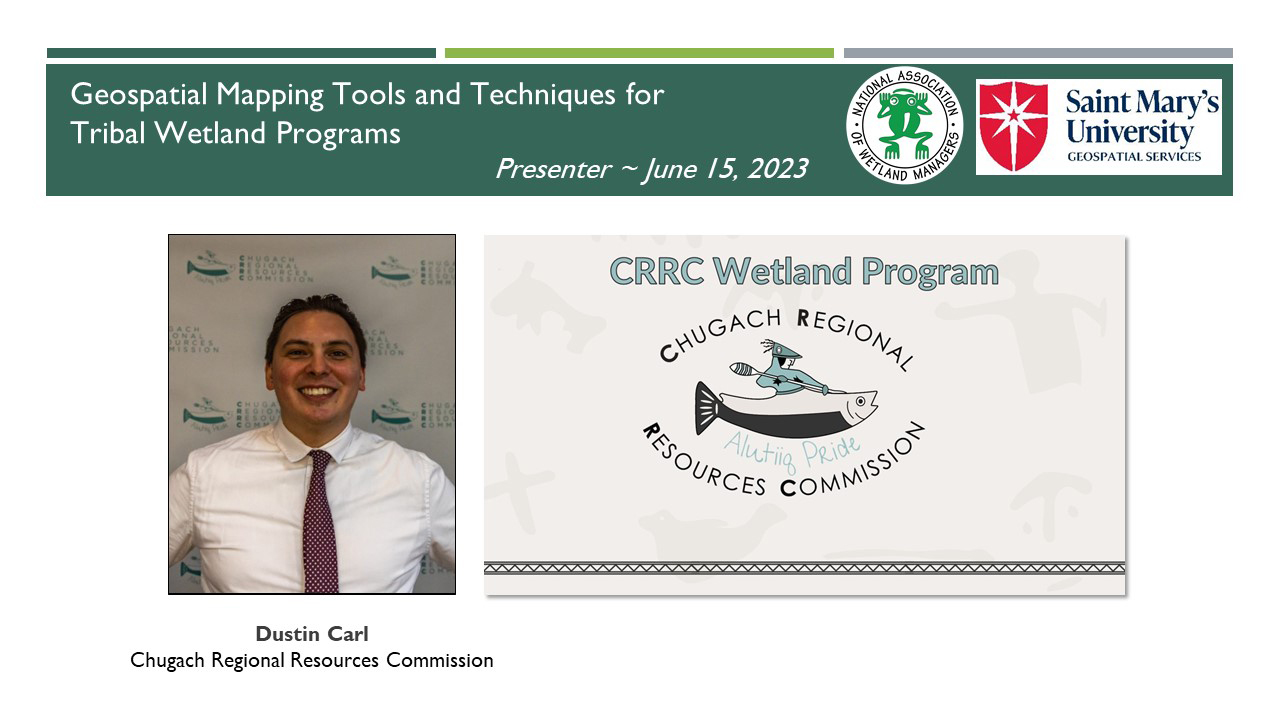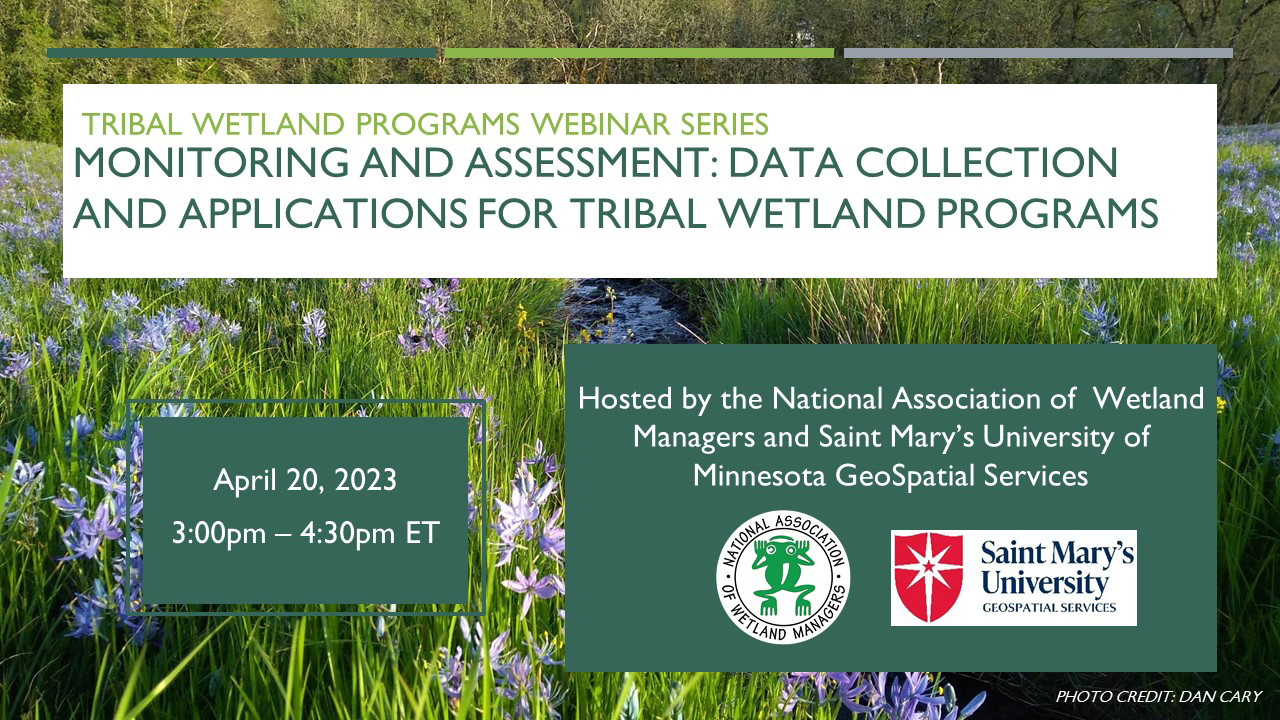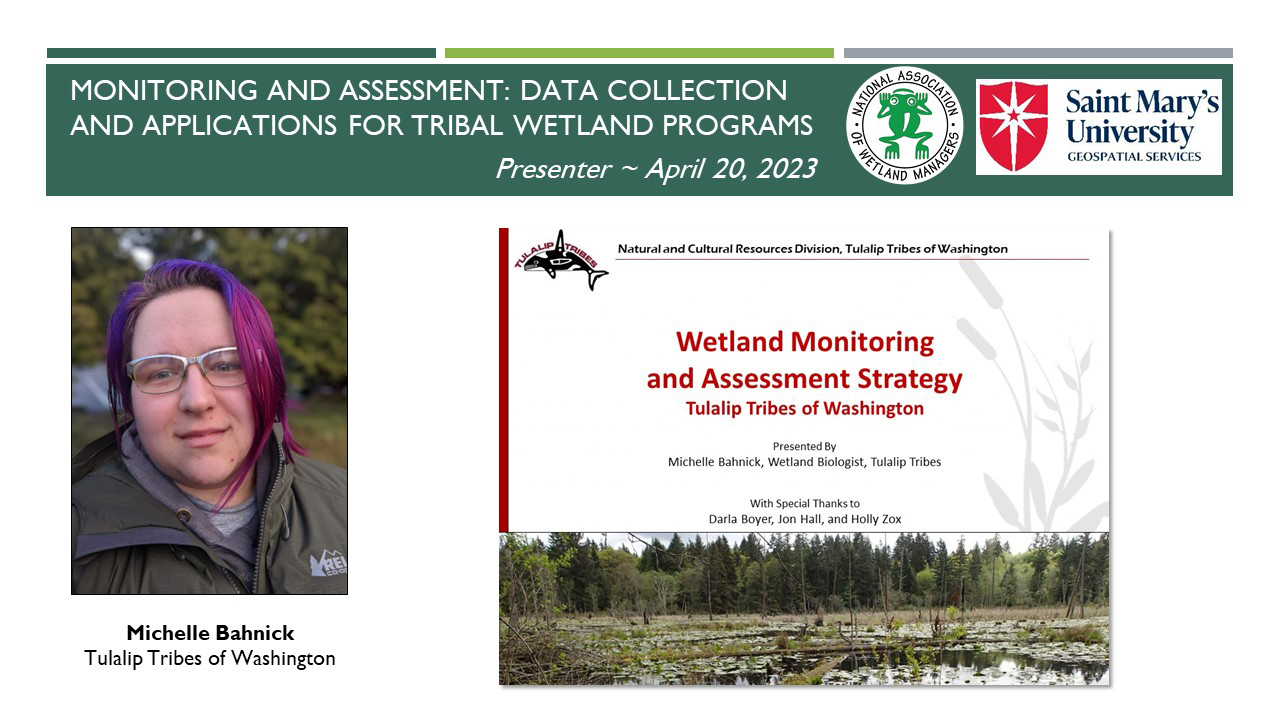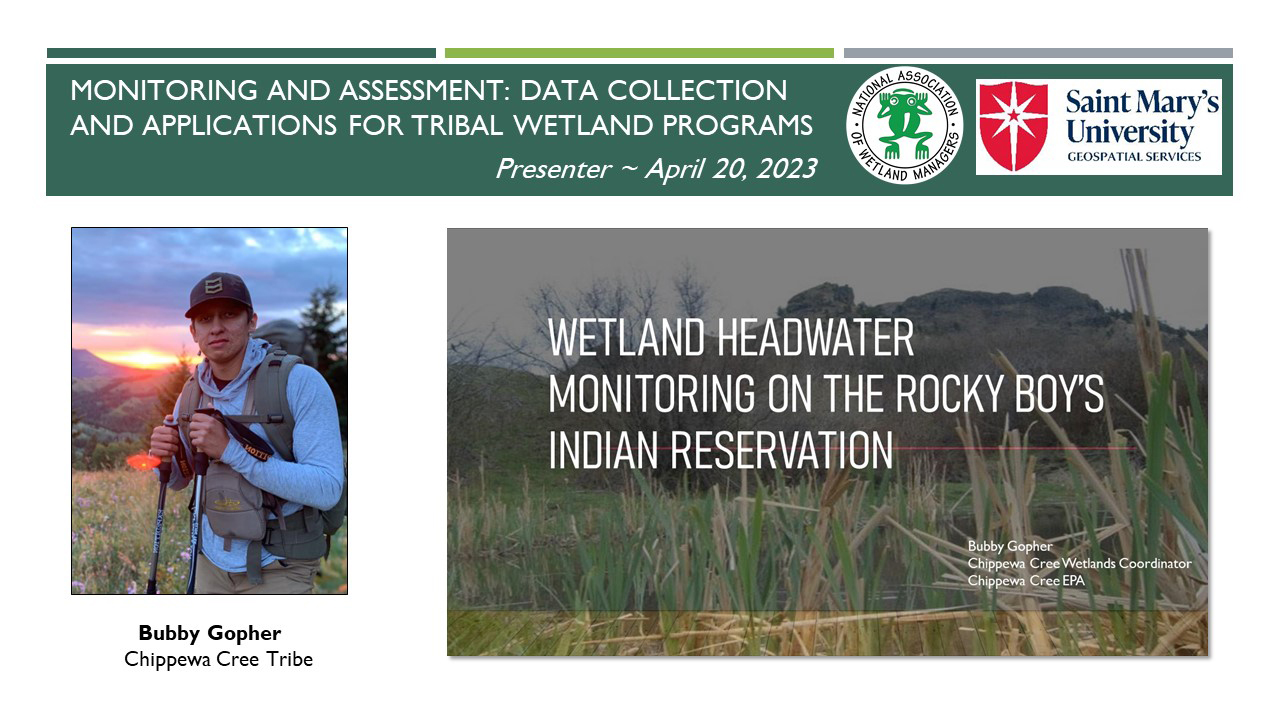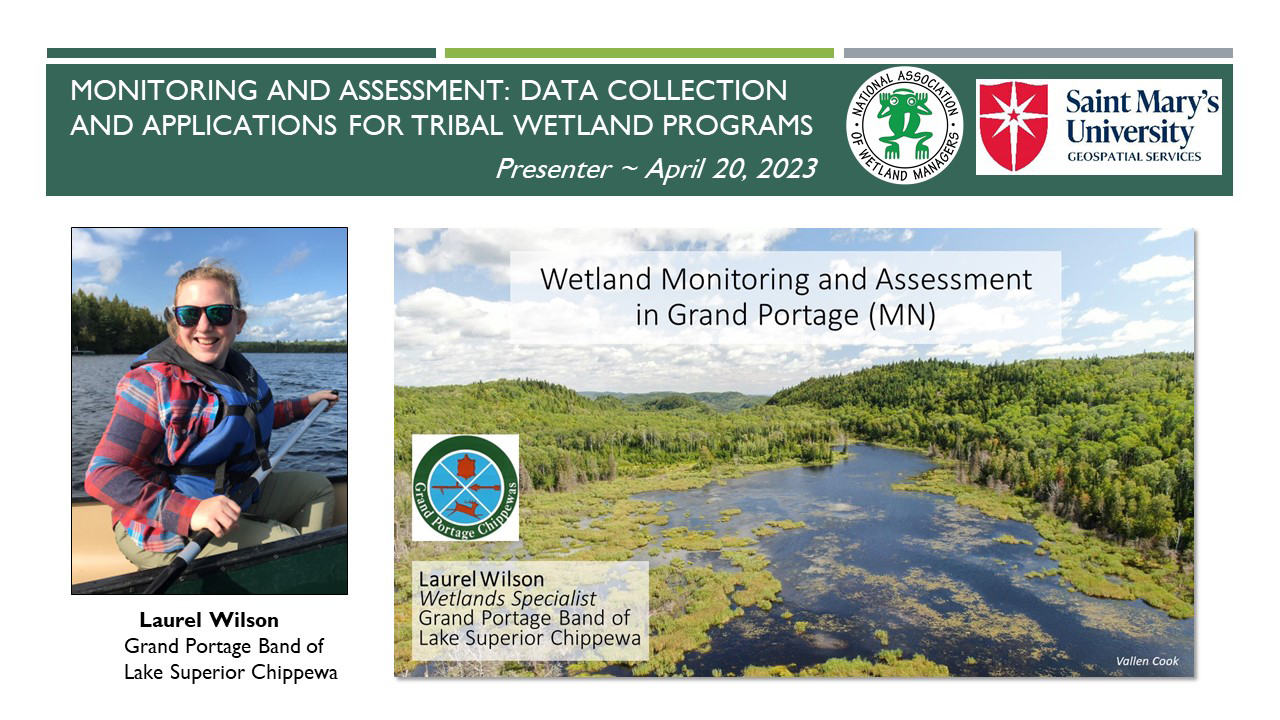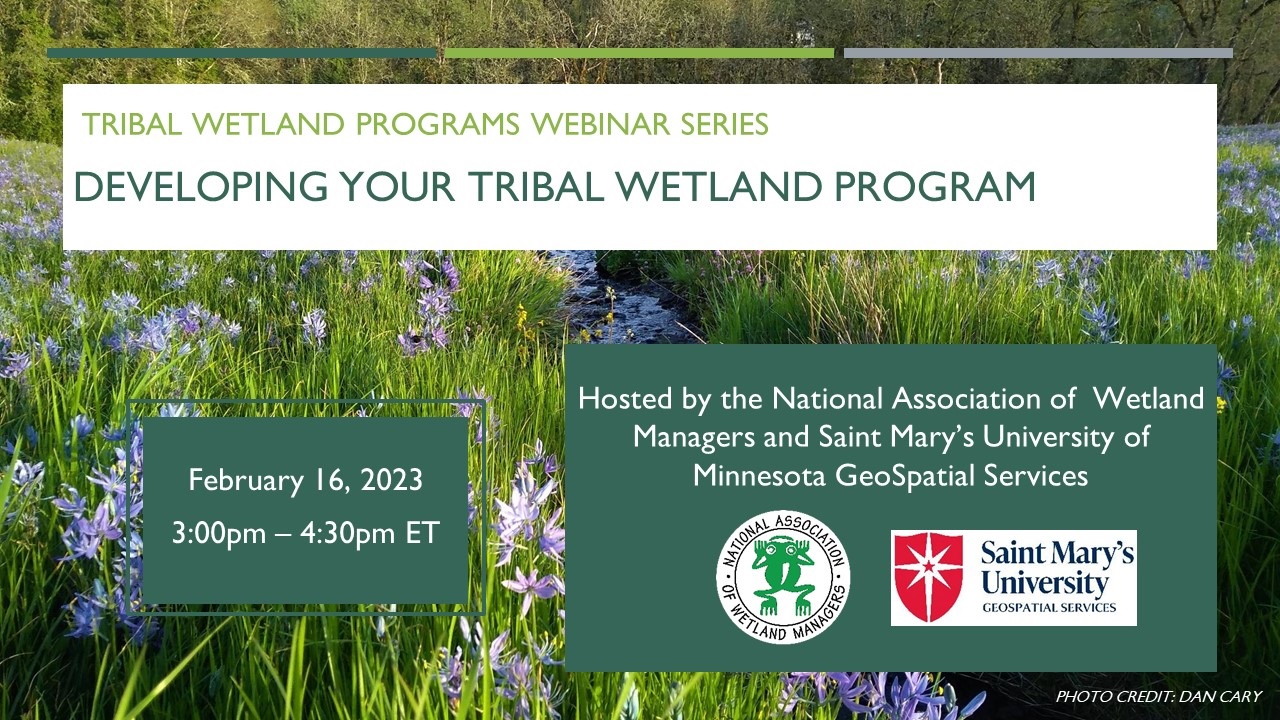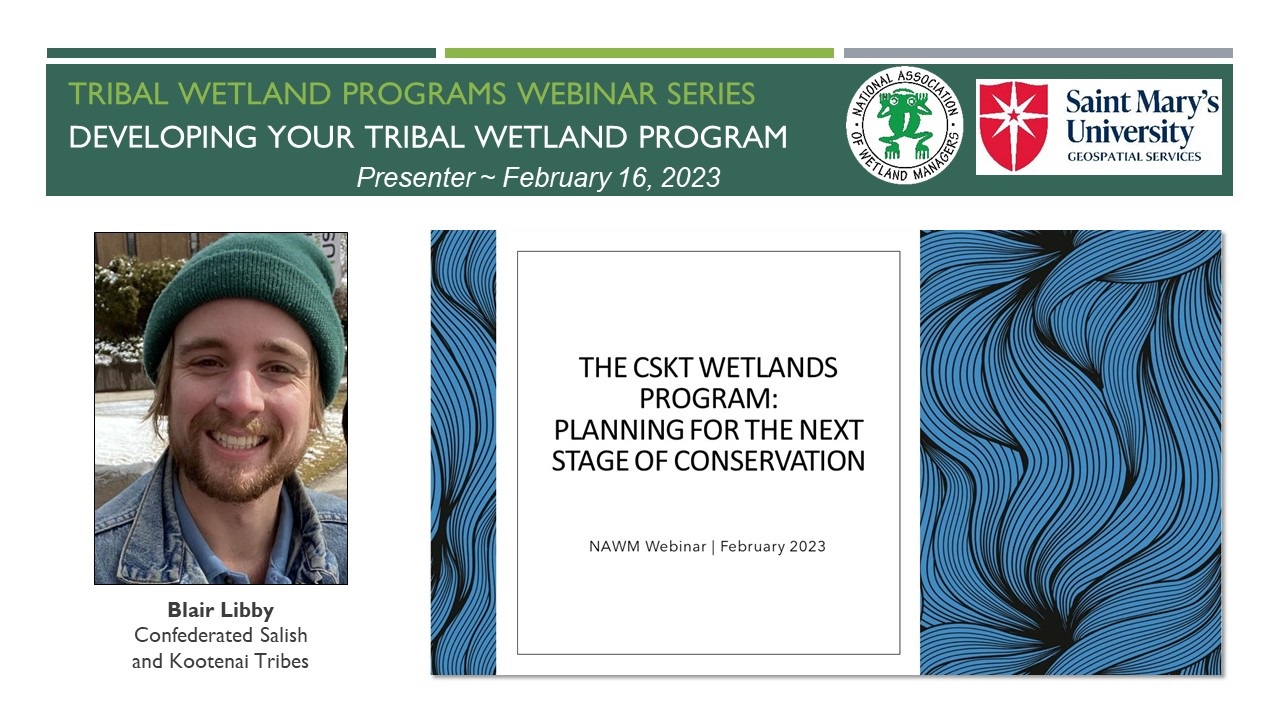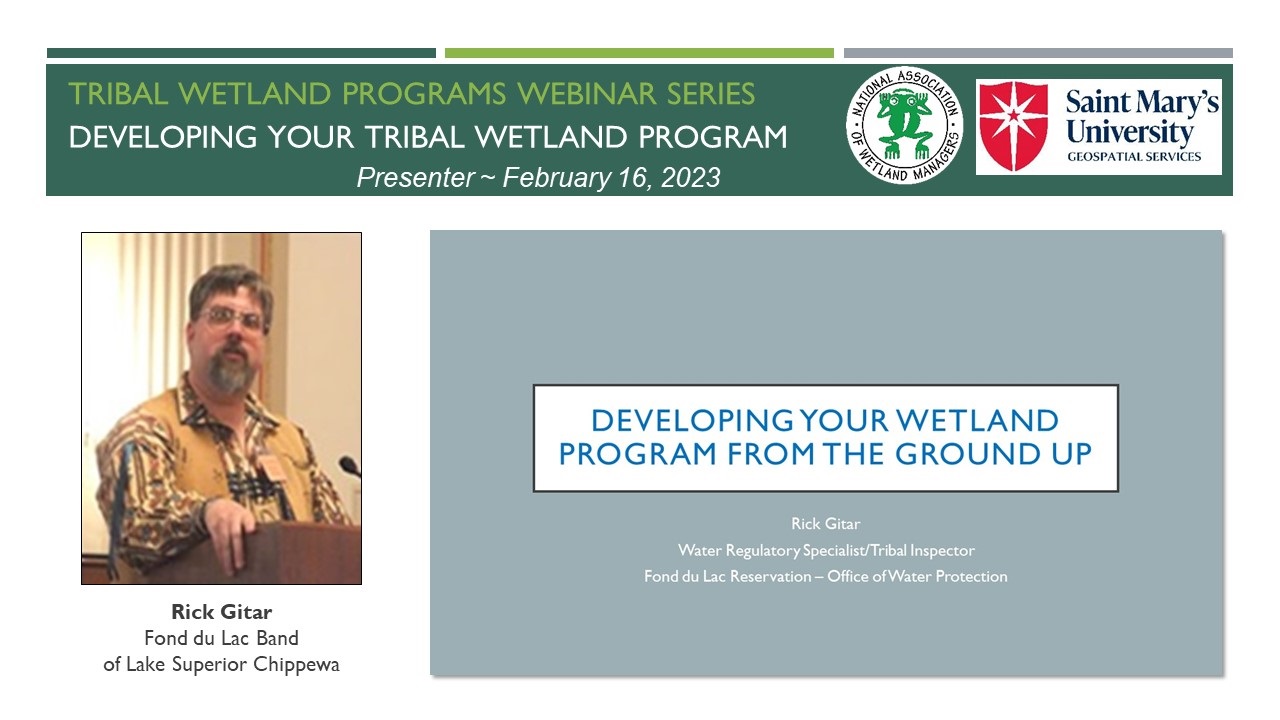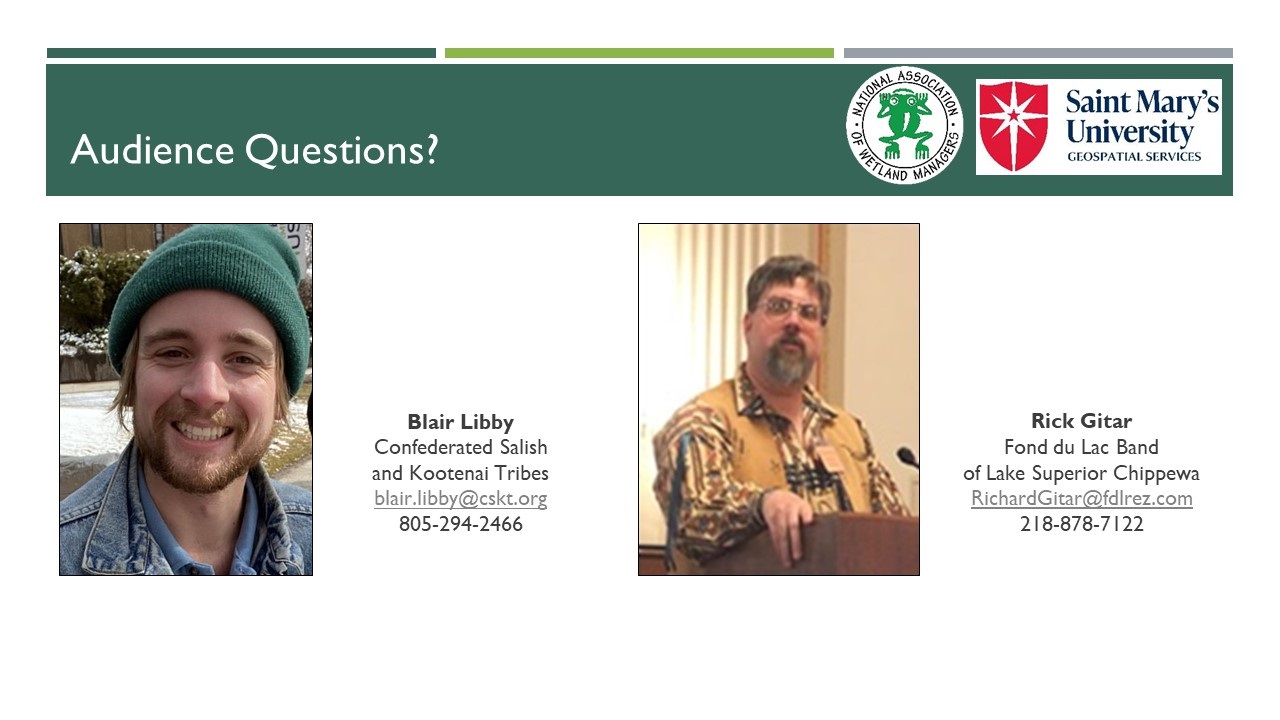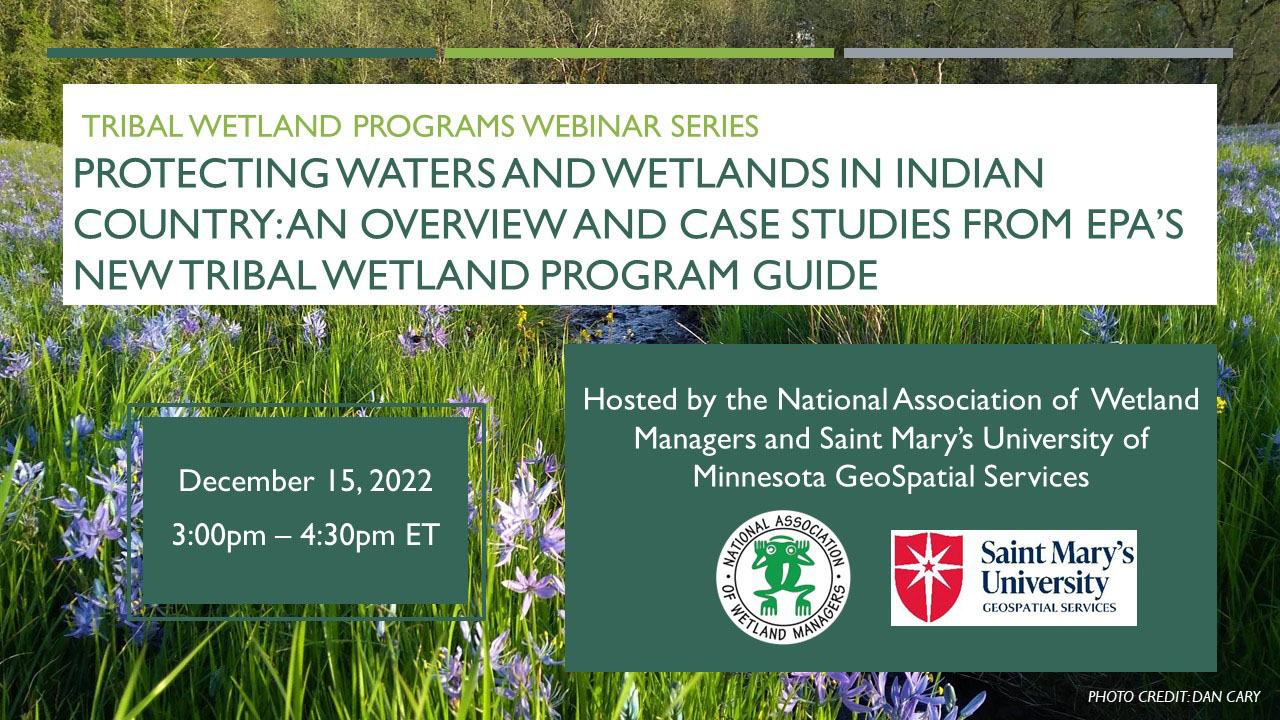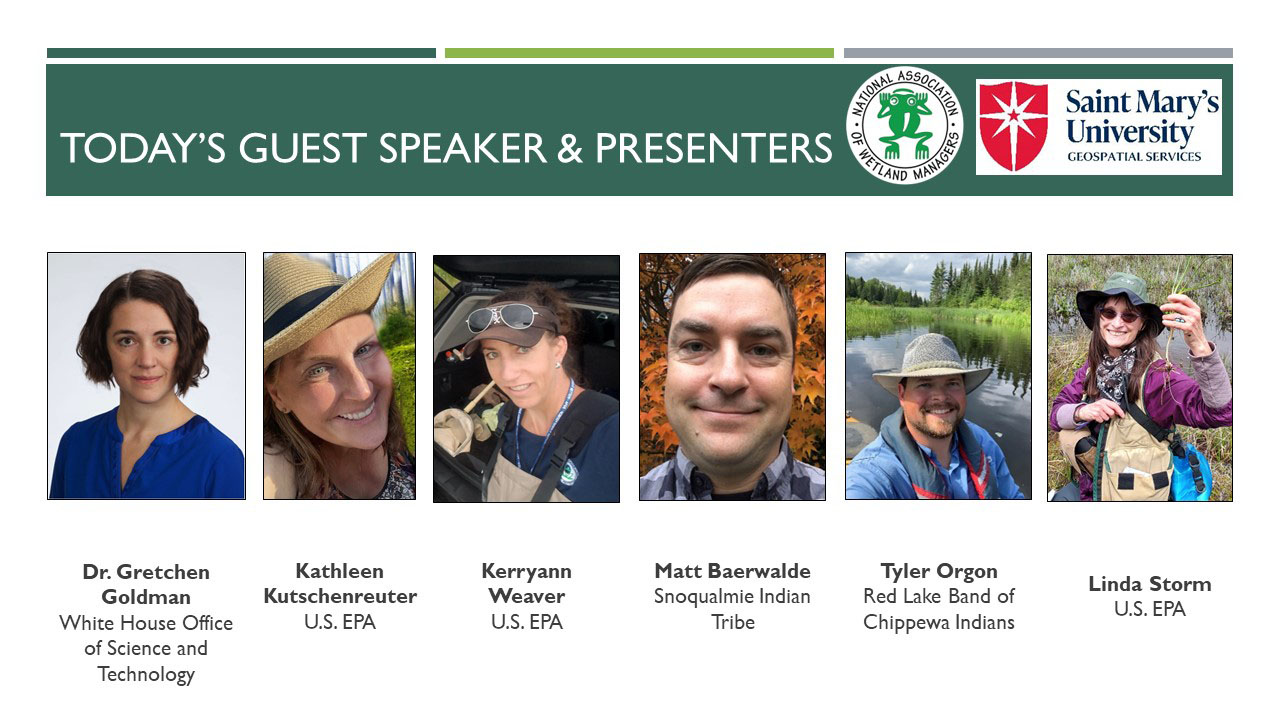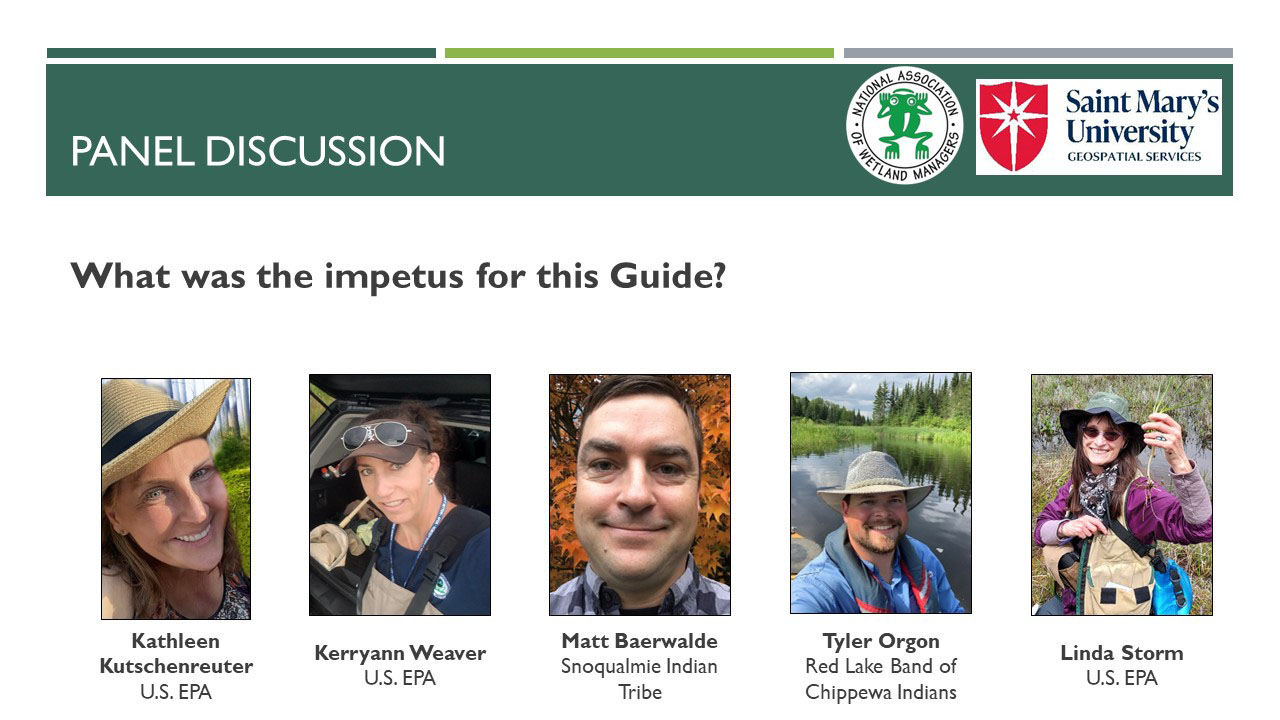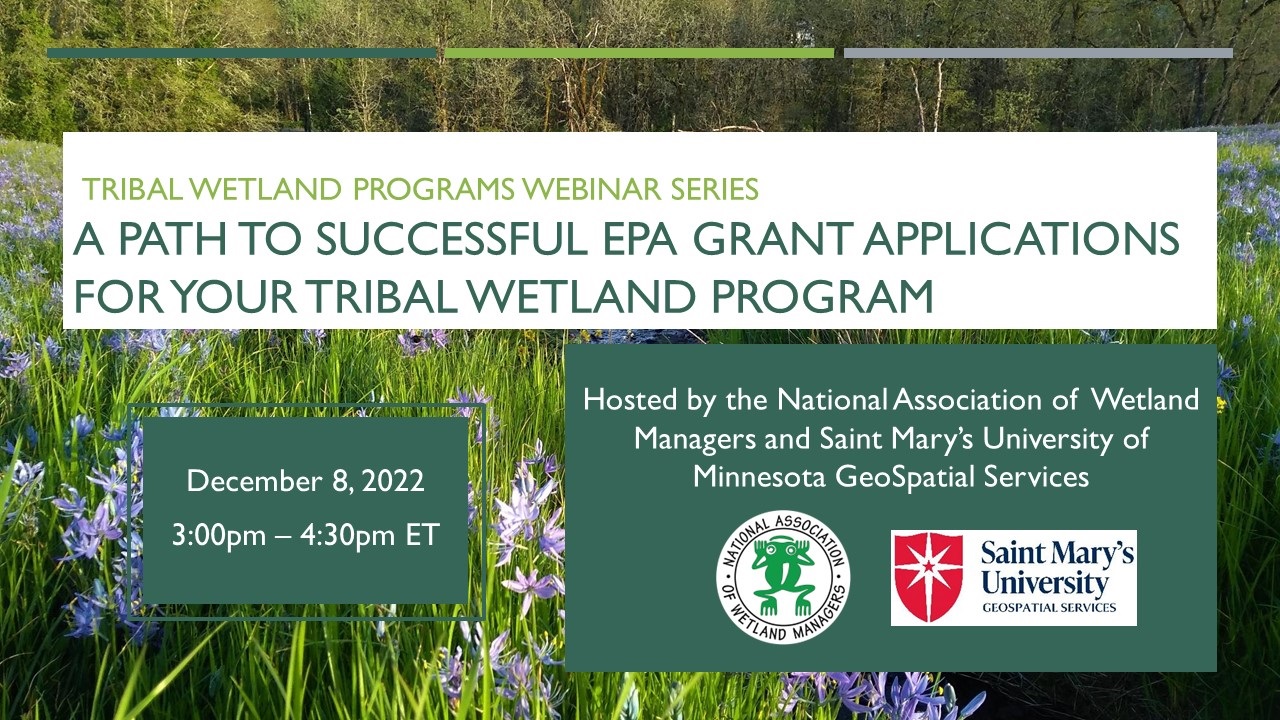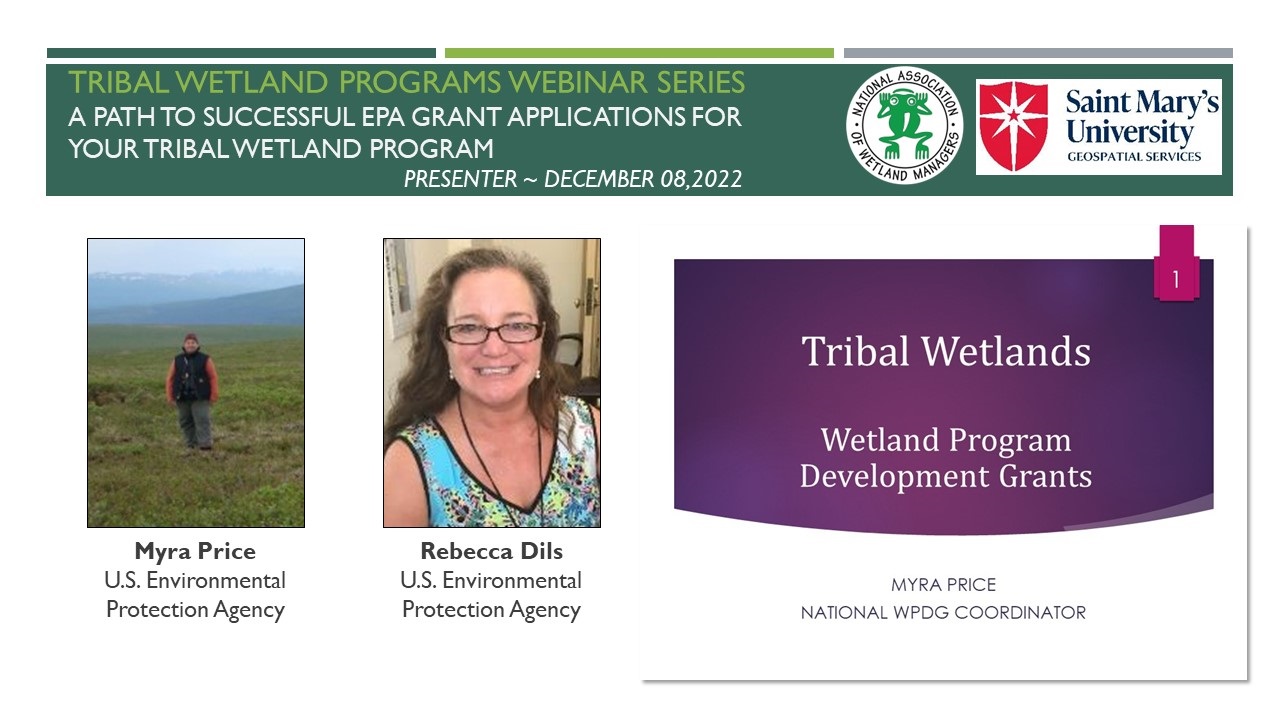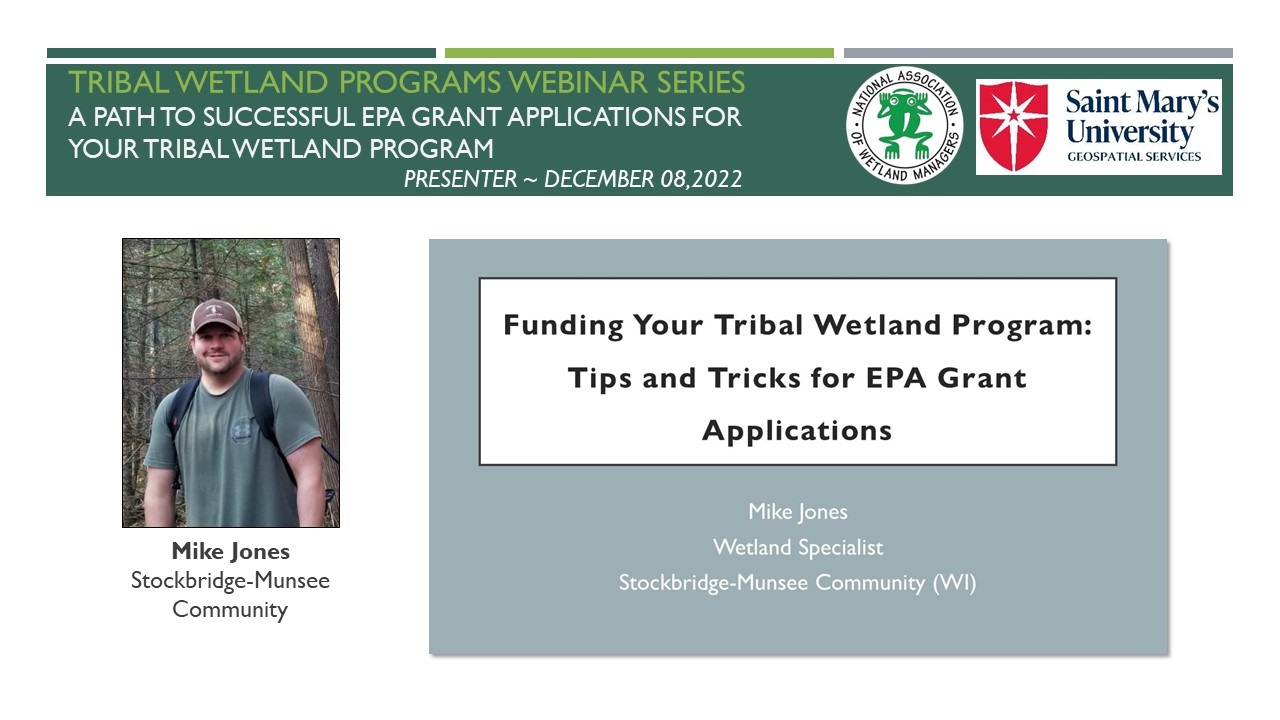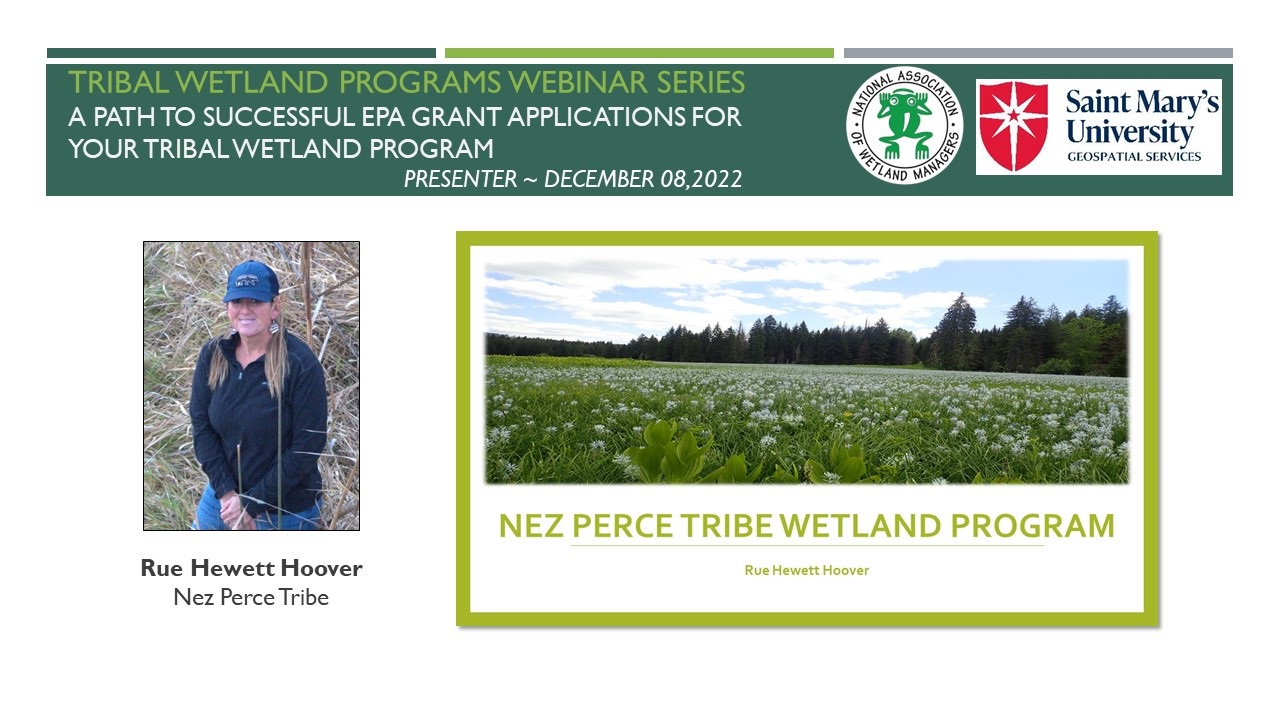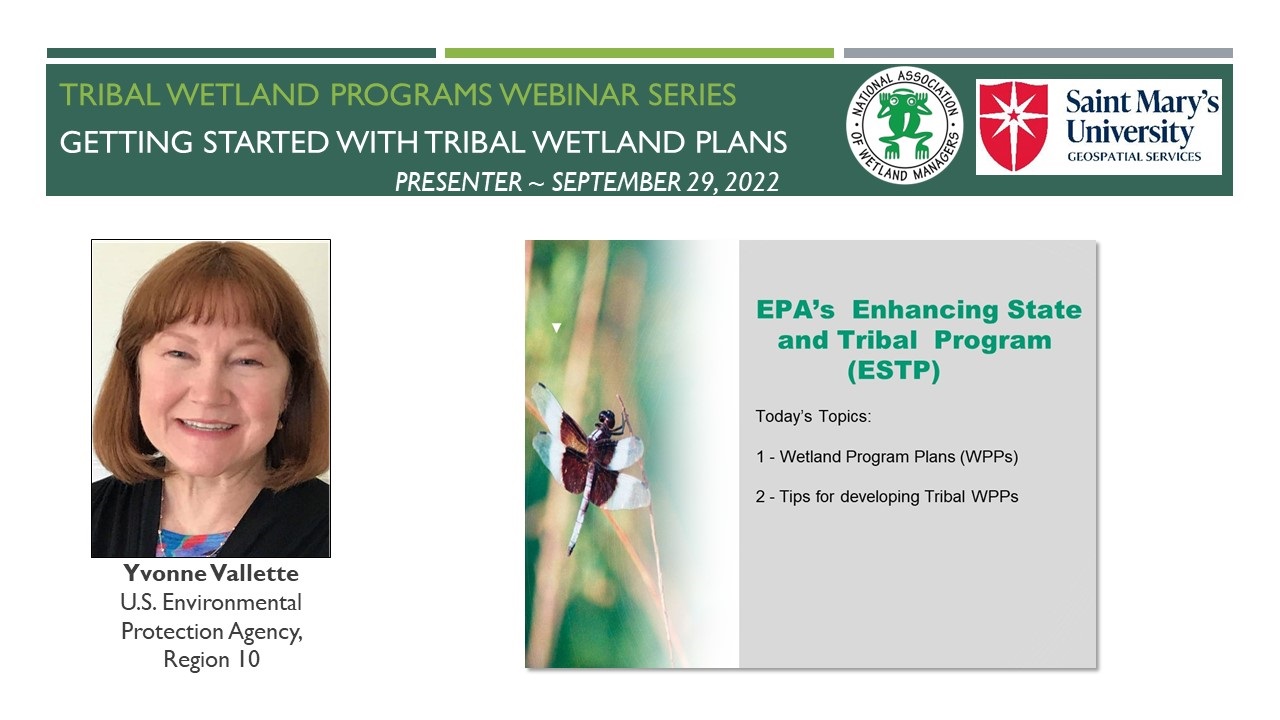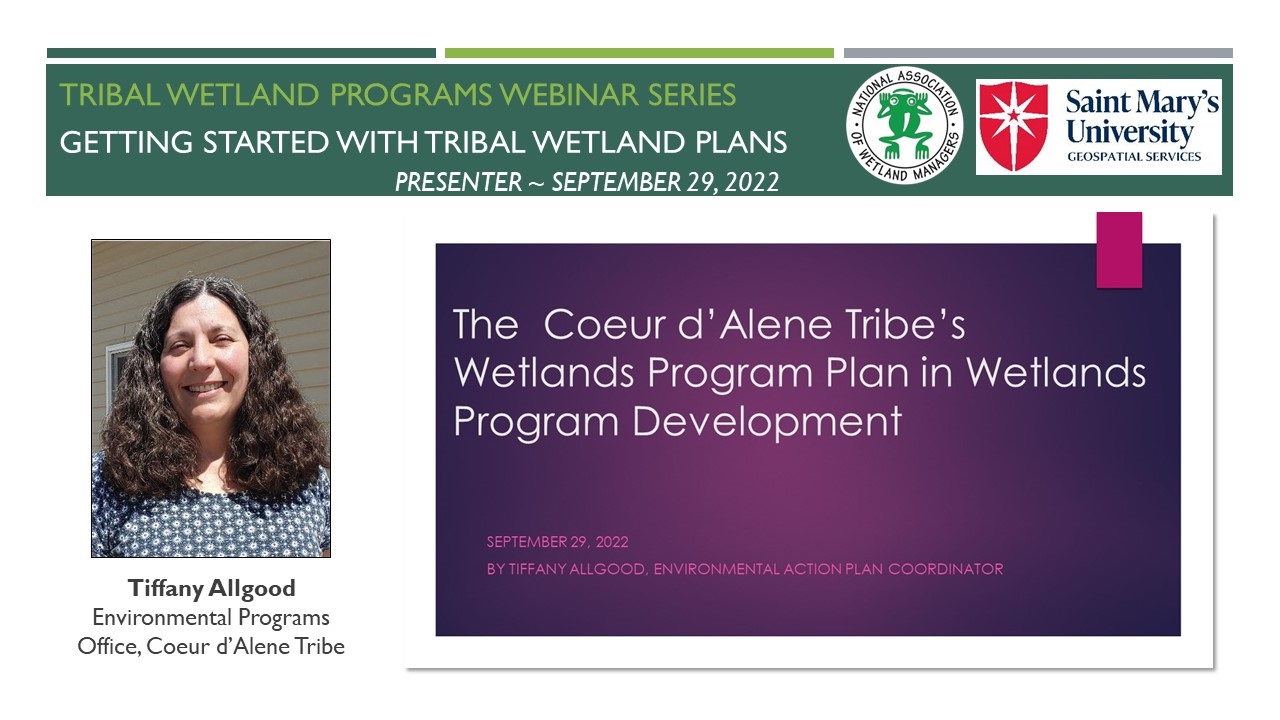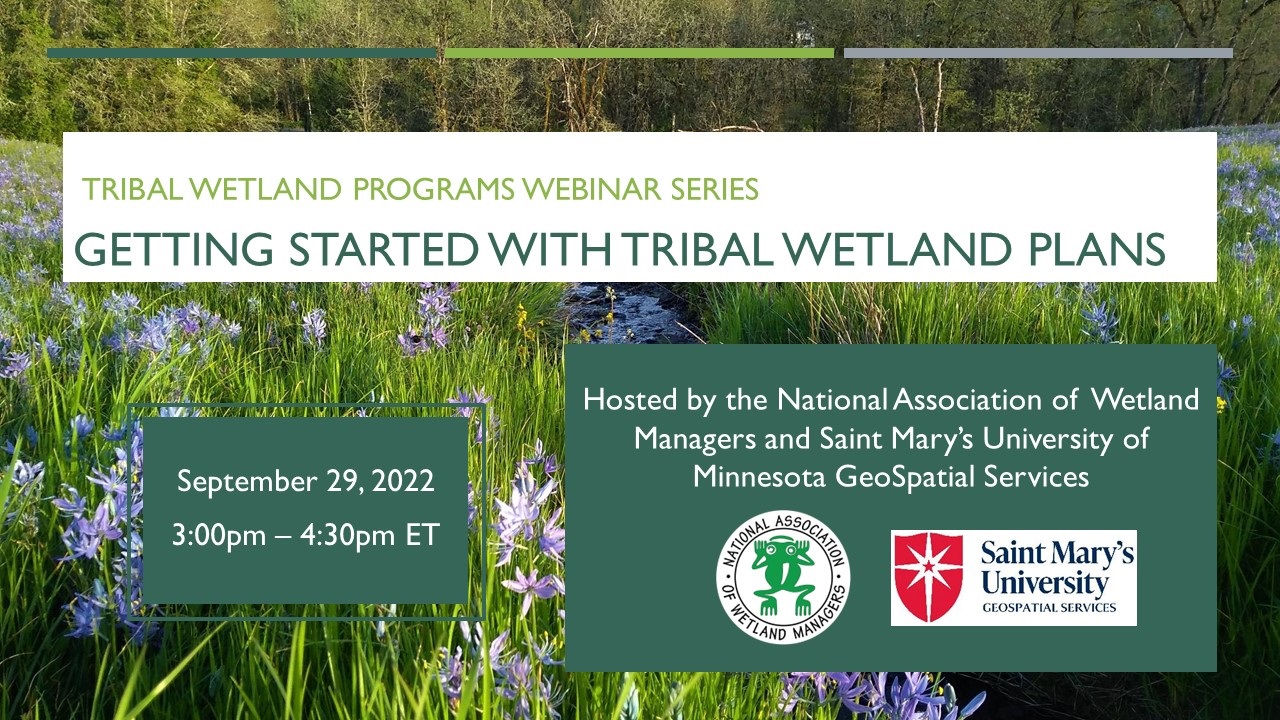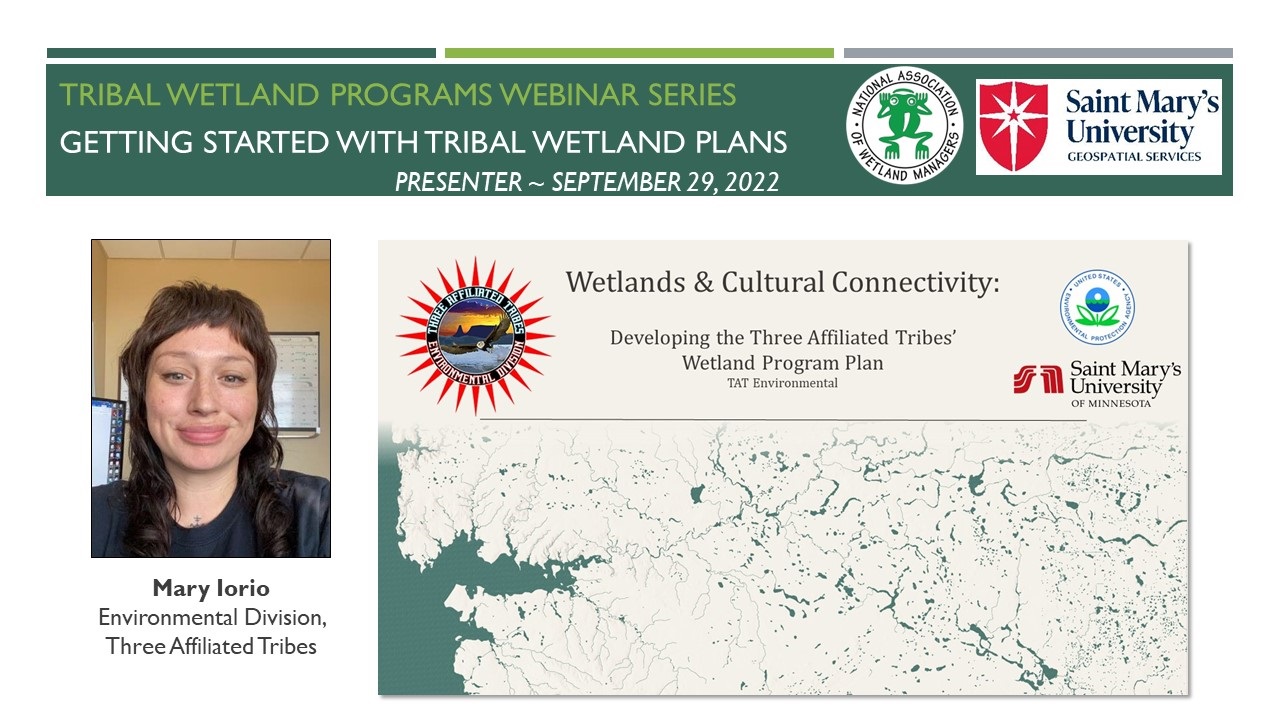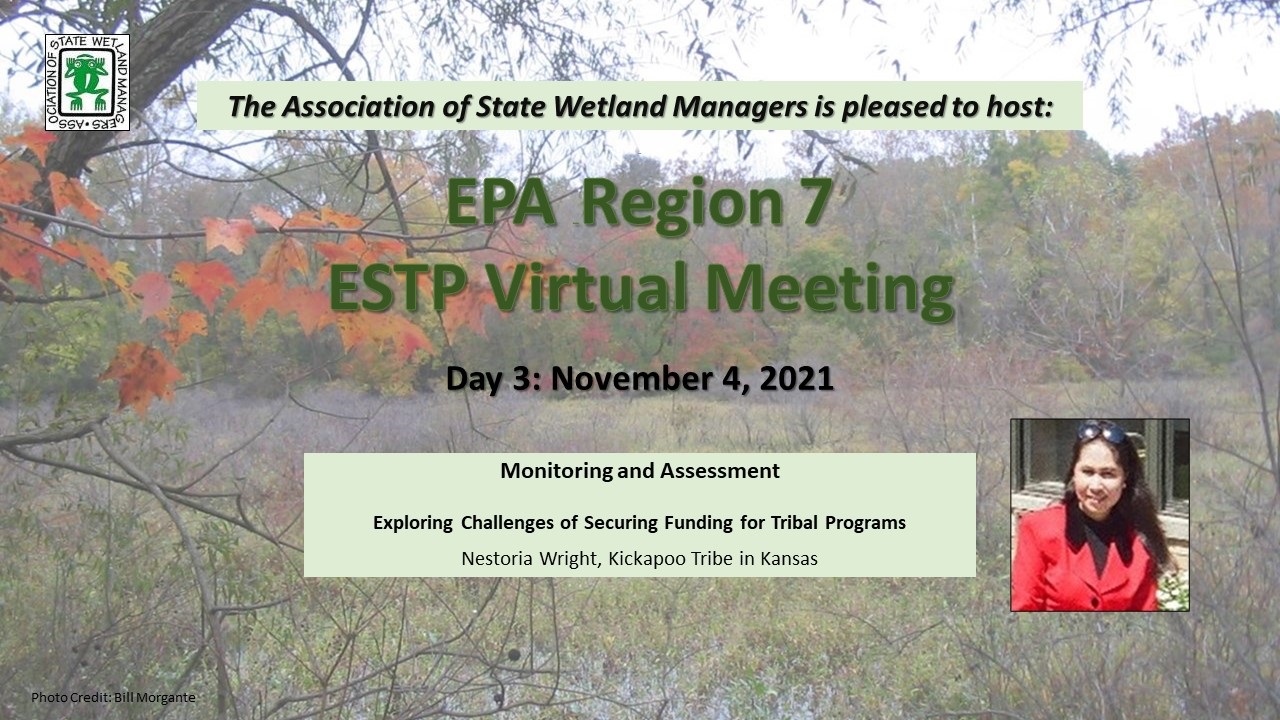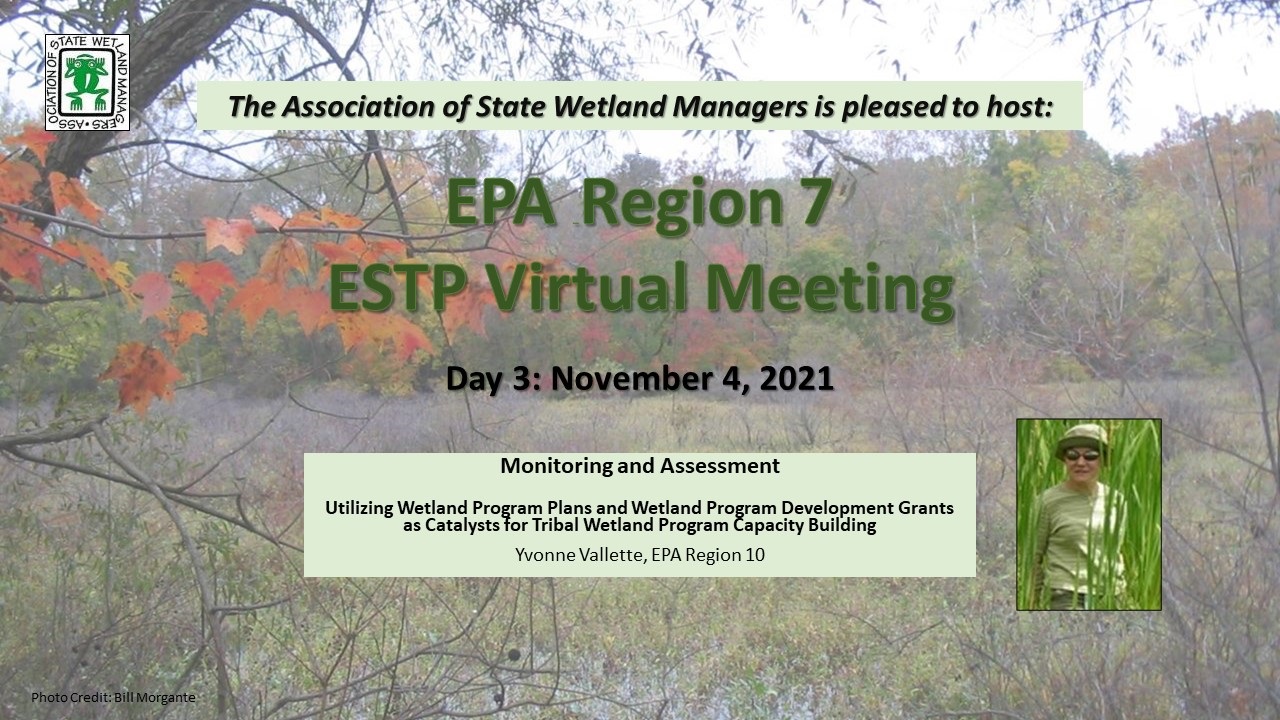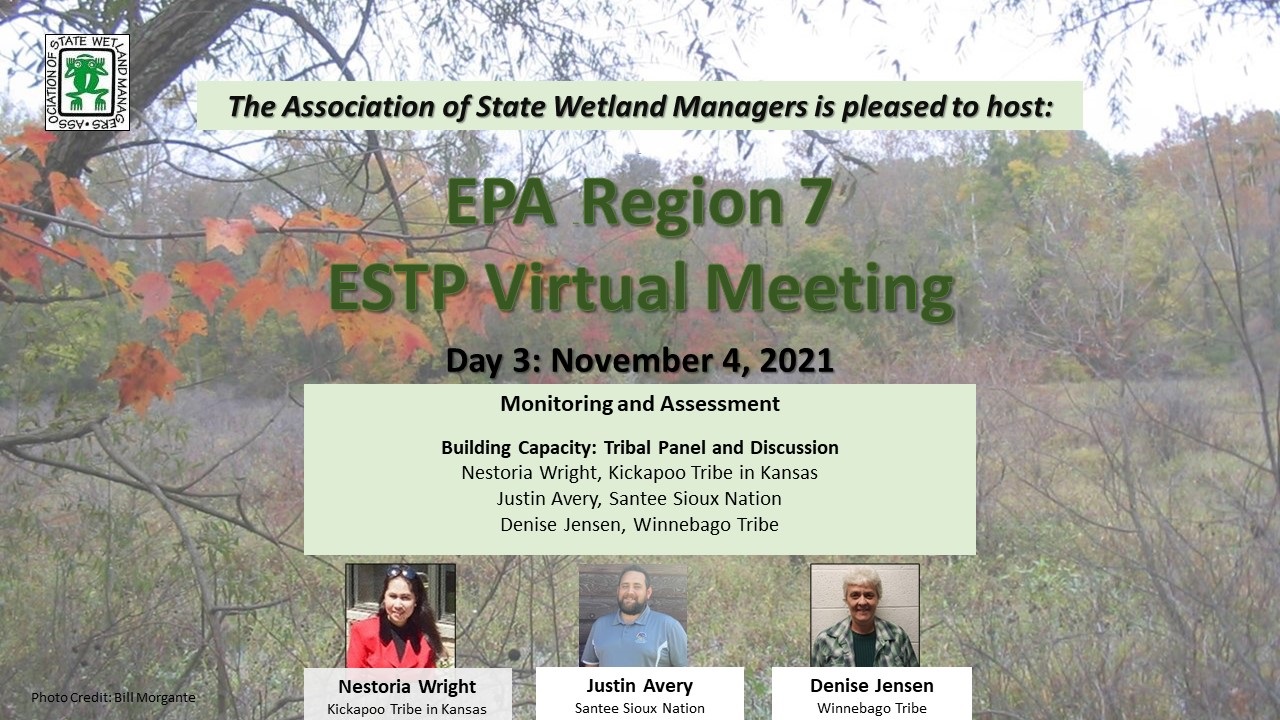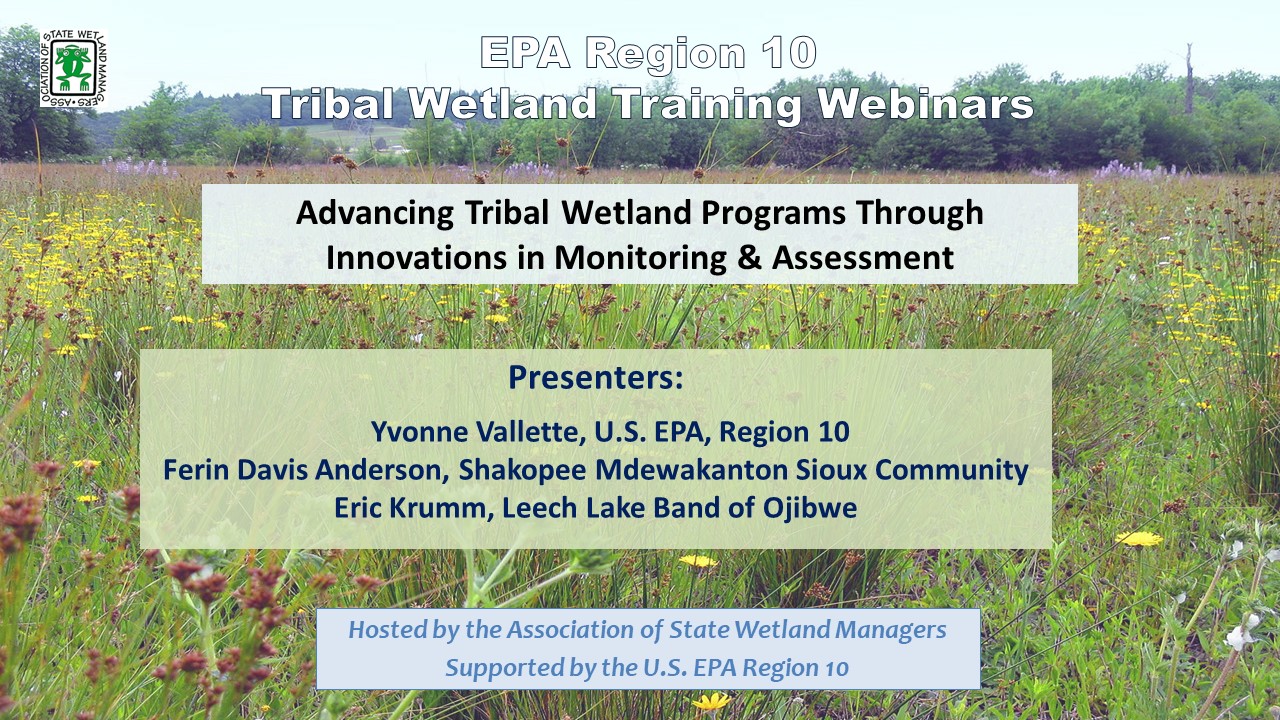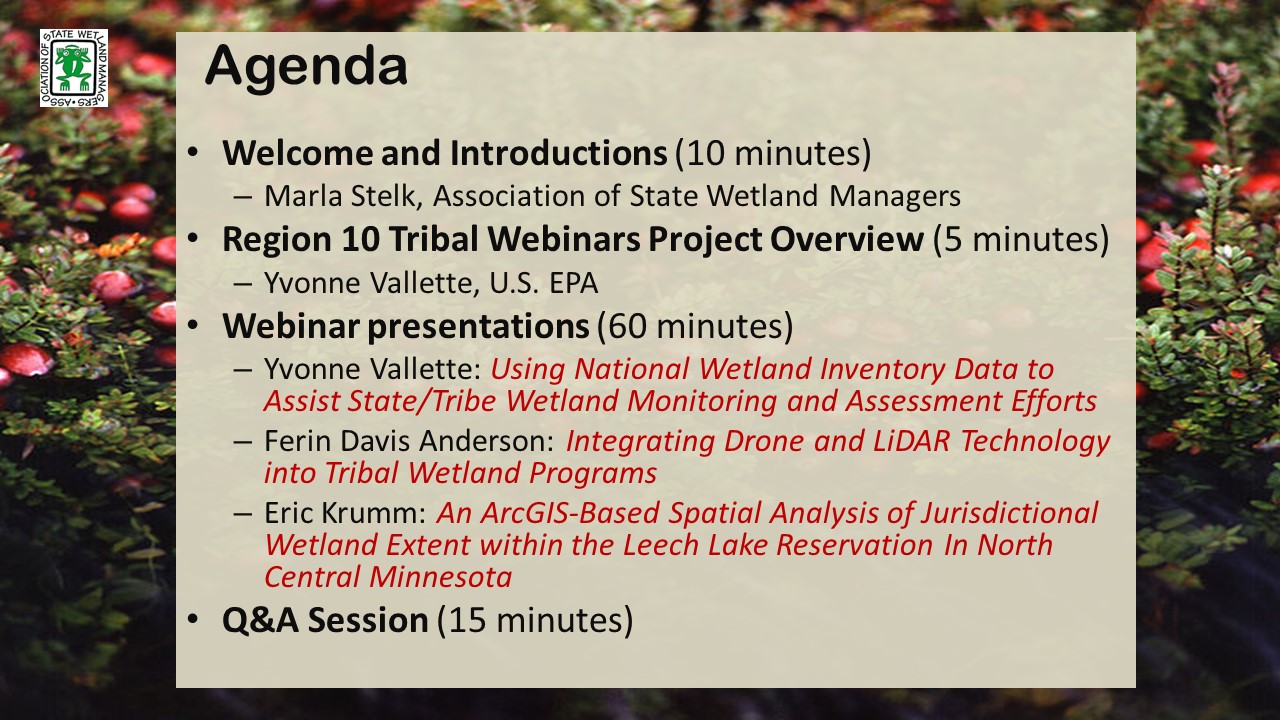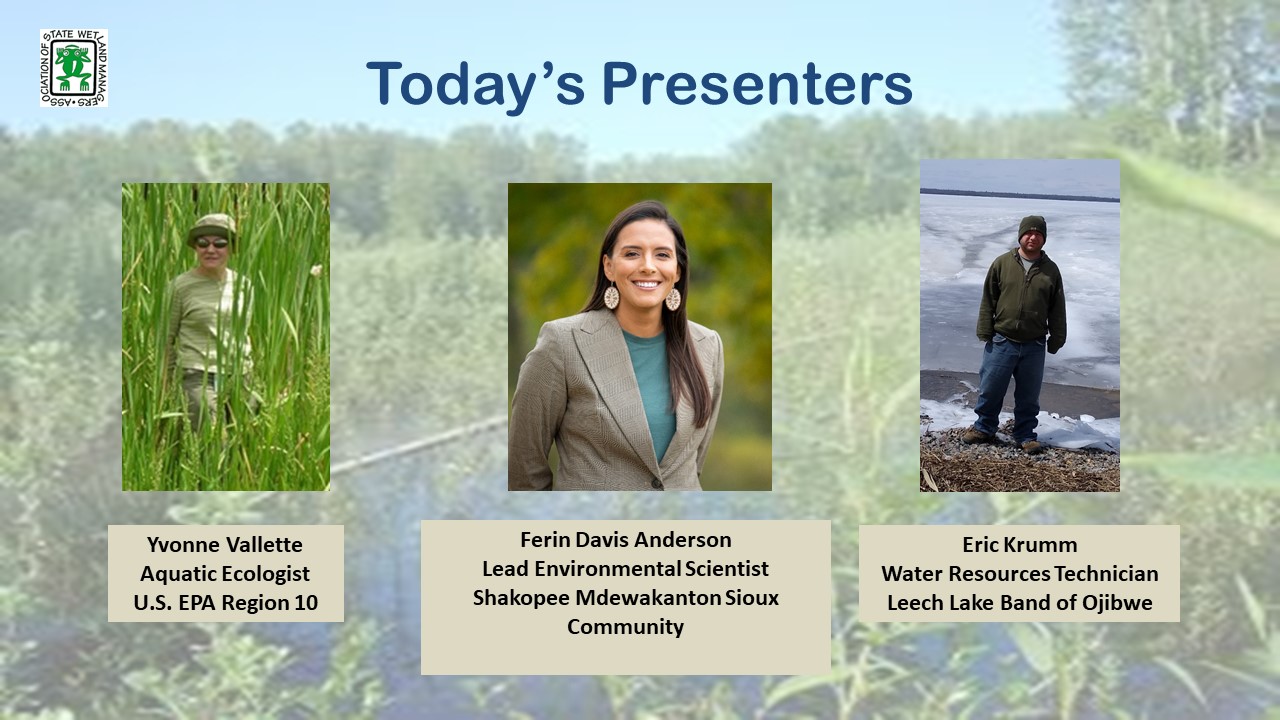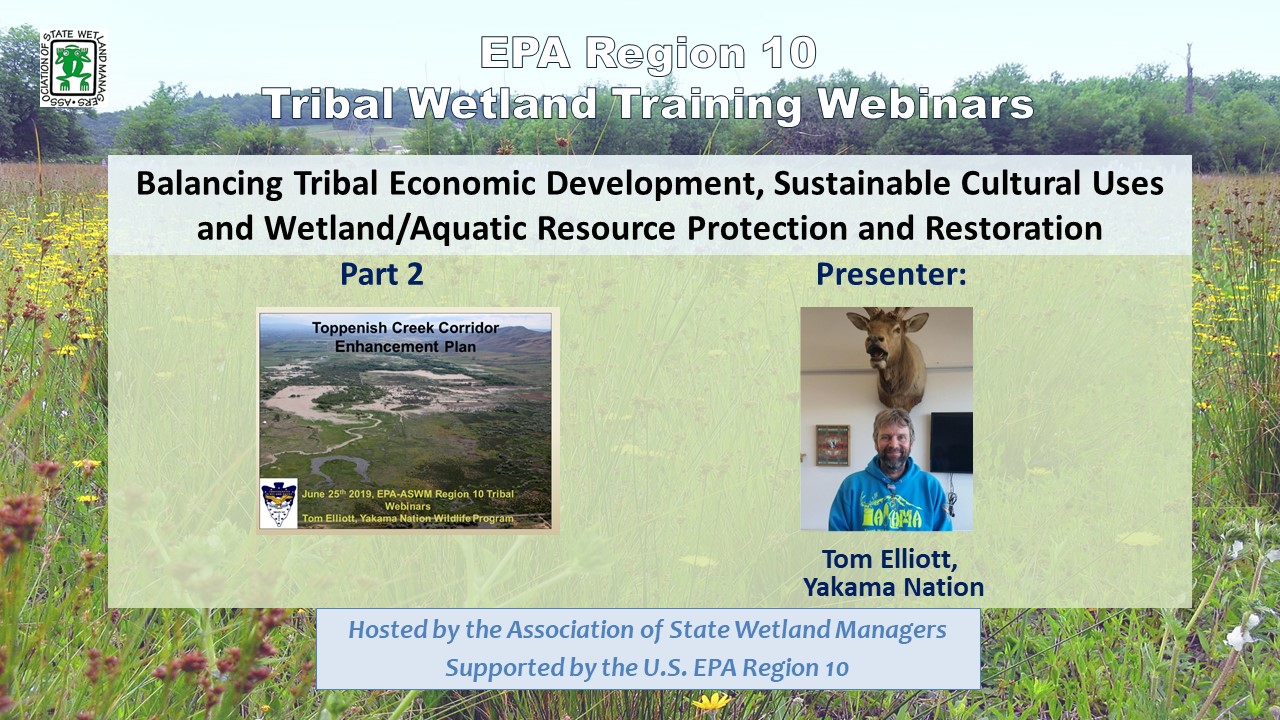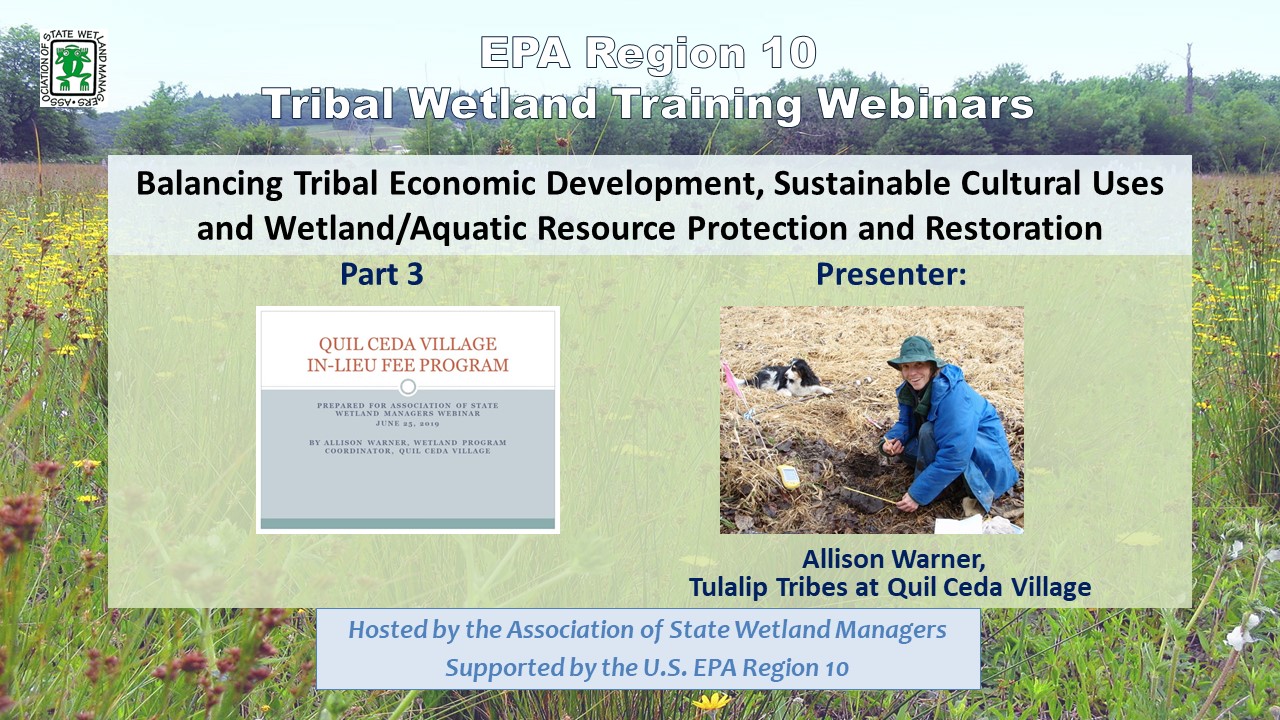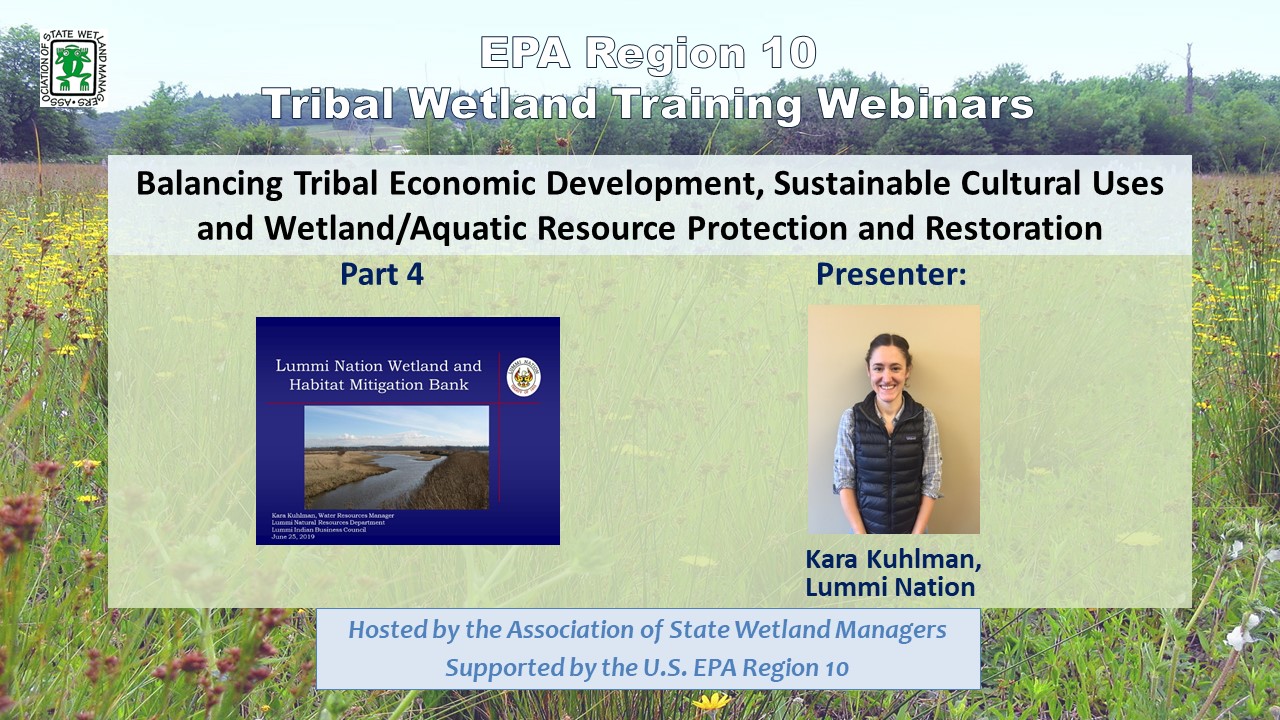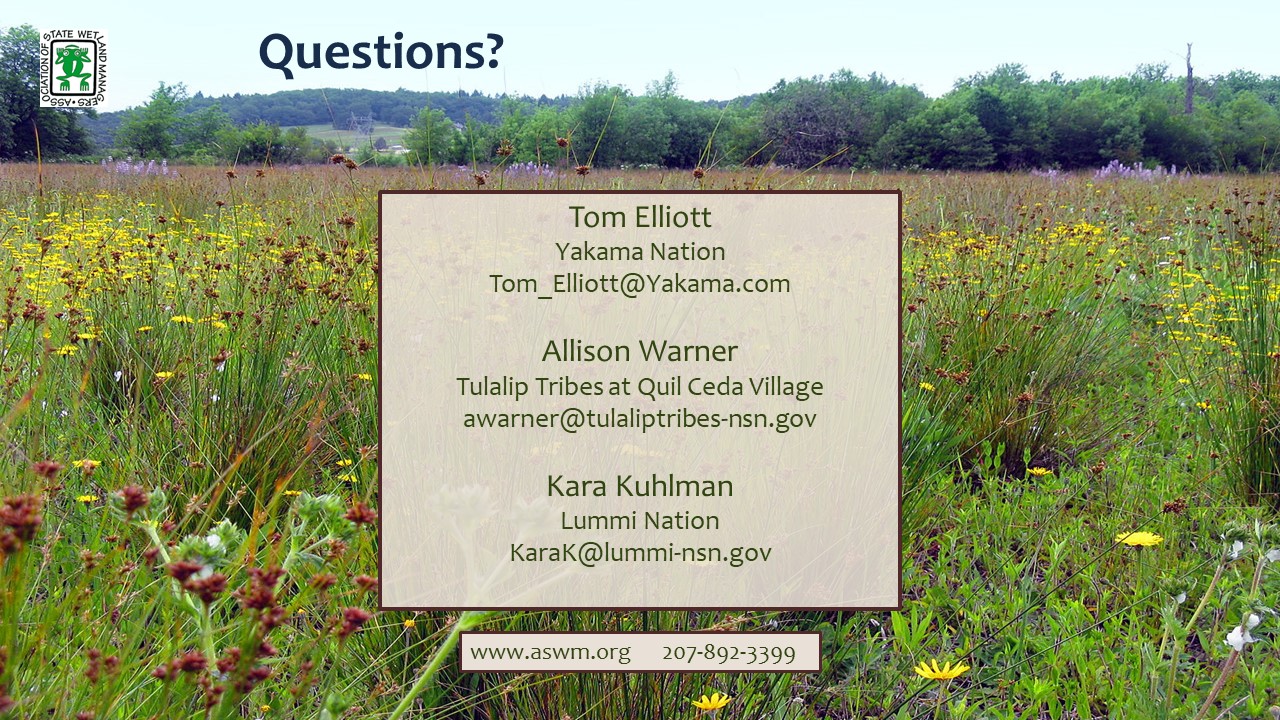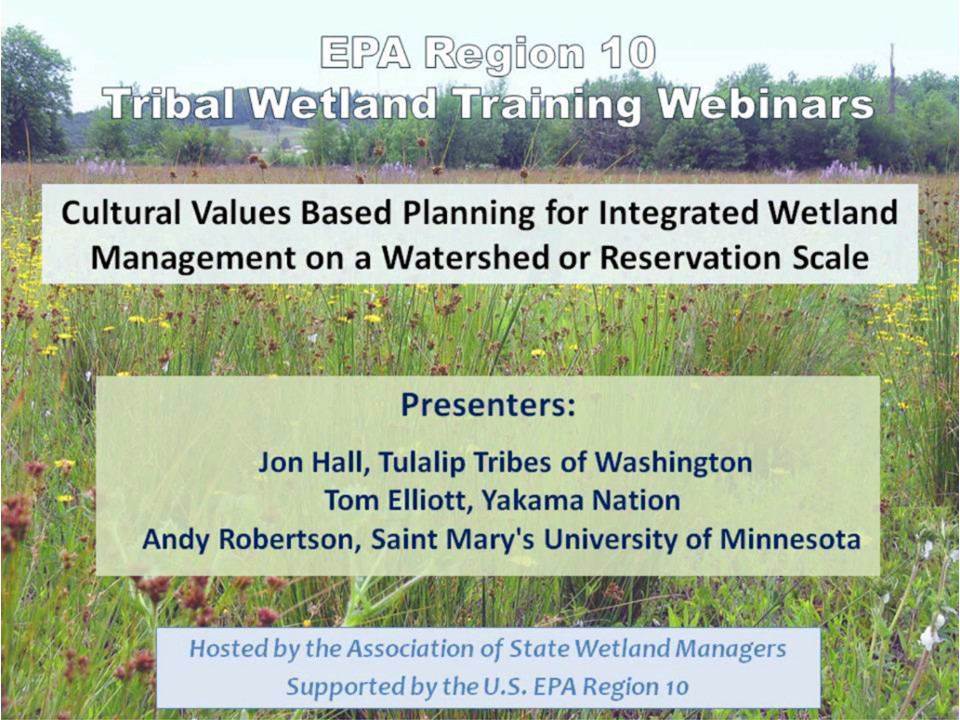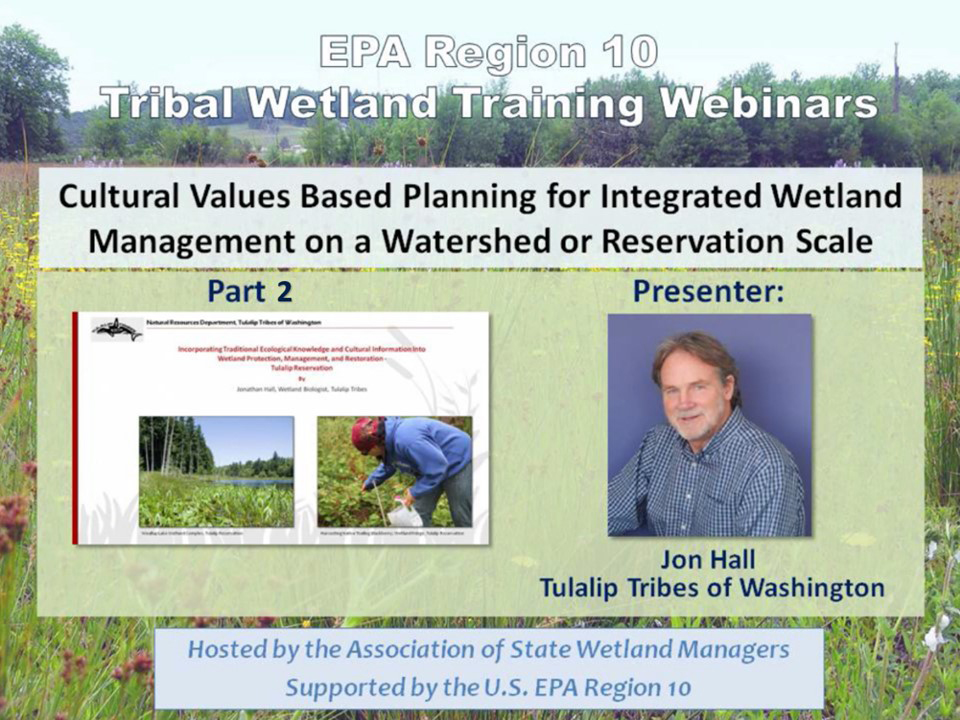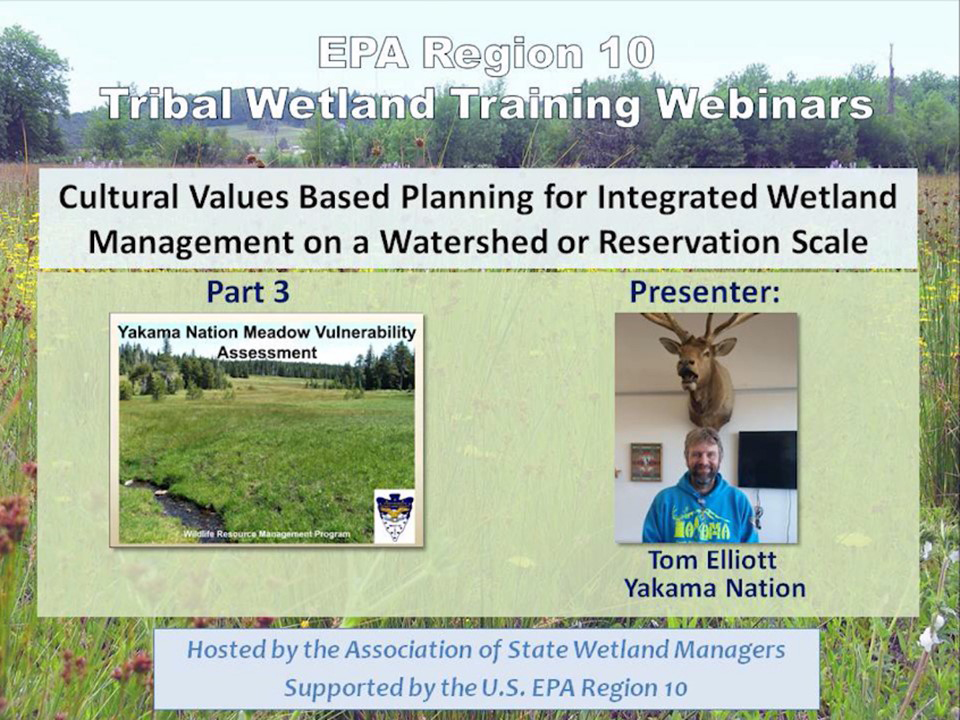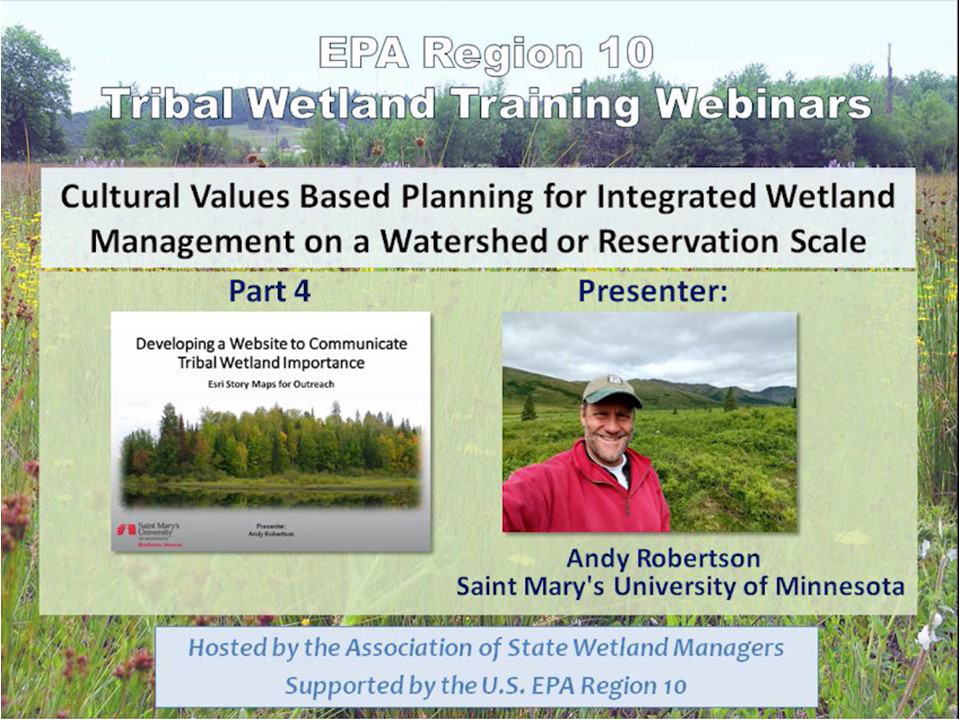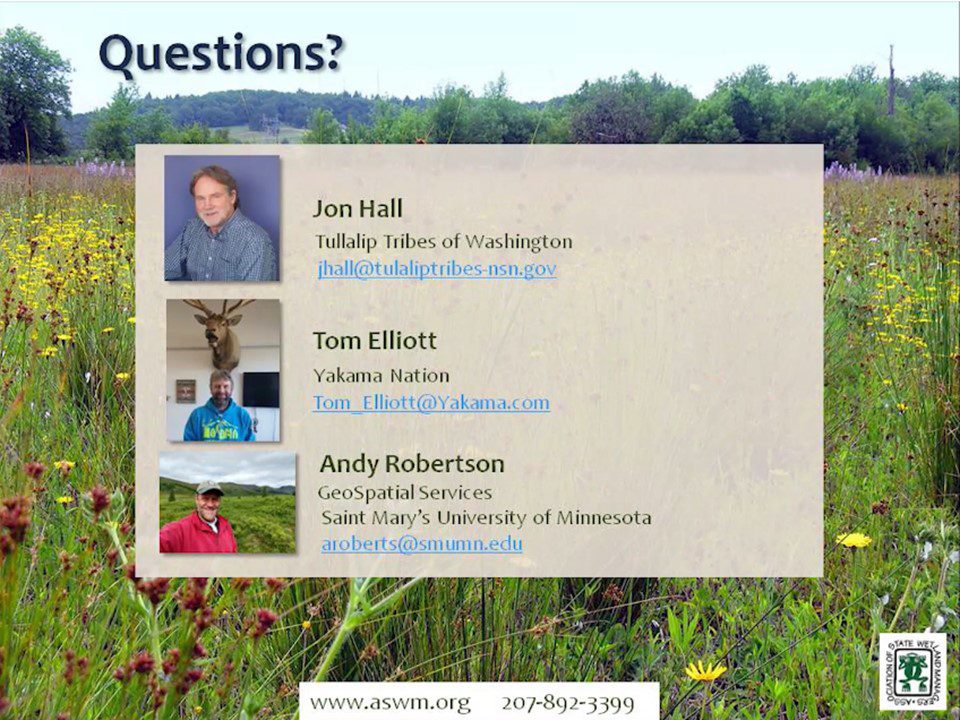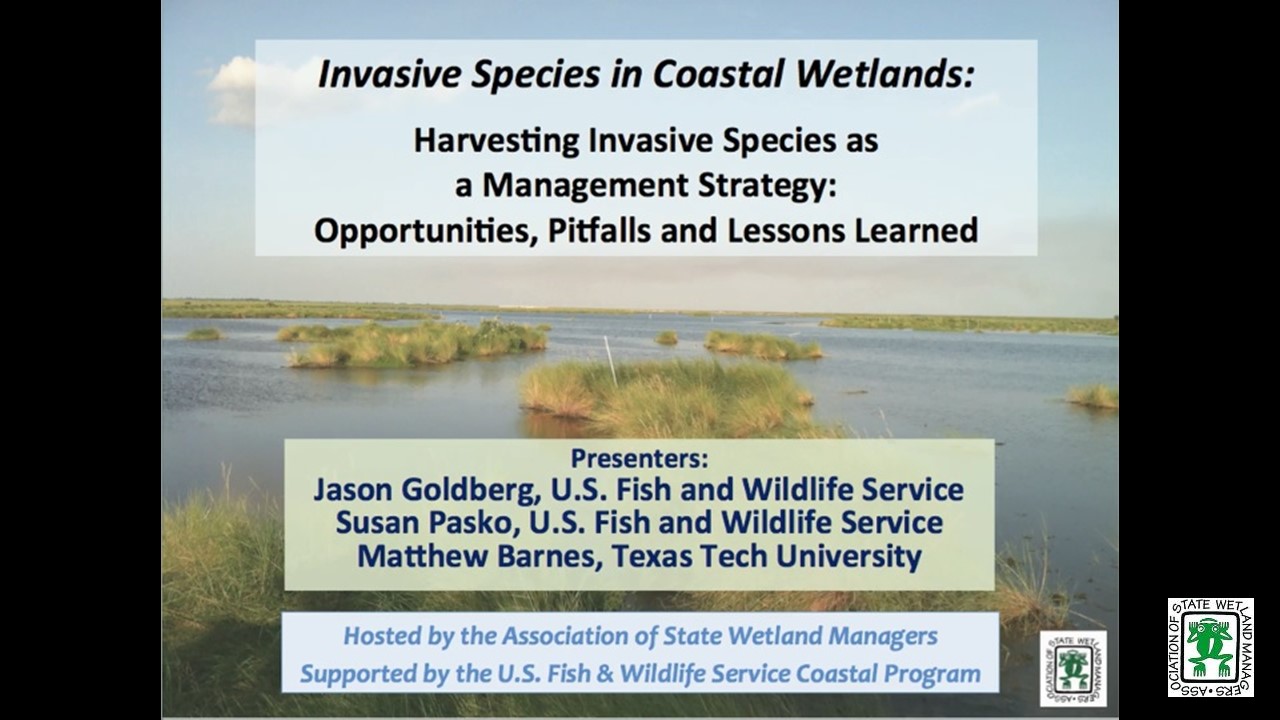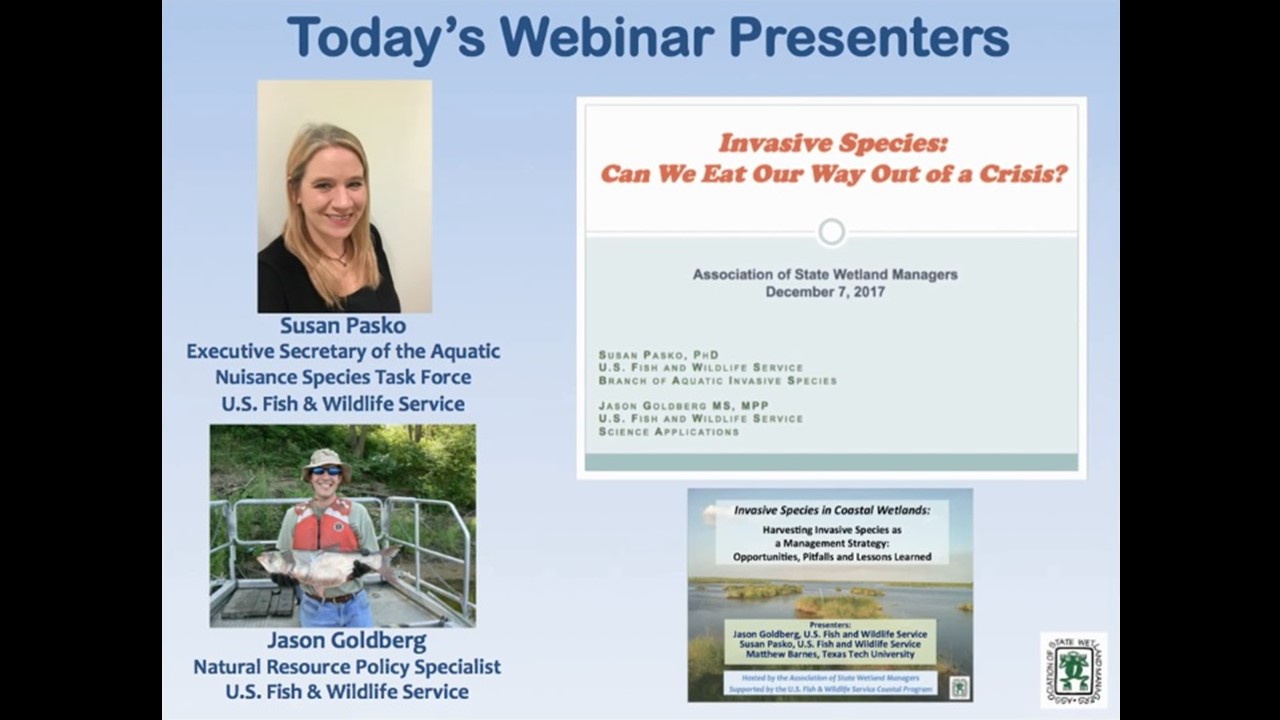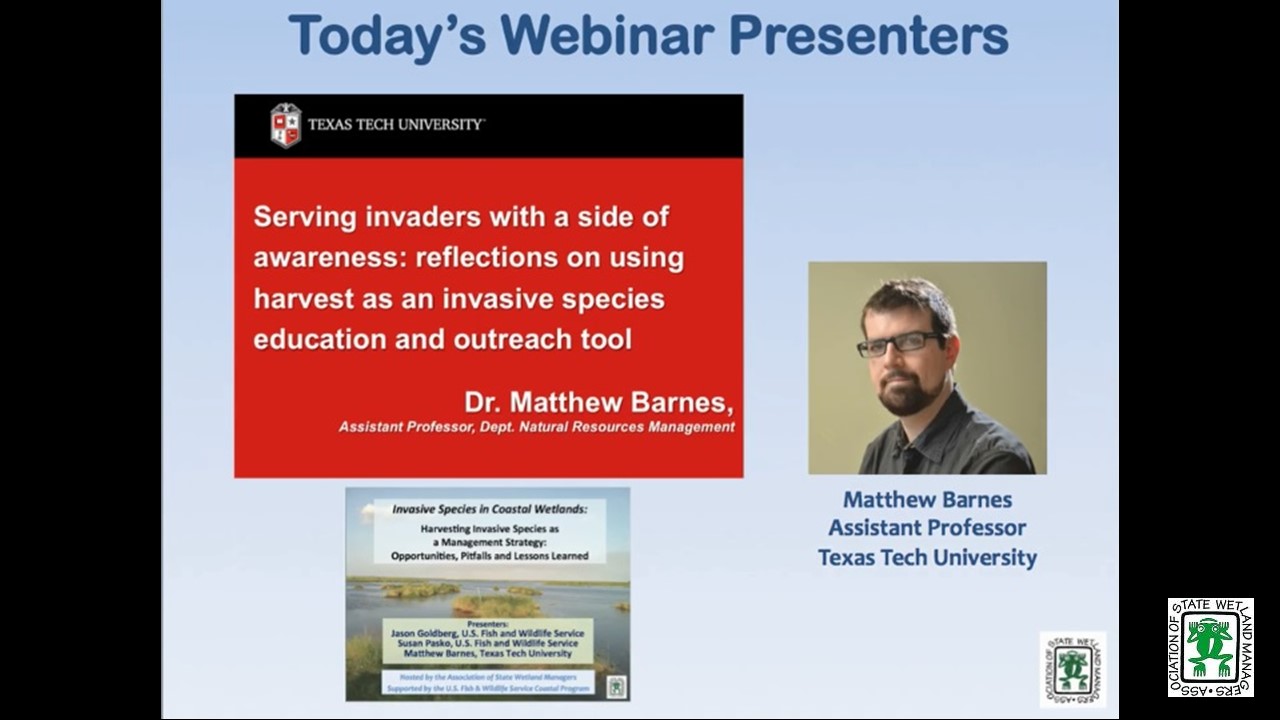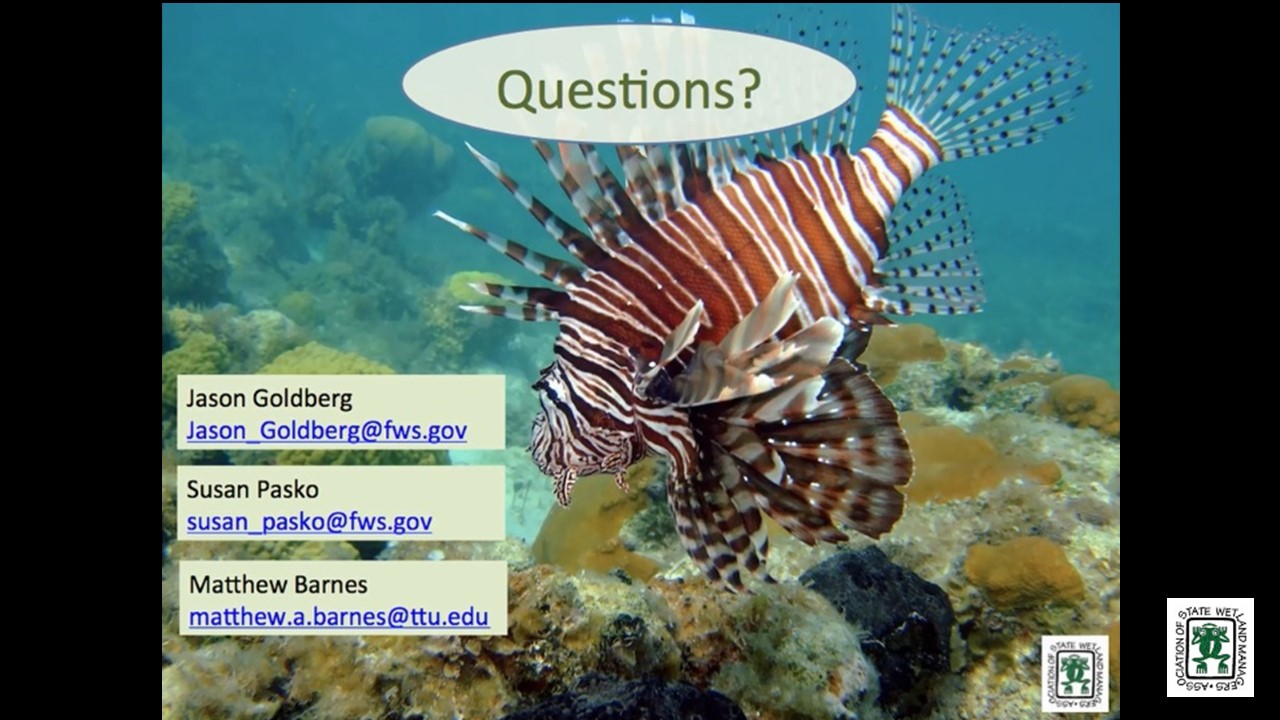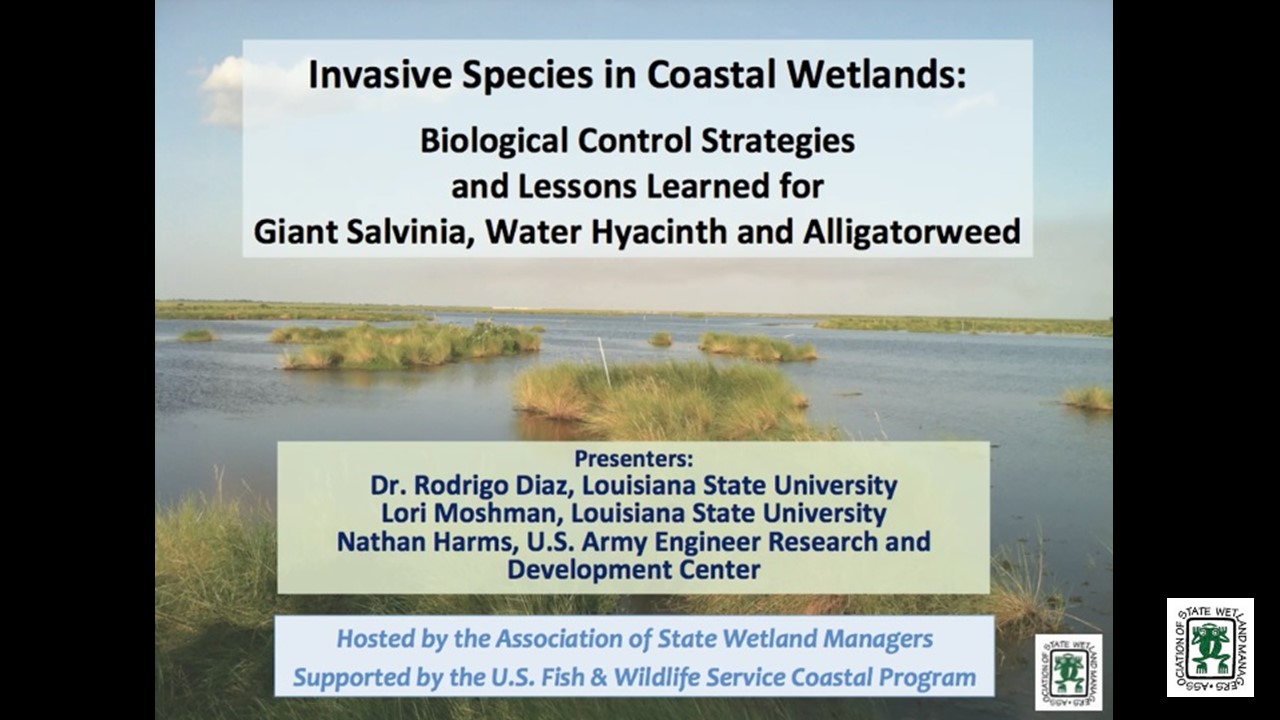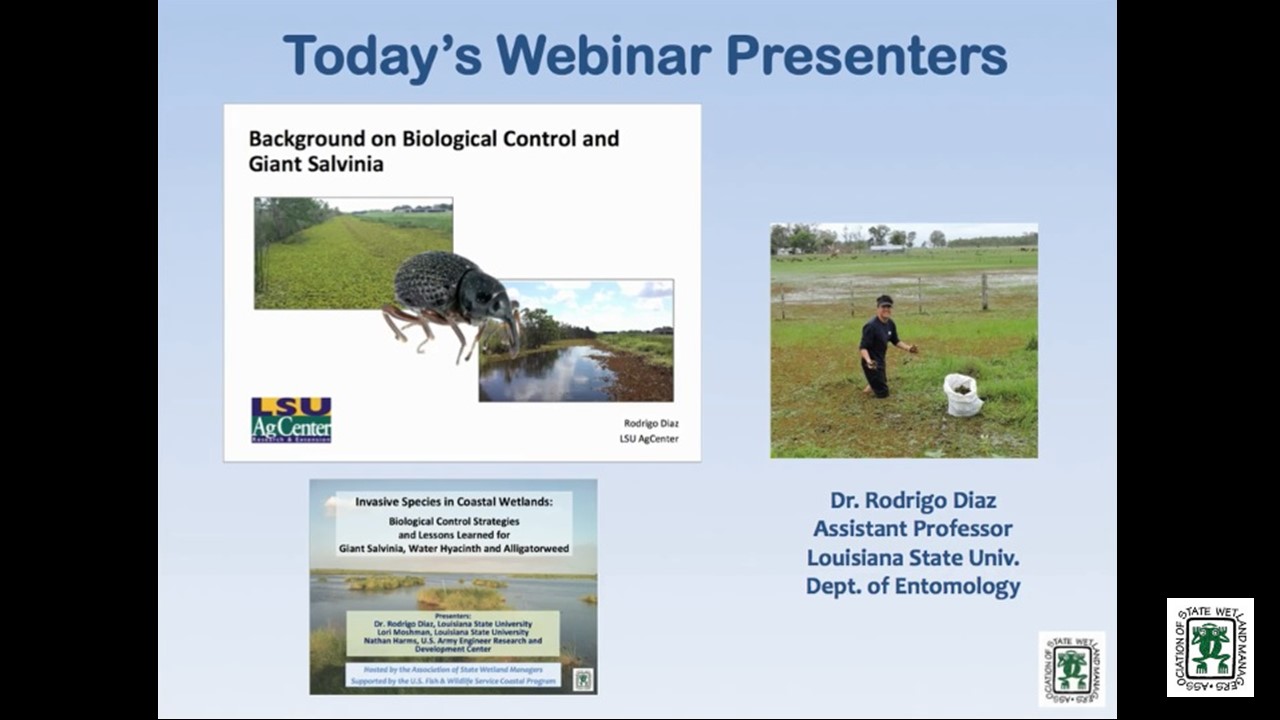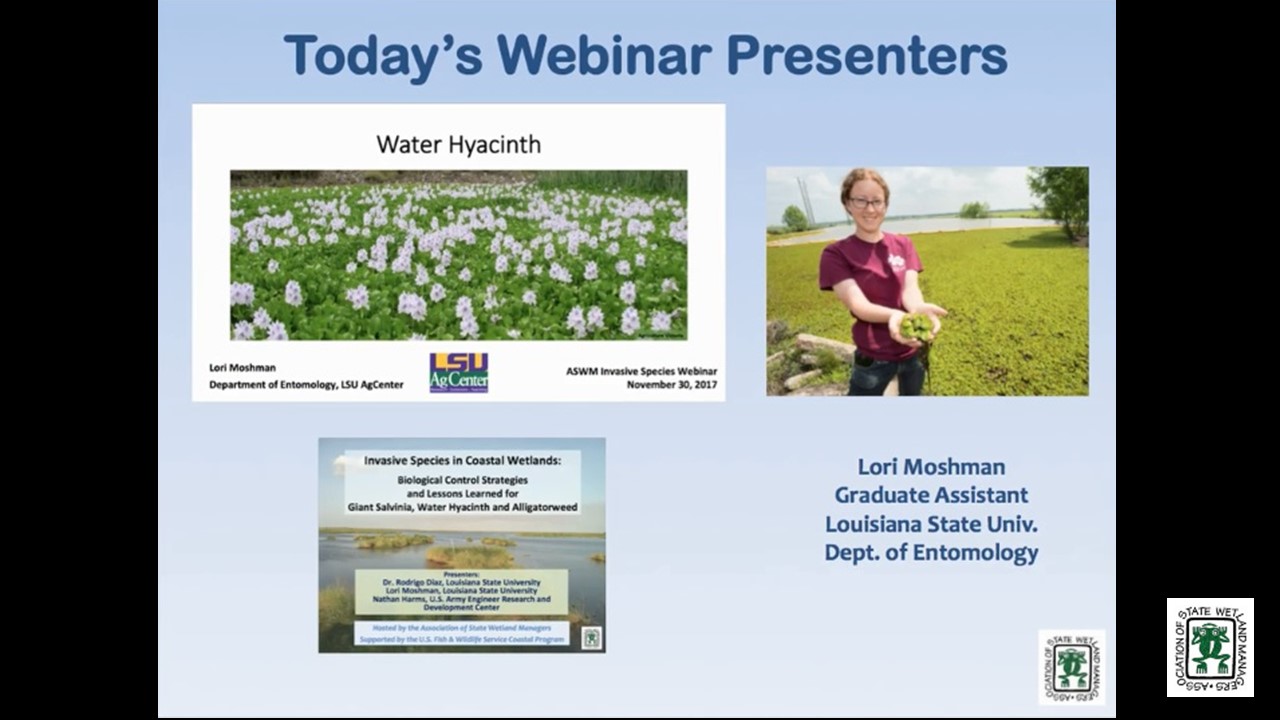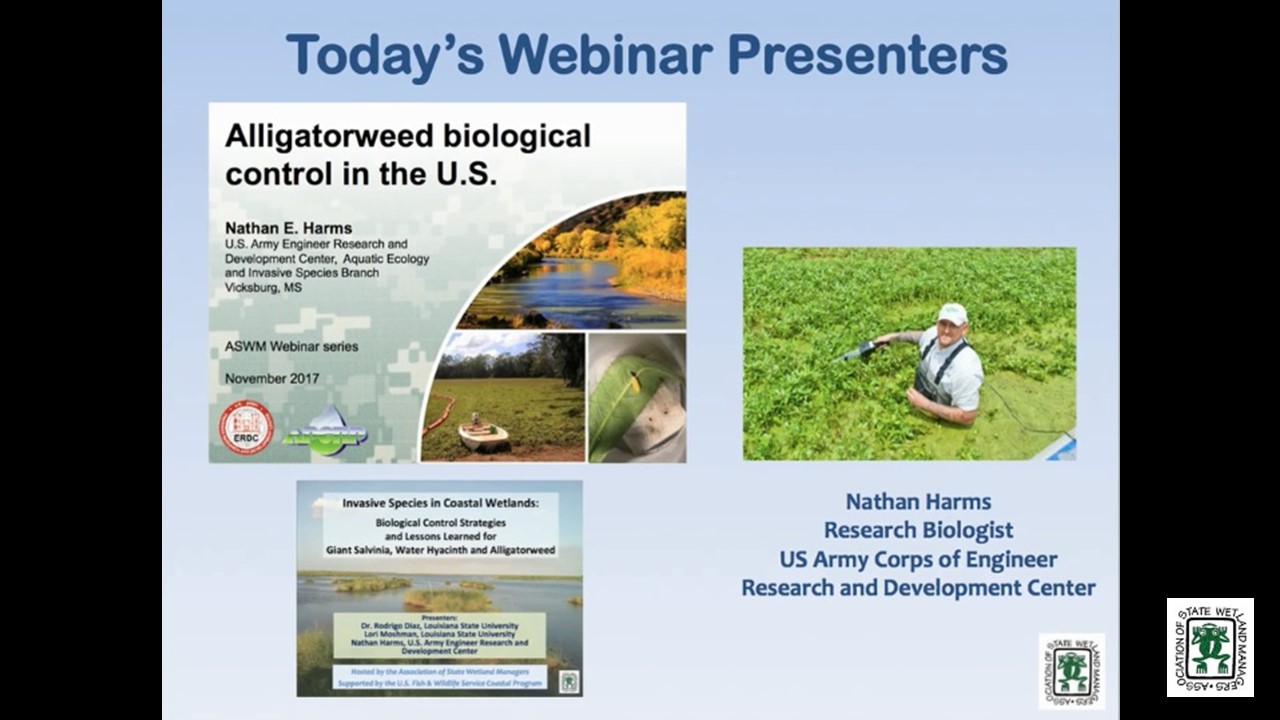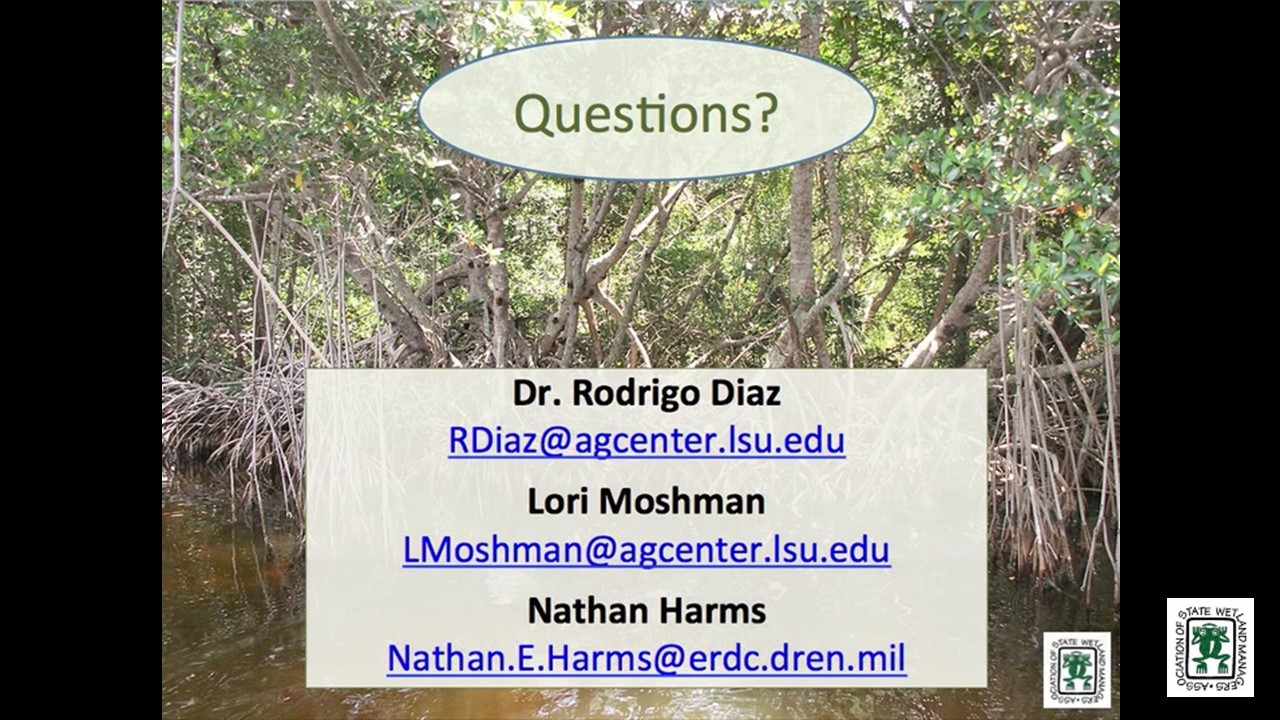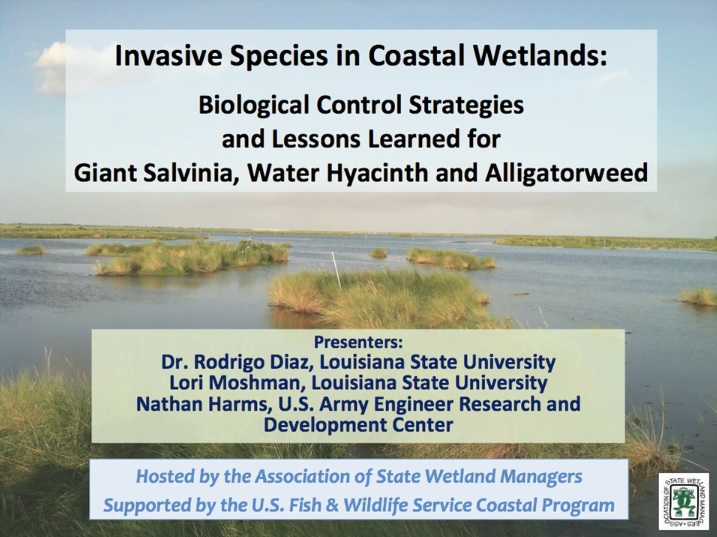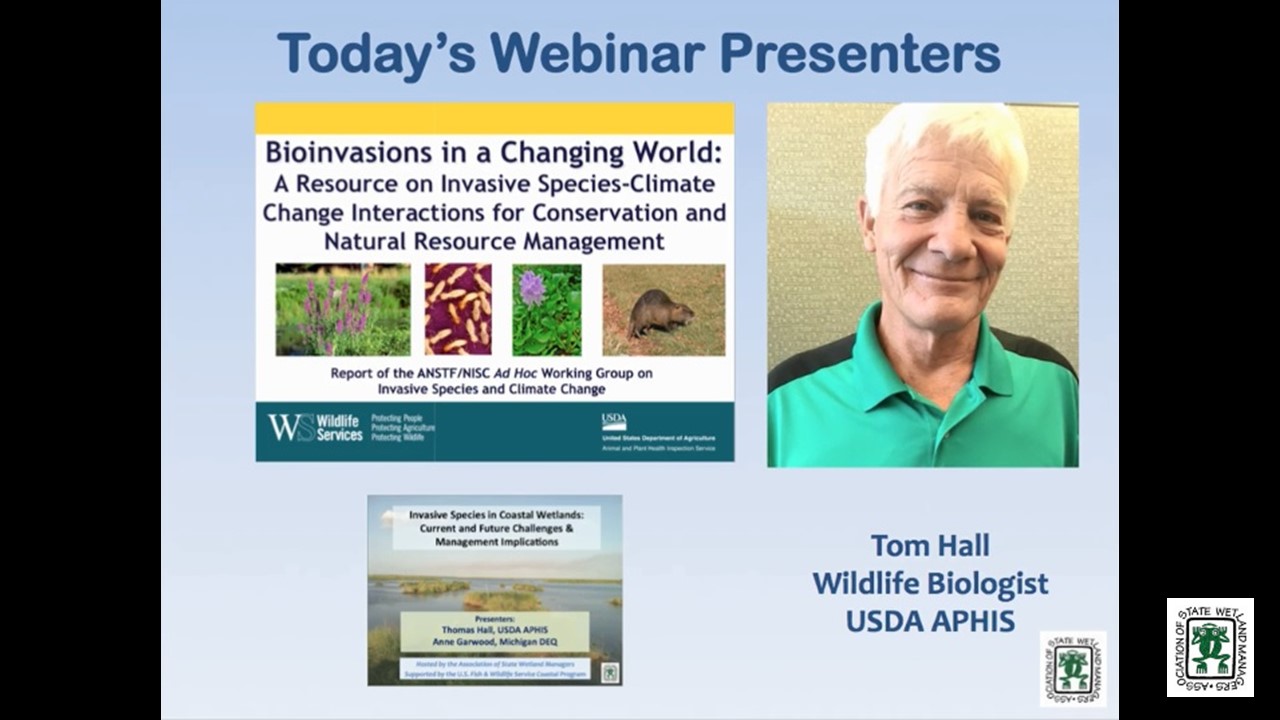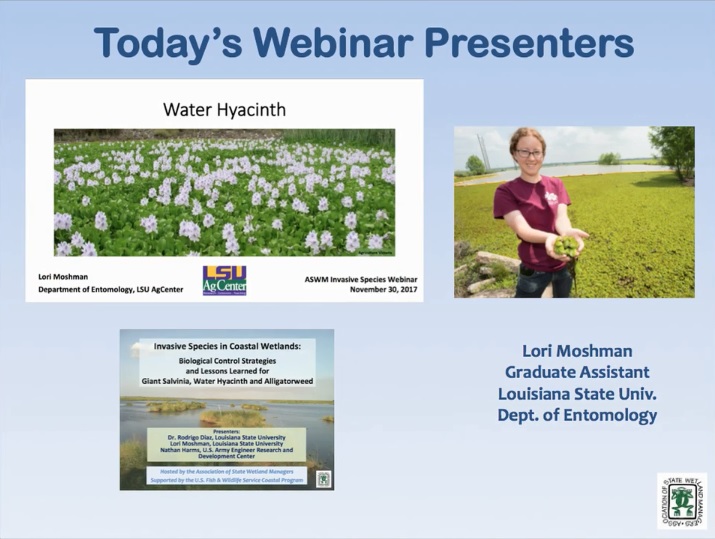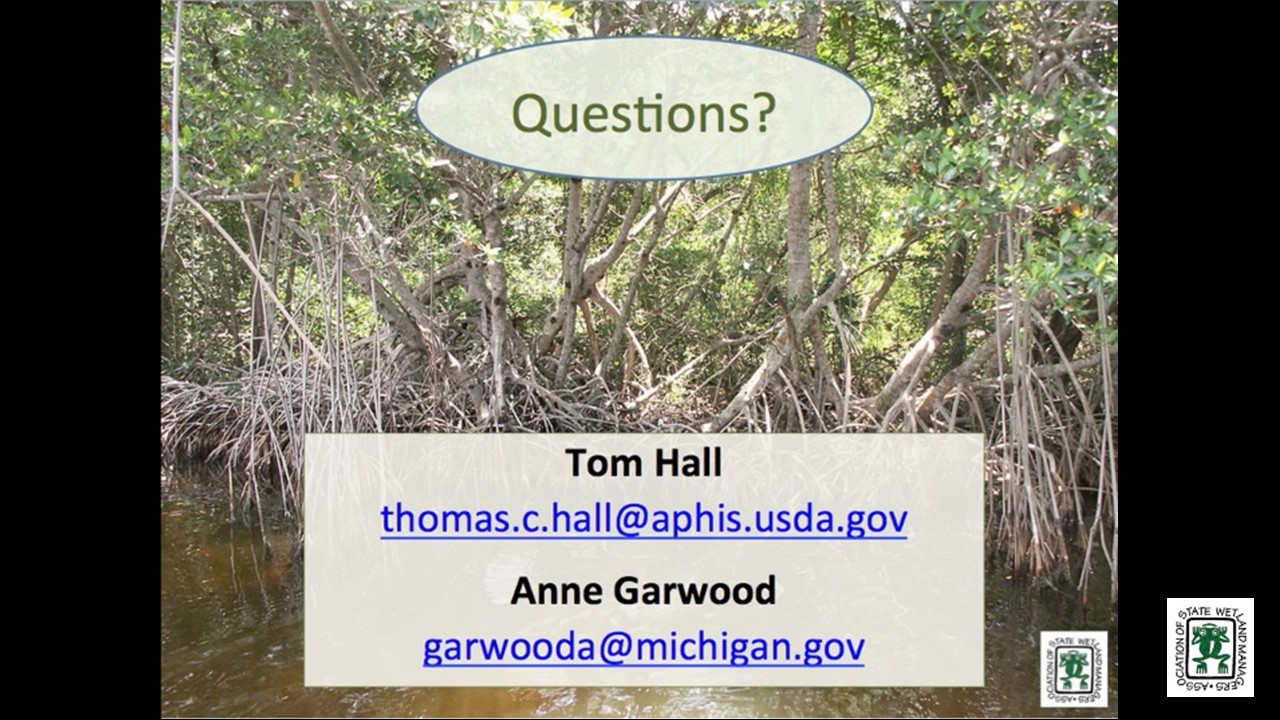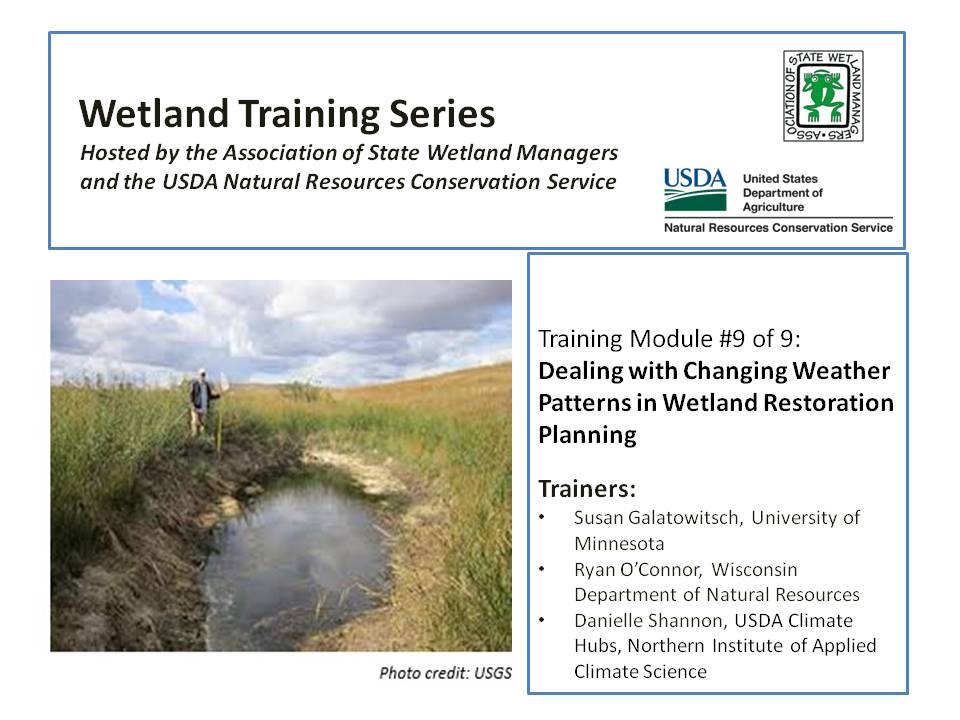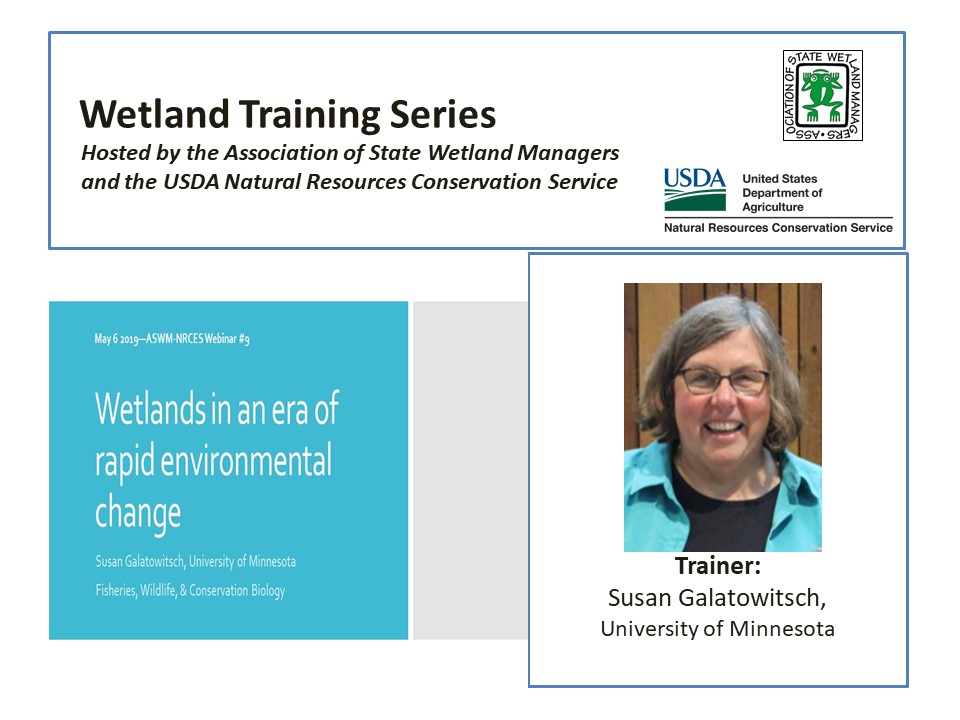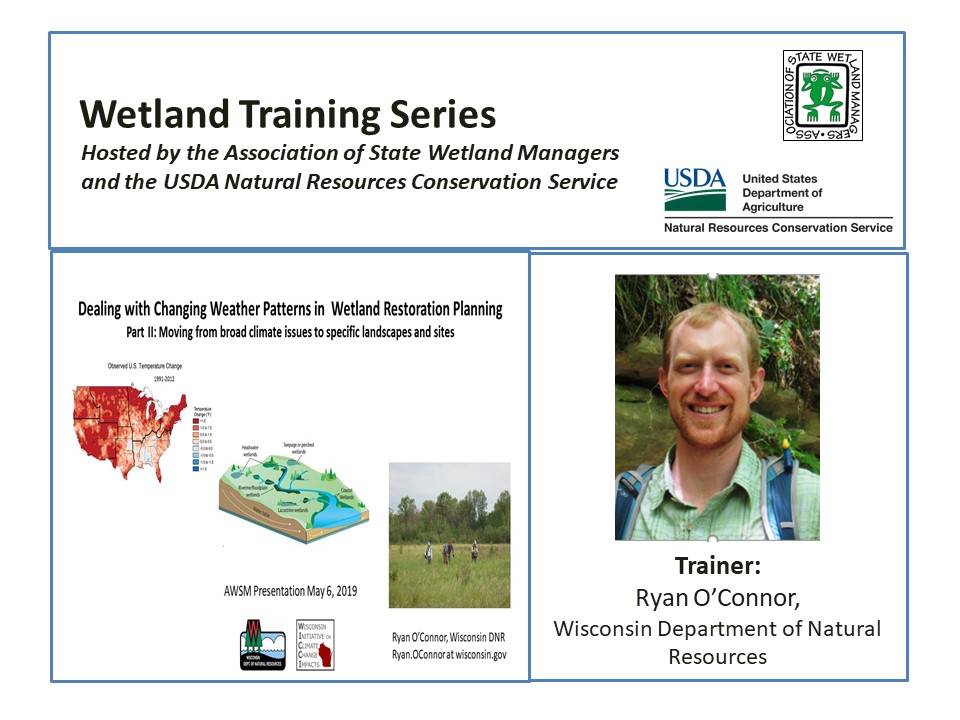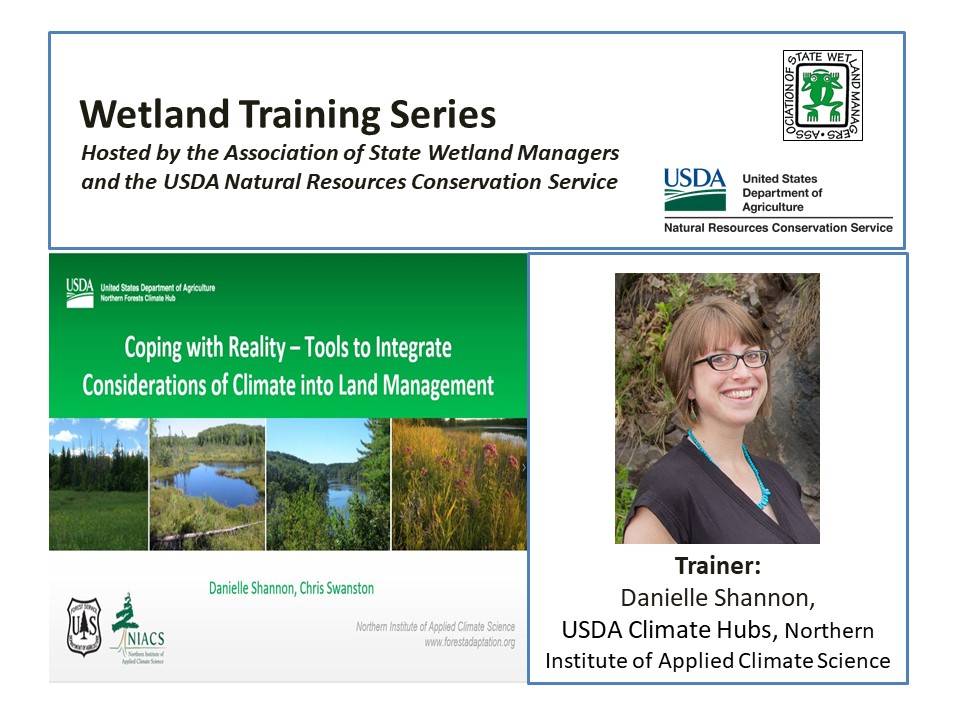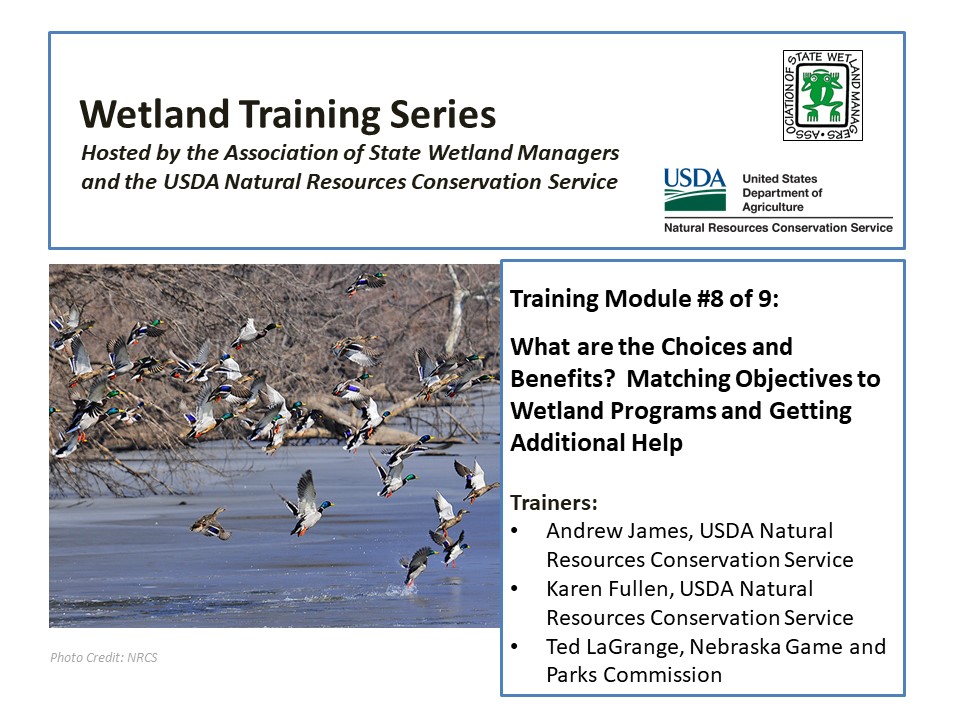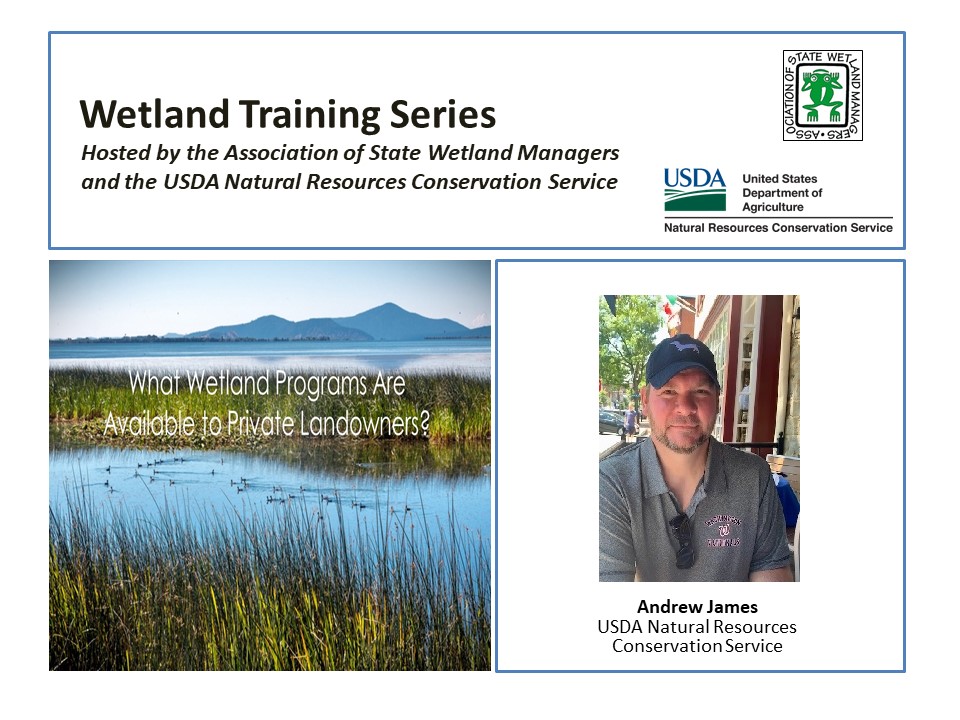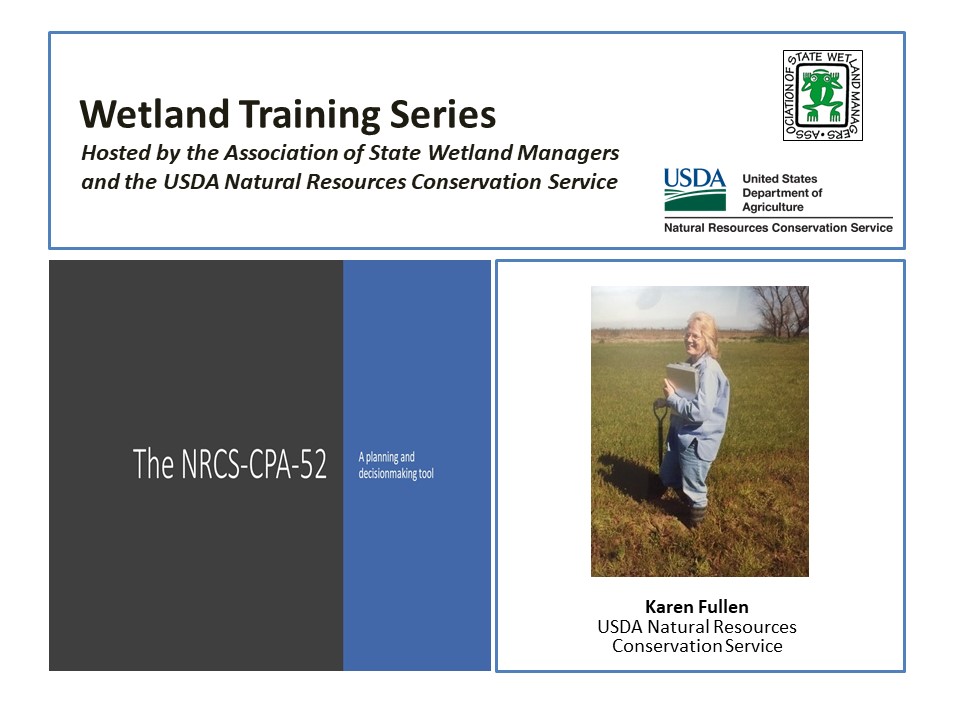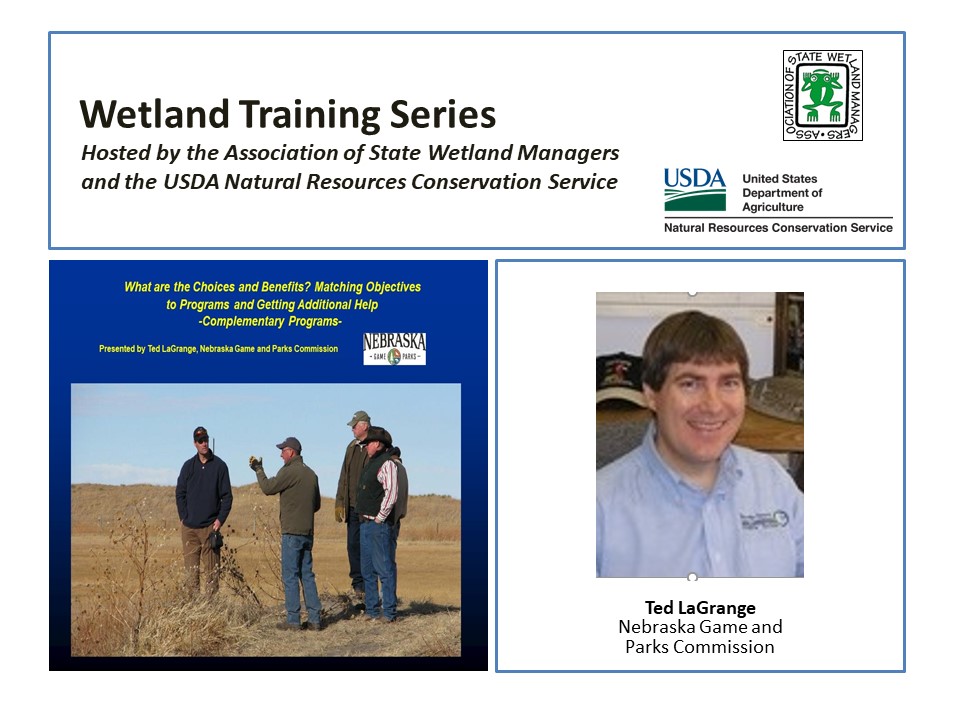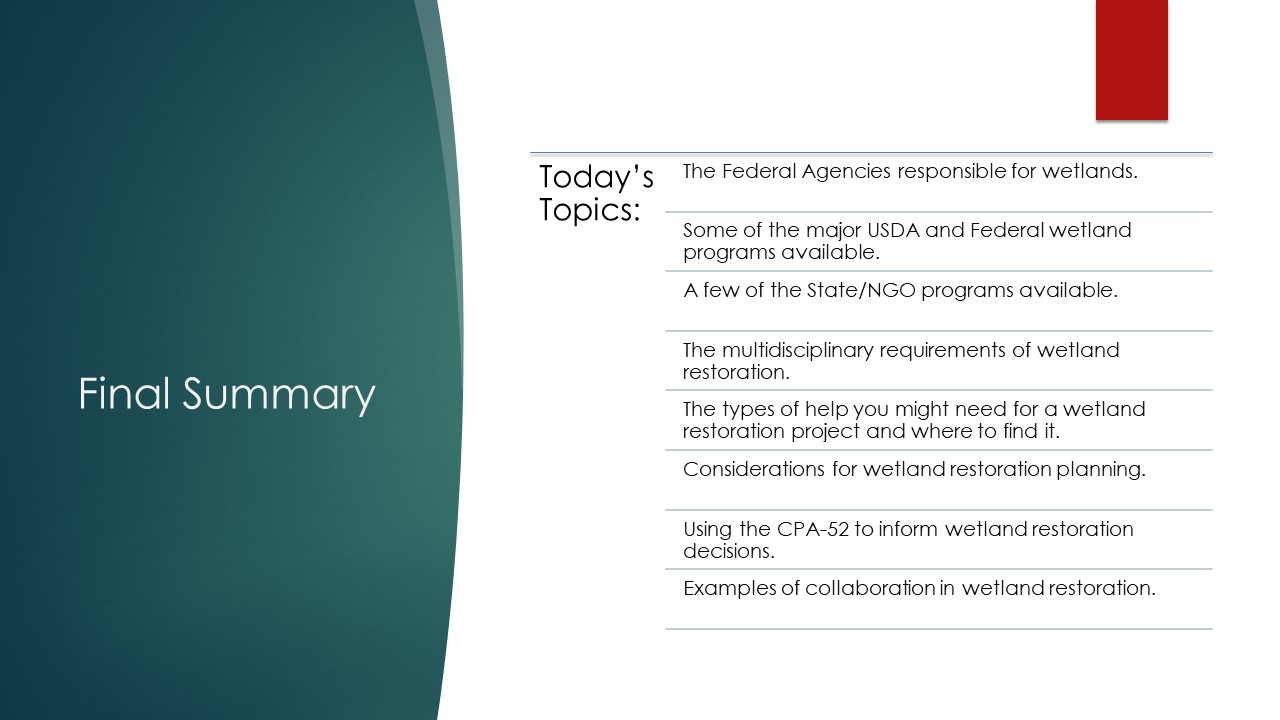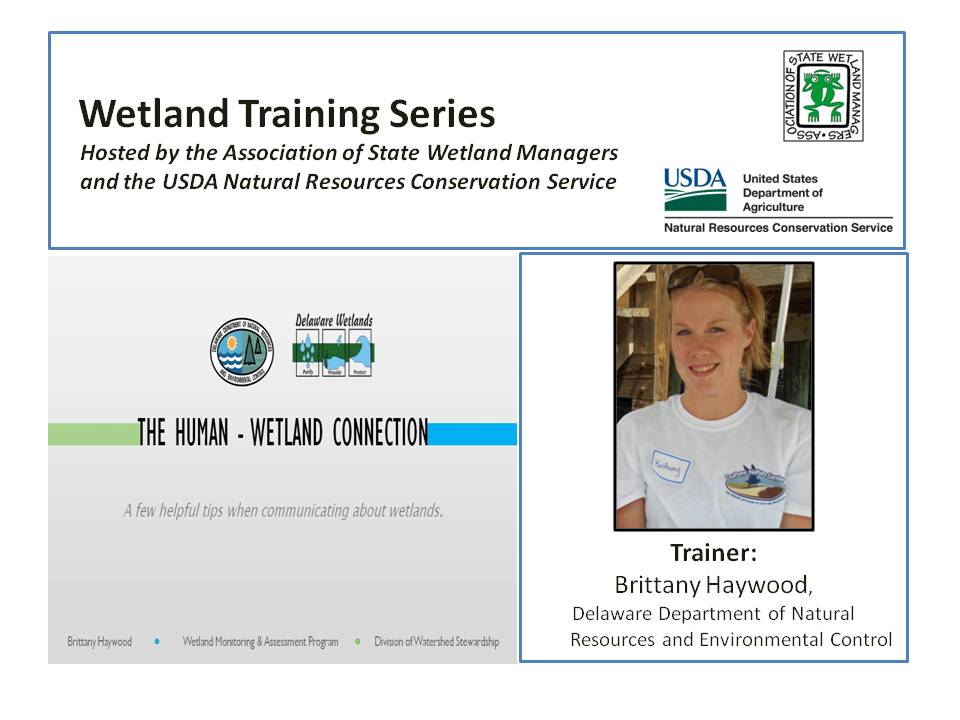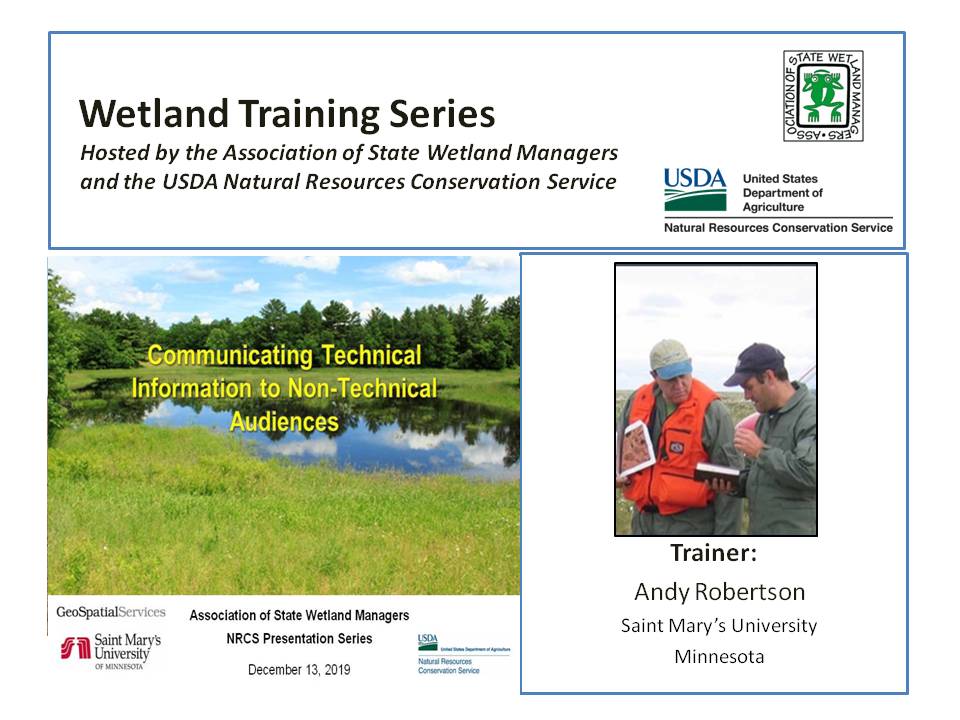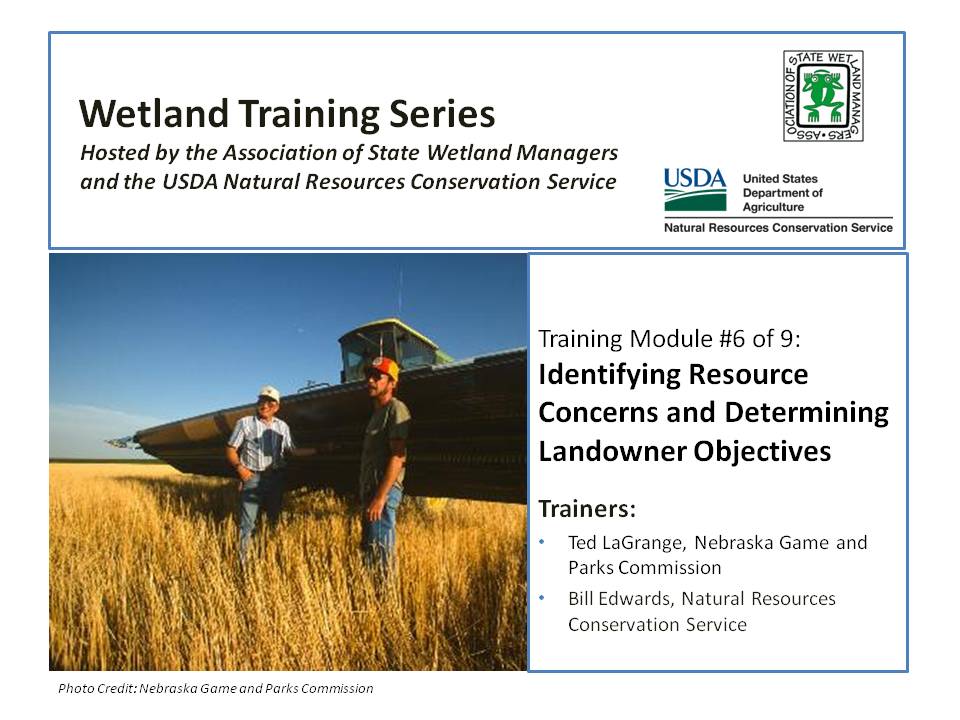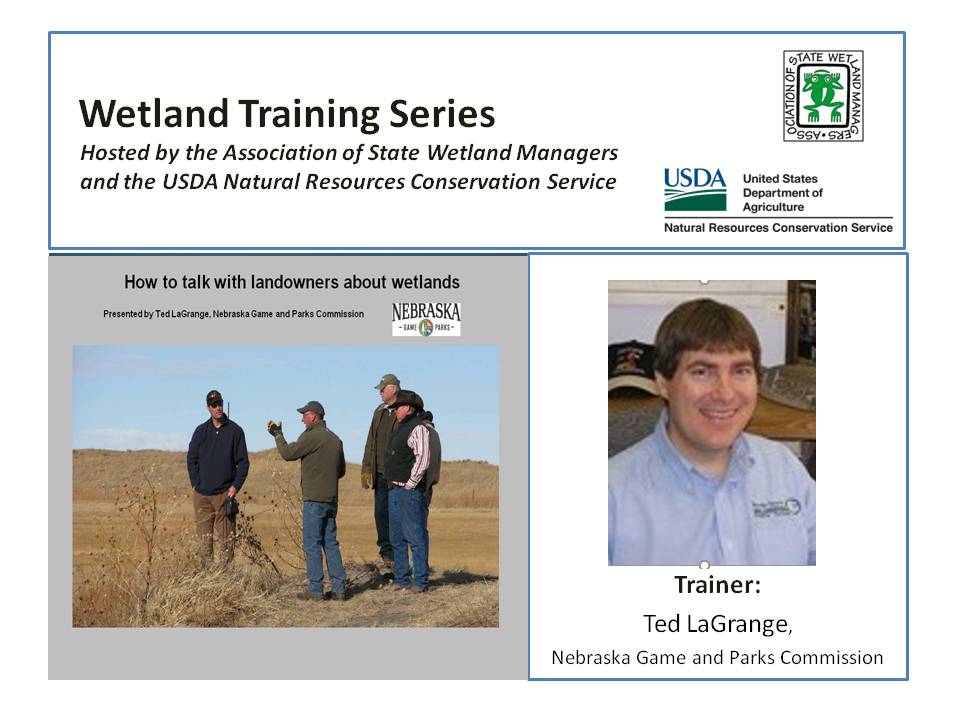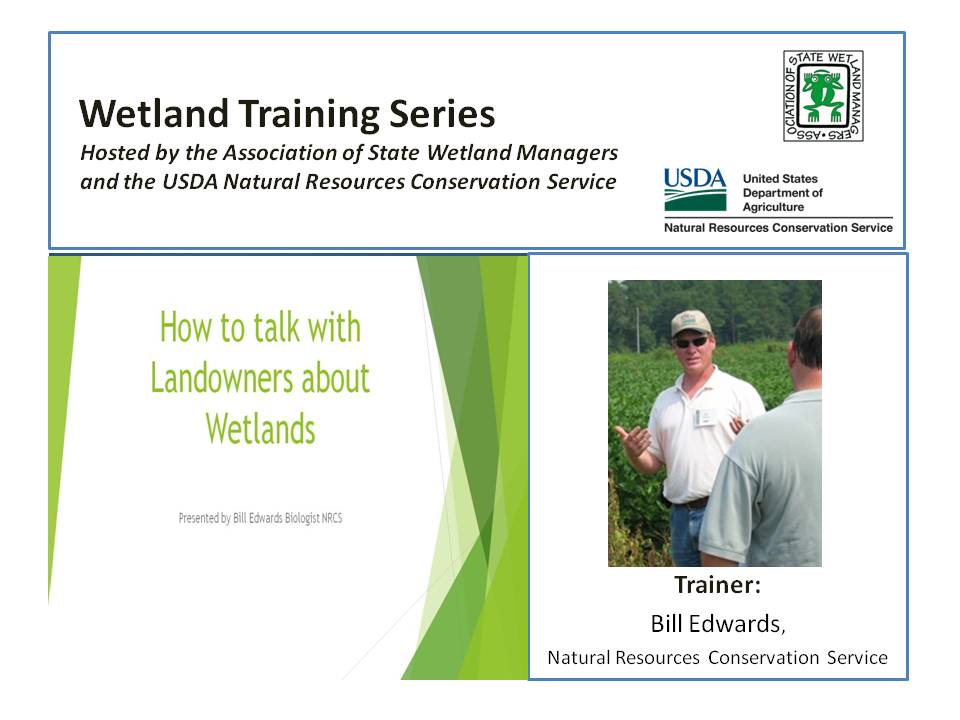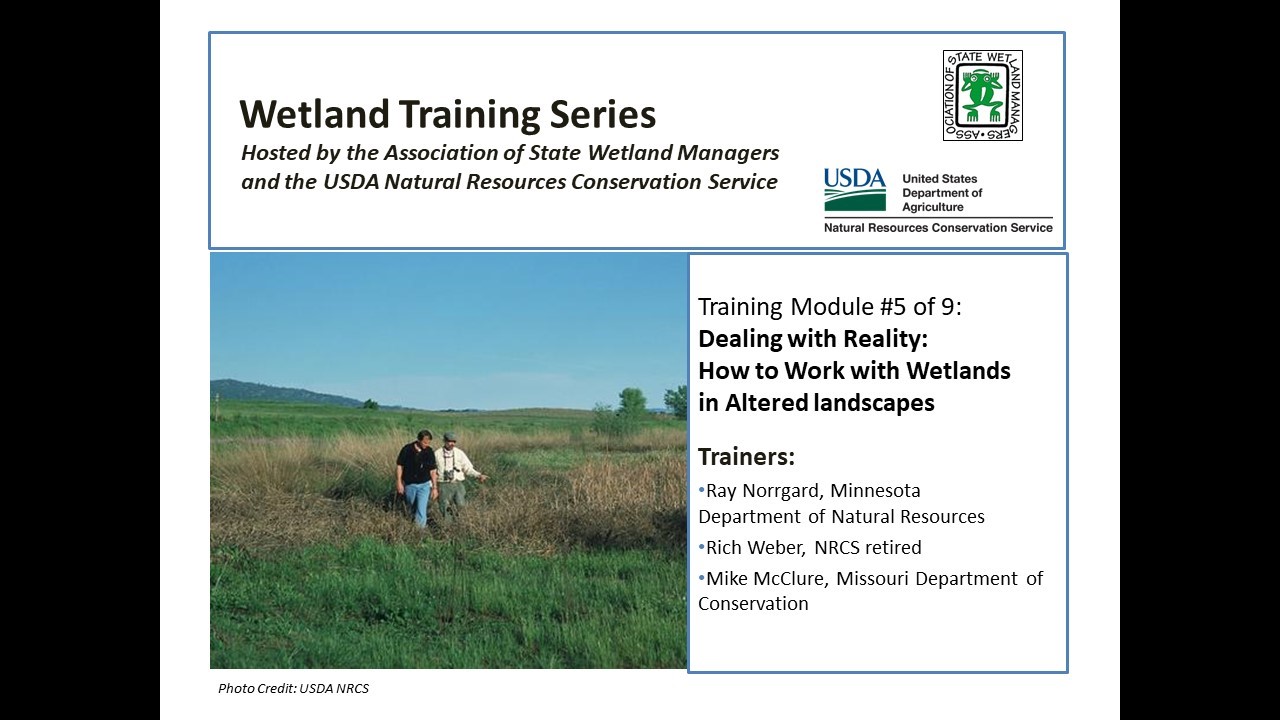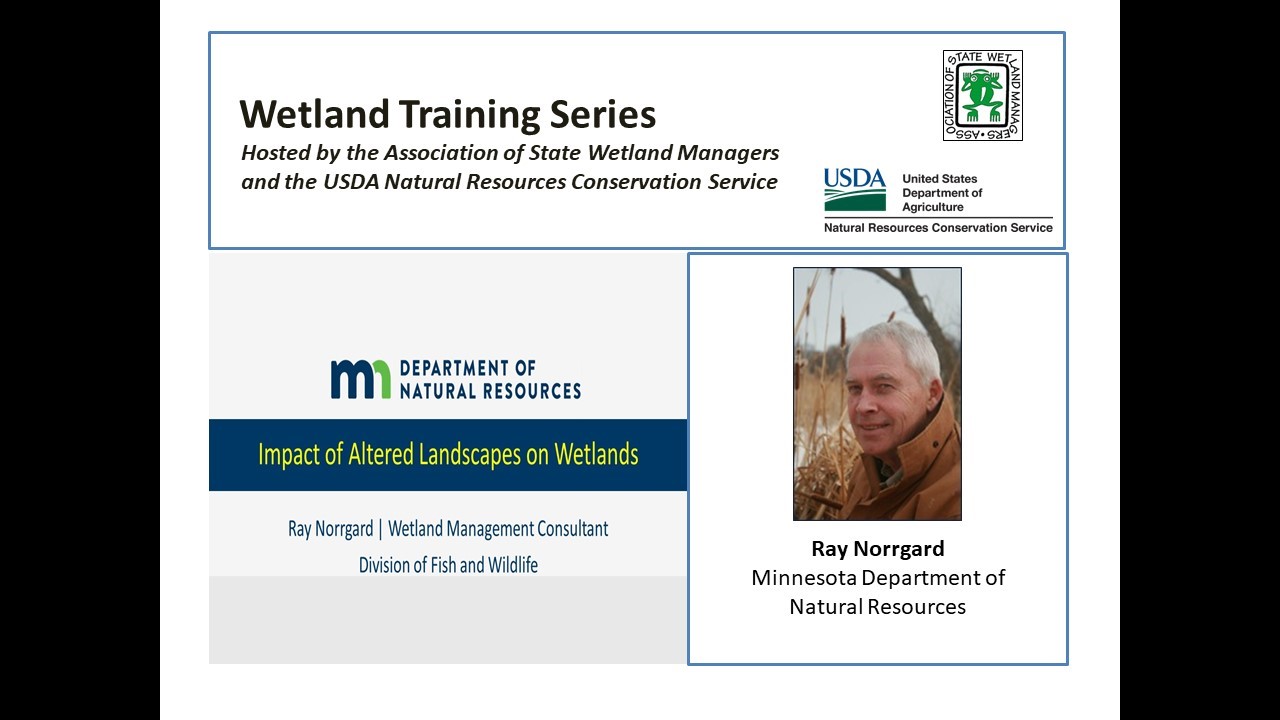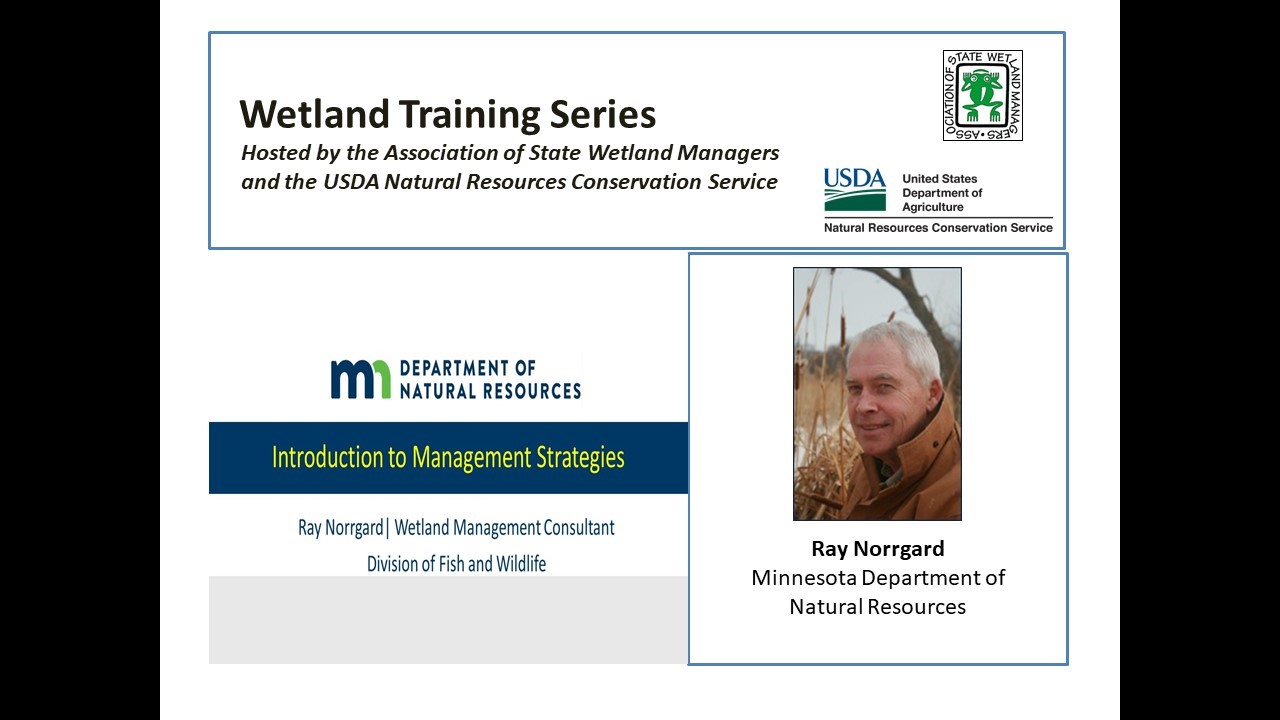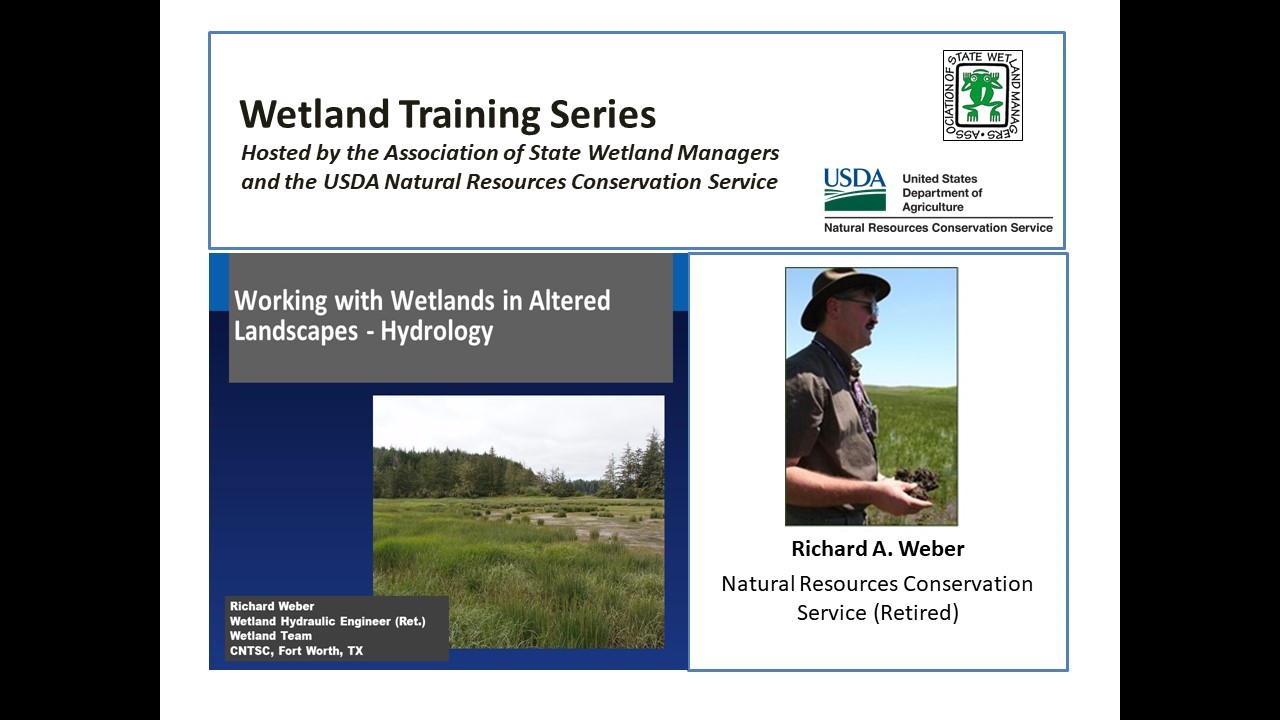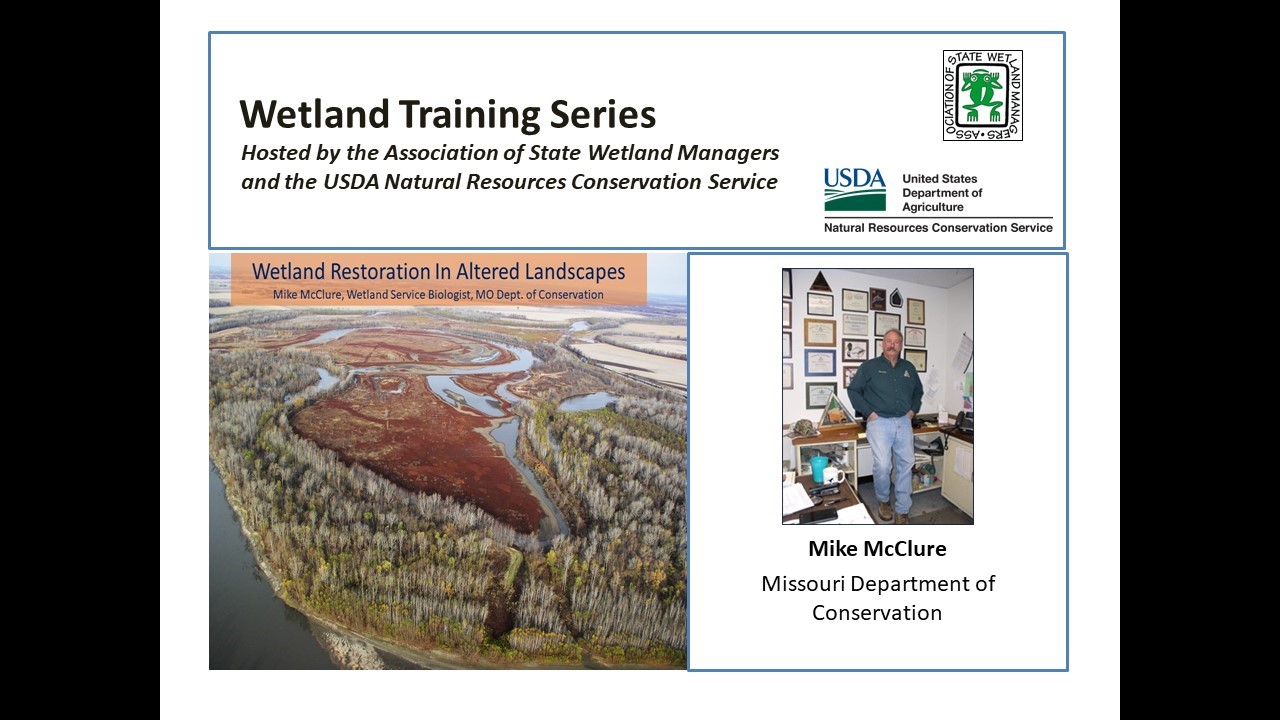NAWM
The National Association of Wetland Managers is a nonprofit membership organization established in 1983 to promote and enhance protection and management of wetland resources, to promote application of sound science to wetland management efforts and to provide training and education for our members and the public. Membership is open to anyone who is involved with wetland resources.
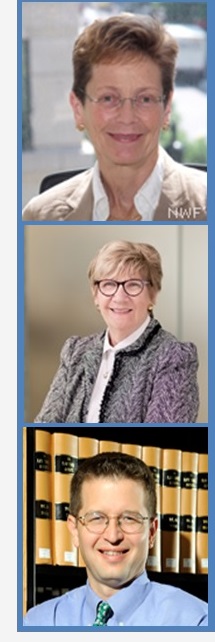 What's Next for Clean Water Act Jurisdiction
What's Next for Clean Water Act Jurisdiction
Tuesday, July 11, 2017 - 12:00 p.m.-2:00 p.m. Eastern
INTRODUCTION
Jeanne Christie, Executive Director, Association of State Wetland Managers [POWERPOINT PRESENTATION]
PRESENTERS
- Jan Goldman-Carter, National Wildlife Federation
- Virginia Albrecht, Hunton and Williams, LLP
- Royal C. Gardner, Stetson University, College of Law [POWERPOINT PRESENTATION]
The U.S. Environmental Protection Agency (EPA) and the Department of Army (Army) are carrying out a two-step process to revise Clean Water Act Jurisdiction. The first step is to repeal the Clean Water Rule regulation finalized by EPA and the Army in the spring of 2015 and replace it with the 1986 rule previously in place in conjunction with the Rapanos guidance. Essentially this step formally adopts the current status quo which remains in place because the Clean Water Rule is stayed by the Sixth Circuit Court pending action by the court. The next step following the repeal and replace rulemaking will be a new rule based in part on the Scalia Opinion in the Rapanos decision.
As states, tribes, and others review the proposed rule and think about the rulemaking that is planned to follow it, there are many issues to consider. ASWM has invited legal experts representing diverse perspectives to share their insights to help webinar participants to understand the current process, issues of importance, and potential outcomes as these rulemaking efforts are carried out and later challenged in the courts.
BIOS
Virginia S. Albrecht is Special Counsel for Hunton and Williams. Her practice focuses exclusively on environmental law and administrative law --- in particular, the Clean Water Act (CWA) wetlands program, the Endangered Species Act (ESA), the National Environmental Policy Act (NEPA) and other federal regulatory programs that affect the use of land. She has experience in permit negotiation, litigation of policy issues, lobbying Congress and the Administration, enforcement defense, and compliance counseling. Representative clients include development companies, agricultural and mining companies, state and local agencies, and trade associations. She has extensive experience with federal environmental agencies both in Washington and in district and regional offices. Virginia is a member of the assumable waters subcommittee which EPA established in 2015 to obtain advice on the scope of waters that can be assumed and Administered by states under section 404 of the clean water act. She is also an adjunct professor for the University of Miami School of Law Program in Real Property Development. She received her JD from Vanderbilt University Law School, was Articles Editor of the Vanderbilt Law Review in1981, and received her MA in Communications from the University of Pennsylvania in 1970 and her BS from the University of Wisconsin in 1964. She has bar admissions in the District of Columbia.
Jan Goldman-Carter is Director, Wetlands and Water Resources for the National Wildlife Federation. She manages the NWF campaign to restore Clean Water Act protections and works to strengthen wetland and watershed protections regionally and nationally. Jan has lectured and written extensively on Clean Water Act and wetlands laws and programs since 1987. She received the EPA-ELI National Wetlands Award in 1993. Jan served as a wetlands specialist with the U.S. Fish and Wildlife Service, the U.S. Environmental Protection Agency, and the U.S. Army Corps of Engineers. She grew up on the edge of the "River of Grass" - the Everglades - and enjoys canoeing, kayaking, birding and otherwise being in and on the water. She received her B.A. in Biology and Environmental Studies from Williams College, Massachusetts, her M.S. in Natural Resources from the University of Michigan School of Natural Resources, and her law degree from the University of Minnesota.
Royal C. Gardner is Professor of Law and Director of the Institute for Biodiversity Law and Policy at Stetson University College of Law. He is an internationally recognized expert in wetland law and policy. Recent projects include advising the Government of Oman regarding wetland policy, coauthoring a U.S. Supreme Court amicus brief on behalf of environmental scientists, and creating an interdisciplinary course that facilitates discourse among experienced scientists, policymakers, and students.
His research and scholarship focus on U.S. and international wetland legal and policy issues, with an emphasis on biodiversity offsets. He has lectured in Africa, Asia, Europe, and North and South America.
Professor Gardner is the current chair of the Scientific and Technical Review Panel (STRP) for the Ramsar Convention, an intergovernmental wetland treaty with 168 countries. He also served on the Ramsar STRP as North American representative (2006–2008) and invited expert (2009–2012). He was chair of the U.S. National Ramsar Committee (2005–2008) and participated in the Ramsar Convention Conferences of the Parties held in Spain (2002), Uganda (2005), Korea (2008), and Romania (2012). In 2006, he won the National Wetlands Award for Education and Outreach. In 1999–2001, Professor Gardner was appointed to the National Research Council’s Committee on Mitigating Wetland Losses.
An executive editor of the Boston College Law Review and a member of the Order of the Coif, he graduated magna cum laude from Boston College Law School. He then clerked for Chief Judge Francis J. Boyle of the United States District Court for the District of Rhode Island. From 1989 to 1993, he served in the Army General Counsel’s office as the Department of the Army’s principal wetland attorney, advising the assistant secretary of the Army (civil works) on legal and policy issues related to the Corps of Engineers’ administration of the Clean Water Act section 404 program. From 1993 until he joined the Stetson faculty in 1994, Professor Gardner worked for the Department of Defense, where he participated in negotiating international agreements with Russia, Ukraine, Kazakhstan, and Belarus to facilitate the dismantlement of the former Soviet Union’s nuclear weapons.
Since joining the Stetson faculty, Professor Gardner has twice received Stetson University’s Homer and Dolly Hand Award for Excellence in Faculty Scholarship and has been voted the Outstanding Professor by the Stetson student body. He has taught at Stetson’s summer programs in Spain, Germany, Argentina, and Estonia, and has been a visiting professor at the Universidad de Málaga (Spain) and Concordia International University-Estonia, where he received the Outstanding Instructor Award. At Stetson, Professor Gardner has served as director of graduate and international programs, associate dean, vice dean, and interim dean.
|
The presentations for Jan Goldman-Carter and Virginia Albrecht are not available for viewing. |
![]()
Recorded Webinar: 2017 Annual State/Tribal/Federal Coordination Meeting
What's Next for Clean Water Act Jurisdiction:
Maintaining - or Draining - the Swamps? The Future of the Clean Water Rule
Tuesday, April 11, 2017
INTRODUCTION
Jeanne Christie, Executive Director, Association of State Wetland Managers
ABSTRACT
In the spring of 2017 the US Environmental Protection Agency and the Army Corps of Engineers are implementing Executive Order 13778 on Restoring the Rule of Law, Federalism, and the Economic Growth by Reviewing the ”Waters of the United States” Rule which directs the federal agencies to rescind the current Clean Water Rule and replace it. This recorded webinar by Stephen Samuels, retired, formerly with Department of Justice, provides information about the status of the currently stayed Clean Water Rule and the case that has been accepted to be heard in 2018 before the Supreme Court, as well as a succinct overview of Supreme Court decisions addressing Clean Water Act jurisdiction in recent decades through the present day.
PRESENTER
- Stephen Samuels, Retired, formerly with Department of Justice [POWERPOINT PRESENTATION]
BIO
Now retired, Stephen Samuels was previously Assistant Chief of the Environmental Defense Section of the Environment & Natural Resources Division of the U.S. Department of Justice. In that capacity, Mr. Samuels supervised a staff of 15 attorneys handling federal district court litigation involving all the major environmental pollution statutes. Mr. Samuels has 31 years of experience enforcing and defending the Clean Water Act Section 404 regulatory program. During that time, he helped lead the federal government’s litigation responses to the Supreme Court's decisions in SWANCC, Rapanos, Sackett and Hawkes. Until his retirement in January 2017, Mr. Samuels headed the DOJ litigation team that defended challenges to the Clean Water Rule. Mr. Samuels is a frequent speaker on Clean Water Act jurisdiction at conferences around the country. Mr. Samuels previously was an attorney with the U.S. Department of Energy and with the law firm of Breed, Abbott & Morgan. Mr. Samuels earned his J.D. in 1977 from Stanford Law School and his B.A. in 1974 from Tulane University.
![]()
View Past Clean Water Act Webinars Here
| 2020 | 2019 | 2018 | 2015 | ||||||
Webinar 8: An Ecological Framework for Reviewing Compensatory Mitigation: Oversight and Compliance
Held Thursday, October 24, 2019 - 2:00pm – 4:30pm Eastern
INTRODUCTION
Marla Stelk, Executive Director, National Association of Wetland Managers [POWERPOINT PRESENTATION]
PRESENTERS
- Kristina Hall, U.S. Army Corps of Engineers [POWERPOINT PRESENTATION]
- Sarah Woodford, Virginia Department of Environmental Quality [POWERPOINT PRESENTATION]
- Ashely Zavagno, CA WRA, Inc. [POWERPOINT PRESENTATION]
ABSTRACTS
Kristina Hall
Oversight and compliance is an important component of compensatory mitigation. This presentation will discuss oversight and compliance from the perspective of a Corps Regulator as well as important “touch points” in mitigation plan review, approval, implementation, monitoring and long term management. Examples of effective adjustment of anticipated outcomes will be given and along with flexibility in the Regulatory’s oversight of the compensatory mitigation process.
Sarah Woodford
Oversight and compliance are essential components of any functional regulatory program. This presentation discusses oversight tools that are used in Virginia in the regulation of mitigation banks and in-lieu fee programs. In addition, through several case studies, the presentation will provide a state perspective of the communication and resolutions that developed when non-compliance or other issues were identified.
Ashley Zavagno
Oversight and compliance challenges in compensatory mitigation are different for project sponsors and consultants than for regulators. This presentation will explore challenges faced by project sponsors and consultants during the development, implementation, monitoring, and long-term management stages of mitigation projects and offer potential solutions and best management practices. Such challenges include implementing complex performance standards for multiple agencies, finding appropriate easement and endowment holders, disparity in endowment requirements across projects, coordinating decisions with multiple parties during implementation, and lack of collaboration between agencies and project proponents during project development.
BIOS
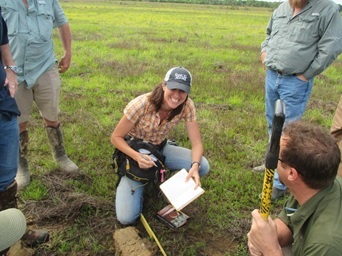 Kristi Hall, Professional Wetland Scientist, is currently the USACE Regulatory Headquarters Science Detailee. When not on detail assignment, she is a Senior Environmental Scientist with the Vicksburg District Regulatory Branch, Evaluation Section. At the District, Kristi primarily focuses on mitigation banking and standard permitting. Kristi has worked in the Regulatory field since 2003 and has been with the Vicksburg District since 2015. She obtained her bachelor’s degree in biochemistry from Virginia Tech and her master’s degree in fisheries and wildlife biology from Colorado State University. Kristi has worked in both the public and private sectors with the Mississippi Department of Transportation, USACE ERDC Environmental Lab, as well as several private consulting firms prior to working with USACE Regulatory. Kristi served as Acting Technical Services Branch Chief in the Nashville District in 2017 and was named the 2018 Vicksburg District Regulator of the Year. In her “free time” she can be found shuttling her two kids to their numerous athletic endeavors, and working with her husband to build their own home in Vicksburg.
Kristi Hall, Professional Wetland Scientist, is currently the USACE Regulatory Headquarters Science Detailee. When not on detail assignment, she is a Senior Environmental Scientist with the Vicksburg District Regulatory Branch, Evaluation Section. At the District, Kristi primarily focuses on mitigation banking and standard permitting. Kristi has worked in the Regulatory field since 2003 and has been with the Vicksburg District since 2015. She obtained her bachelor’s degree in biochemistry from Virginia Tech and her master’s degree in fisheries and wildlife biology from Colorado State University. Kristi has worked in both the public and private sectors with the Mississippi Department of Transportation, USACE ERDC Environmental Lab, as well as several private consulting firms prior to working with USACE Regulatory. Kristi served as Acting Technical Services Branch Chief in the Nashville District in 2017 and was named the 2018 Vicksburg District Regulator of the Year. In her “free time” she can be found shuttling her two kids to their numerous athletic endeavors, and working with her husband to build their own home in Vicksburg.
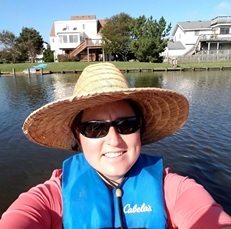 Sarah Woodford is the Compensatory Mitigation Specialist for the Virginia Department of Environmental Quality. She is the state chair of the Interagency Review Team for all non-tidal wetland and stream mitigation banks and in-lieu fee programs in the U.S. Army Corps of Engineers Norfolk District, and ensures that mitigation sponsors adhere to State Water Control Law and Virginia Water Protection Permit Program regulations. Sarah works closely with the Corps and the Virginia Marine Resources Commission IRT chairs, along with other member agencies of the IRT, to reach consensus on complex issues in compensatory mitigation. She also assists permit managers, mitigation sponsors, consultants, and the regulated public in understanding the mitigation process. Prior to DEQ, Sarah worked as an environmental consultant, where she focused on water quality monitoring and stream mitigation assessment, restoration design, and post-construction performance monitoring.
Sarah Woodford is the Compensatory Mitigation Specialist for the Virginia Department of Environmental Quality. She is the state chair of the Interagency Review Team for all non-tidal wetland and stream mitigation banks and in-lieu fee programs in the U.S. Army Corps of Engineers Norfolk District, and ensures that mitigation sponsors adhere to State Water Control Law and Virginia Water Protection Permit Program regulations. Sarah works closely with the Corps and the Virginia Marine Resources Commission IRT chairs, along with other member agencies of the IRT, to reach consensus on complex issues in compensatory mitigation. She also assists permit managers, mitigation sponsors, consultants, and the regulated public in understanding the mitigation process. Prior to DEQ, Sarah worked as an environmental consultant, where she focused on water quality monitoring and stream mitigation assessment, restoration design, and post-construction performance monitoring.
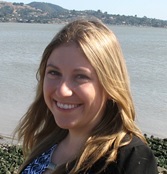 Ashley Zavagno is a Restoration Ecologist and Project Manager at WRA, Inc., a private environmental consulting firm based in the San Francisco Bay Area. She received her Bachelor of Science in Ecology and Evolution from U.C. Santa Barbara and her Master of Environmental Science and Management with a specialization in conservation planning from the Bren School of Environmental Science & Management. She is also a Certified Ecological Restoration Practitioner through the Society of Ecological Restoration and a Certified Ecologist through the Ecological Society of America. For the past several years, she has been overseeing the entitlement, permitting, implementation, monitoring, and long-term management of various mitigation banks and large-scale permittee-responsible mitigation projects throughout California. She has worked in various western landscapes including tidal wetlands, vernal pools, chaparral, coniferous forests, and oak woodlands, but her passion is rivers and salmonids.
Ashley Zavagno is a Restoration Ecologist and Project Manager at WRA, Inc., a private environmental consulting firm based in the San Francisco Bay Area. She received her Bachelor of Science in Ecology and Evolution from U.C. Santa Barbara and her Master of Environmental Science and Management with a specialization in conservation planning from the Bren School of Environmental Science & Management. She is also a Certified Ecological Restoration Practitioner through the Society of Ecological Restoration and a Certified Ecologist through the Ecological Society of America. For the past several years, she has been overseeing the entitlement, permitting, implementation, monitoring, and long-term management of various mitigation banks and large-scale permittee-responsible mitigation projects throughout California. She has worked in various western landscapes including tidal wetlands, vernal pools, chaparral, coniferous forests, and oak woodlands, but her passion is rivers and salmonids.
![]()
Webinar 7: An Ecological Framework for Compensatory Mitigation: Anticipating the Unexpected
Held Thursday, June 27, 2019 - 2:00pm – 4:30pm Eastern
![]()
INTRODUCTION
Marla Stelk, Executive Director, National Association of Wetland Managers [POWERPOINT PRESENTATION]
PRESENTERS
- W. Lee Daniels, Thomas B. Hutcheson Professor of Environmental Soil Science, Virginia Tech [POWERPOINT PRESENTATION]
- Shawn Chartrand, Postdoctoral Research Fellow, Vanderbilt University [POWERPOINT PRESENTATION]
- Krystel Bell, Regulatory Program Manager, U.S. Army Corps of Engineers [POWERPOINT PRESENTATION]
ABSTRACTS
W. Lee Daniels
Compaction of created wetland subsoils is often required for stability and to limit groundwater losses, but failure to provide a suitably loosened surface soil rooting media is a common problem, particularly for deeper rooted forested wetlands. Remedies include managing soil placement and tillage operations in concert with seasonal/moisture constraints. Near-surface compaction can also drastically alter hydroperiod regimes away from intended target references. Deeper excavations of creation sites in the mid-Atlantic USA also commonly encounter potential acid-sulfate materials, which if allowed to oxidize, generate very low soil+water pH and phytotoxic conditions. Preconstruction testing, recognition and avoidance are critical; remedial measures include heavy liming and organic amendments and/or keeping these materials saturated year-round.
Shawn Chartrand
Wetland and fluvial restoration projects commonly include post-construction plans which detail actions to address issues related to routine maintenance, adaptive management and remediation. These three direct actions have one common goal: set the constructed project on a trajectory to realize the restoration objectives. In this webinar they reviewed these three direct actions, with an emphasis on (1) how the direct actions are typically differentiated during the pre-construction planning and design phase, (2) post-construction conditions that are difficult to anticipate and therefore plan around, and (3) strategies that can be used to address significant uncertainties involving future landscape conditions. They reviewed the San Clemente Dam Removal project to help illustrate routine maintenance, adaptive management and remediation, within the context of an action that will reset the Carmel River corridor to a new physical state.
Krystel Bell
This presentation provided an understanding of the Corps' perspective in review, approval, and oversight of mitigation projects where adaptive management has been used as an important tool for planning and response to challenges and unforeseen changes to those projects.
BIOS
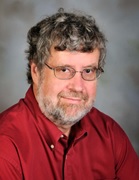 W. Lee Daniels is the Thomas B. Hutcheson Professor of Environmental Soil Science at Virginia Tech in Blacksburg, Virginia. He received his Ph.D. in Soil Science from VPI & SU in 1985. Dr. Daniels areas of specialization include stabilization and restoration of disturbed lands including areas disturbed by mining, road building, waste disposal, urbanization and erosion. In particular, he has focused his research and consulting experience in wetland impact mitigation, mine reclamation, and soil-waste management systems. His teaching programs at Virginia Tech focus on soil geomorphology and landscape analysis with particular emphasis on the relationships among surficial geology, hydrology, soil patterns and long term landscape evolution processes. Major awards include the Reclamation Researcher of the Year by the American Society for Surface Mining and Reclamation (ASMR) in 1993, USEPA’s National Biosolids Utilization Research Award in 2000 and the Lifetime Achievement in Research Award by ASMR in 2012.
W. Lee Daniels is the Thomas B. Hutcheson Professor of Environmental Soil Science at Virginia Tech in Blacksburg, Virginia. He received his Ph.D. in Soil Science from VPI & SU in 1985. Dr. Daniels areas of specialization include stabilization and restoration of disturbed lands including areas disturbed by mining, road building, waste disposal, urbanization and erosion. In particular, he has focused his research and consulting experience in wetland impact mitigation, mine reclamation, and soil-waste management systems. His teaching programs at Virginia Tech focus on soil geomorphology and landscape analysis with particular emphasis on the relationships among surficial geology, hydrology, soil patterns and long term landscape evolution processes. Major awards include the Reclamation Researcher of the Year by the American Society for Surface Mining and Reclamation (ASMR) in 1993, USEPA’s National Biosolids Utilization Research Award in 2000 and the Lifetime Achievement in Research Award by ASMR in 2012.
 Shawn Chartrand completed his PhD at the University of British Columbia, and he is presently a postdoctoral research fellow at Vanderbilt University. Shawn is interested in how mountain streams form and evolve due to changes in local to watershed scale conditions. He uses laboratory experiments, develops theory, numerical models as well as field-based programs to pursue his interests, and develop strategies to assist practitioners working on applied problems. He has worked professionally for Balance Hydrologics since 2000, during which time he built and continues to lead a river and wetland restoration program. His notable applied experience includes 8 years of work on the San Clemente Dam Removal project, Carmel River, CA, and 15 years of work using climate change projections to plan water supply and instream flows for salmonids with the City of Santa Cruz and other regional Cities.
Shawn Chartrand completed his PhD at the University of British Columbia, and he is presently a postdoctoral research fellow at Vanderbilt University. Shawn is interested in how mountain streams form and evolve due to changes in local to watershed scale conditions. He uses laboratory experiments, develops theory, numerical models as well as field-based programs to pursue his interests, and develop strategies to assist practitioners working on applied problems. He has worked professionally for Balance Hydrologics since 2000, during which time he built and continues to lead a river and wetland restoration program. His notable applied experience includes 8 years of work on the San Clemente Dam Removal project, Carmel River, CA, and 15 years of work using climate change projections to plan water supply and instream flows for salmonids with the City of Santa Cruz and other regional Cities.
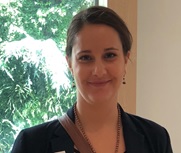 Krystel Bell recently became Regulatory Program Manager for the U.S. Army Corps of Engineers in Washington, D.C. Prior to this, she served as Mitigation Banking Specialist for the Sacramento District of the U.S. Army Corps of Engineers where she chaired the Interagency Review Team for multiple mitigation banks and in-lieu fee programs and worked on several of the District’s most complex regulatory actions. Prior to working for the Sacramento District, Ms. Bell worked as an environmental consultant and acted as a local representative for a County‐ level environmental program. Ms. Bell has extensive knowledge of how Regulatory decisions can affect developers, conservationists, and the general public. Her ability to communicate effectively with applicants, the public, federal, state and local agencies, and peers in the regulatory community has led to productive collaborative approaches in resolution of complex regulatory issues.
Krystel Bell recently became Regulatory Program Manager for the U.S. Army Corps of Engineers in Washington, D.C. Prior to this, she served as Mitigation Banking Specialist for the Sacramento District of the U.S. Army Corps of Engineers where she chaired the Interagency Review Team for multiple mitigation banks and in-lieu fee programs and worked on several of the District’s most complex regulatory actions. Prior to working for the Sacramento District, Ms. Bell worked as an environmental consultant and acted as a local representative for a County‐ level environmental program. Ms. Bell has extensive knowledge of how Regulatory decisions can affect developers, conservationists, and the general public. Her ability to communicate effectively with applicants, the public, federal, state and local agencies, and peers in the regulatory community has led to productive collaborative approaches in resolution of complex regulatory issues.
Webinar 6: An Ecological Framework for Reviewing Compensatory Mitigation: From Conceptual to Final Design
Held Wednesday, May 15, 2019 - 2:00 p.m. ET
INTRODUCTION
- Dawn Smith, National Association of Wetland Managers [POWERPOINT PRESENTATION]
PRESENTERS
- Matt Gause, Ecological Resources & Land Stewardship Director, Westervelt Ecological Services
[POWERPOINT PRESENTATION] -
Larry Urban, Wetland Mitigation Specialist, Montana Department of Transportation
[POWERPOINT PRESENTATION] -
Jeanne Richardson, Mitigation Subject Matter Expert, U.S. Army Corps of Engineers, Norfolk District Regulatory Branch
[POWERPOINT PRESENTATION]
ABSTRACTS
Matt Gause
Wetland Mitigation Concept to Final Design – Where Dreams and Reality Collide
The value of good data on both biotic and abiotic elements was emphasized in earlier webinars in this series. Good biotic and abiotic data also forms the foundation of the mitigation conceptual design; however, all the data necessary to finalize the design is often not yet available when a conceptual mitigation plan is first presented to regulatory agency staff. Using selected case studies this webinar identified general best practices for evaluating conceptual designs, illustrate how designs become more refined as new information comes to light and how to best remain engaged in the design process while working towards a final, implementable design.
Larry Urban
Three Phases of Design in Compensatory Mitigation Projects
Mitigation projects generally follow a three-phased approach to design prior to construction and implementation on the ground. These phases consist of Conceptual, Preliminary, and Final Design efforts. The Conceptual phase focuses on developing a series of Concepts / Options and then determining the feasibility of developing a mitigation project. These initial conceptual phases are important in provides an opportunity for cooperative agency review and input towards the selection of an approved “Preferred” concept. However, that “Preferred” concept may or may not move forward into more detailed design based upon cost/benefit analysis. Preliminary Design phase is where the details of a “Preferred” concept selected evolves thru a design process towards the development of construction plans. It involves agency review that may involve revisions to the details of the “Preferred” design as it moves forward towards construction. The Final Design is essentially that, to finalize the construction plans and specifications of a mitigation project for construction efforts. The Final Design involves agency review of the details of the project but does not involve major changes to the design that would delay construction or prevent implementation of the project. At this stage of a project, input is usually associated with the approval of permits and provide permit conditions for the project during construction and upon completion. This presentation provided some examples of the different phases for different types of projects that may be undertaken.
Jeanne Richardson
Mitigation Work Plans: A Regulators Perspective
Jeanne C. Richardson outlined the U.S. Army Corps of Engineers Norfolk District review and approval process for Mitigation Work Plans submitted by providers of wetland and stream compensatory mitigation projects from conceptual to final design. The presentation focused on the District regulators perspective of what information is necessary, when is that information necessary, and the level of detail required at each submittal milestone for review and approval. Jeanne walked through some specific examples that will serve to demonstrate some lessons learned and how the District’s requirements have changed over the years.
BIOS
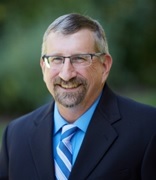 Matt Gause is the Ecological Resources & Land Stewardship Director at Westervelt Ecological Services and oversees Westervelt’s land stewardship and ecological resources on over 8,000 acres of restored wetlands and endangered species habitat on 18,000 acres of preserved properties in California, the Rocky Mountain region and southeastern United States. Mr Gause has over 25 years of experience with wetland restoration including the restoration of vernal pools, riparian forest, tidal marsh, and floodplain wetlands. He has also managed conserved lands for more than 15 threatened or endangered species on preserves throughout California.
Matt Gause is the Ecological Resources & Land Stewardship Director at Westervelt Ecological Services and oversees Westervelt’s land stewardship and ecological resources on over 8,000 acres of restored wetlands and endangered species habitat on 18,000 acres of preserved properties in California, the Rocky Mountain region and southeastern United States. Mr Gause has over 25 years of experience with wetland restoration including the restoration of vernal pools, riparian forest, tidal marsh, and floodplain wetlands. He has also managed conserved lands for more than 15 threatened or endangered species on preserves throughout California.
In addition, Mr. Gause provides site suitability analyses during the land acquisition process, including restoration suitability, threatened and endangered species, easement restriction analysis, and future land management cost estimation. Mr. Gause also develops and implements both baseline and long-term land management and monitoring strategies for mitigation and conservation landscapes.
Mr. Gause is a Certified Ecological Restoration Practitioner (CERP) and received a Bachelor of Science in Botany from the University of California at Davis.
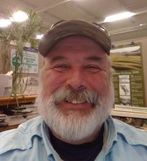 Lawrence J. “Larry” Urban is the wetland mitigation specialist for the Montana Department of Transportation with state-wide responsibilities based out of Helena, Montana. He has over 30 years of experience in wetland delineations, functional assessments, monitoring and mitigation site development for both the New Jersey and Montana Department of Transportations. He has been involved in the development of a comprehensive aquatic resource mitigation program to meet wetland and stream mitigation needs for transportation projects throughout the state of Montana that has created over 55 mitigation areas ranging in size from ½ to 300 acres in size. He developed MDT’s annual mitigation monitoring programs for the purposes of managing MDT aquatic resource mitigation sites on private, state and tribal lands to comply with federal, state and tribal permitting requirements.
Lawrence J. “Larry” Urban is the wetland mitigation specialist for the Montana Department of Transportation with state-wide responsibilities based out of Helena, Montana. He has over 30 years of experience in wetland delineations, functional assessments, monitoring and mitigation site development for both the New Jersey and Montana Department of Transportations. He has been involved in the development of a comprehensive aquatic resource mitigation program to meet wetland and stream mitigation needs for transportation projects throughout the state of Montana that has created over 55 mitigation areas ranging in size from ½ to 300 acres in size. He developed MDT’s annual mitigation monitoring programs for the purposes of managing MDT aquatic resource mitigation sites on private, state and tribal lands to comply with federal, state and tribal permitting requirements.
He has presented at National and Regional wetland mitigation conferences, and participates in annual continuing education, undergraduate and graduate courses as an instructor in wetland regulations, endangered plant species, functional assessments, mitigation monitoring, and aquatic resource restoration here in the state of Montana.
He was the recipient of the 2017 Montana Wetland Stewardship Award for his untiring efforts to protect, preserve and restore Montana’s wetland ecosystems. In his spare time, he is a fly-fishing guru working part-time at CrossCurrents Fly shop in Helena, Montana for his addiction to fly-fishing and fly-tying. He is also an avid birder that loves his day job at MDT as it affords him opportunities to see all kinds of birds and travel across the vast expanses of Montana.
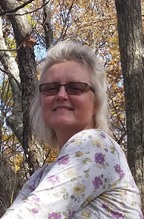
Jeanne C. Richardson is the Mitigation Subject Matter Expert for the U.S. Army Corps of Engineers, Norfolk District Regulatory Branch. She has worked for the Corps of Engineers for over 15 years. Jeanne oversees the District’s compensatory mitigation program where she develops and implements District level policy, standard operating procedures, templates, and technical guidance related to compensatory mitigation. Jeanne organizes training and provides assistance for District staff, 3rd party mitigation providers, and others specific to those policies, procedures, templates, and guidance. Jeanne manages the Virginia Aquatic Resources Trust Fund (VARTF) for the District. VARTF currently has currently has approximately 109 approved and pending projects. Jeanne provides the primary oversight of the District’s Interagency Review Team.
Webinar 5: An Ecological Framework for Reviewing Compensatory Mitigation: Coherent Plans – Goals, Objectives, Performance Standards, Outcomes and Monitoring
Held Thursday, April 18, 2019 - 2:00 p.m. ET

INTRODUCTION
Held Thursday, April 18, 2019 - 2:00 p.m. ET
INTRODUCTION
- Marla Stelk, Executive Director, National Association of Wetland Managers [POWERPOINT PRESENTATION]
PRESENTERS
- Eric Stein, Principal Scientist, Southern California Coastal Water Research Project [POWERPOINT PRESENTATION]
- Mick Micacchion, Professional Wetland Scientist and Restoration Ecologist, The Nature Conservancy [POWERPOINT PRESENTATION]
- Anthony Zemba, Environmental Specialist, Certified Ecologist/Soil Scientist, Fitzgerald & Halliday, Inc. [POWERPOINT PRESENTATION]
ABSTRACTS
Eric Stein
Performance standards are the roadmap to successful wetland restoration and mitigation. The likelihood of success increases dramatically when well-designed, ecologically relevant performance standards are used. This talk outlined key considerations for constructing effective performance standards that account for a broad set of physical, hydrological, and biological functions. We also covered practical considerations such alternative ways to approach “reference”, timing of when different standards should be met, and ways to develop standards that are resilient to changing conditions over time. Finally, we considered critical data management approaches that can improve accessibility of monitoring data necessary to evaluate standards over time.
Mick Micacchion
A condition-based approach to assessing functional replacement for wetland mitigation was developed using a reference wetland data set of natural wetlands that includes data from the major Ohio wetland types that span a gradient of human disturbance. From this data set wetland program tools were developed: 1) multimetric biological indices (IBIs) and hydrological and biogeochemical indicators; 2) a rapid (condition based) wetland assessment tool (ORAM); and 3) a wetland classification scheme based on landscape position and dominant vegetation. Ensuring functional replacement occurs in a several step process:
- First, as part of permit application, the HGM class and dominant plant community of the impacted wetland(s) are determined. This determination accounts for the ecosystem processes (functions) and ecological services (values) of different wetland types without the necessity of developing a comprehensive list of those functions and values;
- Second, the condition of the impacted wetland is assessed with the rapid condition tool (ORAM v. 5.0) or a wetland IBI providing a measure of "functional capacity";
- Third, the size of the wetland to be impacted is determined and appropriate mitigation ratios are applied;
- Fourth, any residual moderate to high functions or values the impacted wetland(s) may still be providing, despite moderate to severe degradation, are evaluated using checklist with a narrative discussion; and,
- Finally, requirements for mitigation are specified in the permit.
Fundamentally, the above approach is strongly data-driven, and it follows then that meaningful and adequate mitigation monitoring is absolutely necessary to determine whether the mitigation wetland has "succeeded" or "failed."
Anthony Zemba
Tiering may be an often overlooked but very useful approach to mitigation design and implementation. There are lots of information to be gained from the biology of early successional and volunteer species. Too often in the past, too much focus has been on getting plants in the ground and the subsequent survivorship metric of the planted specimens. Poor survivorship may be a result of poor microhabitat selection, poor choice of plants for site-specific conditions, or a result of overlooking other ecological factors and processes. Anthony provided an overview of some case studies of how some restoration sites here in the east have failed and why, and how tiering, more attention to site-specific attributes, and the consideration of other ecological factors in the mitigation planning process may help to improve success of a mitigation site.
BIO
 Eric D. Stein, D.Env. is a Principal Scientist at the Southern California Coastal Water Research Project (SCCWRP), where he is head of the Biology Department. Dr. Stein oversees a variety of projects related to in-stream and coastal water quality, bioassessment, hydromodification, watershed modeling, and assessment of wetlands and other aquatic resources. His research focuses on effects of human activities on the condition of aquatic ecosystems, and on developing tools to better assess and manage those effects. Dr. Stein has authored over 100 journal articles and technical reports and participates on numerous technical workgroups and committees related to water quality and wetland assessment and management. Prior to joining SCCWRP in 2002, Dr. Stein spent six years as a Senior Project Manager with the Regulatory Branch of the Los Angeles District Corps of Engineers, and four years with a private consulting firm.
Eric D. Stein, D.Env. is a Principal Scientist at the Southern California Coastal Water Research Project (SCCWRP), where he is head of the Biology Department. Dr. Stein oversees a variety of projects related to in-stream and coastal water quality, bioassessment, hydromodification, watershed modeling, and assessment of wetlands and other aquatic resources. His research focuses on effects of human activities on the condition of aquatic ecosystems, and on developing tools to better assess and manage those effects. Dr. Stein has authored over 100 journal articles and technical reports and participates on numerous technical workgroups and committees related to water quality and wetland assessment and management. Prior to joining SCCWRP in 2002, Dr. Stein spent six years as a Senior Project Manager with the Regulatory Branch of the Los Angeles District Corps of Engineers, and four years with a private consulting firm.
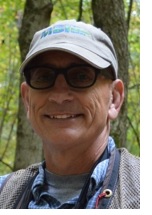 Mick Micacchion is a Professional Wetland Scientist and works as a restoration ecologist with The Nature Conservancy for the Ohio In-Lieu-Fee Compensatory Mitigation Program. He has a BS and MS in Wildlife Management, both from Ohio State University. Mick retired in 2011 from the Ohio Environmental Protection Agency (Ohio EPA) with 32 years of state service including 10 years with the Ohio Department of Natural Resources. While working for 20 years at Ohio EPA he was instrumental in the development of Ohio’s Wetland Water Quality Standards rules, wetland assessment tools, including the Ohio Rapid Assessment Method for Wetlands (ORAM), Vegetation Index of Biotic Integrity (VIBI), Amphibian Index of Biotic Integrity (AmphIBI), “Standardized Monitoring Protocols and Performance Standards for Ohio Mitigation Wetlands” and their integration into Ohio’s wetland program, which has worked as a model for the country.
Mick Micacchion is a Professional Wetland Scientist and works as a restoration ecologist with The Nature Conservancy for the Ohio In-Lieu-Fee Compensatory Mitigation Program. He has a BS and MS in Wildlife Management, both from Ohio State University. Mick retired in 2011 from the Ohio Environmental Protection Agency (Ohio EPA) with 32 years of state service including 10 years with the Ohio Department of Natural Resources. While working for 20 years at Ohio EPA he was instrumental in the development of Ohio’s Wetland Water Quality Standards rules, wetland assessment tools, including the Ohio Rapid Assessment Method for Wetlands (ORAM), Vegetation Index of Biotic Integrity (VIBI), Amphibian Index of Biotic Integrity (AmphIBI), “Standardized Monitoring Protocols and Performance Standards for Ohio Mitigation Wetlands” and their integration into Ohio’s wetland program, which has worked as a model for the country.
Mick also works for the non-profit Midwest Biodiversity Institute (MBI) where he has served as a wetland ecologist for the past seven years. Currently he instructs courses in Wetland Botany, Wetland Delineation, Ohio Amphibians, Ohio Wetland Assessment Methods, including ORAM, VIBI/VIBI-FQ, and AmphIBI, as well as several other courses at MBI. He has monitored the physical, chemical and biological features, including the soils, hydrology, chemistry, plant, amphibian and macroinvertebrate communities of hundreds of Ohio’s natural wetlands and trained hundreds of wetland professionals in the development and use of wetland monitoring and assessment methods, including ORAM, VIBI and AmphIBI. He has also monitored, assessed, and reported on the condition of hundreds of Ohio compensatory wetland mitigation projects and spent more than a decade on Ohio’s Interagency Review Team, where he was a major contributor to the “Guidelines on Wetland Mitigation Banking in Ohio.” Mick was a member of the Technical Advisory Group, which developed the methods used in the National Wetland Condition Assessment (NWCA), and lead crews and managed others for both the 2011 and 2016 NWCAs sampling wetlands in Ohio, Michigan, Wisconsin, Minnesota, Kentucky, Tennessee, and 10 other states.
He is the Vice President of the Ohio Wetlands Association and was a founder and has been active with the Ohio Vernal Pool Network since 2004.

Anthony Zemba is a certified ecologist, certified soil scientist, and certified hazardous materials manager. He has over 30 years of experience in natural resource management that includes aquatic toxicology, analytical chemistry, wetland assessment and delineation, ecological risk assessment, habitat assessments, conservation biology and ecological restoration. Mr. Zemba also serves as an adjunct professor at the University of New Haven Graduate Program in Environmental Science where he teaches a course in Environmental Impact Reports and Assessment. His love of nature blurs the line between work and play and on any given day, he may be found half-submerged in a swamp, scampering over boulder talus, or striding through forest and field alike with binoculars, insect net, hand lens, camera, or all of the above in tow searching for the next subject of study.
Webinar 4: An Ecological Framework for Reviewing Compensatory Mitigation Plans: Plan Review
- Marla Stelk, Executive Director, National Association of Wetland Managers [POWERPOINT PRESENTATION]
- Steve Martin, Environmental Scientist, Institute for Water Resources, U.S. Army Corps of Engineers [POWERPOINT PRESENTATION]
- Michelle Mattson, Environmental Scientist, Institute for Water Resources, U.S. Army Corps of Engineers [POWERPOINT PRESENTATION]
- Michael S. Rolband, P.E., P.W.S., P.W.D., Wetland Studies and Solutions, Inc. [POWERPOINT PRESENTATION]
- Karen Greene, National Oceanic and Atmospheric Administration, National Marine Fisheries Service (NOAA Fisheries) [POWERPOINT PRESENTATION]
ABSTRACT
Over the past three decades compensatory mitigation has become an important strategy for addressing the adverse environmental impacts that result from dredge and fill activities. Compensatory mitigation projects should be designed to replace lost ecological services at an alternative location by either the permitee or a third party in a mitigation bank or in-lieu fee program. Federal and State regulatory and resource agency staff routinely review these proposals to ensure that projects will achieve the desired outcomes. But what exactly should compensatory mitigation project reviewers consider in evaluating a proposal? The purpose of this webinar was to help plan reviewers evaluate whether a project as proposed is likely to achieve its objectives by examining some of the most important aspects of a project. Examples (including both successful and less than successful projects) from riverine, palustrine freshwater and coastal projects was provided to highlight the importance of site selection, water budgets, soils, monitoring, adaptation, and resiliency in evaluating a restoration plan.
BIOS
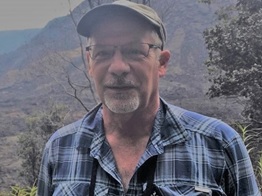 Steve Martin is an Environmental Scientist with the U.S. Army Corfps of Engineers’ Institute for Water Resources (IWR). His focus is on compensatory mitigation, including third party compensatory mitigation (mitigation banks and in-lieu fee programs). He provides technical and policy support to HQ USACE and Corps districts on compensatory mitigation. Much of his work has focused on education of Corps, federal, and state agencies in administrative and ecological aspects of compensatory mitigation. He also is the Corps’ national technical lead for RIBITS (Regulatory In-lieu fee and Bank Information Tracking System). Before coming to IWR he was a senior environmental scientist in the Norfolk District Regulatory Branch. He oversaw development and operations of a number of commercial mitigation banks.
Steve Martin is an Environmental Scientist with the U.S. Army Corfps of Engineers’ Institute for Water Resources (IWR). His focus is on compensatory mitigation, including third party compensatory mitigation (mitigation banks and in-lieu fee programs). He provides technical and policy support to HQ USACE and Corps districts on compensatory mitigation. Much of his work has focused on education of Corps, federal, and state agencies in administrative and ecological aspects of compensatory mitigation. He also is the Corps’ national technical lead for RIBITS (Regulatory In-lieu fee and Bank Information Tracking System). Before coming to IWR he was a senior environmental scientist in the Norfolk District Regulatory Branch. He oversaw development and operations of a number of commercial mitigation banks.
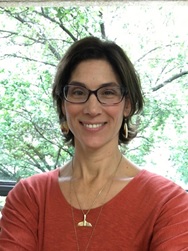
Michelle Mattson is a Stream and Wetland Ecologist with the U.S. Army Corfps of Engineers’ Institute for Water Resources (IWR) with over 20 years of professional experience as a consultant and regulator. Michelle is a compensatory mitigation subject matter expert (SME) and the IWR Regulatory Team budget manager. She supports national and regional training courses in compensatory mitigation and has spent her career in the field working with restoration teams to design, install and monitor restoration projects and programs. At the USACE, Michelle worked across agencies to develop the Advanced Permittee-Responsible Mitigation (APRM) Program for San Diego Association of Governments (SANDAG) and managed multiple banks and ILFs. As a consultant, she worked on two Special Area Managements Plans (SAMPs), the Otay River Watershed Management Plan, and several Mitigation Banks and ILF sites and multiple large-scale stream restoration projects in alignment with existing and planned USFWS habitat conservation plans (HCPs) and new SDRWQCB water quality requirements. She was a member of the California Wetland Monitoring Workgroup Level 2 (rapid assessment) Committee and was the first to use CRAM in evaluating impacts, alternatives analysis, and monitoring compensatory mitigation to improve decision making in LA District for several large alternative energy projects. Michelle remains a huge supporter of using functional and conditional assessments in regulatory and restoration practices including in informing the location and design of sites to short- and long-term monitoring performance and condition of sites.
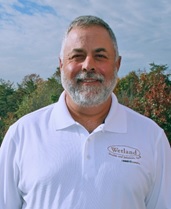 Michael (Mike) S. Rolband is the founder of Wetland Studies and Solutions, Inc. (WSSI), a 175+ person natural and cultural resources consulting firm headquartered in Gainesville, Virginia, and a subsidiary of The Davey Tree Expert Company. Mike founded WSSI in 1991 and pioneered its growth and expansion from the one-person wetlands consulting firm, to the multi-discipline natural and cultural resource consulting firm that today operates from four offices focused on permitting and regulatory requirements for the Clean Water Act, Chesapeake Bay Preservation Act, and Stormwater.
Michael (Mike) S. Rolband is the founder of Wetland Studies and Solutions, Inc. (WSSI), a 175+ person natural and cultural resources consulting firm headquartered in Gainesville, Virginia, and a subsidiary of The Davey Tree Expert Company. Mike founded WSSI in 1991 and pioneered its growth and expansion from the one-person wetlands consulting firm, to the multi-discipline natural and cultural resource consulting firm that today operates from four offices focused on permitting and regulatory requirements for the Clean Water Act, Chesapeake Bay Preservation Act, and Stormwater.
Mike is responsible for development of the first wetlands bank in Virginia in 1994 and the first mitigation bank to provide stream credits in Virginia in 2001. He also formed a non-profit to manage the Wetland Research Initiative, a research program that has funded $3.6 million in grants to several universities since 2007 – dedicated to advancing the state of the science of Mitigation. Between mitigation banks and permittee-responsible mitigation, WSSI has designed over 1,000 acres of wetland mitigation and over 280,000 linear feet of stream restoration projects.
Mike has served on the Chesapeake Bay Local Assistance Board and many state and local committees dealing with the Chesapeake Bay Preservation Act, stormwater regulations, and wetlands/stream regulations. In 2017 he accepted an appointment as a part-time Professor of Practice in the School of Civil and Environmental Engineering at Cornell University, and now invests his time and expertise teaching graduate students about the design and challenges of wetlands and stream restoration projects. Mike is an alumnus of Cornell, where he obtained his BS in Civil and Environmental Engineering, Master of Engineering (Civil), and MBA.
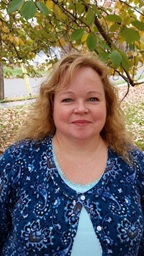 Karen Greene is the Mid-Atlantic Field Offices Supervisor for National Oceanic and Atmospheric Administration, Fisheries Greater Atlantic Regional Fisheries Office’s (GARFO) Habitat Conservation Division and is also the GARFO Essential Fish Habitat Coordinator. She has been with NOAA Fisheries for more than 25 years, working primarily in the Mid-Atlantic region, especially in New York, New Jersey, Delaware and Pennsylvania. Her primary focus has been to provide advice and guidance to federal agencies on avoiding, minimizing and offsetting adverse impacts to coastal fish habitats through a number of consultation authorities such as the Magnuson Stevens Fishery Conservation and Management Act and the Fish and Wildlife Coordination Act. Karen has been involved in the evaluation of compensatory mitigation plans for more than two decades and participated on many interagency review teams (IRTs) for wetland mitigation banks, including the Meadowlands Interagency Mitigation Advisory Committee originally convened in 1998, as well as the IRTs for the first federally approved mitigation banks in NJ and NY. Karen is co-located at the NOAA Fisheries Northeast Fisheries Science Center at their James J. Howard Marine Science Laboratory at Sandy Hook, NJ. She has a BS and MS in Environmental Science, both from Rutgers University.
Karen Greene is the Mid-Atlantic Field Offices Supervisor for National Oceanic and Atmospheric Administration, Fisheries Greater Atlantic Regional Fisheries Office’s (GARFO) Habitat Conservation Division and is also the GARFO Essential Fish Habitat Coordinator. She has been with NOAA Fisheries for more than 25 years, working primarily in the Mid-Atlantic region, especially in New York, New Jersey, Delaware and Pennsylvania. Her primary focus has been to provide advice and guidance to federal agencies on avoiding, minimizing and offsetting adverse impacts to coastal fish habitats through a number of consultation authorities such as the Magnuson Stevens Fishery Conservation and Management Act and the Fish and Wildlife Coordination Act. Karen has been involved in the evaluation of compensatory mitigation plans for more than two decades and participated on many interagency review teams (IRTs) for wetland mitigation banks, including the Meadowlands Interagency Mitigation Advisory Committee originally convened in 1998, as well as the IRTs for the first federally approved mitigation banks in NJ and NY. Karen is co-located at the NOAA Fisheries Northeast Fisheries Science Center at their James J. Howard Marine Science Laboratory at Sandy Hook, NJ. She has a BS and MS in Environmental Science, both from Rutgers University.
![]()
View Past Compensatory Mitigation Training Webinars Here
View a List of Past Compensatory Mitigation Training Webinar Recordings Here
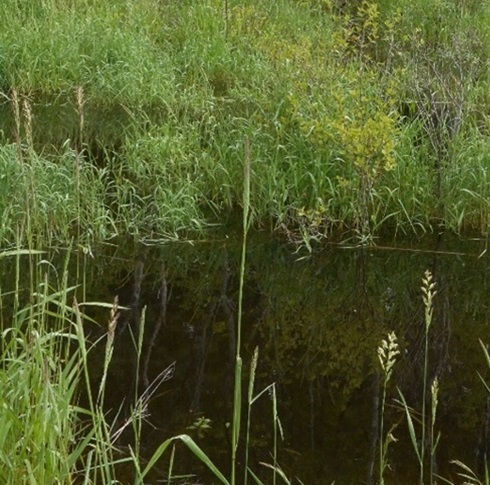 NAWM and the U.S. Environmental Protection Agency (EPA)have worked with Tribes to develop a series of webinars focused on developing effective Tribal wetland programs that accommodate and account for the unique ways in which Tribes manage their wetland and cultural resources. Beginning in 2018, NAWM and EPA worked with an advisory group from EPA Region 10 and the Pacific Northwest Tribal Wetlands Working Group (TWIG) to develop webinars; later webinars in this series capture lessons learned from Tribes in regions all across the U.S.
NAWM and the U.S. Environmental Protection Agency (EPA)have worked with Tribes to develop a series of webinars focused on developing effective Tribal wetland programs that accommodate and account for the unique ways in which Tribes manage their wetland and cultural resources. Beginning in 2018, NAWM and EPA worked with an advisory group from EPA Region 10 and the Pacific Northwest Tribal Wetlands Working Group (TWIG) to develop webinars; later webinars in this series capture lessons learned from Tribes in regions all across the U.S.
NAWM and Saint Mary’s University of Minnesota GeoSpatial Services (SMUM) conducted a project focused on increasing the capacity of Tribal Communities to protect, restore, and mitigate impacts to tribal wetlands by providing training on innovative tools, wetland science, grant writing, outreach, and communication. Along with an advisory workgroup composed primarily of Tribal wetland managers, NAWM and SMUM held a series of eight webinars in 2022 and 2023 that covered the basics of starting and building a tribal wetland program. The series has been added to our Online Trainings library.
Additional resources that may be of interest are available on the Tribal Wetland Programs webpage.
For more information and/or to join our email list for notices about upcoming events, please contact Laura Burchill at laura@nawm.org or (207) 892-3399.
If you haven’t used Teams before or you just need a refresher, please view our guide prior to the webinar here.
View Past Tribal Wetland Programs Webinar Series Here
View a List of Tribal Wetland Programs Webinar Recordings Here
![]()
Please check back for future Tribal Wetland Programs Webinars. Thank you.
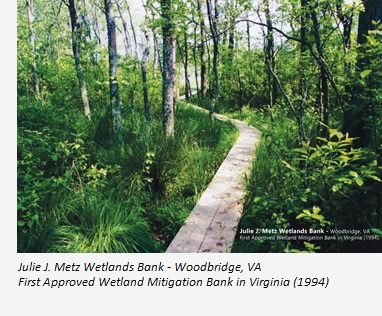
Webinar 3: An Ecological Framework for Reviewing Compensatory Mitigation: Biotic Processes
Held Wednesday, August 29, 2018 at 2:00-5:00 pm
INTRODUCTION
- Jeanne Christie, National Association of Wetland Managers [POWERPOINT PRESENTATION]
PRESENTERS
- Matt Gause, Westervelt Ecological Services [POWERPOINT PRESENTATION]
- Mick Micacchion, The Nature Conservancy and Midwest Biodiversity Institute [POWERPOINT PRESENTATION]
- Gretchen Coffman, University of San Francisco [POWERPOINT PRESENTATION]
DOCUMENTS OF INTEREST
- Does river restoration work? Taxonomic and functional trajectories at two restoration schemes (Judy England and Martin Anthony Wilkes, 2018)
- Assessment of Wetland Mitigation Projects in Ohio: Volume 2: Developing a GIS-Based Tool to Optimize Vernal Pool Wetland Mitigation Site selection (B.D. Gara and M. Micacchion, 2010)
- Master's Project: Linking Compensatory Mitigation and Restoration of Riparian Wetland Functions and Values (Emily Mecke, 2018)
- Presentation: Linking Compensatory Mitigation and Restoration of Riparian Wetland Functions and Values (Emily Mecke, 2018)
ABSTRACT
Over the past three decades compensatory mitigation has become an important strategy for addressing the unavoidable environmental impacts that result from dredge and fill activities. Compensatory mitigation projects should be designed to provide self-sustaining, long-term replacement of lost ecological functions and services. Federal and State regulatory staff routinely review these proposals to ensure that projects will achieve the desired outcomes. But what exactly should compensatory mitigation project reviewers consider in evaluating a proposal? The purpose of this third of four webinars was to assist compensatory mitigation project reviewers by providing information about how to evaluate biotic processes—plants, animals, etc. and explore 1) how they are linked to hydrology, soils and other biotic characteristics, 2) how biotic elements provide indicators of wetland health and function and 3) how to measure progress using performance standards and monitoring plans. During the webinar the use of and selection of reference wetlands to determine appropriate biological communities to restore (e.g., planting palettes) was also explored. By linking all these elements together presenters provided insights into how to manage abiotic and biotic elements to restore high quality, high functioning wetlands. These topics were explored using examples of freshwater wetlands including vernal pools, floodplains, riverine and coastal projects. The webinar presentations ran around 120 minutes and wad followed by a questions and answer session.
BIOS
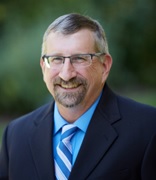 Matt Gause is the Ecological Resources & Land Stewardship Director at Westervelt Ecological Services and oversees Westervelt’s land stewardship and ecological resources on over 8,000 acres of restored wetlands and endangered species habitat on 18,000 acres of preserved properties in California, the Rocky Mountain region and southeastern United States. Mr Gause has over 25 years of experience with wetland restoration including the restoration of vernal pools, riparian forest, tidal marsh, and floodplain wetlands. He has also managed conserved lands for more than 15 threatenend or endangered species on preserves throughout California.
Matt Gause is the Ecological Resources & Land Stewardship Director at Westervelt Ecological Services and oversees Westervelt’s land stewardship and ecological resources on over 8,000 acres of restored wetlands and endangered species habitat on 18,000 acres of preserved properties in California, the Rocky Mountain region and southeastern United States. Mr Gause has over 25 years of experience with wetland restoration including the restoration of vernal pools, riparian forest, tidal marsh, and floodplain wetlands. He has also managed conserved lands for more than 15 threatenend or endangered species on preserves throughout California.
In addition, Mr. Gause provides site suitability analyses during the land acquisition process, including restoration suitability, threatened and endangered species, easement restriction analysis, and future land management cost estimation. Mr. Gause also develops and implements both baseline and long-term land management and monitoring strategies for mitigation and conservation landscapes.
Mr. Gause is a Certified Ecological Restoration Practitioner (CERP) and received a Bachelor of Science in Botany from the University of California at Davis
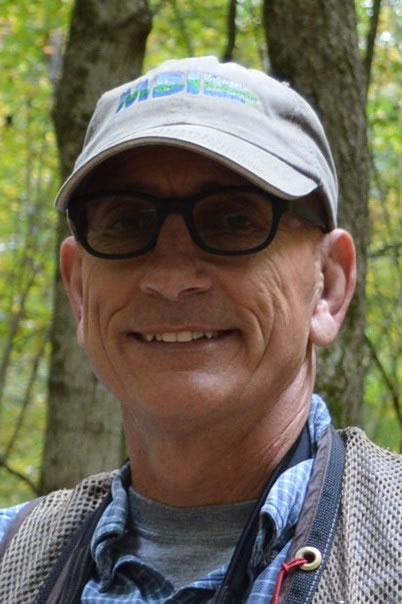 Mick Micacchion is a Professional Wetland Scientist and works as a restoration ecologist with The Nature Conservancy for the Ohio In-Lieu-Fee Compensatory Mitigation Program. He has a BS and MS in Wildlife Management, both from Ohio State University. Mick retired in 2011 from the Ohio Environmental Protection Agency (Ohio EPA) with 32 years of state service including 10 years with the Ohio Department of Natural Resources. While working for 20 years at Ohio EPA he was instrumental in the development of Ohio’s Wetland Water Quality Standards rules, wetland assessment tools, including the Ohio Rapid Assessment Method for Wetlands (ORAM), Vegetation Index of Biotic Integrity (VIBI), Amphibian Index of Biotic Integrity (AmphIBI), “Standardized Monitoring Protocols and Performance Standards for Ohio Mitigation Wetlands” and their integration into Ohio’s wetland program, which has worked as a model for the country.
Mick Micacchion is a Professional Wetland Scientist and works as a restoration ecologist with The Nature Conservancy for the Ohio In-Lieu-Fee Compensatory Mitigation Program. He has a BS and MS in Wildlife Management, both from Ohio State University. Mick retired in 2011 from the Ohio Environmental Protection Agency (Ohio EPA) with 32 years of state service including 10 years with the Ohio Department of Natural Resources. While working for 20 years at Ohio EPA he was instrumental in the development of Ohio’s Wetland Water Quality Standards rules, wetland assessment tools, including the Ohio Rapid Assessment Method for Wetlands (ORAM), Vegetation Index of Biotic Integrity (VIBI), Amphibian Index of Biotic Integrity (AmphIBI), “Standardized Monitoring Protocols and Performance Standards for Ohio Mitigation Wetlands” and their integration into Ohio’s wetland program, which has worked as a model for the country.
Mick also works for the non-profit Midwest Biodiversity Institute (MBI) where he has served as a wetland ecologist for the past seven years. Currently he instructs courses in Wetland Botany, Wetland Delineation, Ohio Amphibians, Ohio Wetland Assessment Methods, including ORAM, VIBI/VIBI-FQ, and AmphIBI, as well as several other courses at MBI. He has monitored the physical, chemical and biological features, including the soils, hydrology, chemistry, plant, amphibian and macroinvertebrate communities of hundreds of Ohio’s natural wetlands and trained hundreds of wetland professionals in the development and use of wetland monitoring and assessment methods, including ORAM, VIBI and AmphIBI. He has also monitored, assessed, and reported on the condition of hundreds of Ohio compensatory wetland mitigation projects and spent more than a decade on Ohio’s Interagency Review Team, where he was a major contributor to the “Guidelines on Wetland Mitigation Banking in Ohio.” Mick was a member of the Technical Advisory Group, which developed the methods used in the National Wetland Condition Assessment (NWCA), and lead crews and managed others for both the 2011 and 2016 NWCAs sampling wetlands in Ohio, Michigan, Wisconsin, Minnesota, Kentucky, Tennessee, and 10 other states.
He is the Vice President of the Ohio Wetlands Association and was a founder and has been active with the Ohio Vernal Pool Network since 2004.
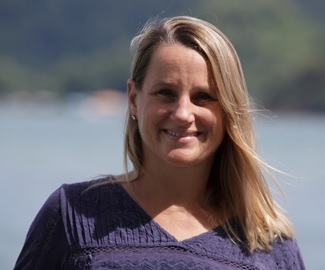
Gretchen Coffman is an Associate Professor at the University of San Francisco. Dr. Coffman is a restoration ecologist and Associate Professor at the University of San Francisco (USF) who has worked on wetland and riparian restoration projects throughout the U.S. and internationally for more than 28 years. Since 1991, she has conducted jurisdictional wetland delineations throughout California, the east coast, the southeast, Midwest, and Puerto Rico. In addition, she has applied ecological experience in vegetation and invasive plant species mapping, watershed assessment studies, historical ecology studies, rare plant surveys, and compensatory wetland mitigation projects.
Dr. Coffman's current research focuses on scientific questions with high relevance to management problems, mainly related to riparian plant ecology, restoration, and invasive plant biology in wetlands and river systems of mediterranean-type and tropical climates. Her research focuses on experimental wetland revegetation and restoration strategies, invasive plant ecology, and restoration monitoring to improve performance standards. She has on-going research projects along rivers and watersheds in coastal southern California, the San Francisco Bay Area, the Central Valley of California, and Southeast Asia. In 2015, she led a National Geographic Expedition in the Annamite Mountains of Laos to document and begin restoration of the Critically Endangered Asian swamp cypress trees she discovered. Since then, her team has successfully propagated almost 2,000 seedlings and started restoration efforts in 2018. In 2016, she was the recipient of the Arthur Furst Faculty Research Award that honors USF Faculty or Alumnus whose work exemplifies research for the betterment of humanity.
Since 2010, she has taught field ecology courses in the Environmental Science Department, Masters of Science in Environmental Management graduate program, and Environmental Studies program at the USF. Courses include Basic and Advanced Wetland Delineation, Field Botany, California Ecosystems, Tropical Restoration Ecology in Borneo, Ecology and Human Impacts, and Introduction to Environmental Science. She developed a Wetland Delineation Certificate Program at USF in 2013 in which more than 70 students have completed. From 1996 – 2011, Dr. Coffman taught wetland ecology, delineation, and restoration courses in the Wetland Science Series at SFSU's Romberg Tiburon Center for Environmental Studies in Tiburon, California.
She holds a Ph.D. from UCLA, 2007, Environmental Science; a M.A. from SFSU, 1998, Ecology and Systematic Biology; and a B.A. from Colgate University, 1991, Biology.
Held Monday, July 16, 2018 at 2:00 p.m. Eastern, 1:00 central, 12:00 mountain, 11:00 pacific
INTRODUCTION
- Jeanne Christie, National Association of Wetland Managers [POWERPONT PRESENTATION]
PRESENTERS
- Lenore Vasilas, USDA Natural Resources Conservation Service [POWERPOINT PRESESNTATION]
- Walter I. Priest, III, Wetland Design [POWERPOINT PRESENTATION]
- Steve Eggers, U.S. Army Corps of Engineers, St. Paul District [POWERPOINT PRESENTATION]
ABSTRACT
Over the past three decades compensatory mitigation has become an important strategy for addressing the adverse environmental impacts that result from dredge and fill activities. Compensatory mitigation project should be designed to replace lost ecological services at an alternative location. Federal and State regulatory staff routinely review these proposals to ensure that projects will achieve the desired outcomes. But what exactly should compensatory mitigation project reviewers consider in evaluating a proposal? The purpose of this second of four webinars was to assist compensatory mitigation project reviewers by providing information about how to evaluate abiotic processes--soils and hydrology--critical to designing wetland restoration projects that will achieve project objectives and meet performance standards. Presenters focused on both abiotic and biotic characteristics of soils and their functions, review specific considerations with respect to hydrology and soils in tidal restoration projects, and describe a process for developing hydrology-based performance standards in freshwater systems. The webinar presentations ran around 100 minutes and was followed by a questions and answer session.
BIOS
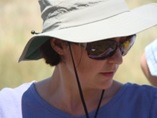 Lenore Vasilas is a USDA Natural Resources Conservation Service (NRCS) Soil Scientist on the Soil Science Division Technical Soil Services Staff. She has been a soil scientist for NRCS for 28 years working for the first 7 years on soil survey and the rest of her career in various positions concentrating on hydric soils issues. She has been a member of the National Technical Committee for Hydric Soils for 20 years and is the current chair of the committee.
Lenore Vasilas is a USDA Natural Resources Conservation Service (NRCS) Soil Scientist on the Soil Science Division Technical Soil Services Staff. She has been a soil scientist for NRCS for 28 years working for the first 7 years on soil survey and the rest of her career in various positions concentrating on hydric soils issues. She has been a member of the National Technical Committee for Hydric Soils for 20 years and is the current chair of the committee.
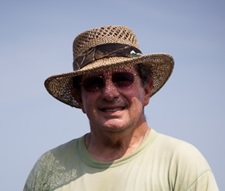 Walter I. Priest, III after over 40 years in the public sector working for the Virginia Division of Shellfish Sanitation, U.S. Army Corps of Engineers, the Virginia Institute of Marine Science and the NOAA Restoration Center, Walter, currently works with his consulting firm, Wetland Design and Restoration. He is a Professional Wetland Scientist. His work experience at VIMS included: permit review and environment impact assessment, tidal wetlands inventories, beneficial use of dredged material and wetland restoration. While with the NOAA Restoration Center, he provided project management for a wide range of fisheries habitat restoration projects including: large and small scale tidal wetland restorations, oyster reefs, Living Shorelines, seagrass restoration and dam removal projects. He also designed and helped implement a number of tidal wetland restorations at remediated Super Fund sites. He has also developed Prospectus’ and design for two tidal wetland mitigation banks as well as conducted long-term monitoring of two other tidal wetland mitigation banks. During his career he has been involved with over 70 habitat restoration projects involving over 100 acres providing: design, detailed critical review, project management, construction oversight, volunteer plantings and/or long-term monitoring. He recently authored a chapter in the book, Living Shorelines: The Science and Management of Nature-based Shoreline Protection, entitled, Practical Living Shorelines: Tailored to Fit in Chesapeake Bay.
Walter I. Priest, III after over 40 years in the public sector working for the Virginia Division of Shellfish Sanitation, U.S. Army Corps of Engineers, the Virginia Institute of Marine Science and the NOAA Restoration Center, Walter, currently works with his consulting firm, Wetland Design and Restoration. He is a Professional Wetland Scientist. His work experience at VIMS included: permit review and environment impact assessment, tidal wetlands inventories, beneficial use of dredged material and wetland restoration. While with the NOAA Restoration Center, he provided project management for a wide range of fisheries habitat restoration projects including: large and small scale tidal wetland restorations, oyster reefs, Living Shorelines, seagrass restoration and dam removal projects. He also designed and helped implement a number of tidal wetland restorations at remediated Super Fund sites. He has also developed Prospectus’ and design for two tidal wetland mitigation banks as well as conducted long-term monitoring of two other tidal wetland mitigation banks. During his career he has been involved with over 70 habitat restoration projects involving over 100 acres providing: design, detailed critical review, project management, construction oversight, volunteer plantings and/or long-term monitoring. He recently authored a chapter in the book, Living Shorelines: The Science and Management of Nature-based Shoreline Protection, entitled, Practical Living Shorelines: Tailored to Fit in Chesapeake Bay.
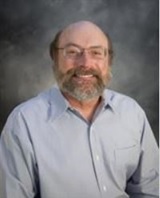 Steve Eggers is a Senior Ecologist for the U.S. Army Corps of Engineers, St. Paul District Regulatory Branch. He has worked with the Corps of Engineers for more than 40 years. Steve is widely recognized as a regional and national expert in wetlands, serving as a member of a national team responsible for updating the Corps wetland delineation manual, as well as participating in the update of the national wetland plant list and co-authoring the book Wetland Plants and Plant Communities of Minnesota and Wisconsin. Steve provides training and technical assistance with wetland delineations and restoration projects. He has helped further understanding of wetland science and connecting it with public policy.
Steve Eggers is a Senior Ecologist for the U.S. Army Corps of Engineers, St. Paul District Regulatory Branch. He has worked with the Corps of Engineers for more than 40 years. Steve is widely recognized as a regional and national expert in wetlands, serving as a member of a national team responsible for updating the Corps wetland delineation manual, as well as participating in the update of the national wetland plant list and co-authoring the book Wetland Plants and Plant Communities of Minnesota and Wisconsin. Steve provides training and technical assistance with wetland delineations and restoration projects. He has helped further understanding of wetland science and connecting it with public policy.
Held Tuesday, June 19, 2018 at 2:00 p.m. Eastern, 1:00 central, 12:00 mountain, 11:00 pacific
INTRODUCTION
- Jeanne Christie, National Association of Wetland Managers [POWEROINT PRESENTATION]
PRESENTERS
- Eric Stein, Principal Scientist, Southern California Coastal Water Research Project [POWERPOINT PRESENTATION]
- Jeremy Sueltenfuss, Department of Forest and Rangeland Stewardship, Colorado State University [POWERPOINT PRESENTATION]
- W. Lee Daniels, Thomas B. Hutcheson Professor of Environmental Soil Science at Virginia Tech [POWERPOINT PRESENTATION]
- Matt Schweisberg, Principal of Wetland Strategies and Solutions, LLC [POWERPOINT PRESENTATION]
ABSTRACT
Over the past three decades compensatory mitigation has become an important strategy for addressing the unavoidable environmental impacts that result from dredge and fill activities. Compensatory mitigation projects should be designed to provide self-sustaining, long-term replacement of lost ecological functions and services. Federal and State regulatory staff routinely review these proposals to ensure that projects will achieve the desired outcomes. But what exactly should compensatory mitigation project reviewers consider in evaluating a proposal? The purpose of this webinar was to provide an overall framework for review of proposed compensatory mitigation projects. Presenters focused on the processes that shape wetlands across diverse landscapes including the critical components of wetlands and wetland restoration project: hydrology, soils and vegetation. Landscape context, wetland classification, the use of reference wetlands, function and values, and temporal considerations will be discussed.
BIOS
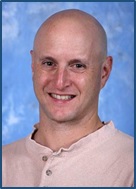 Eric D. Stein, D.Env. is a Principal Scientist at the Southern California Coastal Water Research Project (SCCWRP), where he is head of the Biology Department. Dr. Stein oversees a variety of projects related to in-stream and coastal water quality, bioassessment, hydromodification, watershed modeling, and assessment of wetlands and other aquatic resources. His research focuses on effects of human activities on the condition of aquatic ecosystems, and on developing tools to better assess and manage those effects. Dr. Stein has authored over 100 journal articles and technical reports and participates on numerous technical workgroups and committees related to water quality and wetland assessment and management. Prior to joining SCCWRP in 2002, Dr. Stein spent six years as a Senior Project Manager with the Regulatory Branch of the Los Angeles District Corps of Engineers, and four years with a private consulting firm.
Eric D. Stein, D.Env. is a Principal Scientist at the Southern California Coastal Water Research Project (SCCWRP), where he is head of the Biology Department. Dr. Stein oversees a variety of projects related to in-stream and coastal water quality, bioassessment, hydromodification, watershed modeling, and assessment of wetlands and other aquatic resources. His research focuses on effects of human activities on the condition of aquatic ecosystems, and on developing tools to better assess and manage those effects. Dr. Stein has authored over 100 journal articles and technical reports and participates on numerous technical workgroups and committees related to water quality and wetland assessment and management. Prior to joining SCCWRP in 2002, Dr. Stein spent six years as a Senior Project Manager with the Regulatory Branch of the Los Angeles District Corps of Engineers, and four years with a private consulting firm.
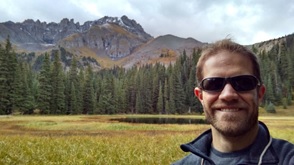 Jeremy Sueltenfuss is a Wetland Ecologist at Colorado State University, Department of Forest and Rangeland Stewardship. His research focuses on wetland hydrology, and the hydrologic drivers of wetland form and function. Jeremy’s research has focused primarily on mountain systems, ranging from the wetlands of Juneau Alaska down to the Peruvian Andes. By understanding how water flows through and across the landscape, Jeremy tries to apply his research on degraded and hydrologically altered wetlands to restore these vital ecosystems. His dissertation research focused on the use of hydrologic performance standards for wetland mitigation.
Jeremy Sueltenfuss is a Wetland Ecologist at Colorado State University, Department of Forest and Rangeland Stewardship. His research focuses on wetland hydrology, and the hydrologic drivers of wetland form and function. Jeremy’s research has focused primarily on mountain systems, ranging from the wetlands of Juneau Alaska down to the Peruvian Andes. By understanding how water flows through and across the landscape, Jeremy tries to apply his research on degraded and hydrologically altered wetlands to restore these vital ecosystems. His dissertation research focused on the use of hydrologic performance standards for wetland mitigation.
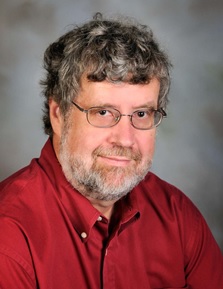 W. Lee Daniels is the Thomas B. Hutcheson Professor of Environmental Soil Science at Virginia Tech in Blacksburg, Virginia. He received his Ph.D. in Soil Science from VPI & SU in 1985. Dr. Daniels areas of specialization include stabilization and restoration of disturbed lands including areas disturbed by mining, road building, waste disposal, urbanization and erosion. In particular, he has focused his research and consulting experience in wetland impact mitigation, mine reclamation, and soil-waste management systems. His teaching programs at Virginia Tech focus on soil geomorphology and landscape analysis with particular emphasis on the relationships among surficial geology, hydrology, soil patterns and long term landscape evolution processes. Major awards include the Reclamation Researcher of the Year by the American Society for Surface Mining and Reclamation (ASMR) in 1993, USEPA’s National Biosolids Utilization Research Award in 2000 and the Lifetime Achievement in Research Award by ASMR in 2012.
W. Lee Daniels is the Thomas B. Hutcheson Professor of Environmental Soil Science at Virginia Tech in Blacksburg, Virginia. He received his Ph.D. in Soil Science from VPI & SU in 1985. Dr. Daniels areas of specialization include stabilization and restoration of disturbed lands including areas disturbed by mining, road building, waste disposal, urbanization and erosion. In particular, he has focused his research and consulting experience in wetland impact mitigation, mine reclamation, and soil-waste management systems. His teaching programs at Virginia Tech focus on soil geomorphology and landscape analysis with particular emphasis on the relationships among surficial geology, hydrology, soil patterns and long term landscape evolution processes. Major awards include the Reclamation Researcher of the Year by the American Society for Surface Mining and Reclamation (ASMR) in 1993, USEPA’s National Biosolids Utilization Research Award in 2000 and the Lifetime Achievement in Research Award by ASMR in 2012.
 Matt Schweisberg (matt@wetlandsns.com) is the Principal of Wetland Strategies and Solutions, LLC (www.wetlandsns.com), where he provides policy, regulatory and technical advice and assistance for clients seeking to navigate a wide range of regulatory and non-regulatory issues related to wetlands and other aquatic resources. He works throughout the U.S. Matt is a Professional Wetland Scientist under the Professional Certification Program of the Society of Wetland Scientists. He is a retired federal wetlands ecologist and wildlife biologist who spent over 32 years with the U. S. Environmental Protection Agency at its HQ office in Washington, D.C. and New England Region office in Boston. Matt served as Chief of the New England Region’s Wetlands Protection Program and Senior Wetland Ecologist, and on national work groups developing guidance and regulations on Clean Water Act jurisdiction. He has testified before federal grand juries and served several times as an expert witness in federal, state, and private litigation. He co-instructs a week-long intensive course on wetland identification and delineation at the Eagle Hill Institute in Maine, and has taught courses in wetland regulation, restoration and creation, wetland ecology, and wetland identification and delineation for federal and state agencies, academic organizations, and environmental consultants. He received his degree in Wildlife Management from the University of Maine.
Matt Schweisberg (matt@wetlandsns.com) is the Principal of Wetland Strategies and Solutions, LLC (www.wetlandsns.com), where he provides policy, regulatory and technical advice and assistance for clients seeking to navigate a wide range of regulatory and non-regulatory issues related to wetlands and other aquatic resources. He works throughout the U.S. Matt is a Professional Wetland Scientist under the Professional Certification Program of the Society of Wetland Scientists. He is a retired federal wetlands ecologist and wildlife biologist who spent over 32 years with the U. S. Environmental Protection Agency at its HQ office in Washington, D.C. and New England Region office in Boston. Matt served as Chief of the New England Region’s Wetlands Protection Program and Senior Wetland Ecologist, and on national work groups developing guidance and regulations on Clean Water Act jurisdiction. He has testified before federal grand juries and served several times as an expert witness in federal, state, and private litigation. He co-instructs a week-long intensive course on wetland identification and delineation at the Eagle Hill Institute in Maine, and has taught courses in wetland regulation, restoration and creation, wetland ecology, and wetland identification and delineation for federal and state agencies, academic organizations, and environmental consultants. He received his degree in Wildlife Management from the University of Maine.
![]()
View Past Compensatory Mitigation Webinar Series Here
View a List of Past Compensatory Mitigation Webinar Series Recordings Here
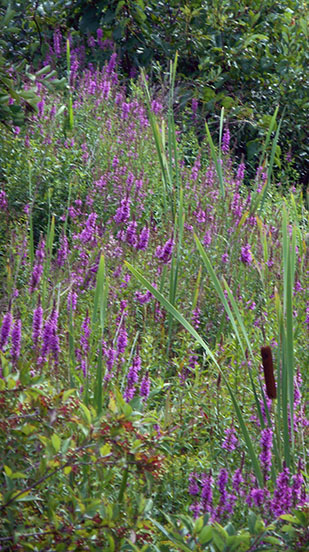 In 2017, the Association of State Wetland Managers partnered with U.S. Fish and Wildlife Service’s Coastal Program to organize and host a mini webinar series on best management practices for invasive species management in wetlands in coastal areas of the country. Special attention was paid to ecosystem service provision and the diverse strategies that may be employed to manage or eradicate an invasive species based on the species, region of the U.S. where it is located, and considerations associated with climate change.
In 2017, the Association of State Wetland Managers partnered with U.S. Fish and Wildlife Service’s Coastal Program to organize and host a mini webinar series on best management practices for invasive species management in wetlands in coastal areas of the country. Special attention was paid to ecosystem service provision and the diverse strategies that may be employed to manage or eradicate an invasive species based on the species, region of the U.S. where it is located, and considerations associated with climate change.
For more information and/or to join our email list for notices about upcoming events, please contact Laura Burchill at laura@nawm.org or (207) 892-3399.
View a List of Invasive Species Webinar Recordings Here
Please click on a year below to view past webinars.
Other Invasive Species Webinars of Interest:
Held April 26, 2016
Invasive Species Databases: An In-depth Look at EDDMapS, the USGS Non-Indigenous Aquatic Species Database, and NEMESIS
Held Wednesday, March 21, 2018 - 3pm EST
INTRODUCTION
Marla Stelk, Policy Analyst, Association of Stae Wetland Managers [POWERPOINT PRESENTATION]
PRESENTERS
- Chuck Bargeron, University of Georgia [POWERPOINT PRESENTATION]
- Pam Fuller, U.S. Geological Survey, Nonindigenous Aquatic Species Program [POWERPOINT PRESENTATION]
- Gregory Ruiz, Smithsonian Environmental Research Center [POWERPOINT PRESENTATION]
ABSTRACTS
Chuck Bargeron
EDDMapS’ primary goal is to discover the existing range and leading edge of invasive species while documenting vital information about the species and habitat using standardized data collection protocols. EDDMapS allows for data from many organizations and groups to be combined into one database to show a better map of the range of an invasive species. Goals of the current project include: integration of existing regional datasets, increase search options on EDDMapS website, update NAISMA Invasive Species Mapping Standards, and coordinate with local, state and regional organizations to develop early detection networks. After twelve years of development of EDDMapS, it has become clear that these local organizations are key to developing a successful early detection and rapid response network. The University of Georgia Center for Invasive Species and Ecosystem Health has released 15 apps to support data entry into EDDMapS.
Pam Fuller
The Nonindigenous Aquatic Species Database first began in the early 1990s with the passage of legislation related to zebra mussels. Since that time, the group has tracked the distribution of non-native aquatic species nationwide. At present, we focus primarily on freshwater species in the continental US and island territories. The system primarily tracks fish, crustaceans, mollusks, reptiles and amphibians, and obligate aquatic plants. The Program’s interactive website allows users to perform a variety of queries, download data, obtain information from species profiles, and see animations of species’ spread. There is an alert system connected to the database. Registered users receive email alerts when a species of interest is found in a new area. Other components recently added include NAS FaST – the Flood and Storm Tracker which can be used to predict where species may have moved into new drainages based on flooding. The NAS ARM, alert risk mapper, will show the extent of possible initial dispersal based on biology and barriers.
BIOS
 Chuck Bargeron has been with the University of Georgia for 19 years where his work focuses on invasive species and information technology. He has a B.S. and M.S in Computer Science. Websites that he designed have been featured twice in Science Magazine and have received over 1.7 billion hits since 2002. Chuck developed the infrastructure behind Bugwood Images which runs the ForestryImages.org and Invasive.org websites. Recently, Chuck has focused on mapping invasive species and tools for Early Detection and Rapid Response using EDDMapS and smartphone applications. He has led development of 26 smartphone applications including the first apps for the U.S. Forest Service and National Park Service. He was appointed to the National Invasive Species Advisory Council in 2013 and elected as Chair in 2018. Chuck has been an invited speaker at over 80 regional and national conferences and co-authored over 20 journal articles and outreach publications.
Chuck Bargeron has been with the University of Georgia for 19 years where his work focuses on invasive species and information technology. He has a B.S. and M.S in Computer Science. Websites that he designed have been featured twice in Science Magazine and have received over 1.7 billion hits since 2002. Chuck developed the infrastructure behind Bugwood Images which runs the ForestryImages.org and Invasive.org websites. Recently, Chuck has focused on mapping invasive species and tools for Early Detection and Rapid Response using EDDMapS and smartphone applications. He has led development of 26 smartphone applications including the first apps for the U.S. Forest Service and National Park Service. He was appointed to the National Invasive Species Advisory Council in 2013 and elected as Chair in 2018. Chuck has been an invited speaker at over 80 regional and national conferences and co-authored over 20 journal articles and outreach publications.
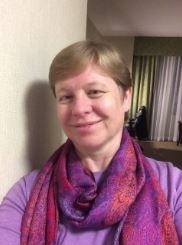 Pam Fuller is the program leader for the USGS Nonindigenous Aquatic Species Program which maintains a nationwide database and a web site of aquatic invaders. She started with the program in its infancy and has developed it to its current state over the past 26 years. Fuller has authored many scientific publications on the topic of aquatic invasive species. She has been involved in numerous national and international invasive species research activities and work groups, particularly in the field of invasive species information management. Ms. Fuller enjoys the work she does because it is so multifaceted. Her work requires knowledge of zoogeography, taxonomy, ecology, databases and web design.
Pam Fuller is the program leader for the USGS Nonindigenous Aquatic Species Program which maintains a nationwide database and a web site of aquatic invaders. She started with the program in its infancy and has developed it to its current state over the past 26 years. Fuller has authored many scientific publications on the topic of aquatic invasive species. She has been involved in numerous national and international invasive species research activities and work groups, particularly in the field of invasive species information management. Ms. Fuller enjoys the work she does because it is so multifaceted. Her work requires knowledge of zoogeography, taxonomy, ecology, databases and web design.
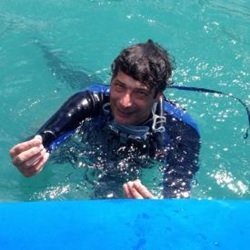 Gregory Ruiz is a marine ecologist with active research interests in invasion biology, biogeography, and ecology in coastal marine ecosystems. He heads a research group of ~ 40 full-time biologists, based at the Smithsonian Environmental Research Center (SERC) laboratories, located on Chesapeake Bay and San Francisco Bay. Most of his research explores the patterns, mechanisms, and consequences of marine invasions at a multiple spatial and temporal scales. He conducts extensive comparative measurements and experiments among estuaries along the Pacific and Atlantic coasts for North America. A Senior Scientist at SERC for over 25 years, Greg also is a Research Professor and founding co-director of the Aquatic BioInvasion Research and Policy Institute at Portland State University. Greg has published over 140 scientific articles as author or coauthor, focusing primarily on marine invasion ecology and management. He began his career in California and has broad interests in marine biology and dynamics of coastal ecosystems. Greg holds a Ph.D. in zoology from University of California, Berkeley and a B.A. in aquatic biology from the University of California, Santa Barbara. For additional information visit SERC’s Marine Invasion Research Laboratory website at http://invasions.si.edu/.
Gregory Ruiz is a marine ecologist with active research interests in invasion biology, biogeography, and ecology in coastal marine ecosystems. He heads a research group of ~ 40 full-time biologists, based at the Smithsonian Environmental Research Center (SERC) laboratories, located on Chesapeake Bay and San Francisco Bay. Most of his research explores the patterns, mechanisms, and consequences of marine invasions at a multiple spatial and temporal scales. He conducts extensive comparative measurements and experiments among estuaries along the Pacific and Atlantic coasts for North America. A Senior Scientist at SERC for over 25 years, Greg also is a Research Professor and founding co-director of the Aquatic BioInvasion Research and Policy Institute at Portland State University. Greg has published over 140 scientific articles as author or coauthor, focusing primarily on marine invasion ecology and management. He began his career in California and has broad interests in marine biology and dynamics of coastal ecosystems. Greg holds a Ph.D. in zoology from University of California, Berkeley and a B.A. in aquatic biology from the University of California, Santa Barbara. For additional information visit SERC’s Marine Invasion Research Laboratory website at http://invasions.si.edu/.
Phragmites australis: Current Research and Experiments in Control Strategies for Wetland Habitat Recovery
Held Wednesday - February 21, 2018 - 3pm EST
INTRODUCTION
Marla Stelk, Policy Analyst, Association of State Wetland Managers [POWERPOINT PRESENTATION]
PRESENTERS
- Karin Kettenring, Utah State University [POWERPOINT PRESENTATION]
- Christine Rohal, PhD Candidate, Utah State University [POWERPOINT PRESENTATION]
- Andrea Davalos, State University of New York [POWERPOINT PRESENTATION]
ABSTRACTS
Dr. Karin Kettenring and Christine Rohal
Phragmites australis has aggressively invaded wetlands in northern Utah including wetlands along the iconic Great Salt Lake. Since 2010, Utah State University researchers and wetlands managers have partnered to improves Phragmites management techniques and outcomes. In this talk we will discuss (1) how a formal manager survey informed a Phragmites management research experiment, and (2) how these Phragmites management experiments yielded important insights into how best to control Phragmites and the potential for habitat recovery.
Dr. Andrea Dávalos
Land manager organizations spend significant resources controlling invasive plants, yet there is surprisingly little evidence to assess success of invasive plant management. The rapid range expansions of invasive Phragmites australis in North America have prompted large-scale control efforts, although with limited success. Assessment of P. australis management in the Adirondack Park, New York State shows that eradication, through herbicide application, is only achievable for the smallest populations. Long-term control of the invasion will require continuous use of herbicides, not only jeopardizing native wetland biota but also threatening existence of the endemic subspecies P. australis americanus. Alternatively, biological control is a promising and safer tool. Two European stem mining noctuids show very strong, but not absolute, preference for invasive P. australis. Demographic techniques are being implemented to improve host-specificity assessment and evaluate management success. Invasive species management should go beyond short-term suppression of target plants and should incorporate quantitative measurements of outcomes.
BIOS
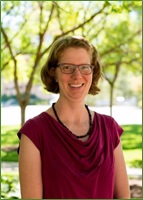 Dr. Karin Kettenring is a faculty member in the Department of Watershed Sciences, Quinney College of Natural Resources, Utah State University in Logan, Utah. She has a B.A. in biology from Oberlin College. She received her Ph.D. in applied plant sciences from the University of Minnesota where she worked with Dr. Susan Galatowitsch. Her Ph.D. research focused on restoration of sedges in prairie pothole wetlands. She was also a Postdoctoral Fellow with Dr. Dennis Whigham at the Smithsonian Environmental Research Center where she studied the invasion of Phragmites australis in Chesapeake Bay tidal wetlands. She has been a faculty member at USU since 2008. Her current research efforts focus on (1) the ecology, genetics, and management of wetland invaders, (2) seed ecology of native wetlands plants, with implications for wetland revegetation, and (3) restoration genetics for sustainable, functioning wetland restorations.
Dr. Karin Kettenring is a faculty member in the Department of Watershed Sciences, Quinney College of Natural Resources, Utah State University in Logan, Utah. She has a B.A. in biology from Oberlin College. She received her Ph.D. in applied plant sciences from the University of Minnesota where she worked with Dr. Susan Galatowitsch. Her Ph.D. research focused on restoration of sedges in prairie pothole wetlands. She was also a Postdoctoral Fellow with Dr. Dennis Whigham at the Smithsonian Environmental Research Center where she studied the invasion of Phragmites australis in Chesapeake Bay tidal wetlands. She has been a faculty member at USU since 2008. Her current research efforts focus on (1) the ecology, genetics, and management of wetland invaders, (2) seed ecology of native wetlands plants, with implications for wetland revegetation, and (3) restoration genetics for sustainable, functioning wetland restorations.
 Christine Rohal is a PhD student Karin Kettenring's Wetland Ecology lab at Utah State University in Logan, Utah. Her research focuses on applied questions related to restoring wetland habitats degraded by invasive plant species. Before she moved to Utah for her graduate studies, she worked on habitat restoration projects in Golden Gate National Recreation Area in San Francisco, Grand Canyon National Park, and on the beaches of Jacksonville, Florida.
Christine Rohal is a PhD student Karin Kettenring's Wetland Ecology lab at Utah State University in Logan, Utah. Her research focuses on applied questions related to restoring wetland habitats degraded by invasive plant species. Before she moved to Utah for her graduate studies, she worked on habitat restoration projects in Golden Gate National Recreation Area in San Francisco, Grand Canyon National Park, and on the beaches of Jacksonville, Florida.
 Dr. Andrea Dávalos is an Assistant Professor in the Biological Sciences Department at the State University of New York at Cortland. Her research is motivated by a strong interest in conservation and in the development of tools to restore natural ecosystems. She is particularly interested in addressing issues pertaining to the ecology and management of biological invasions and the factors that drive successful control programs. Her long-term collaborative research combines experimental and modeling approaches to assess impacts of invasive plants and success of management programs.
Dr. Andrea Dávalos is an Assistant Professor in the Biological Sciences Department at the State University of New York at Cortland. Her research is motivated by a strong interest in conservation and in the development of tools to restore natural ecosystems. She is particularly interested in addressing issues pertaining to the ecology and management of biological invasions and the factors that drive successful control programs. Her long-term collaborative research combines experimental and modeling approaches to assess impacts of invasive plants and success of management programs.
Managing Invasive Species in the Great Lakes: Establishing Goals & Objectives, Monitoring Programs, and Cooperative Management Areas in Michigan
Held Thursday, January 11, 2018 - 3:00 p.m. ET
INTRODUCTION
Marla Stelk, Policy Analyst, Association of State Wetland Managers [POWERPOINT PRESENTATION]
PRESENTERS
- Gregory J. Norwood, Michigan Department of Natural Resources [POWERPOINT PRESENTATION]
- Dr. Don Uzarski, Central Michigan University [POWERPOINT PRESENTATION]
- Ryan Wheeler, Michigan Department of Natural Resources [POWERPOINT PRESENTATION]
ABSTRACTS
Gregory J. Norwood
Beyond weed control: Establishing ecosystem goals, objectives, and desired outcomes for degraded coastal wetlands
Invasive plant removal is usually an integral part of coastal wetland restoration projects, sometimes at a relatively high cost. While there is acceptance of the biodiversity loss associated with invasive plants such as reed (Phragmites australis) and narrow-leaved cattail (Typha angustifolia and T. x glauca), managers are ultimately responsible for considering trade-offs of various intervention strategies. This talk describes the importance of establishing ecosystem goals and objectives to achieve specific conservation outcomes before invasive species control efforts begin so that decisions about trade-offs become easier. Examples from western Lake Erie will reveal a wide range of desired outcomes because of various local constraints such as the nature of the surrounding landscape. Desired conservation outcomes are more likely to be achieved if there is clear linkage between invasive species removal and the stated project goals and objectives. Removal of invasive species always involves difficult trade-offs; however, practitioners frequently monitor acres treated instead of the overall impacts of control projects in achieving their conservation goals.
Dr. Don Uzarski
Monitoring multiple biological attributes in the Great Lakes coastal wetlands: database access for invasive species management
Since European settlement, over 50% of Laurentian Great Lakes coastal wetlands have been lost, causing growing concern by government agencies. To facilitate information sharing between public, private, and government agencies throughout the basin, we developed standardized methods and indicators used for assessing wetland condition. Using an ecosystem approach, birds, anurans, fish, macroinvertebrates, vegetation, and physicochemical conditions were sampled in coastal wetlands of all five Great Lakes, US and Canada. Our primary objective was to implement a standardized basin-wide monitoring program that would be a powerful tool to inform coastal wetland conservation and restoration priorities throughout the basin.
Ryan Wheeler
Creating and empowering cooperative invasive species management areas across Michigan with multi-scaled support networks.
The challenges associated with Invasive Species Management span geo-political boundaries, property ownership boundaries, and even human values. In order to overcome these challenges, it can be beneficial to view individual invasive species problems as part of a much bigger picture. Regional Cooperative Invasive Species efforts are a practical implementation of this “big picture” mindset. This presentation will cover recent efforts to create and empower Cooperative Invasive Species Management Areas across all of Michigan. It will also cover several networks that continue to provide critical support and value to these groups at local, state, and basin-wide scales.
BIOS
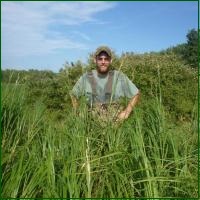 Greg J. Norwood serves as Invasive Species Coordinator for the Michigan Department of Natural Resources – Wildlife Division. Previously, he was a wildlife biologist for the U.S. Fish and Wildlife Service at Detroit River International Wildlife Refuge where he was involved in forming the Detroit River-Western Lake Erie Cooperative Weed Management Area which includes some of the “weediest” natural areas in the state. Most of his work involved a variety of natural area projects, including adding land to the Refuge, prescribed fire, ecological inventories, wetland impoundment management, transitioning agricultural fields to other habitat, facilitating public use, and prescribed fire. Currently, he assists the Division and partners with decisions and strategy surrounding invasive species.
Greg J. Norwood serves as Invasive Species Coordinator for the Michigan Department of Natural Resources – Wildlife Division. Previously, he was a wildlife biologist for the U.S. Fish and Wildlife Service at Detroit River International Wildlife Refuge where he was involved in forming the Detroit River-Western Lake Erie Cooperative Weed Management Area which includes some of the “weediest” natural areas in the state. Most of his work involved a variety of natural area projects, including adding land to the Refuge, prescribed fire, ecological inventories, wetland impoundment management, transitioning agricultural fields to other habitat, facilitating public use, and prescribed fire. Currently, he assists the Division and partners with decisions and strategy surrounding invasive species.
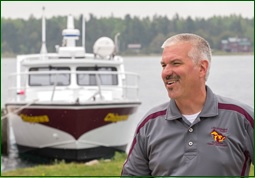 Dr. Don Uzarski, CMU Professor of Biology, serves as the Director of CMU’s Institute for Great Lakes Research and Biological Station on Beaver Island, MI. He is a limnologist and aquatic ecologist with a focus on measures of ecosystem health of Great Lakes coastal wetlands.
Dr. Don Uzarski, CMU Professor of Biology, serves as the Director of CMU’s Institute for Great Lakes Research and Biological Station on Beaver Island, MI. He is a limnologist and aquatic ecologist with a focus on measures of ecosystem health of Great Lakes coastal wetlands.
Uzarski leads a 10-year $20 million Great Lakes coastal wetland-monitoring program for the US EPA. He can speak to a wide range of topics including human impacts on waterways, indicators of ecosystem health, pollution and runoff and the overall health of the Great Lakes. He has published over 60 peer-reviewed manuscripts, most of which have been wetlands related. His work has been cited in scientific journals over 1200 times.
 Ryan Wheeler is the Invasive Species Biologist for Michigan’s Department of Natural Resources, Forest Resources and Wildlife Divisions. Ryan works on many aspects of comprehensive invasive species management, with an emphasis on building and strengthening collaborative partnerships. Some of Ryan’s key responsibilities include serving as technical contact for projects funded by Michigan’s invasive species grant program and leading a multi-agency committee working on decontamination policy and recommendations for preventing the spread of invasive species in Michigan. Ryan also serves on the boards of the Michigan Wetland Association and the Midwest Invasive Plant Network.
Ryan Wheeler is the Invasive Species Biologist for Michigan’s Department of Natural Resources, Forest Resources and Wildlife Divisions. Ryan works on many aspects of comprehensive invasive species management, with an emphasis on building and strengthening collaborative partnerships. Some of Ryan’s key responsibilities include serving as technical contact for projects funded by Michigan’s invasive species grant program and leading a multi-agency committee working on decontamination policy and recommendations for preventing the spread of invasive species in Michigan. Ryan also serves on the boards of the Michigan Wetland Association and the Midwest Invasive Plant Network.
![]()
View Past Invasive Species Webinars Here
| 2017 |
Seminario web de la Red Internacional de los Humedales de Américas
Evaluación de las actividades sensibilización ambiental en los sitios de humedales
Miércoles 25 de Octubre de 2017 3:00 – 5:00 p.m. EDT
Resumen del Seminario web:
Dedicamos la mayor parte de nuestras capacidades profesionales y de voluntarios en entregar una educación mediambiental y un trabajo de concientización con las comunidades locales, los encargados de los humedales y los socios del sector privado, pero ¿realmente tenemos conocimiento de cuán efectivas son estas actividades al generar cambios positivos en el medioambiente tanto en el comportamiento como en las acciones? Tan importante como saber si podemos demostrar esto a nuestros participantes, patrocinadores y socios de proyecto, para que de esta manera ellos puedan ver como nuestras actividades influyen en el comportamiento, en los resultados en terreno y en el avance de la protección de humedales y otros temas medioambientales. A menudo la evaluación parece olvidarse al final del proyecto, pero es una parte esencial para poder mejorar nuestro trabajo en un futuro y poder adquirir mejores resultados para nuestras propias organizaciones y redes.
Este seminario web utilizará ejemplos prácticos y fáciles de cómo realizar evaluaciones basadas en las técnicas de prueba y error utilizadas por nuestros miembros de las Américas. Estará disponible tanto en inglés como en español y después de las presentaciones se dará tiempo para debatir.
 PRESENTACIONES
PRESENTACIONES
Comentarios Introductorios
Presentador: Chris Rostron, Red Internacional de Humedales (WLI), Reino Unido. Chris coordina el proyecto global de WLI, una red de apoyo para aquellos quienes realizan actividades educativas, de participación y concientización en los centros educacionales de humedales.
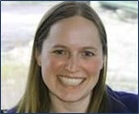 Ethel Wilkinson: Manomet (EEUU)
Ethel Wilkinson: Manomet (EEUU)
“Elaboración de técnicas de evaluación práctica para tu proyecto”.
Ethel trabaja con programas para establecer el desarrollo de evaluaciones a través de los variados programas de Manomet, incluyendo la conservación de humedales, el manejo inteligente de bosques y clima y la administración de almacenes de comestible. Con métricas que miden el progreso incremental de los resultados, el desarrollo de evaluaciones permite la retroalimentación en tiempo real y el ajuste del programa durante la implementación.
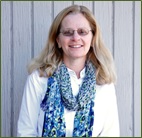 Susan Bonfield: Environment for the Americas (EEUU)
Susan Bonfield: Environment for the Americas (EEUU)
“Evaluando las necesidades de las minorías étnicas para evaluar el acceso a áreas naturales protegidas”.
En los Estados Unidos, las minorías étnicas generalmente son poco representadas en comparación a los visitantes regulares de las áreas naturales protegidas. Susan ha trabajado haciéndoles entrevistas a estas minorías para conocer sus opiniones ante las áreas silvestres y cuáles deberían ser los límites para los visitantes.
Sebastián Saiter / Ricardo Matus: Agrupación Ecológica Patagónica (Punta Arenas, CHILE),
"Humedal Tres Puentes, una valoración del aula natural para la conservación".
La Agrupación está compuesta por personas de diferentes profesiones, estudiantes y niños, que comparten el propósito de preservar y comprender las especies que habitan las reservas naturales urbanas de la Patagonia. Equipo interdisciplinario e inclusivo en las generaciones, ha sido uno de los puntos que la organización ha evaluado en sus líneas de trabajo para la participación de la comunidad en la conservación de los humedales. Nacido en 2007, ha enfocado su trabajo con vecinos y escuelas locales. Forma parte de la Red de Reservas Naturales de la Patagonia.
Discusión interactiva
En la última parte del webinar habrá tiempo para discutir y debatir de manera interactiva, esta es la instancia para compartir diversas experiencias en temas sobre proyectos de evaluación.
Debido a la alta demanda tendremos la opción de traducciones simultáneas (inglés - español)
Tendremos la opción de realizar este seminario web con traducción consecutiva de inglés a español. Este servicio se coordina con bastante anticipación, así que si estás interesado en participar de este evento y necesitas los servicios de traducción al español, contáctanos a este correo: chris.rostron@wwt.org.uk.
Preparing Quality Assurance Project Plans for Your Tribal Wetland Program
Held Thursday, November 2, 2023 - 3:00 p.m.-4:30 p.m. Eastern
INTRODUCTION
- Portia Osborne, Project Manager, National Association of Wetland Managers [PRESENTATION PDF]
PRESENTERS
- Kelly Rodibaugh, U.S. Environmental Protection Agency, Region 5 [PRESENTATION PDF]
- Janice Martin, Quinault Indian Nation Division of Natural Resources [PRESENTATION PDF]
- Cindy Fields, U.S. Environmental Protection Agency, Region 10 [PRESENTATION PDF]
ABSTRACT
Many of the activities undertaken by tribal wetland programs require the preparation and approval of a Quality Assurance Project Plan (QAPP). A QAPP is a project-specific plan that lays out the type and quality of environmental data to be collected, including the quality assurance and quality control measures that will be used to ensure data quality. EPA must approve of a QAPP before the project can begin. This webinar will provide a general introduction to QAPP requirements and EPA’s review and approval process for these documents. In addition, an example of recent experience developing a project-specific QAPP for a tribal wetland program will be shared. Throughout the webinar, presenters shared recommendations for QAPP preparation and insights specific to tribal wetland programs.
Please click only once on each video recording to view in this window.
![]()
Education and Outreach Efforts to Support Tribal Wetland Programs
Held Thursday, September 21, 2023 - 3:00 p.m.-4:30 p.m. Eastern
OVERVIEW
Education and outreach activities can be useful tools in conveying the importance of wetlands to the broader community, engaging youth, and building support for wetland protections and wetland programs. These activities can also be opportunities to incorporate cultural knowledge and values into wetland projects or programs. In this webinar, they learned about education and outreach efforts as a part of the Bushy Lake Eco-Cultural Project in Sacramento, CA and within the work conducted by the Tulalip Tribes of Washington Natural and Cultural Resources Division.
INTRODUCTION
- Portia Osborne, Project Manager, National Association of Wetland Managers [PRESENTATION PDF]
PRESENTERS
- Michelle Stevens, Emeritus Professor, California State University Sacramento [PRESENTATION PDF]
- Melissa Gobin, Education Outreach Coordinator, Tulalip Tribes of Washington Natural and Cultural Resources Division [PRESENTATION PDF]
- Michelle Bahnick, Wetland Biologist, Tulalip Tribes of Washington Natural and Cultural Resources Division
ABSTRACTS
Michelle Stevens
Bushy Lake is located within the lower American River floodplain, Sacramento, CA, and is in the traditional territory of the Nissenan, Maidu and Miwok peoples. The Bushy Lake Eco-Cultural Restoration Project, initiated in 2015, has a primary goal of restoring culturally significant plants and wildlife habitat in a highly disturbed novel ecosystem. Our hypothesis is that culturally significant plants are fire resilient due to thousands of years of Traditional Fire Management provide site resiliency to fire. A wildfire in 2021 burned the entire site to the water’s edge; this enabled us to test our fire resiliency hypothesis. We will present results of our post-fire monitoring of culturally significant plants and wildlife. Extensive data pre- and post- fire allowed us to determine the resiliency of white root (Carex barbarae), mugwort (Artemisia douglasiana), and creeping wild rye (Leymus triticoides); we also have restored a sacred pollinator/ pinole garden. While Western Ecological Knowledge (WEK) offers a strong foundation for restoration of species assemblages and ecosystems, TEK and Traditional Fire Management offer critical species tending and management practices that can help to restore both cultural and ecological integrity. In this talk, I discussed introduction of Traditional Fire Management into the lower American River urban environment to build fire resiliency, vital cultural access and tending, and public education. The Bushy Lake Eco-Cultural Project demonstrates that WEK–TEK restoration can be linked to honor cultural integrity and nurture a “Sense of Place” and reciprocity for Native Californians and others.
Melissa Gobin and Michelle Bahnick
Building education and outreach (E&O) components to connect with tribal members is a challenge for wetland programs. The Tulalip Tribes have a variety of current and in-development E&O efforts to engage with and inform Tulalip tribal members about the wealth of habitats, ecosystem services, and cultural connections provided by wetlands, including organizing field trips to wetland sites, hands-on activities (e.g., how to harvest materials for cultural uses), and traditional stories to connect place and culture. Rather than starting from scratch, we work with existing programs to create more effective E&O opportunities including Tulalip Heritage High School, the Summer Youth Program, and other Tribal departments like Tulalip TV, the Cultural Department, and the Rediscovery Program. We also aim to build E&O opportunities into grants and projects, such as opportunities for tribal members to engage in wetland work. Incorporating community outreach events, interviews with elders, and talking to youth councils also helps determine wetland management priorities.
Please click only once on each video recording to view in this window.
![]()
Geospatial Mapping Tools and Techniques for Tribal Wetland Programs
Held Thursday, June 15, 2023 - 3:00 p.m.-4:30 p.m. Eastern
MODERATOR
• Kathy Allen, Natural Resource Analys, Saint Mary's University of MN - GeoSpatial Services [PRESENTATION PDF]
PRESENTERS
- Mike Knudson, GIS Analyst, Saint Mary's University of Minnesota - GeoSpatial Services [PRESENTATION PDF]
- Ferin Davis Anderson, Supervisor of Environmental Sciences, Shakopee Mdewakanton Sioux Community [PRESENTATION PDF]
- Dustin Carl, Fish and Wildlife Biologist, Chugach Regional Resources Commission [PRESENTATION PDF]
ABSTRACT
As GIS technology advances, geospatial tools have become more useful and accessible for wetland managers. These tools and techniques can be particularly valuable for monitoring and assessment applications, including data collection, analysis, modelling, and visualization for education and outreach. The results of these efforts may be utilized for other EPA core elements, such as prioritizing wetlands for voluntary protection, planning restorations, and tracking regulatory enforcement activities. This webinar, you heard from GIS practitioners and tribal staff about how they have used geospatial tools and techniques to advance tribal wetland programs.
Please click only once on each video recording to view in this window.
Monitoring and Assessment: Data Collection and Applications for Tribal Wetland Programs
Held Thursday, April 20, 2023 - 3:00 p.m.-4:30 p.m. Eastern
INTRODUCTION
- Kathy Allen, Natural Resource Analyst, Saint Mary's University of Minnesota - GeoSpatial Services
- Portia Osborne, Project Manager, National Association of Wetland Managers [PRESENTATION PDF]
ABSTRACT
Monitoring and assessment is one possible component of a Wetland Program Plan as described in the U.S. Environmental Protection Agency’s Core Elements Framework. Having a monitoring and assessment program is a critical tool for Tribes and states in managing and protecting their wetland resources. Monitoring and assessment can help document a baseline for wetlands extent, condition, and function and to detect changes over time in order to make appropriate resource management decisions. In this webinar, we heard from Tribal representatives about their ongoing wetland monitoring and assessment programs, including priorities, design, and implementation.
PRESENTERS
- Kerryann Weaver, Wetlands Section Supervisor, U.S. Environmental Protection agency, Region 5 [PRESENTATION PDF]
- Michelle Bahnick, Wetland Biologist, Tulalip Tribes of Washington Natural and Cultural Resources Division [PRESENTATION PDF]
- Bubby Gopher, Wetland Coordinator, Chippewa Cree Tribe [PRESENTATION PDF]
- Laurel Wilson, Wetlands Specialist, Grand Portage Band of Lake Superior Chippewa [PRESENTATION PDF
Please click only once on each video recording to view in this window.
![]()
Developing Your Tribal Wetland Program
Held Thursday, February 16, 2023 - 3:00 p.m.-4:30 p.m. Eastern
ABSTRACT
This webinar offered two examples of tribal wetland programs and how they have developed over time:
- For nearly three decades, the Confederated Salish and Kootenai Tribes’ [CSKT] wetland conservation program has utilized a combination of wetland-focused Tribal Ordinances, innovative partnerships with outside agencies and non-profits, and EPA Wetland Program Development Grants to monitor, preserve, and restore wetlands on the Flathead Reservation. Today, CSKT’s wetlands are threatened by a rapid increase in local development and the effects of climate change. By analyzing years of functional assessment data and aerial imagery to better understand the trends of each watershed, CSKT now seeks to update their Wetland Conservation Plan for the next decade. This presentation explained the tools used by CSKT and history of the program, with a particular focus on developing their new Wetland Conservation Plan.
- The Fond du Lac Reservation began developing its Wetland Program in late 1998, even before the EPA had developed the Core Elements for Wetland Programs. Since then, Fond du Lac has achieved the goal of developing each of the core elements, most recently with the 2020 approval of its Wetland Water Quality Standards. This presentation covered some key elements to consider in building a Wetland Program from the ground up, including the “four knows” of this development.
INTRODUCTION
- Kathy Allen, Saint Mary's University of MN - GeoSpatial Services [PRESENTATION PDF]
PRESENTERS
- Rick Gitar, Fond du Lac Reservation - Office of Water Protection [PPRESENTATION PDF]
- Blair Libby, Confederated Salish and Kootenai Tribes [PPRESENTATOIN PDF]
Please click only once on each video recording to view in this window.
![]()
Protecting Waters and Wetlands in Indian Country: An Overview and Case Studies from EPA’s New Tribal Wetland Program Guide
Held Thursday, December 15, 2022 - 3:00 p.m.-4:30 p.m. EST
ABSTRACT
This webinar provided an overview of Protecting Waters and Wetlands in Indian Country: A Guide for Developing Tribal Wetland Management Programs, a new guide designed to aid Tribes in strategic wetland resource planning and management, including guidance that is more relevant to the unique Tribal situations and more accessible for the Tribal reader. The guide augments the existing National Association of Wetland Managers 2013 Wetland Program Plans Handbook, which provides a sound foundation on the core program elements. The guide was produced in collaboration with Tribes from across the country and in response to a direct request from the Tribes, in order to help them protect wetlands and aquatic resources. The webinar included an overview of the guide followed by a panel discussion on the process of preparing the guide, information found in the guide, and examples of how it may be used by Tribal communities.
INTRODUCTION
Portia Osborne, Project Manager, National Association of Wetland Managers [PRESENTATION PDF]
PRESENTERS
- Gretchen Goldman, Assistant Director for Environmental Science, Engineering, Policy, and Justice, White House Office of Science and Technology Policy
- Kerryann Weaver, U.S. Environmental Protection Agency, Region 5 [PRESENTATION PDF]
- Matt Baerwalde, Snoqualmie Indian Tribe
- Tyler Orgon, Red Lake Band of Chippewa Indians
- Linda Storm, U.S. Environmental Protection Agency, Region 10
- Kathleen Kutschenreuter, U.S. Environmental Protection Agency
Please click only once on each video recording to view in this window.
Held Thursday, December 8, 2022 - 3:00 p.m.-4:30 p.m. EST
ABSTRACT
For many tribes, EPA funding is critical to starting and sustaining a wetland program. However, EPA grant applications can be daunting, especially for first-time applicants. This webinar helped guide Tribal wetland staff through the application process, so they have a better idea of what to expect. It covered strategies, tips, and lessons learned to help strengthen grant proposals and increase the odds of successfully obtaining funding. This included advice on pre-planning, evaluating grant options, deciphering the request for proposals (RFP), the importance of Wetland Program Plans (WPPs) and partnerships, and project budgeting.
INTRODUCTION
Portia Osborne, Project Manager, National Association of Wetland Managers [PRESENTATION PDF]
PRESENTERS
- Myra Price, U.S. Environmental Protection Agency
- Rebecca Dils, U.S. Environmental Protection Agency [PRESENTATION PDF]
- Mike Jones, Stockbridge-Munsee Community [PRESENTATION PDF]
- Rue Hewett Hoover, Nez Perce Tribe [PRESENTATION PDF]
Please click only once on each video recording to view in this window.
![]()
Getting Started with Tribal Wetland Plans
Held Thursday, September 29, 2022 - 3:00-4:30pm ET
INTRODUCTION
- Portia Osborne, Project Manager, National Association of Wetland Managers [PRESENTATION PDF]
PRESENTERS
- Yvonne Vallette, U.S. Environmental Protection Agency, Region 10 [PRESENTATION PDF]
- Mary Iorio, Environmental Division, Three Affiliated Tribes [PRESENTATION PDF]
- Tiffany Allgood, Environmental Programs Office, Coeur d’Alene Tribe [PRESENTATION PDF]
OVERVIEW
This webinar was the first in a new series focused on working with Tribal Communities to build and develop wetland programs. The webinar included an overview of Wetland Program Plans (WPPs) and the EPA’s Core Elements Framework. Then representatives from the Three Affiliated Tribes and the Coeur d’Alene Tribe each shared their experiences in developing WPPs and establishing wetland programs. The presentations included discussion of efforts to foster a cultural reconnection to wetlands, lessons learned in wetland program development, and future program goals and directions.
Please click only once on each video recording to view in this window.
![]()
Funding Tribal Water Programs (Presented at EPA Region 7 ESTP Virtual Meeting)
Held Thursday, November 4, 2021
INTRODUCTION
- Brenda Zollitsch, Senior Policy Analyst, Association of State Wetland Managers
PRESENTERS
- Nestoria Wright, Kickapoo Tribe in Kansas [PRESENTATION PDF]
- Yvonne Vallette, U.S. Environmental Protection Agency, Region 10 [PRESENTATION PDF]
- Building Capacity: Tribal Panel and Discussion
BIOS
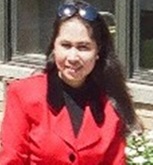 Nestoria Wright completed her Bachelor of Science in Healthcare Management major in Health Services Organization and Policy (HSOP) and Psychology at Wichita State University, Master’s in public health (MPH) and Community Leadership Development at the University of Kansas and Wichita State University and a Ph.D. Public Health major in Epidemiology, at Walden University. She joined Kickapoo Tribes in Kansas in April 2019. Prior to working at the Kickapoo Tribe EPA, she has been employed at the US Air Force since 2011-February of 2019.She also worked as an Epidemiologist and Health Planner at Shawnee County Health Department Topeka Kansas, where she served as an Emergency Preparedness and Community Outreach Epidemiologist since 2004-2008. Prior to working in the Local and State Health Department as a public health Professional she was teaching Undergraduate Healthcare Administration and Health Promotion courses and presently teaching Masters’ in Public Health Online Courses since 2007 to present. She looks forward to continuing developing and promoting a comprehensive environmental protection programs for the Kickapoo Tribe in Kansas that will protect the natural, cultural, and human resources.
Nestoria Wright completed her Bachelor of Science in Healthcare Management major in Health Services Organization and Policy (HSOP) and Psychology at Wichita State University, Master’s in public health (MPH) and Community Leadership Development at the University of Kansas and Wichita State University and a Ph.D. Public Health major in Epidemiology, at Walden University. She joined Kickapoo Tribes in Kansas in April 2019. Prior to working at the Kickapoo Tribe EPA, she has been employed at the US Air Force since 2011-February of 2019.She also worked as an Epidemiologist and Health Planner at Shawnee County Health Department Topeka Kansas, where she served as an Emergency Preparedness and Community Outreach Epidemiologist since 2004-2008. Prior to working in the Local and State Health Department as a public health Professional she was teaching Undergraduate Healthcare Administration and Health Promotion courses and presently teaching Masters’ in Public Health Online Courses since 2007 to present. She looks forward to continuing developing and promoting a comprehensive environmental protection programs for the Kickapoo Tribe in Kansas that will protect the natural, cultural, and human resources.
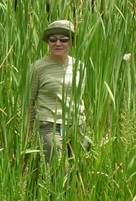 Yvonne Vallette is an Aquatic Ecologist with the U.S. Environmental Protection Agency (EPA). For the last twenty-three years she has worked at EPA Region 10’s Oregon Operations Office in Portland serving as the Region’s coordinator for enhancing State and Tribal Programs. Her work with EPA is focused on the technical and policy aspects of the Clean Water Act (CWA), including Section 404. Her practicable experience includes work in: aquatic resource monitoring and assessment, 404 enforcement, compensatory mitigation, impact analysis, CWA jurisdiction, 404 program assumption, and aquatic resources restoration.
Yvonne Vallette is an Aquatic Ecologist with the U.S. Environmental Protection Agency (EPA). For the last twenty-three years she has worked at EPA Region 10’s Oregon Operations Office in Portland serving as the Region’s coordinator for enhancing State and Tribal Programs. Her work with EPA is focused on the technical and policy aspects of the Clean Water Act (CWA), including Section 404. Her practicable experience includes work in: aquatic resource monitoring and assessment, 404 enforcement, compensatory mitigation, impact analysis, CWA jurisdiction, 404 program assumption, and aquatic resources restoration.
Please click only once on each video recording to view in this window.
![]()
Advancing Tribal Wetland Programs Through Innovations in Monitoring & Assessment
Held Tuesday, December 1, 2020 - 1:00 p.m.-2:30 p.m. EST
INTRODUCTION
- Marla Stelk, Executive Director, Association of State Wetland Managers [PRESENTATION PDF]
PRESENTERS
- vYonne Vallette, U.S. Environmental Protection Agency, Region 10 [PRESENTATION PDF]
- Ferin Davis Anderson, Lead Environmental Scientist, Shakopee Mdewakanton Sioux Community [PPRESENTATION PDF]
- Eric Krumm, Water Resources Technician, Leech Lake Band of Ojibwe Water Resources Program [PRESENTATION PDF]
ABSTRACTS
Yvonne Vallette and William Kirchner
Using National Wetland Inventory Data to Assist State/Tribe Wetland Monitoring and Assessment Efforts
The US Environmental Protection Agency (EPA) recommends that states and tribes use a consistent, thorough and timely wetland monitoring and assessment program as a critical tool for them to better manage and protect their wetland resources. These programs allow states and tribes to: 1) establish a baseline in wetlands extent, condition and function; 2) detect change; and 3) characterize trends over time. To further assist States and Tribes, EPA’s Wetland Program Development Grants (WPDG) provides needed financial resources to support actions and activities that together comprise a comprehensive wetland monitoring and assessment program, which must be able to identify the location and extent of these resources in designing their monitoring and assessment efforts.
The US Fish and Wildlife Service’s (FWS) National Wetlands Inventory (NWI) is a publicly available geospatial data set that provides detailed information on the abundance, characteristics, and distribution of streams and wetlands throughout the US. Natural resource managers can use the data to promote the understanding, conservation and restoration of these aquatic resources. In 2016, FWS released version 2.0 of their national NWI aquatic ecosystems, like streams. NWI 2.0 data is a reasonable representation of the resources at the landscape scale. Because of its coarse scale, dataset, which is a comprehensive characterization of all surface water features on the landscape, including a wide range of wetlands and other and the classification, the data is suitable for establishing a baseline for resources either statewide or at watershed scale. This comprehensive dataset allows the accurate, consistent calculation of area and ecological classification to best support geospatial summaries and modeling for management decisions and for identifying monitoring and assessment efforts that will support State or Tribal aquatic resource programs. This presentation will explore the specifics on the use or development of NWI compliant data into a State/Tribal monitoring and assessment program or project.
Ferin Davis Anderson
Integrating Drone and LiDAR Technology into Tribal Wetland Programs
The Shakopee Mdewakanton Sioux Community (SMSC), located 30 miles southwest of Minneapolis, MN, was awarded an Environmental Protection Agency (EPA) Tribal Wetland Program Development Grant in 2019. The proposal was developed with the intent to advance and refine the SMSC’s existing wetland program by focusing on an EPA core element involving monitoring and assessment. SMSC plans to incorporate LiDAR (light detection and ranging) elevation data to examine the location of current and potentially historic wetlands. They will be using a drone (UAV) mounted LiDAR system that collects derivatives based on hydrologic, surface, terrain and landform features with accuracy in the range of 10-20cm. This LiDAR data will help identify important wetland functional drivers and categorize wetlands using the hydrogeomorphic (HGM) classification system based on landscape position. SMSC seeks to demonstrate how UAV-mounted LiDAR can be used as a tool to further prioritize ecologically significant wetlands and identify potentially restorable wetlands.
Eric Krumm
An ArcGIS-Based Spatial Analysis of Jurisdictional Wetland Extent within the Leech Lake Reservation In North Central Minnesota
As a component of a comprehensive, long-term wetland surveying and mapping strategy the Leech Lake Band of Ojibwe (LLBO) Water Resources Program developed an assessment platform to evaluate a range of potential jurisdictional Waters of the United States (WOTUS) scenarios within the external boundaries of the Leech Lake Reservation in North Central Minnesota. Federal definitions and the scope of Clean Water Act regulation across the United States have been influenced by regular federal updates as well as Supreme Court rulings since its inception in 1972. While the specific definitions of “wetlands” and “tributaries” have remained relatively static over the course of Clean Water Act implementation, the criteria for determining if these water bodies are regulated by the Clean Water Act (i.e. jurisdictional) have varied considerably. An adaptable ArcGIS-based assessment model was developed that could be used to provide the LLBO Water Resources Program with a remotely determined range of potential WOTUS interpretations across the entire Reservation to aid in resource planning while also allowing the flexibility to update the model based on field-based mapping efforts and any potential future revisions to the Clean Water Act.
BIOS
 Yvonne Vallette is an Aquatic Ecologist with the U.S. Environmental Protection Agency (EPA). For the last twenty-three years she has worked at EPA Region 10’s Oregon Operations Office in Portland serving as the Region’s coordinator for enhancing State and Tribal Programs. Her work with EPA is focused on the technical and policy aspects of the Clean Water Act (CWA), including Section 404. Her practicable experience includes work in: aquatic resource monitoring and assessment, 404 enforcement, compensatory mitigation, impact analysis, CWA jurisdiction, 404 program assumption, and aquatic resources restoration.
Yvonne Vallette is an Aquatic Ecologist with the U.S. Environmental Protection Agency (EPA). For the last twenty-three years she has worked at EPA Region 10’s Oregon Operations Office in Portland serving as the Region’s coordinator for enhancing State and Tribal Programs. Her work with EPA is focused on the technical and policy aspects of the Clean Water Act (CWA), including Section 404. Her practicable experience includes work in: aquatic resource monitoring and assessment, 404 enforcement, compensatory mitigation, impact analysis, CWA jurisdiction, 404 program assumption, and aquatic resources restoration.
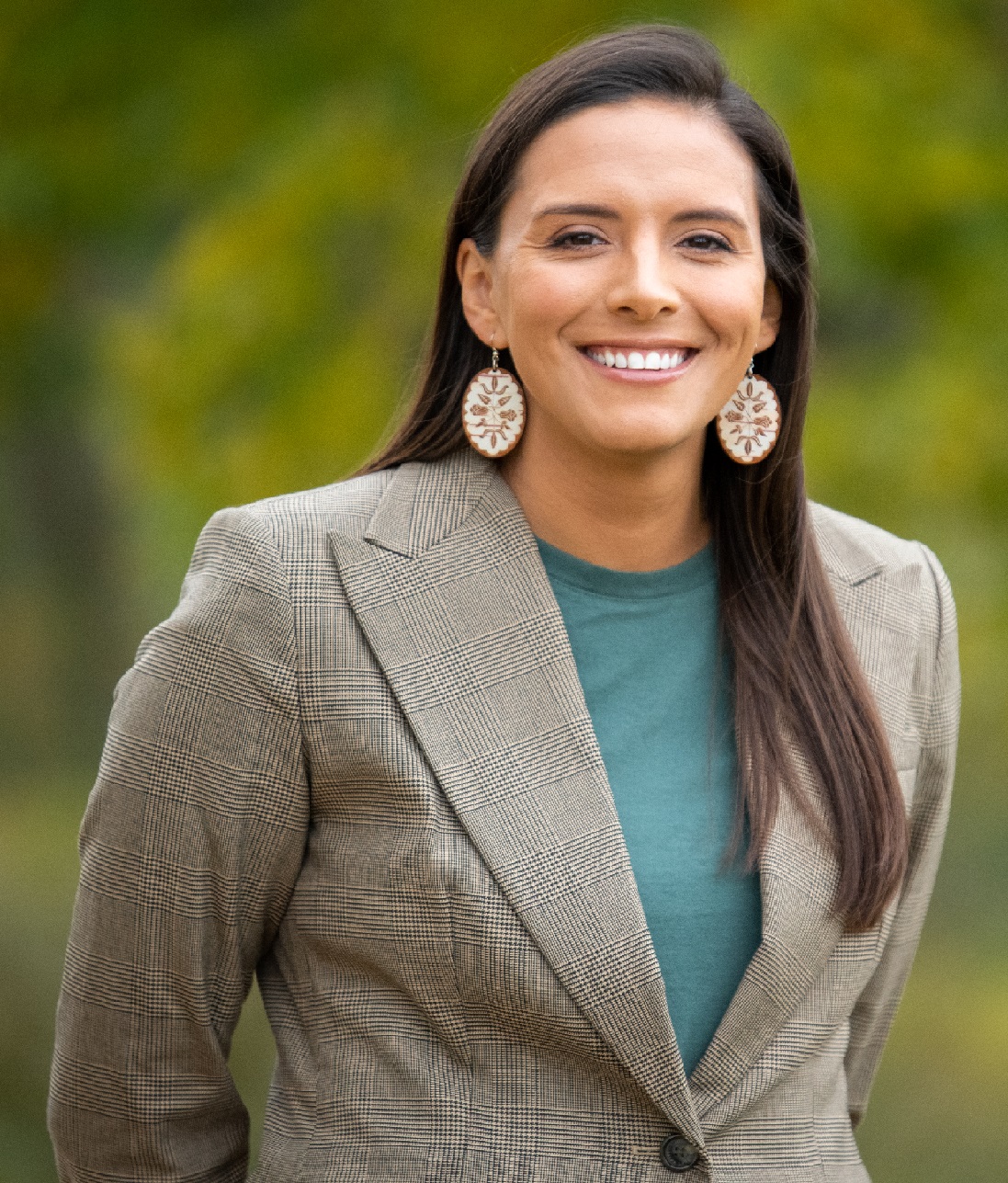 Ferin Davis Anderson is the Lead Environmental Scientist for the Land and Natural Resources Department. She has held this position since 2019. Ferin is responsible for managing, restoring and conserving prairies, wetlands, woodlands, and forests for the SMSC. She determines and implements best conservation management practices. Additionally, Ferin collects, analyzes, and reports on data collected in the field pertaining to wetland, prairie and forest vegetation. Ferin also oversees a team of specialists and technicians in the Land and Natural Resources Department. Ferin completed her Master of Natural Resources Stewardship at Colorado State University and her Bachelor of Science in Natural Resources Management from North Dakota State University. She also earned her Associate of Science and Arts degrees from the Turtle Mountain Community College in North Dakota.
Ferin Davis Anderson is the Lead Environmental Scientist for the Land and Natural Resources Department. She has held this position since 2019. Ferin is responsible for managing, restoring and conserving prairies, wetlands, woodlands, and forests for the SMSC. She determines and implements best conservation management practices. Additionally, Ferin collects, analyzes, and reports on data collected in the field pertaining to wetland, prairie and forest vegetation. Ferin also oversees a team of specialists and technicians in the Land and Natural Resources Department. Ferin completed her Master of Natural Resources Stewardship at Colorado State University and her Bachelor of Science in Natural Resources Management from North Dakota State University. She also earned her Associate of Science and Arts degrees from the Turtle Mountain Community College in North Dakota.
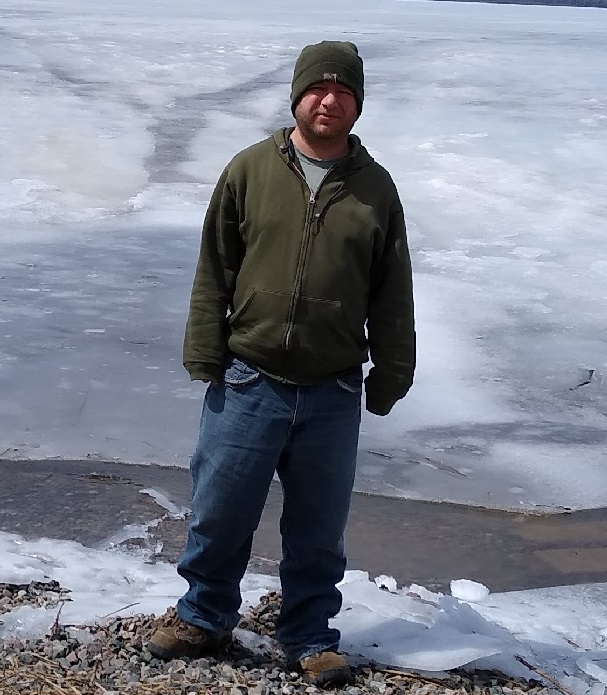 Eric Krumm is a Water Resources Technician for the Leech Lake Band of Ojibwe Water Resources Program in Cass Lake, MN. Originally from the Driftless Area of Southwestern Wisconsin, he moved to Northern Minnesota in 2015. He specializes in limnology, stream ecology, water quality assessment, hydrology, and population and trophic dynamics of fisheries in Upper Midwest rivers and streams. He holds a B.S. in Environmental Science from Winona State University in Winona, MN where his capstone project dealt with trophic dynamics of fishes along a longitudinal gradient of a large river system. Additionally, he acquired a M.S. in Biology from Minnesota State University, Mankato in Mankato, MN where his thesis work involved the effect of hydrology on the growth and recruitment of fishes in mid-sized streams in the Eastern Broadleaf Forest Province of Minnesota. Currently the focus of his work is on wetland jurisdictional analysis related to the recent change in the Waters of the United States Rule and water quality standards development for the waters of the Leech Lake Reservation. He enjoys fishing, hiking, bird watching, and canoeing with his wife.
Eric Krumm is a Water Resources Technician for the Leech Lake Band of Ojibwe Water Resources Program in Cass Lake, MN. Originally from the Driftless Area of Southwestern Wisconsin, he moved to Northern Minnesota in 2015. He specializes in limnology, stream ecology, water quality assessment, hydrology, and population and trophic dynamics of fisheries in Upper Midwest rivers and streams. He holds a B.S. in Environmental Science from Winona State University in Winona, MN where his capstone project dealt with trophic dynamics of fishes along a longitudinal gradient of a large river system. Additionally, he acquired a M.S. in Biology from Minnesota State University, Mankato in Mankato, MN where his thesis work involved the effect of hydrology on the growth and recruitment of fishes in mid-sized streams in the Eastern Broadleaf Forest Province of Minnesota. Currently the focus of his work is on wetland jurisdictional analysis related to the recent change in the Waters of the United States Rule and water quality standards development for the waters of the Leech Lake Reservation. He enjoys fishing, hiking, bird watching, and canoeing with his wife.
Please click only once on each video recording to view in this window.
Balancing Tribal Economic Development, Sustainable Cultural Uses and Wetland/Aquatic Resource Protection and Restoration
Held June 25, 2019 - 3:00 p.m.-5:00 p.m. Eastern
INTRODUCTION
- Marla Stelk, Executive Director, Association of State Wetland Managers [PRESENTATION PDF]
PRESENTERS
- Tom Elliott, Biologist for the Yakama Nation Wildlife Program [PRESENTATION PDF]
- Allison Warner, Wetland Ecologist/Wetland Program Coordinator for The Tulalip Tribes at Quil Ceda Village [PRESENTATION PDF]
- Kara Kuhlman, Water Resources Manager for the Lummi Nation [PRESENTATION PDF]
Please click only once on each video recording to view in this window.
Cultural Values Based Planning for Integrated Wetland Management on a Watershed or
Reservation Scale
Held November 6, 2018 - 3:00 p.m.-5:00 p.m. Eastern
INTRODUCTION
- Marla Stelk, Executive Director, Association of State Wetland Managers
- Jon Hall, Tulalip Tribes of Washington [PRESENTATION PDF]
- Tom Elliott, Yakama Nation [PRESENTATION PDF]
- Andy Robertson, GeoSpatial Services at Saint Mary's University of Minnesota [PRESENTATION PDF]
Please click only once on each video recording to view in this window.
Harvesting Invasive Species as a Management Strategy: Opportunities, Pitfalls and Lessons Learned
Held Thursday, December 7, 2017 - 3:00 p.m. ET
INTRODUCTION
Marla Stelk, Policy Analyst, Association of State Wetland Managers [POWERPOINT PRESENTATION]
PRESENTERS
- Jason Goldberg, U.S. Fish and Wildlife Service [POWERPOINT PRESENTATION]
- Susan Pasko, U.S. Fish and Wildlife Service [POWERPOINT PRESENTATION]
- Matthew Barnes, Texas Tech University [POWERPOINT PRESENTATION]
ABSTRACTS
Jason Goldberg
Review of harvest incentives to control invasive species
Whither to eat invasive species? From nutria to lionfish, interest has increased in how to encourage the use of invasives as a means of controlling them. While public and commercial use of invasive species could be an opportunity to support resource management, economic development, and environmental awareness, negative consequences can also occur. Success depends on many factors, yet little guidance is available on how to use incentivized harvest as an effective management tool. We will discuss the biological, ecological, human health, and socioeconomic factors involved in invasive species incentive programs, and offer recommendations to help support successful harvest programs.
Matthew Barnes
Serving invaders with a side of awareness: reflections on using harvest as an invasive species education and outreach tool
Researchers continue to debate potential positive (population and impact reduction, economic losses recouped through new profits) and negative (generation of economic incentives to encourage further introductions) impacts of harvest as an invasive species management strategy. Increased opportunities for invasive species education and awareness campaigns represents an important- but often overlooked- benefit of the such a strategy. Matthew Barnes has served as co-founder and editor of the blog invasivore.org since 2011, and in this talk, he will reflect on lessons learned eating invasive species as an educational tool during this time, highlighting promises and potential pitfalls for the future.
BIOS
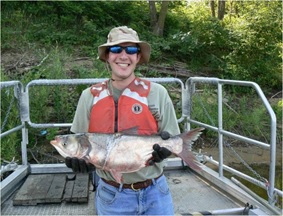 Jason Goldberg currently serves with the Office of Science Applications (SA) in the U.S. Fish and Wildlife Service as a natural resource policy specialist. Prior to joining SA, Jason served for 13 years with the Fish and Aquatic Conservation (FAC) Program, including the Branch of Aquatic Invasive Species; Branch of Budget, Performance, and Policy; and Fish and Wildlife Management Assistance. Jason has also previously worked for Rep. Neil Abercrombie as a Knauss Fellow and with NOAA's Office of Oceanic and Atmospheric Research in External Affairs. Jason holds an undergraduate degree in Marine Science and Biology from the University of Miami (Florida) and Master's degrees in Marine Science and Public Policy from the College of William and Mary.
Jason Goldberg currently serves with the Office of Science Applications (SA) in the U.S. Fish and Wildlife Service as a natural resource policy specialist. Prior to joining SA, Jason served for 13 years with the Fish and Aquatic Conservation (FAC) Program, including the Branch of Aquatic Invasive Species; Branch of Budget, Performance, and Policy; and Fish and Wildlife Management Assistance. Jason has also previously worked for Rep. Neil Abercrombie as a Knauss Fellow and with NOAA's Office of Oceanic and Atmospheric Research in External Affairs. Jason holds an undergraduate degree in Marine Science and Biology from the University of Miami (Florida) and Master's degrees in Marine Science and Public Policy from the College of William and Mary.
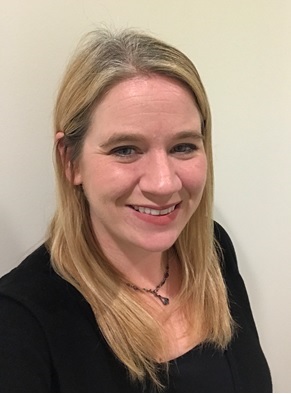 Susan Pasko currently works in the U.S. Fish and Wildlife Service’s Branch of Aquatic Species, serving as the as the Executive Secretary of the Aquatic Nuisance Species Task Force. In this role, Susan focuses on coordination and planning to ensure that Federal agencies are actively engaged and effectively responding to the threat of invasive species. Previously, Susan worked within NOAA Fisheries as the Aquatic Invasive Species Coordinator and a member of the Fisheries Strategic Planning and Evaluation Team. She holds a Bachelor degree in Marine Science from the Richard Stockton College of New Jersey and a PhD in Aquatic ecology from Kent State University.
Susan Pasko currently works in the U.S. Fish and Wildlife Service’s Branch of Aquatic Species, serving as the as the Executive Secretary of the Aquatic Nuisance Species Task Force. In this role, Susan focuses on coordination and planning to ensure that Federal agencies are actively engaged and effectively responding to the threat of invasive species. Previously, Susan worked within NOAA Fisheries as the Aquatic Invasive Species Coordinator and a member of the Fisheries Strategic Planning and Evaluation Team. She holds a Bachelor degree in Marine Science from the Richard Stockton College of New Jersey and a PhD in Aquatic ecology from Kent State University.
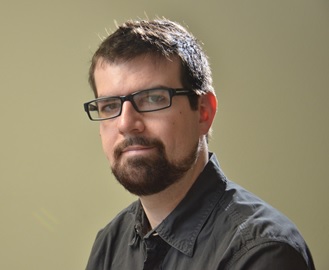 Matthew Barnes is an assistant professor in the Department of Natural Resources Management at Texas Tech University. His research is rooted in community ecology, predicting and explaining species distributions and dispersal in aquatic systems, with a focus on biological invasions. He utilizes a broad set of tools to address many different types of ecological questions, including predicting species occurrence with species distribution models and geographic information systems (GIS), detecting rare species through environmental DNA (eDNA) surveillance, and investigating species impacts through field observations and laboratory experiments. He also has served as co-founder and editor for the blog invasivore.org since 2011, using the concept of eating invasive species as a tool to promote education and outreach. Barnes earned his BA in Biology from Southwestern University followed by a PhD in Aquatic Ecology from the University of Notre Dame.
Matthew Barnes is an assistant professor in the Department of Natural Resources Management at Texas Tech University. His research is rooted in community ecology, predicting and explaining species distributions and dispersal in aquatic systems, with a focus on biological invasions. He utilizes a broad set of tools to address many different types of ecological questions, including predicting species occurrence with species distribution models and geographic information systems (GIS), detecting rare species through environmental DNA (eDNA) surveillance, and investigating species impacts through field observations and laboratory experiments. He also has served as co-founder and editor for the blog invasivore.org since 2011, using the concept of eating invasive species as a tool to promote education and outreach. Barnes earned his BA in Biology from Southwestern University followed by a PhD in Aquatic Ecology from the University of Notre Dame.
![]()
Biological Control Strategies and Lessons Learned for Giant Salvinia, Water Hyacinth and Alligatorweed
Held Thursday, November 30, 2017 - 3:00 p.m. ET
INTRODUCTION
Marla Stelk, Policy Analyst, Association of State Wetland Managers [POWERPOINT PRESENTATION]
PRESENTERS
- Dr. Rodrigo Diaz, Assistant Professor, Louisiana State University Dept. of Entomology [POWERPOINT PRESENTATION]
- Lori Moshman, Graduate Assistant, Louisiana State University Dept. of Entomology [POWERPOINT PRESENTATION]
- Nathan Harms, Research Biologist, U.S. Army Engineer Research and Development Center [POWERPOINT PRESENTATION]

ABSTRACTS
Dr. Rodrigo Diaz
Biological Control and Giant salvinia
Biological control is the intentional manipulation of natural enemies to reduce pest populations. Classical biological control is the introduction of natural enemies from the native range of the target pest. This approach has resulted in successful control of aquatic weeds in southeastern U.S. including water hyacinth, alligatorweed, melaleuca, and giant salvinia. To successfully implement a biological control program, practitioners need to understand the life cycle, dispersal, and impact of the natural enemy. Monitoring weed and natural enemy populations is critical for the program since it helps to determine the impact during the growing season, limitations, and need for more agents or other control tactics.
Giant salvinia (Salvinia molesta) is a floating fern native to Brazil. Mats of giant salvinia cover canals, lakes, and ponds, resulting in the impediment of fishing, duck hunting, and transportation. Since 2001 the giant salvinia weevil (Cyrtobagous salviniae) has been used in Louisiana and Texas to manage giant salvinia. Adults of the weevil feed in new leaf buds, and larvae feed in leaf buds and rhizomes. Damaged salvinia turn yellow-brown and eventually sink. Field observations in Louisiana demonstrated that the impact of the weevil varies from complete control in southern latitudes to minimal control in northern latitudes. Early removal of salvinia due weevil damage led to the recovery of submerged aquatic vegetation and increase of dissolved oxygen. To maximize control of giant salvinia, practitioners should monitor densities of salvinia and weevil in early spring and determine the need to supplement weevils or apply herbicides.
More information can be found at these websites:
Lori Moshman
Water Hyacinth
Water hyacinth (Eichornia crassipes) is an invasive aquatic weed that has been present in the U.S. since 1884. It continues to be grown and sold in the aquatic plant trade. Like other invasive aquatic species, water hyacinth affects freshwater industries and can cause undesirable ecological effects. Mechanical, chemical, and biological control methods can be used to manage water hyacinth infestations and prevent further spread.
Nathan Harms
Biological control of alligatorweed
Alligatorweed (Alternanthera philoxeroides) is a South American wetland plant, introduced into the U.S. in the 1800’s. Infestations may form thick interwoven mats, leading reduced water quality, impacts to native species, and problems for boaters. Three biological control agents have been introduced into the U.S., providing rapid and near-complete control in many areas. However, alligatorweed persists in northern areas of Arkansas, Alabama, Tennessee, and North Carolina, where agents do not overwinter. In these areas agents are sometimes introduced annually but control remains limited. As of 2017, all agents are established and widespread but the alligatorweed flea beetle is most common. With mild winters as of late, natural flea beetle immigration into northern areas has provided some control without intentional introductions.
BIOS
Dr. Rodrigo Diaz is an Assistant Professor in the Department of Entomology at LSU. Rodrigo specializes on Biological Control of Pest and Ecology of Invasive Species. Before joining LSU, Rodrigo worked in the University of Florida with biological control of tropical soda apple (Solanum viarum), Brazilian peppertree (Schinus terebinthifolia) and West Indian marsh grass (Hymenachne amplexicaulis). Current projects in LSU include biological control of giant salvinia, Chinese tallowtree (Triadica sebifera), crape myrtle bark scale (Eriococcus lagerstroemiae), and Roseau cane scale (Nipponaclerda biwakoensis). Rodrigo has 45 peer-reviewed publications.
Lori Moshman is a graduate assistant in the Department of Entomology at LSU working in biological control of giant salvinia. Her research focuses on winter management methods that can be used to increase overwinter survival of salvinia weevils in temperate climates. Lori looks forward to graduating with her master’s degree in December 2017.
Nathan Harms is a Research Biologist at the US Army Engineer Research and Development Center, Vicksburg, MS. His research primarily focuses on biological control of aquatic invasive plant species and impacts of invasive species on invaded ecosystems. Since 2005, he has been involved with various aspects of biological control development and implementation, from overseas exploration for new agents to rearing, release and monitoring of control agents. Since He has worked on management of submersed (hydrilla, Eurasian watermilfoil), emergent (alligatorweed, flowering rush) and floating (giant salvinia, water hyacinth, water lettuce, water pennywort) invasive plants. Currently, his focus is on seasonal aspects of alligatorweed biological control along a winter gradient in the southern U.S.
![]()
Invasive Species in Coastal Wetlands: Current and Future Challenges & Management Implications
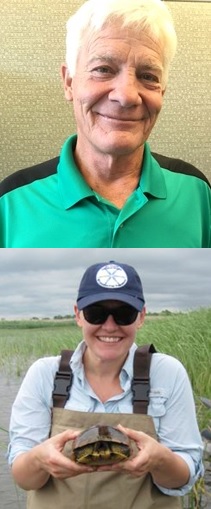 Held Thursday, August 17, 2017 - 3:00 p.m. ET
Held Thursday, August 17, 2017 - 3:00 p.m. ET
INTRODUCTION
Marla Stelk, Policy Analyst, Association of State Wetland Managers [POWERPOINT PRESENTATION]
PRESENTERS
- Tom Hall, USDA, Animal and Plant Health Inspection Service, Wildlife Services Program [POWERPOINT PRESENTATION]
- Anne Garwood, Michigan Department of Environmental Quality [POWERPOINT PRESENTATION]
ABSTRACTS
Tom Hall
In 2014, the Ad Hoc Working Group on Invasive Species and Climate Change prepared a report for the Aquatic Nuisance Species Task Force and the National Invasive Species Council entitled, “Bioinvasions in a Changing World: A Resource on Invasive Species-Climate Change Interactions for Conservation and Natural Resource Management.” The globalization of trade and transport is accelerating the risk of introducing potentially invasive species as they are moved both unintentionally and for deliberate purposes. At the same time, climate change poses a threat for the long-term. Combining the threats of invasive species with those posed by climate change can magnify the intensity associated with both issues. This presentation will summarize the findings of the report which serves as a guide to the methods, resources and assistance available for dealing effectively with invasive species and their interface with climate change at the site level, and to inform policy-making and planning at larger geographic scales.
Anne Garwood
Michigan’s Invasive Species Program is cooperatively implemented by the Michigan Departments of Agriculture & Rural Development, Environmental Quality and Natural Resources. In 2013, Michigan updated the Aquatic Invasive Species State Management Plan. This plan focuses on vectors or pathways by which invasive species are moved, to prevent the introduction of new AIS, prevent the dispersal of AIS, detect and respond to new invaders, and minimize the harmful effects of AIS in Michigan. By focusing on dispersal vectors rather than individual species, Michigan is able to implement and promote specific actions to address AIS without putting all effort into single species, and without having to train everyone in the identification and biological responses of each species. This approach to AIS management is particularly useful in wetlands management where many invasive species (both aquatic and terrestrial) can become established through land alteration activities such as construction, shoreline hardening, landscaping, and other habitat alterations.
BIOS
Tom Hall is a wildlife biologist with the United States Department of Agriculture, Animal and Plant Health Inspection Service, Wildlife Services Program for the past 32 years. He currently is an Environmental Coordinator for Wildlife Services in Fort Collins, Colorado. He has also worked in Nevada, Oklahoma, California, Guam, Oregon, and Denver. Tom received a Masters in Wildlife from Oklahoma State University. He has worked with several invasive species including feral swine, brown tree snakes, nutria, starlings, feral pigeons, feral dogs and feral cats protecting a variety of resources including T&E species and agriculture. He has been a member of the APHIS Climate Change Working Group and on the Invasive Species, Climate Change Task Force.
Anne Garwood is the Great Lakes Coastal Wetland Ecologist for the Water Resources Division in the Michigan Department of Environmental Quality. Anne works on wetland monitoring, invasive species management, climate change adaptation, and protection of coastal wetlands. Anne is a member of the Aquatic and Terrestrial Invasive Species Core Teams. Anne worked in the MDEQ regulatory wetlands program for several years prior to accepting the coastal wetland ecologist position in 2010.
![]()
View Past Invasive Species Webinars Here
| 2018 |
Webinar 9: Dealing with Changing Weather Patterns in Wetland Restoration Planning
Held Monday, May 6, 2019 at 2:00-4:00 pm ET
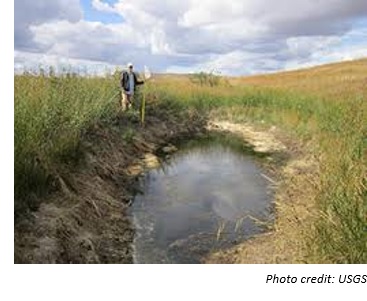 INTRODUCTION
INTRODUCTION
- Brenda Zollitsch, Senior Policy Analyst, National Association of Wetland Managers [POWERPOINT PRESENTATION]
PRESENTERS
- Susan Galatowitsch, University of Minnesota [POWERPOINT PRESENTATION]
- Ryan O’Connor, Wisconsin Department of Natural Resources [POWERPOINT PRESENTATION]
-
Danielle Shannon, USDA Climate Hubs, Northern Institute of Applied Climate Science (NIACS) [POWERPOINT PRESENTATION]
ABSTRACT
This is the sixth webinar in NAWM and NRCS’s jointly-developed nine-part wetland training webinar series. The webinar began with a look at how weather and climate are different, and how the climate has been changing and will continue to change over time. The webinar shared how these changes over time have affected wetlands and may continue to affect wetlands and decisions about their management. Moving from broad climate issues to specific regional/landscape issues, the second part of the webinar explored how additional complexity is caused by regional issues, water rights, coastal issues and more. Presentation of two illustrative case studies showed how decisions are affected by these issues in the real world. The final segment of the webinar focused on how conservation planners and others working with wetlands can use tools to integrate climate considerations into land management. The webinar closed with suggestions about ways to work with land managers to address climate at the site level and provide a decision-making framework for professionals working on these issues.
BIOS
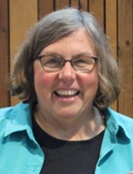 Susan Galatowitsch has been a faculty member of the University of Minnesota for 25 years and is professor and Head of the Department of Fisheries, Wildlife and Conservation Biology. She is a Fellow of the Society of Wetland Scientists, a member of Minnesota’s Academy of Distinguished Teachers, a past Fesler-Lampert Distinguished Chair of Urban and Regional Affairs, and a Fulbright Scholar to South Africa (University of Cape Town). Her research focuses on restoration of degraded wetlands and grasslands, climate change adaptation and management of invasive species in these systems. She served as the Director, Minnesota Aquatic Invasive Species Research Center for three years. In addition to 75 research publications, she has authored two books, Ecological Restoration (Sinauer Associates) and Restoring Prairie Wetlands: An Ecological Approach (with Arnold van der Valk). Dr. Galatowitsch has a PhD from Iowa State University.
Susan Galatowitsch has been a faculty member of the University of Minnesota for 25 years and is professor and Head of the Department of Fisheries, Wildlife and Conservation Biology. She is a Fellow of the Society of Wetland Scientists, a member of Minnesota’s Academy of Distinguished Teachers, a past Fesler-Lampert Distinguished Chair of Urban and Regional Affairs, and a Fulbright Scholar to South Africa (University of Cape Town). Her research focuses on restoration of degraded wetlands and grasslands, climate change adaptation and management of invasive species in these systems. She served as the Director, Minnesota Aquatic Invasive Species Research Center for three years. In addition to 75 research publications, she has authored two books, Ecological Restoration (Sinauer Associates) and Restoring Prairie Wetlands: An Ecological Approach (with Arnold van der Valk). Dr. Galatowitsch has a PhD from Iowa State University.
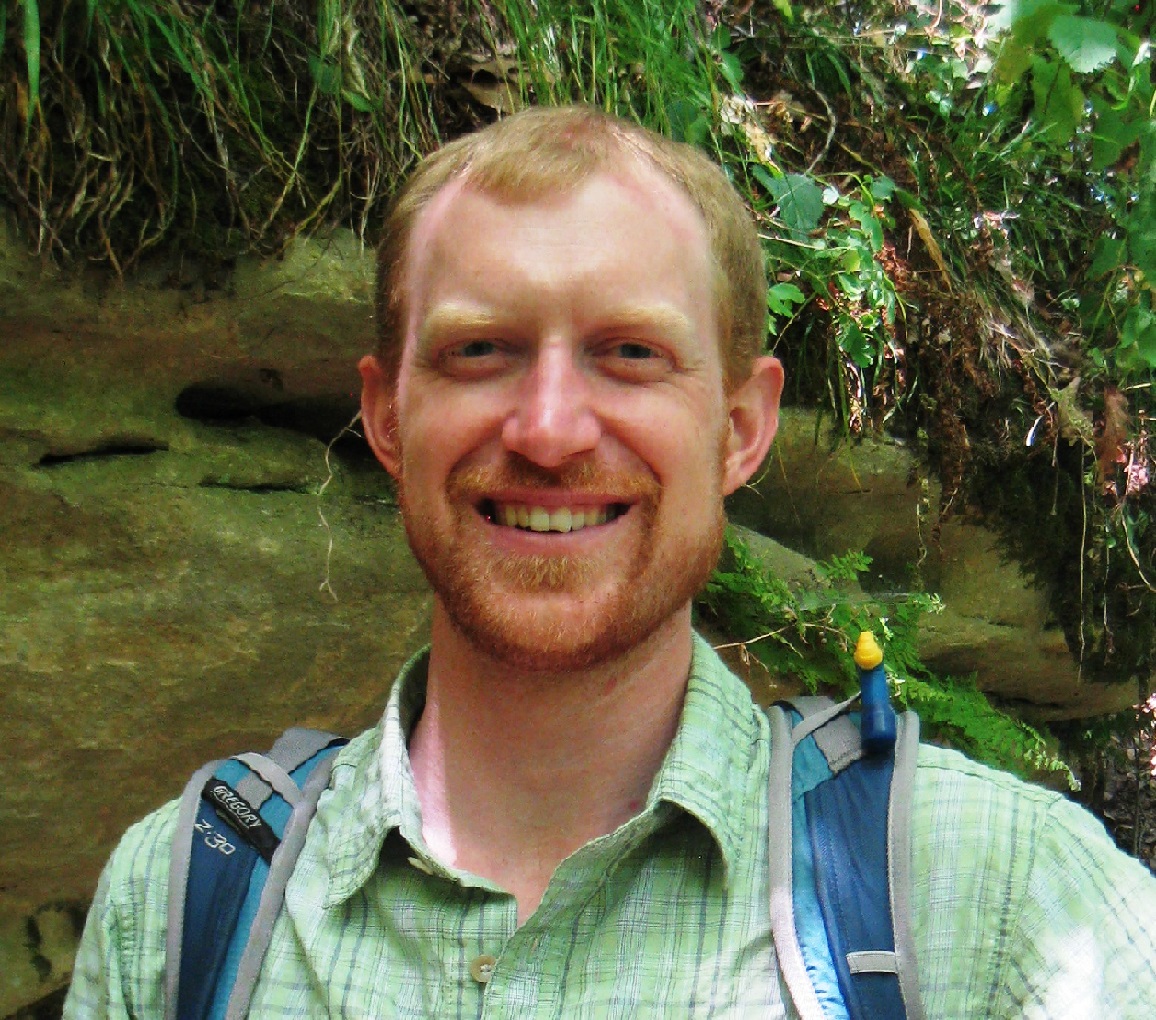 Ryan O’Connor is an ecologist and coordinates and conducts biotic inventories of natural communities for the Wisconsin DNR's Natural Heritage Inventory. His professional interests include providing land managers with high-quality data to make better decisions, developing adaptation resources, and hunting for rare and invasive plants. He also likes introducing his daughter to wetlands by looking for frogs, turtles, and a macroinvertebrate his daughter calls a "jitterbug".
Ryan O’Connor is an ecologist and coordinates and conducts biotic inventories of natural communities for the Wisconsin DNR's Natural Heritage Inventory. His professional interests include providing land managers with high-quality data to make better decisions, developing adaptation resources, and hunting for rare and invasive plants. He also likes introducing his daughter to wetlands by looking for frogs, turtles, and a macroinvertebrate his daughter calls a "jitterbug".
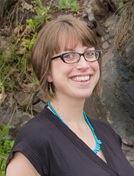 Danielle Shannon is a Climate Adaptation Specialist at the Northern Institute of Applied Climate Science (NIACS), and the coordinator of the USDA Northern Forests Climate Hub. Danielle helps professional land managers cope with and adapt to the challenges of climate change and is expanding the suite of adaptation resources into the field of forest hydrology and the management of forested watersheds. Find more information about this effort at ForestAdaptation.org.
Danielle Shannon is a Climate Adaptation Specialist at the Northern Institute of Applied Climate Science (NIACS), and the coordinator of the USDA Northern Forests Climate Hub. Danielle helps professional land managers cope with and adapt to the challenges of climate change and is expanding the suite of adaptation resources into the field of forest hydrology and the management of forested watersheds. Find more information about this effort at ForestAdaptation.org.
![]()
Webinar 8: What are the Choices and Benefits? Matching Objectives to Programs and Getting Additional Help
Held Monday, August 5, 2019 - 3:00pm-5:00pm EDT
INTRODUCTION
- Brenda Zollitsch, Policy Analyst, National Association of Wetland Managers [POWERPOINT PRESENTATION]
PRESENTERS
• Andrew James, USDA Natural Resources Conservation Service [POWERPOINT PRESENTATION]
• Karen Fullen, USDA Natural Resources Conservation Service [POWERPOINT PRESENTATION]
• Ted LaGrange, Nebraska Game and Parks Commission [POWERPOINT PRESENTATION]
ABSTRACT
This seventh webinar in NAWM and NRCS’s jointly-developed nine-part wetland training webinar series began with a brief overview of USDA’s many wetland-related programs. The webinar introduced these programs and when planners should consider using them. This portion of the webinar also explored the complexity created by regional issues, water rights, coastal issues, changing weather patterns and other challenges that planners need to understand in order to make effective decisions when working with landowners. The second presentation shared the potential for using the CPA-52 environmental evaluation tool to assist in planning to assess concerns and alternatives. The webinar continued with a third presentation on partner organizations and programs that provide complementary supports for wetland work. The final presentation shared examples of collaborative projects around the country that have been built around different collaboration goals, form and functions. Throughout, the webinar they shared the importance of identifying and engaging additional help from both internal and external staff experts and advice on how to engage them. It also included discussion of terminology that is accessible by landowners around wetland and these complexities, as well as the interdisciplinary nature of the work.
BIOS
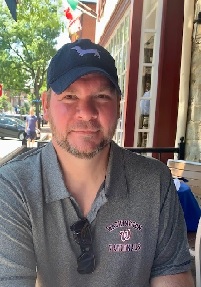 Andrew James is the Easement Programs Manager for Arkansas Natural Resource Conservation Service (NRCS) and Wetland Easement Restoration Planning and Implementation Leader with Louisiana NRCS. Since he first joined the NRCS in 2006 and from his first day on the job his career has revolved around wetland easements. included Andrew Joined the NRCS headquarters staff in 2012 as National Floodplain Easement Program Manager and Wetland Easement Specialist, and in 2014 he moved into the National WRE Program Manager position. Andrew’s career began with the Arkansas Game and Fish Commission when he was hired in 2003 as Manager of the Weddington Wildlife Management Area and shortly thereafter became the State Waterfowl Biologist, a position he filled until 2006. Andrew is a 1995 graduate of Louisiana Tech University where he majored in Wildlife Conservation and minored in Forestry, and a 2003 graduate of the USGS Cooperative Fish and Wildlife Unit at the University of Arkansas where he earned a MSc in Wildlife Biology.
Andrew James is the Easement Programs Manager for Arkansas Natural Resource Conservation Service (NRCS) and Wetland Easement Restoration Planning and Implementation Leader with Louisiana NRCS. Since he first joined the NRCS in 2006 and from his first day on the job his career has revolved around wetland easements. included Andrew Joined the NRCS headquarters staff in 2012 as National Floodplain Easement Program Manager and Wetland Easement Specialist, and in 2014 he moved into the National WRE Program Manager position. Andrew’s career began with the Arkansas Game and Fish Commission when he was hired in 2003 as Manager of the Weddington Wildlife Management Area and shortly thereafter became the State Waterfowl Biologist, a position he filled until 2006. Andrew is a 1995 graduate of Louisiana Tech University where he majored in Wildlife Conservation and minored in Forestry, and a 2003 graduate of the USGS Cooperative Fish and Wildlife Unit at the University of Arkansas where he earned a MSc in Wildlife Biology.
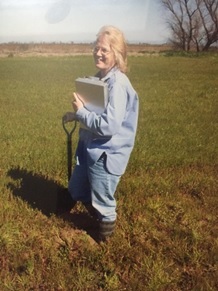 Karen Fullen is the Ecologist and Environmental Compliance Specialist for USDA’s Natural Resources Conservation Service West Region. A native of Fresno, California, Karen started her NRCS career in the Field Office there in 1992 in the student employment programs. After obtaining an A.S. degree in Forest/Park Technology from Kings River Community College and a B.S. in Biology with an Ecology emphasis from Fresno State in 1997, Karen became a Soil Conservationist for the Fresno Field Office. From 1999-2004, she was the Wetland Team Biologist working out of the Elk Grove Field Office to provide wetland compliance and restoration assistance across a large swath of interior northern California. Prior to joining the West National Technology Support Center Core Team in 2014, Karen Fullen served as the State Biologist and Environmental Compliance Specialist for Idaho and Utah over a period of 10 years.
Karen Fullen is the Ecologist and Environmental Compliance Specialist for USDA’s Natural Resources Conservation Service West Region. A native of Fresno, California, Karen started her NRCS career in the Field Office there in 1992 in the student employment programs. After obtaining an A.S. degree in Forest/Park Technology from Kings River Community College and a B.S. in Biology with an Ecology emphasis from Fresno State in 1997, Karen became a Soil Conservationist for the Fresno Field Office. From 1999-2004, she was the Wetland Team Biologist working out of the Elk Grove Field Office to provide wetland compliance and restoration assistance across a large swath of interior northern California. Prior to joining the West National Technology Support Center Core Team in 2014, Karen Fullen served as the State Biologist and Environmental Compliance Specialist for Idaho and Utah over a period of 10 years.
 Ted LaGrange has worked as the Wetland Program Manager for the Nebraska Game and Parks Commission for 25 years. As Wetland Program Manager he works on a wide variety of wetland issues throughout Nebraska including partnerships, private land restoration programs, public lands management, research, regulations, and outreach. Prior to moving to Nebraska, he worked for 8 years as a Waterfowl Research Technician for the Iowa Department of Natural Resources. Ted received B.S. and M.S. degrees in Wildlife Biology from Iowa State University. His professional interests are in prairie wetlands and waterfowl/waterbird ecology.
Ted LaGrange has worked as the Wetland Program Manager for the Nebraska Game and Parks Commission for 25 years. As Wetland Program Manager he works on a wide variety of wetland issues throughout Nebraska including partnerships, private land restoration programs, public lands management, research, regulations, and outreach. Prior to moving to Nebraska, he worked for 8 years as a Waterfowl Research Technician for the Iowa Department of Natural Resources. Ted received B.S. and M.S. degrees in Wildlife Biology from Iowa State University. His professional interests are in prairie wetlands and waterfowl/waterbird ecology.
![]()
Webinar 7: How to Talk about Wetlands with Landowners
Presentations Recorded December 2019 (Non-Live Webinar)![]()
INTRODUCTION
- Brenda Zollitsch, Policy Analyst, National Association of Wetland Managers
TRAINERS
- Brittany Haywood, Delaware Department of Natural Resources
- Andy Robertson, Saint Mary’s University of Minnesota
![]()
Webinar 6: Identifying Resource Concerns and Determining Landowner Objectives
Presentations Recorded December 2019 (Non-Live Webinar)![]()
INTRODUCTION
- Brenda Zollitsch, Policy Analyst, National Association of Wetland Managers
TRAINERS
- Ted LaGrange, Nebraska Game and Parks Commission
- Bill Edwards, Natural Resources Conservation Service
Webinar 5: Dealing with Reality: How to Work with Wetlands in Altered landscapes
Held Friday, February 15, 2019 at 3:00-5:00 pm ET
INTRODUCTION
- Brenda Zollitsch, Policy Analyst, National Association of Wetland Managers [PowerPoint Presentation [POWERPOINT PRESENTATION]
TRAINERS
- Ray Norrgard, Minnesota Department of Natural Resources
[POWERPOINT PRESENTATION] [POWERPOINT PRESENTATION] - Rich Weber, NRCS retired [POWERPOINT PRESENTATION]
- Mike McClure, Missouri Department of Conservation [POWERPOINT PRESENTATION]
ABSTRACT
This is the fifth webinar in NAWM and NRCS’s jointly-developed nine-part wetland training webinar series. The webinar began with a presentation on types of actions taken that have altered, degraded or destroyed wetlands over time. This was followed by a discussion on how hydrology, source water, water budgets and the soil/water interfaces vary by the location and wetland type (Hydrogeomorphic (HGM) class) and how adjustments to these lead to changes in wetlands. NRCS definitions of actions that can be taken to improve wetlands will be shared. The third talk covered the concepts of how restoration, enhancement, and creation can support improved wetland health and waterfowl productivity, looking primarily at the prairie potholes. The final presentation discussed how to start with a watershed perspective to identify good management options on an individual property and introduce specific actions that can be taken working in conjunction with a landowner to improve wetland health. Participants will come away from the webinar with an increased understanding of the extent of wetland alteration, concepts to support understanding wetland variability, management options for returning wetlands to the land and supporting wetland health.
BIOS
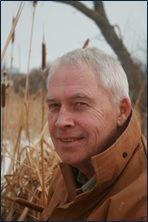 Ray Norrgard, is Minnesota born, raised, and educated; Ray has served as a wildlife professional for state, federal, and nongovernmental agencies for more than four decades. His primary focus throughout his career has been waterfowl, wetlands, shallow lakes, and education. He is currently focused on providing wetland management technical guidance to wildlife field managers with the Minnesota Department of Natural Resources.
Ray Norrgard, is Minnesota born, raised, and educated; Ray has served as a wildlife professional for state, federal, and nongovernmental agencies for more than four decades. His primary focus throughout his career has been waterfowl, wetlands, shallow lakes, and education. He is currently focused on providing wetland management technical guidance to wildlife field managers with the Minnesota Department of Natural Resources.
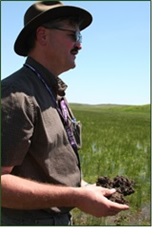 Richard A. Weber was a Wetland Hydraulic Engineer with the USDA Natural Resources Conservation Service (NRCS), Wetland Team, CNTSC in Fort Worth, Texas from 2006 to 2017. In this role, Rich provided national leadership on wetland hydrology, including: Support for Wetland Restoration Program, Wetland Protection Policy, and E.O. 11990 Wetland Assessments. He led a national training cadre for Wetland Restoration and Enhancement and Hydrology Tools for Wetland Determination courses. From 2005-2006, Rich was Design Engineer at the NRCS Nebraska State Office where he had design and A&E Contracting responsibilities for PL-566, WRP, and EQIP programs. From 1999-2005, he was a Field Engineer at the NRCS in the Scottsbluff, NE Field Office where he had design, construction, and contracting responsibilities for the Wetland Reserve Program, EQIP Irrigation and Animal Waste Management, and CTA conservation practices. From 1997-1999, Rich was an Agricultural Engineer at the NRCS in Chehalis, WA where he had design, construction, and contracting responsibilities for Conservation District funded Stream Restoration and Fish Passage projects, and EQIP program
Richard A. Weber was a Wetland Hydraulic Engineer with the USDA Natural Resources Conservation Service (NRCS), Wetland Team, CNTSC in Fort Worth, Texas from 2006 to 2017. In this role, Rich provided national leadership on wetland hydrology, including: Support for Wetland Restoration Program, Wetland Protection Policy, and E.O. 11990 Wetland Assessments. He led a national training cadre for Wetland Restoration and Enhancement and Hydrology Tools for Wetland Determination courses. From 2005-2006, Rich was Design Engineer at the NRCS Nebraska State Office where he had design and A&E Contracting responsibilities for PL-566, WRP, and EQIP programs. From 1999-2005, he was a Field Engineer at the NRCS in the Scottsbluff, NE Field Office where he had design, construction, and contracting responsibilities for the Wetland Reserve Program, EQIP Irrigation and Animal Waste Management, and CTA conservation practices. From 1997-1999, Rich was an Agricultural Engineer at the NRCS in Chehalis, WA where he had design, construction, and contracting responsibilities for Conservation District funded Stream Restoration and Fish Passage projects, and EQIP program 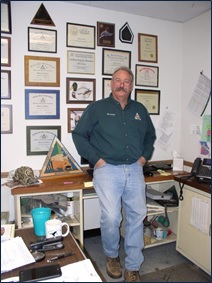 Animal Waste Projects. And from 1986-1997, he was a Watershed Project Engineer at the NRCS in Horton, KS where he performed Construction Contract Administration for PL-566 Watershed Protection and Flood Prevention projects. Currently, he performs contract work for the Kansas Alliance for Wetlands and Streams, Ducks Unlimited, and KLA Environmental Services.
Animal Waste Projects. And from 1986-1997, he was a Watershed Project Engineer at the NRCS in Horton, KS where he performed Construction Contract Administration for PL-566 Watershed Protection and Flood Prevention projects. Currently, he performs contract work for the Kansas Alliance for Wetlands and Streams, Ducks Unlimited, and KLA Environmental Services.
Mike McClure is a Missouri Department of Conservation Wetland Service Biologist. Mike served in a wetland management position on MDC’s Grand Pass Conservation Area from 1987 to April 1997. Since then, Mike has served as the biologist on the NRCS Wetland Emphasis Team-Chillicothe, where his responsibilities focus on development of WRP/WRE restoration plans and wetland management plans for wetlands restored under WRP/WRE.
![]() View Past 2019 NRCS Conservation Planners Training Webinars Here
View Past 2019 NRCS Conservation Planners Training Webinars Here
View a List of Past 2019 NRCS Conservation Planners Training Webinar Recordings Here
Publications
 The Association conducts research and publishes reports, guidebooks, news articles, brochures, white papers, and summaries of findings of symposia and workshops. These are available electronically to all interested individuals and organizations.
The Association conducts research and publishes reports, guidebooks, news articles, brochures, white papers, and summaries of findings of symposia and workshops. These are available electronically to all interested individuals and organizations.
